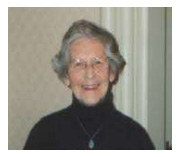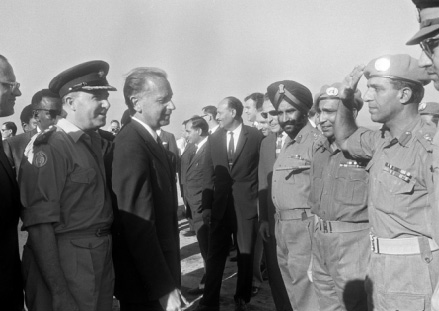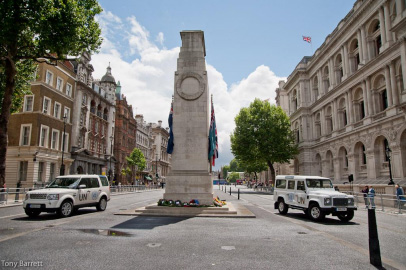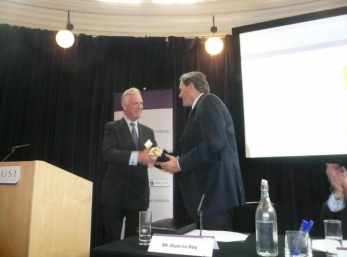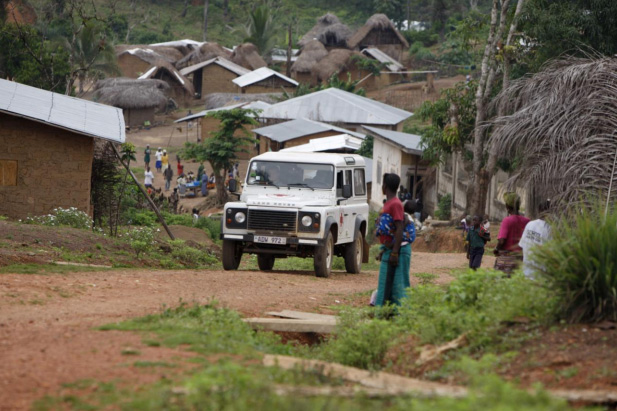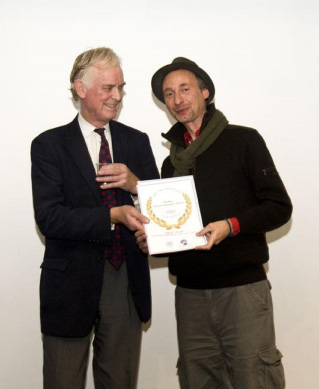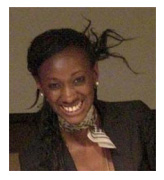
NEWS NEWS NEWS



A group of Westminster UNA Young Professionals visited the headquarters of the International Maritime Organisation (IMO), the only UN agency based in London. The IMO has responsibility for the safety and security of shipping and the prevention of marine and atmospheric pollution by ships. The visit took in the Knowledge Centre,
Noting that the UN Climate Change Conference (COP30) was taking place in Brazil at the time, the group had asked to be briefed on how IMO was tackling related issues, especially in the decarbonisation of ships’ emissions. Related IMO programmes discussed included black carbon in the Arctic, marine litter, plastic pellets and ballast water emissions. The photo shows members of the group in the IMO Conference Chamber.

Longtime Westminster UNA member Benny Dembitzer’s latest book The Global Famine Game: Toxic Aid, A Weapon of War, Perverse Economics tackles established nostrums of the humanitarian community. One target of Benny Dembitzer is Bill Gates and his Foundation who he accuses of identifying the wrong priorities: ending preventable death of millions of babies, ensuring the next generation grows up without having to suffer from deadly infectious diseases, and lifting millions of people out of poverty.
But, Dembitzer asks, what evidence has Mr Gates provided that his extremely noteworthy contribution has reduced poverty anywhere in Africa? Has starvation decreased? Have there been any improvements in the life of people living in rural areas - where the overwhelming majority of poor people are to be found - become less poor? Have the number of primary schools increased?
Benny’s full article can be found on our front page blog here. The book is available through all good bookshops and online.
Benny Dembitzer is a British economist who has specialized in international economic development issues and consequences of climate change, in particular in the economies of sub-Saharan Africa. He is Visiting Professor of Global Economics at the China Centre of University College, London and a Rockefeller Fellow. He was director of the European Office of International Physicians for the Prevention of Nuclear War, when the organization was awarded the 1985 Nobel Peace Prize.
On 22 August, Westminster UNA marks the UN International Day Commemorating the Victims of Acts of Violence based on Religion or Belief as in previous years. We mourn those who have been killed, imprisoned and tortured for their beliefs with concern and sorrow that persecution for religious beliefs has increased over the last year. We noted that delegates to the 2025 International Religious Freedom Summit re-affirmed that Governments should recognise that religious freedom is a strategic mainstream foreign policy priority, not merely a human rights issue. To support this view, a growing body of research is finding strong positive correlations between religious freedom and social stability, political moderation, the undermining of religion-related terrorism, and economic development.
With this sense of commitment, we urge the UK Foreign, Commonwealth and Development Office (FCDO) to:We will continue to work with faith organisations and other groups to direct attention towards acts of violence based on religion or belief, and to work with others for their elimination.
Background: Westminster UNA has supported this UN International Day since its adoption in 2019. In August 2020, we teamed up with the Faith Forum for London to host an online seminar marking the first anniversary of the International Day. In the following years, we have held events to mark the adoption of key international human rights instruments including the Universal Declaration of Human Rights, the European Convention of Human Rights, World Press Freedom Day, the Declaration on Human Rights Abuse at Sea, the Campaign on Stopping the Inhumanity at Europe’s Borders and World Humanitarian Day.
Members of Westminster UNA were invited to a briefing at the Embassy of Sudan on the continuing fighting around and in the regional city of El-Fasher in the Darfur region. As widely reported, the fighting for the city is one of several flash points in the war in which since April 2023, the Sudan Armed Forces (SAF) seek to overcome the Rapid Support Forces (RSF)
HE Babikir Elsiddig Mohamed Elamin, Ambassador of Sudan to the UK and (by remote), HE Dr Ali Yosuf, Minister of Foreign Affairs of the Republic of Sudan used evidence of outsourcing of terrorism and UAE-sponsored mercenaryism being used against the people of Sudan, and starvation being used by the RSF as a weapon in its siege on El-Fasher. The audience had noted that UN human rights chief Volker Türk has expressed his on hearing this and that UN human rights officials had recently interviewed survivors of the RSF’s devastating assault on Zamzam camp, 15 kilometres south of El Fasher, where famine was confirmed in August 2024.
Gillian Dare, Westminster UNA, who attended the meeting, observed that this presentation provided “clear evidence to both the UN and ICJ, that UAE is funding militia and Colombian FARC terrorists in very large numbers in Sudan. They are very violent, torturing people, setting fire to or blowing up villages and mass killings”. In referring to the plight of refugees, she stated that “no-one should be sent to either Sudan or South Sudan given the porous nature of the borders as violence will again spill over into South Sudan”.
Later, David Wardrop, Chair, Westminster UNA and Abdullah Falliq, Westminster UNA, discussed the dynamics of the continuing crisis with the ambassador.
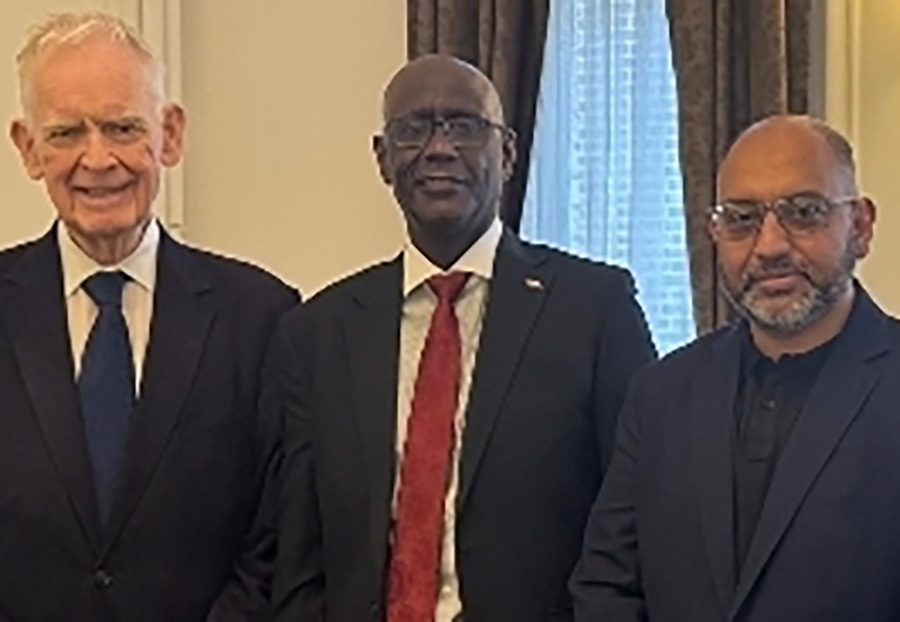
David Wardrop, HE Babikir Elamin and Abdullah Falliq
On the eightieth anniversary of the signing of the UN Charter in San Francisco, Westminster UNA hosted the annual Summer Council of UNA London & Southeast Region’s (LASER). The event was held at Methodist Central Hall where the UN General Assembly first met in January 1946.
The programme was opened by Patricia Rogers, Chair of LASER and featured a variety of elements, including film of the 1945 San Francisco Conference and the reading of messages of goodwill from Daniel Lurie, Mayor of San Francisco and Councillor Paul Dimoldenberg, Lord Mayor of Westminster.
A discussion followed, in which former UN diplomat Mark Bowden reported on his recent mission to South Sudan to review efforts to sustain humanitarian relief support to various communities there, with commentary from Westminster UNA Committee Member Salem Mezhoud who has recently served as an expert witness in a case before the Swedish courts relating to South Sudan.
The event also featured robust presentations by Professor Can Yeğinsu, Deputy Chair, High Level Panel of Legal Experts on Media Freedom for the Media Freedom Coalition and Caoilfhionn Gallagher KC, a leading Human Rights lawyer expert in journalists’ safety and arbitrary detention, speaking on the topic The media, the message, and the truth: all under attack. The session was chaired by William Horsley, International Director, Centre for Freedom of the Media, University of Sheffield. Please see end of this item for these presentations.
Following a group photo around the Flags of the World display on United Nations Green, all present were invited to rededicate to the UN Charter through signing the facsimile of the original 1945 document.
to Jane Kinninmont, the newly appointed CEO of UNA-UK, opened the afternoons session, speaking to the need for urgent resumption of multilateral diplomacy. She also outlined UNA-UK’s policy on the current Israel/Iran conflict.
After a short film of the speech by UK Prime Minister Clement Attlee given at the inaugural session of the UN General Assembly in 1946, Patricia Rogers hosted the final session titled The UN at 80: New challenges facing We the Peoples, introducing Natalie Samarasinghe, Executive Director, Public Engagement Platform, a former CEO of UNA-UK and Jane Kinninmont. They reviewed the serious challenges facing the UN in every part of the world, outlining the UN80 Initiative which builds on the UN’s Pact for the Future and UN 2.0. This led to wide-ranging discussion with the audience. Upon closing the conference, Patricia Rogers, invited all to join her and colleagues on UN Green to share the UN@80 Birthday Cake.
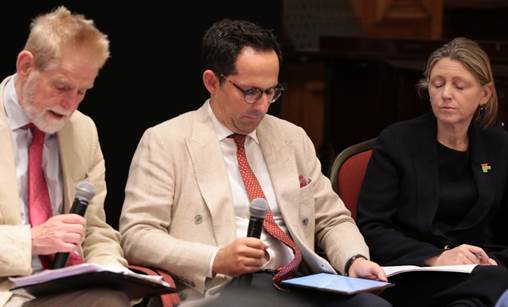
William Horsley, Can Yeginsu and Caoilfhionn Gallagher
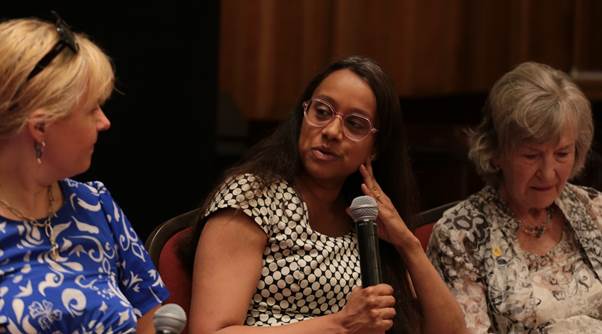
Westminster UNA has funded the introduction of helpful signs now installed on United Nations Green. Although the Green has been used by thousands of tourists since it was named in 2021, the single street sign indicating the name change has proved hard to locate. Now, four new signs have been affixed to each of the entrances to the Green. “We are grateful to those who contributed to our continuing Buy a Brick campaign whose names will feature on our United nations Green website shortly’ said David Wardrop, Westminster UNA Chair.
Even though the very future of the United Nations itself is being questioned, Westminster UNA had no hesitation in commissioning a birthday cake to mark the eightieth anniversary of the signing of the United Nations Charter in San Francisco on 26 June 1946. The cake was enjoyed by all following the LASER Summer Council meeting held at Methodist Central Hall.
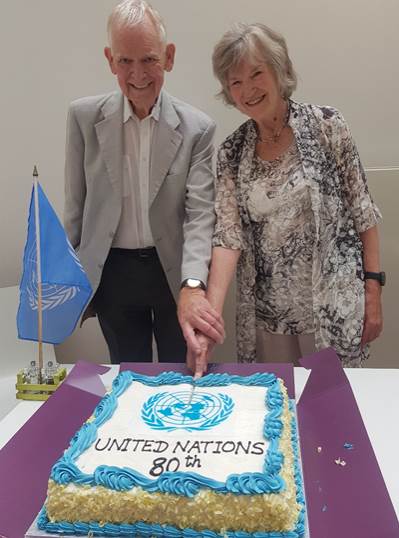
Patricia Rogers, Chair of London & Southeast Region UNA and David Wardrop, Chair of Westminster UNA
Together with UNA-UK, Westminster marked this important UN anniversary. The conference traditionally hosted by the Royal United Services Institute (RUSI) was replaced by a Round Table attended by an invited audience of practitioners, diplomats, civil society, academics and military personnel. This focused on how the UN can make better use of the full spectrum of its peace activities within multidimensional missions. A full report features on our UN Peacekeepers Day page.
The traditional wreath-laying ceremony at the Cenotaph in Whitehall attracted eighty embassies and high commissions who were joined by Lord Collins of Highbury, Minister for the United Nations and representatives of the military, police and UN-linked organisations. Members of 5 Regt. Royal Artillery, recently returned from Operation TOSCA serving with the UN peacekeeping contingent in Cyprus participated and the Band of His Majesty’s Royal Marines, Portsmouth provided musical support.
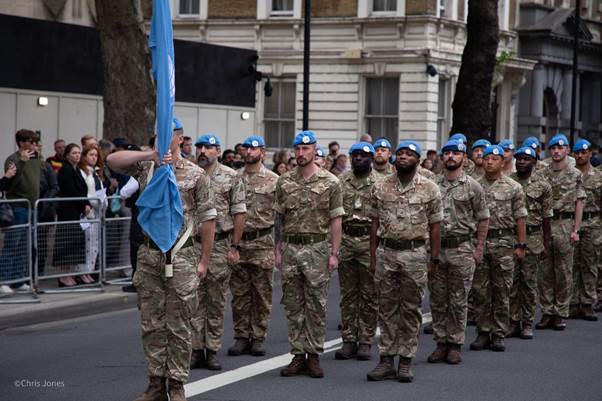
In memory of Count Folke Bernadotte, the UN appointed Mediator in Palestine who was assassinated in 1948 Jerusalem, a wreath was laid by his grandson Count Edward Bernadotte and his son Leonardo. Also, Rear-Admiral Luc Raynal, French Defence Attaché laid a wreath in memory of French officer Commandant René de Labarrière who was killed by a landmine while serving as a Military Observer in Palestine in the same year, becoming the first United Nations peacekeeper to lose his life.
To mark the 75th anniversary of the creation of the Office of the UN High Commissioner for Refugees, Dr Catherine Briddick, Andrew W Mellon Associate Professor of International Human Rights and Refugee Law at the University of Oxford titled her lecture “Fragmented Refuge: It’s Time to Rebuild the Case for Humanity”. Dr Briddick elaborated on the historical context of the international refugee protection system and highlighted the ongoing challenges facing it. The lecture and questions by the audience emphasised the tension between ideals of universal human rights and the fragmented, discriminatory practices currently defining refugee law. A full report of the lecture can be read here and on our International Law Lecture page.
Westminster hosted a meeting in parliament titled “Can the UN ride the AI wave, or will it get left behind?” The event was chaired by Lord Clement-Jones, Co-Chair of the All-Party Parliamentary Group on AI and featured addresses by Anjali Mazumder, Theme Lead on AI and Justice & Human Rights for the Alan Turing Institute for Data Science and Artificial Intelligence and Dr Tony Roberts, Digital Cluster Research Fellow at the Institute of Development Studies, University of Sussex.
The meeting heard that in March 2024, the UN General Assembly had agreed to take a leap in the dark, to ‘seize the opportunities’ that AI can offer. In May, the AI for Good Global Summit coined the phrase “All voices need to be at the AI table", restating the SDG maxim “Leave no one behind”. And in November, its latest report ‘Governing AI for Humanity’ set out a clear course building on the Guiding Principles already set out. So how well has the UN embraced this ‘New World’?
The UN’s High Level Advisory Body on AI observed ‘Along with ensuring equitable access to the opportunities created by AI, greater efforts must be made to confront known, unknown, and as yet unknowable harms. Today, increasingly powerful systems are being deployed and used in the absence of new regulation, driven by the desire to deliver benefits as well as to make money. AI systems can discriminate by race or sex. Widespread use of current systems can threaten language diversity. New methods of disinformation and manipulation threaten political processes, including democratic ones. And a cat and mouse game is underway between malign and benign users of AI in the context of cybersecurity and cyber defence’.
Dr Mazumder referred to AI’s challenges to equity and human rights. She observed that AI is wholly dependent upon data but that whilst it was tackling some of humanity’s greatest challenges, it is also challenging data protection. In fact, in social welfare, some initiatives have been clawed back. Key issues are language and identity. In these cases, AI is in danger of replicating existing imbalances so how can we escape this dilemma? And, she asked, where is data being sent and kept? What seems to be a stabilising force might turn out to be the private sector taking control through data. Human rights issues, for example, are for the state to guard, not privately owned companies. She referred to exciting start-ups in developing countries but these need greater computing power. She cited power, the law and education to be elements in the fight against authoritarianism. In conclusion, she saw AI as a useful power amplifier and she welcomed examples of renewed cooperation between states in this field, set against the widely recognised current drifting apart in the political world.
Dr Roberts referred to research in six African countries, observing that ‘African citizens are increasingly being digitally tracked, profiled, and targeted with malign intent. Mass covert surveillance is taking place in direct contravention of citizens’ constitutional rights, international human rights conventions, and domestic law’. He drew attention to examples of the Gartner Hype Cycle for Emerging Technologies which sets out provide a graphical and conceptual presentation of the maturity of emerging technologies through five phases. He suggested that AI was yet another advance in this cycle, that it should be taken seriously but not to be described as the final solution by any means. He than referred to the requirements for the principle of ‘governing for humanity’ and how the UN’s High-Level Group had set out the risks and sought to assess the dangers associated with each. The most dangerous of this is disinformation and AI applications bring seized upon by the military. Already, there have been summits on Responsible AI in the Military Domain in 2023 and 2024 with the maxim ‘Responsible AI for Safer Tomorrow’. Its ‘Blueprint for Action’ was supported by sixty-one states including Russia and China, laying out a roadmap for establishing norms of AI in the military domain. Whilst this claims to comply with international law, efforts to hold humans responsible and accountable, ensuring reliability and trustworthy of AI, and maintaining an appropriate human involvement is not clear.
In the open session, questioners observed that the AI opportunity had arrived at a difficult time, especially for the Global South. We heard that all ‘advanced technology’ nations are seeking to gather together their own leading tech players, seeking to set out the territory of action. The UK’s Bletchley Park Statement (2023) is one such example. However, with leading tech companies acting like non-state actors, able to take initiatives in several different jurisdictions, one is tempted to believe even the governments have ‘missed the AI wave’. So, where are the levers that have real, effective agency in focusing AI for the improvement of the weakest in the global community, helping accelerate towards the UN SDGs and, yes, bring peace and improve security?
Westminster UNA has shared its disappointment that the Labour government appears to have shown no curiosity in the widely supported UN inquiry into the possible causes of the plane crash in 1961 in which former UN Secretary-General Dag Hammarskjöld and colleagues died. On 24 December, 141 Member States supported a resolution in the UN General Assembly to pursue the continuing UN-led inquiry. David Wardrop, Chair of the Westminster United Nations Association observed “For a decade, the Conservative government along with that of the USA, has engaged in a series of denials, some laughable, seeking to terminate the inquiry. They might well succeed, but in doing so surely damaging their standing in Africa and elsewhere. It is regrettable that this valuable opportunity to demonstrate David Lammy’s commitment to ‘respectful partnerships that listen rather than tell’ has been thrown away. And for exactly what?”
Mr Wardrop noted that the UN Resolution was adopted by the General Assembly only hours before the Azerbaijan Airlines plane crashed in Kazakhstan (25 December). “Let us hope that as the inquiry into the Azerbaijan Airlines plane crash proceeds” he said, “yet another *Permanent Member of the UN Security Council does not resort to withholding pertinent information similarly.” (*At the time of writing, Russia was yet to reveal its activities at the time of the crash)
In welcoming the latest (fifth) report on the continuing investigation into possible causes of the plane crash in which former UN Secretary-General Dag Hammarskjöld and colleagues died, UN Secretary-General Antonio Guterres said ‘let us renew our resolve and commitment to pursue the full truth of what happened on that fateful night in 1961’. The report can be read here and a short video announcing the report can be viewed here.
Antonion Guterres thanked Justice Othman, the ‘eminent person’ appointed to lead the re-opened UN inquiry, for his ‘unwavering commitment to this matter’. He noted that the body of relevant knowledge has grown as shown by each of Justice Othman’s reports. In his report, Justice Othman states it remains plausible that an external attack or threat was a cause of the crash, noting that the alternative hypotheses that appear to remain available are that the crash resulted from sabotage, or unintentional human error.
This latest report reveals important additional information summarised here:
* The 1961/62 inquiries were also affected by partiality. British and Northern Rhodesian officials attempted to influence the findings of those inquiries to conclude that the crash was the result of pilot error, rather than any type of external interference,
* More airfields were available to Avikat, Katanga’s air force, in and around Ndola, some even in Northern Rhodesia, than had been originally considered. Also, Avikat had available more pilots with night-flying experience than first known,
* New information has been provided on the purported “death warrant” against Hammarskjöld attributed to the Organisation Armée Secrète (OAS),
* A retired intelligence officer in the Royal Rhodesian Regiment had spoken about events on the night of the plane crash and might have visited the crash site before its official discovery. Also, he might have had knowledge of a tape recording that was made in the Ndola air traffic control tower but never disclosed.
* The theory that the plane’s pilot intended to land prematurely following an attack requires continued examination and assessment. See our news item of 19 July 2023.
* New information shows continued interactions between Katanga officials, the Rhodesian Federation, the UK and Union Minière du Haut-Katanga regarding support being given to Katanga in its efforts against the United Nations.
* Modern technology such as X-ray photoelectron spectroscopy may be able to better analyse any remaining airframe material now buried than analysis conducted in 1962.
Justice Othman maintains that the UK, USA and South Africa must still hold relevant information despite their protestations. The fifth of his recommendations, listed here, seeks to encourage them to more fully cooperate.
1] the United Nations continue the work through an independent person;
2] key Member States be urged to designate specific points of contact, with all necessary independence, access, clearances, and resources, to work collaboratively on any outstanding queries, including searches in Member States’ security, intelligence and defence archives;
3] all Member States be called upon to provide relevant information and to ensure comprehensive access to all archives, more than sixty years after the crash;
4] all Member States be encouraged to make assistance available to the independent person and those voluntarily assisting the independent person;
5] any further mandate propose that a conclusion be reached regarding whether Member States have complied with the process outlined by the General Assembly; and
6] the United Nations continue work on a dedicated online collection.
Regarding the role played by independent researchers and civil society in pursuing this matter, Justice Othman referred in his report to the conference and forum hosted at the University of London Institute of Commonwealth Studies, School of Advanced Study, in partnership with the United Nations Association Westminster. See news item 29 February 2024.
The Westminster Young Professionals launched its series of social meetings at The Feathers opposite St James’s Park tube station. Future dates will be posted here and on social media. To update new members, Westminster UNA published a Backgrounder listing a small section of its activities over recent years. This can be read here.
Westminster UNA welcomed the UN General Assembly’s adoption of the Pact for the Future, in which Heads of State and Governments — representing the peoples of the world — made 56 pledges to action seeking to protect the needs and interests of present and future generations amid the climate change crisis and conflict currently gripping the globe.
The adoption without a vote concluded months of fierce debate between UN Member States
and within civil society worldwide. That tension continued up to the moment of adoption when the Russian Federation tabled an amendment which suggested that “There is nothing of substance to adopt” and that “Essentially, no one is happy with this text”. It was supported by Belarus, the Democratic People’s Republic of Korea, Iran, Nicaragua, Sudan and Syria. However, the Republic of the Congo, speaking for the African Group, underscored the need to show unity in finding solutions to today’s multiple, complex challenges. Its motion was adopted by a large majority and the Russian amendment was defeated.
(The Russian ploy that ‘no one is happy with this text’ is the same as it used in 1948 before the successful adoption of the Universal Declaration of Human Rights (UDHR). If that ploy had succeeded, deferring the decision to 1949 by when the Iron Curtain had fallen, commentators believe the UDHR would never have been adopted)
Westminster UNA’s second study visit to the UN in Vienna included presentations on a wide range of UN initiatives as well as from other organisations. Over five days, the group discussed the programmes of these UN agencies: UN International Development Organisation (UNIDO), Comprehensive Nuclear-Test-Ban Treaty Organisation (CTBTO), UN Commission on International Trade Law (UNCITRAL), UN Office on Drugs and Crime (UNODC), UN Office for Outer Space Affairs (UNOOSA), and the International Atomic Energy Agency (IAEA).
Outside the UN family, the group had meetings with the Organisation for Security and Cooperation in Europe (OSCE), the International Centre for Migration Policy Development (ICMP), the International Institute of Peace, and the city’s diminutive, unique Peace Museum. We also enjoyed a guided tour of the magnificent Museum of Military History and a visit to the Sigmund Freud Museum.
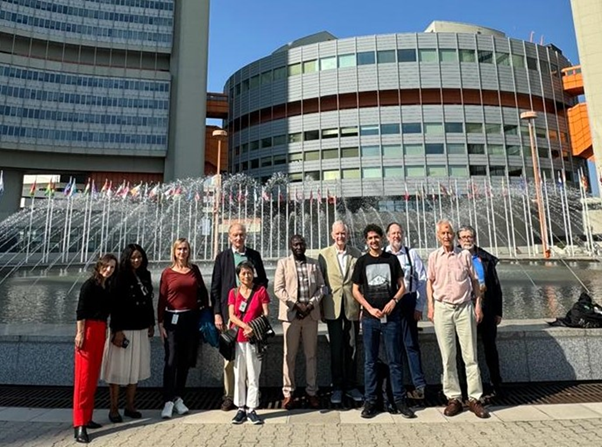
Westminster UNA members attended a service at Westminster Abbey to mark World Humanitarian Day. Despite 75 years of international law to protect civilians and aid workers, violations continue. Civilians and humanitarian workers are paying the price with their lives, while those responsible escape justice.
World Humanitarian Day was initiated following a bomb attack on the Canal Hotel in Baghdad on 19 August 2003. This killed 22 humanitarian aid workers, including the UN Special Representative of the Secretary-General for Iraq, Sergio Vieira de Mello.
The service at Westminster Abbey was attended by many working in the humanitarian field including some who were caught up in the bomb attack in Baghdad. It was followed by a moving event which chronicled the monthly losses of humanitarian workers worldwide, suggesting that such losses could be expected to rise in 2024. This concluded with all present laying white roses on the memorial located near the Abbey’s West Door.
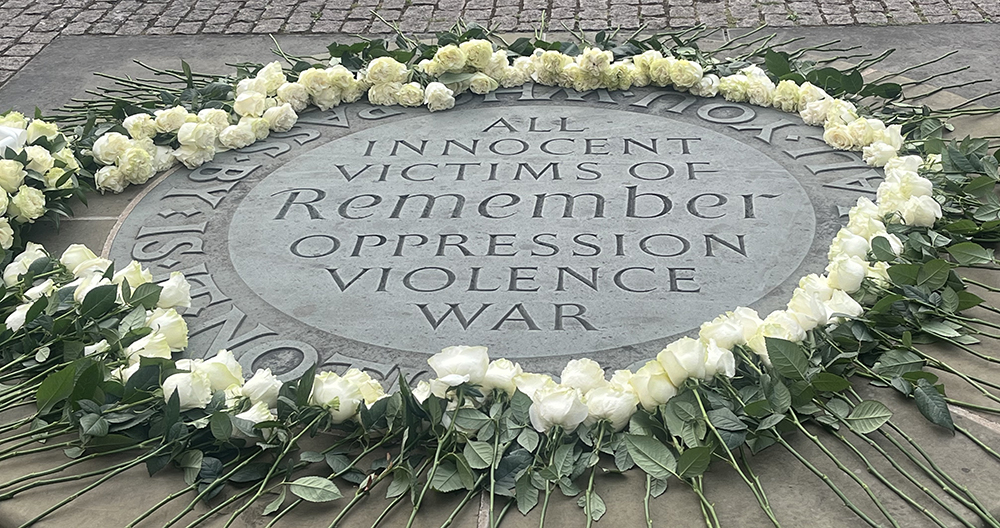
Vivienne Eka, Hon Secretary of Westminster UNA has won a grant from the LASER Trust for Edmonton County Secondary School to develop and deliver its Environment, Climate-change and Sustainability Action Plan.

Programme components will include a new After-School Club to discuss SDG13 (climate action) and sustainability along with activities promoting Earth Day (25 April 2025). A new School Recycling campaign will feature a workshop and competitions. Field visits will engage with local climate initiatives and a photography competition will encourage creative expression of views and opinions of climate change.
The school will post a new Carbon Footprint blog page encouraging pupils to submit their stories about reducing their carbon footprint. Further activities will add to what is already an ambitious and exciting programme.
For the first time since 2019, RUSI hosted the annual UN Peacekeepers Day conference in-person following online events caused initially by COVID and then RUSI’s extensive rebuild programme. The programme drew a capacity audience.
Following a welcome from Dr Karin von Hippel, Director-General, RUSI, attendees were addressed by HE Mr Yoon Yeocheol, Ambassador of the Republic of Korea.
The morning session titled Better Informed and Better Connected featured Dr Alexandra Novosseloff, Centre Thucydide of the University Paris-Panthéon-Assas whose address was titled Gathering Intelligence to Operate Effectively, Without Alienating Partners. Colonel Simon Horne, RUSI British Army Visiting Fellow, spoke to Building medical capacity through training and mentoring. The planned online presentation by Whit Mason, RUSI Associate Fellow, titled Strategic Communication – Gaining Consent to Operate in the Host Nation failed in transmission and will be posted on the RUSI website soon.
The Folke Bernadotte Memorial Lecture titled The UN Peacekeeping Force in Cyprus 60 Years On was given by Colin Stewart, the UN Secretary General’s Special Representative and Head of the United Nations Peacekeeping Force in Cyprus.
The Dame Margaret Anstee session titled Caring for Peacekeepers was chaired by Barbara Cleary, Chair for Security Women and featured Lt Colonel Sophie Gregory and Colonel Dr Manal Abu Al Ghanam, Jordanian Armed Forces, speaking to the topic of Experiences of women in Peacekeeping.
The closing keynote address titled Supporting the Mental Health of Peacekeepers was given by Professor Neil Greenberg, Professor of Defence Mental Health, King’s College London. The session was chaired by Jonathan Eyal.
The conference was kindly sponsored by the Embassy of the Republic of Korea.

The twentieth annual wreath-laying ceremony marking the International Day of UN Peacekeepers was held at the Cenotaph in Whitehall following tradition. Those laying wreaths were led by Colin Stewart, Special Representative and Head of the United Nations Peacekeeping Force in Cyprus, marking the 60th anniversary of UNFICYP. Wreaths were also laid by Astrid Bernadotte in memory of her grandfather Count Folke Bernadotte and by Vice Admiral Hervé Hamelin, French Defence Attaché, in memory of Commandant René de Labarrière. Both of these were killed in Palestine in 1948, leading to the first UN peacekeeping deployment.
Wreaths were also laid by Lord Ahmad of Wimbledon, Minister for the United Nations, Air Vice-Marshall Rich Pratley, Assistant Chief of Defence Staff for Support Operations and Chief Constable Gavin Stephens, Chair, National Police Chiefs’ Council. Members of the Diplomatic Corps representing eighty Missions laid wreaths also.
The ceremony was attended by serving UK contingents recently returned from UN service in Cyprus and the Sahel. The Band of the Royal Air Force College provided musical support.
The ceremony was kindly sponsored by the Embassy of the Republic of Korea.
The full programme can be read here.

Westminster UNA Young Professionals’ guest in their refreshed ‘Meet the Ambassador’ series was HE Yannis Tsaousis, Ambassador of the Hellenic Republic of Greece. The event was held at the National Liberal Club and co-hosted by the National Liberal Club Commonwealth and European Forums.
Ambassador Tsaousis spoke to the practicalities of diplomacy which are often misunderstood as promoting national foreign policy positions. He explained that the process of setting goals and identifying appropriate tools for the implementation of foreign policy enables diplomats to accurately reflect the needs of the people and the country as a whole.
The Ambassador stated that Applied Diplomacy could be practiced at the bilateral or multilateral level, or even a combination of the two. Within this, there were several tools including working with like-minded countries, bringing in others through collective decision making, and using trilateral channels to connect one’s close allies. He pointed to tangible actions such as trade in specific regions and the opening of new embassies which can have a huge impact, as in the case when Greece closed one embassy in Africa and opened a new one. Throughout his presentation, a recurring theme was taking the opportunity to use difficult situations to strengthen relationships with other parties.
In fielding questions about the challenges of posing difficult questions to partners, Mr Tsaousis recognised that we all have our own differences and that we should understand partner positions beforehand. Also, he emphasised the need to avoid personalising challenges between partners, rather to build upon our shared priorities.
Ambassador Tsaousis provided a refreshingly candid insight into the day-to-day activities of a diplomat and the tools used to achieve positive change for all parties. In closing, he thanked all present for their interest and looked forward to returning to discuss further economic elements of diplomacy.

The Study Visit will include meetings with UN agencies located in the Vienna International Centre and also with leading NGOs based in this charming city. Participants will arrange their own travel to Vienna, and we will offer three options for accommodation and meals.
1: Hotel with breakfast and dinner included,
2: We assist in finding you shared accommodation with the option to join the main groups for dinners,
3: You arrange your own accommodation and meals, joining for the scheduled programme only.
For an idea of the probable programme, please scroll to the news item for 10 October 2015 which covered our study tour to Vienna in 2015.
To register your interest, this link will be activated before the end of March.
The 20th annual Ruth Steinkraus-Cohen International Law Lecture was delivered by Professor Kingsley Abbott, Director of the Institute of Commonwealth Studies, University of London. The title of his address Tenacity and innovation: developments in the global fight against impunity suggested a degree of optimism to those who feared that authoritarianism, instability and conflict are on an unstoppable ascent, challenging the foundations of the multilateral system and the principle of the Rule of Law.
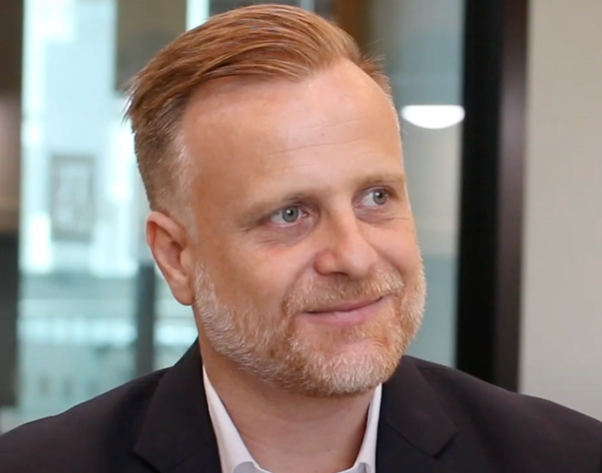
Professor Kingsley Abbott
He noted the challenges to recognised intergovernmental institutions such as the International Court of Justice, an organ of the United Nations and attacks on the International Criminal Court (ICC), remarking that some might see the very survival of the international Human Rights structure to be a miracle in itself. But, he argued, civil society in many countries had shown itself to be robust and universally supportive of Human Rights driven initiatives.
As example, when Myanmar’s rulers thought they would be insulated from international jurisdiction, the Bangladesh government in whose territory the refugee Rohingya peoples had fled initiated proceedings against them in the ICC. Many states now exercise ‘universal jurisdiction’ and some have set up War Crimes Units. Also, there are now more fact-finding missions units run by non-state organisations – some claim as many as 166 - working faster than can the mechanisms of the UN or other human rights bodies. Further, these organisations are collecting data on an enormous scale, as much as 250 terabytes of criminal evidence.
It is in this field that the ‘tenacity’ mentioned in the lecture’s title is witnessed. Also, new legal strategies are being introduced and relevant printed matter is widely available. For online access, he cited the Open Society Foundation barometer launched in September 2023 which serves as a global reality check, painting a picture of the attitudes, concerns, and hopes of people across thirty countries—making it one of the largest studies of global public opinion on human rights and democracy ever conducted. These surveys show that the demise of democracy has been ‘greatly exaggerated’.
Professor Abbott took questions from the audience after which Sam Townend KC, Chair of the Bar Council of England and Wales gave the vote of thanks.
This event organised by Westminster UNA was hosted by the Centre for International Studies and Diplomacy at SOAS and supported by the Bar Council of England and Wales. The complete text of the lecture can be read here
The annual UNA London & Southeast Region (LASER) Policy Conference held at the Bermondsey Village Hall witnessed intense debate on seventeen resolutions. Topics ranged from a proposed financing levy for clean water to the crisis in Ukraine, and from calls on the UK government to commit to its to Second Voluntary National Review of the UN Sustainable Development Goals to the plight of Palestine 100 years after the Balfour Declaration.
Westminster submitted three resolutions. The first concerned the treatment of refugees and asylum seekers in the UK and Europe, following up the Europe-wide Campaign to Stop the Inhumanity on Europe’s Borders, launched in London on 30 January, and which has gathered wide support throughout Europe (see news item 30 January 2024). At the meeting, we were able to announce that the campaign has now contacted all European political leaders.
The second resolution pointed to the UK’s diminished role in the UN’s Human Rights treaty bodies. We shared our dismay that the UK government had stated in 2020 that it would not nominate a candidate for any one of the 172 seats on the ten Human Rights treaty bodies due for election that year. This decision had been taken as the time we have been marking the 75th anniversary of the adoption of The Universal Declaration of Human Rights and when the international human rights framework has been challenged. Also, we shared our dismay that although Human Rights and Democracy, the FCDO’s 2022 report published in July 2023, refers to human-rights linked initiatives it supports, it makes no reference to any of the UN Human Rights treaty bodies. We sought support for our call on the UK government to immediately revise its current stance on UK membership of UN Human Rights bodies and to re-engage with them, nominating candidates for election when next possible.
The third resolution titled How did Dag Hammarskjöld die? drew attention to our long-running campaign to support the reopened UN inquiry into the plane crash in which the UN Secretary-General Dag Hammarskjöld and others died in 1961. We urged for added pressure on the UK government to extend full cooperation to Judge Othman’s inquiry and to grant him access to documents held for over 60 years by MI5, MI6 and GCHQ, all active in the region at the time of the event.
All our resolutions were adopted. The annual UNA London & Southeast Region (LASER) Policy Conference, open to all paid-up UNA members living in the LASER designated area, has now become the premier policy making forum for its members.“From the totality of the information at hand, it appears plausible that an external attack or threat may have been a cause of the crash, whether by way of a direct attack … or by distracting the pilots at the critical stage of preparing to land.” Justice Mohamed Chande Othman, Eminent Person leading the continuing UN Commission of Inquiry (2022 Report).
Speaking at a conference held in London and watched online, leading international experts accused the US and UK of major obstructions to the ongoing UN investigation into the crash. They insisted that the mandate of the ongoing UN inquiry into the causes of the crash led by Justice Othman should be extended beyond the end of the current UN General Assembly.
They noted that, despite overwhelming support within the UN General Assembly for Justice Othman's mandate, the UK and US have consistently declined to co-sponsor further resolutions for renewal. This underscores the challenges faced in obtaining transparency and cooperation from key UN Member States.
At the conference, firm support was led by Zambia’s High Commissioner to the UK, HE Mrs Macenje Mazoka, and others from the Global South including the Archbishop of Cape Town, Most Revd Thabo Makgoba. Speakers noted that this highlights the dividing line in current geopolitics with efforts to uncover the truth being hindered by insufficient cooperation and transparency from the US and UK. However the Global South is well represented among the 142 UN Member States which have supported the investigations. However, the persistence of Justice Othman and the growing support from independent investigators signal a commitment to uncovering the truth behind this historic tragedy.
The current UN inquiry was prompted by the publication in 2011 of "Who Killed Hammarskjöld?" written by Dr Susan Williams, Senior Research Fellow in the Institute of Commonwealth Studies (ICwS) which led to recommendations from eminent jurists chaired by Sir Stephen Sedley, prompting the UN to reopen its inquiry and later appointing Justice Mohamed Chande Othman to lead investigations. There is now wide consensus that the plane crash was not an accident or caused by pilot error. Recognising the likelihood of key information held in member states' intelligence and security archives, Justice Othman requested that the relevant member states appoint independent and high-ranking officials to conduct thorough searches of such archives. While Belgium, Sweden, and Zimbabwe demonstrated serious efforts, the US and UK responses were wholly inadequate and showed contempt for the UN inquiry.
The keynote address was given by Ambassador Jan Eliasson, Former UN Deputy Secretary-General and Swedish Foreign Minister (no transcript), and the conference was addressed by Stephen D Mathias, United Nations Assistant Secretary-General for Legal Affairs, on behalf of the UN Secretariat. There followed a recording of a BBC News interview with Mama Kankasa who sighted Hammarskjöld’s plane shortly before it crashed and a video message from UN Secretary-General Antonio Guterres.
Other speakers included the following (click on name for presentation):
Her Excellency Ms Macenje Florence Mazoka, High Commissioner for the
Republic of Zambia to the UK
Sir Stephen Sedley, Chair, 2012-13 independent Hammarskjöld Commission.
Presentation introduced and read aloud by Dr Stuart Mole
Dr Henning Melber, Director Emeritus, Dag Hammarskjöld Foundation, Uppsala
Dr Alanna O’Malley, Associate Professor, Institute for History, Leiden University
Dr Roger Lipsey, author of Hammarskjöld. A Life
Dr Thant Myint-U, Christ’s College, University of Cambridge
Dr Mandy Banton, Senior Research Fellow, Institute of Commonwealth Studies
The Rt. Revd. Dr Trevor Musonda Mwamba, President, United National Independence Party, Zambia
Maurin Picard, US correspondent, Le Figaro and Le Soir,
Dr Susan Williams, Senior Research Fellow, Institute of Commonwealth Studies
David Wardrop, Chair, Westminster UNA and Editor, hammarskjöldinquiry.info
These presentations were followed by a productive Round Table chaired by the Rt Hon the Lord Boateng, former UK High Commissioner to South Africa who was joined by Joe Lauria, Editor-in-Chief Consortium News and former UN correspondent at The Wall Street Journal, Dr Henning Melber, Dr Alanna O’Malley and Maurin Picard.
In closing the event, Lord Boateng said:
“The work must continue because it is part of a wider struggle to support democracy, the international rule of law, and the UN, all under increasing threat. There must be no stone unturned to get at the truth. The suspected murder of a UN Secretary General is a crime too grave to be obliterated by time” and
Professor Kingsley Abbott, Director of the Institute of Commonwealth Studies, said:
“It is unfortunate that the apparent killing of a United Nations Secretary General has revealed yet another example of the Global North - South divide".
The conference was hosted by the Institute of Commonwealth Studies (School of Advanced Study, University of London) and its Director, Professor Kingsley Abbott. It was held in association with the Westminster United Nations Association. The conference was live-streamed leading to reports by twenty-seven media groups. An edited video will be posted on this page and on the ICwS website.
The Europewide campaign ‘Stop the Inhumanity at Europe’s Borders’ was launched in Methodist Central Hall Westminster. The campaign has now attracted the support of eighty-five experienced and expert organisations from seventeen countries working in the fields of humanitarian response, asylum, and migrant rights. They seek to pressure European governments and relevant European institutions to profoundly reform the current border regime and practices, and to stop the appalling inhumanities being experienced by people on the move. Westminster UNA joined the campaign on 29 October 2023.
The campaign launch was hosted by Enver Solomon, Chief Executive, Refugee Council UK and the project’s seven aims (see below) were outlined by Dr Jeff Crisp, Associate Fellow, Refugee Studies Centre at the University of Oxford. The programme featured recorded interviews with Lord Alf Dubs, noted campaigner for refugee rights, David Yambio, Human Rights Defender, and Co-founder of www.refugeesinlibya.org and Rossella Miccio, President, Emergency Worldwide (Italy).
These presentations were followed by statements in person made by Elise Martin Gomez, Head of EU Advocacy, Forum Refugies (France), Gulwali Passarlay, author and activist, and Dr Lul Seyoum, Director, International Centre for Eritrean Refugees and Asylum-seekers. The panellists then fielded questions from the audience, both in the room and online.
Martin Barber and Jean-Baptiste Richardier, the co-founders of United Against Inhumanity offered closing remarks and thanked the Revd Tony Miles, Superintendent Minister for Methodist Central Hall for use of its Chapel. The campaign’s next step will be to forward its claims to the heads of state of all European countries.
The campaign’s seven aims
Stop Pushbacks – European states must immediately desist from pushbacks and expulsions on land and at sea and halt the practice of detaining people in punitive conditions.
End ‘deterrence by death’ – All activities aimed at preventing rescue at sea must cease. Mediterranean states must agree to facilitate initiatives that prevent loss of life at sea.
Humane Borders – Where border control agreements between European and other states cause refugees and other migrants to be treated in a manner that violates their human rights, such agreements must be terminated. Relevant international organisations must have full access to, and be allowed to assist, all those in need of protection and assistance in non-European countries.
Justice and Compensation – When refugees and other migrants lose their lives, are criminalized, injured, or suffer other forms of grievous harm at the hands of European states, such episodes must be investigated by an independent judicial authority. The government ministers and officials responsible for such abuses must be held to account. Justice and compensation must be provided for the victims of such harms.
Safe Routes – Cooperating closely with relevant international organizations, European states should explore the potential for refugees to reach and establish productive lives in Europe by safe and regular means, including state and community-sponsored resettlement programmes, family reunion and labour mobility initiatives.
No Externalization – States must not adopt de-humanizing legislation that outsources or externalizes their asylum obligations to non-European states. It is unacceptable for refugees and asylum seekers to be treated as commodities and deported to countries where there are inadequate human rights safeguards, which do not have adequate refugee status determination procedures, and where livelihood opportunities are scarce.
Reform Frontex – The EU’s border agency, Frontex, must be held fully accountable and be transparent in its activities and reporting methods. The agency must operate in a manner that enables member states to uphold their obligations under international law, including the right to seek asylum.
To mark the seventy-fifth anniversary of the adoption of the Universal Declaration of Human Rights (UDHR), Westminster UNA hosted a debate titled “Human Rights: universal values or mere political construct?”
The debate was chaired Baroness Frances DeSouza, former Director of Article 19, who first introduced Professor Merris Amos of the Human Rights Law Centre at Queen Mary University. Professor Amos agreed that the UDHR was a political construct, always based on pragmatism, even a compromise. However, it captured the public imagination in a comparable way to the Magna Carta. If asked to redraft it, she would strengthen obligations on states to act in the public interest and with greater transparency. Attempts to incorporate state duties into human rights treaties have been attempted but texts have lacked impact. While pessimists speak of a growing regression from established Human Rights norms, she stated it was wrong to blame international human rights law for civil and institutional breakdown. She concluded by stating that with almost every nation incorporating a bill of rights into their constitutions, the UDHR’s anniversary should be rightly celebrated.
Schona Jolly KC of Cloisters Chambers pointed to the utility of human rights language relating to armed conflicts as in the current case before the International Court of Justice brought by South Africa against Israel. She argued that the UDHR should be seen as a launch pad leading to human rights principles being embedded in later treaties that impact all of us and give hope. However, a plethora of cases now show where respect for human rights is going into reverse. We must challenge the new cynicism infecting democracies and totalitarian systems alike. The Daily Mail headline (November 2016) Enemies of the People and similarly dangerous proposals that the UK should renounce membership of the Council of Europe and the authority of the European Court of Human Rights which claim that these bodies stand in the way of the “will of the people” should be called out.
She concluded, stating that whether human rights are universal or a political construct, treaties have created a compelling narrative of human progress despite their negative portrayal in the media, and to reinforce this, better education on the subject is sorely needed.
Baroness DeSousa then moderated a lively exchange of views with the audience, covering issues relating to women’s rights in Saudi Arabia, China’s interpretation of cultural rights, the impact of social media, inadequate human rights education in the UK syllabus, and other issues.
The meeting ended on a cautionary note, that whilst the creation of the United Nations was a great achievement and the separate International Criminal Court represented a milestone in human rights law, it may need another seismic event on the scale of a major war to bring about significant further advances.
Baroness DeSouza then cut the birthday cake celebrating the 75th anniversary of the Universal Declaration of Human Rights. In the image, Professor Amos (right) and Schona Jolly KC (left) flank her.
The meeting also included the Westminster UNA’s annual general meeting. The annual report for the year ending March 2023 can be read here.
On 10 December, Human Rights Day, Westminster UNA marked the 75th anniversaries of the adoption of the Universal Declaration of Human Rights and, more sadly, the first deaths of United Nations staff in Palestine and Israel while working in the cause of peace. These included Count Folke Bernadotte of Sweden, appointed UN Mediator in Palestine, assassinated shortly before the Universal Declaration was adopted and also more than one hundred and thirty UNRWA employees in Gaza since the Hamas-led atrocity of 7 October.
The simple wreath-laying ceremony in their memory took place on United Nations Green and was led by members of the Westminster UNA Young Professionals. After they had laid the wreath, they signed a copy of the Universal Declaration, named by Eleanor Roosevelt as the Magna Carta of Mankind, committing all present to its core principles. Prayers were led by the Revds. Tony Miles and Lansford Penn-Timity, both of Westminster Central Hall.
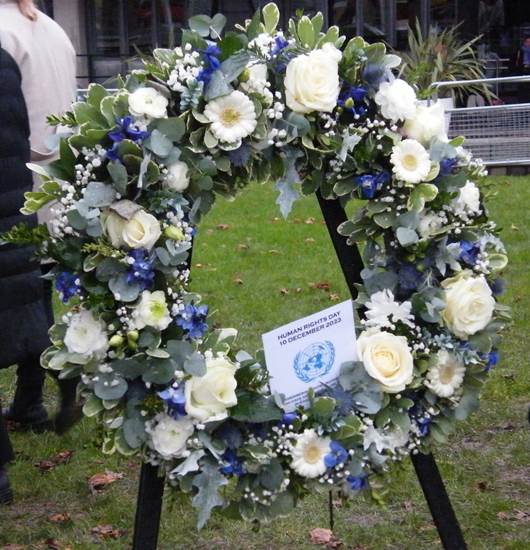
Speaking to the title ‘When our cultural heritage is destroyed, our children are dispossessed’, Professor Peter Stone, UNESCO Chair in Cultural Property Protection & Peace at Newcastle University, stressed the importance of intergovernmental treaties in ensuring cultural property is protected in times of conflict. The 1954 Hague Convention on the Protection of Cultural Property in the Event of Armed Conflict and its 1954 and 1999 Protocols point the way but how will these be actioned? He argued that cultural property can only be protected if the value of that protection is sufficiently understood and that the process is started in peacetime. Cultural Property Protection (CPP) must not be seen as an added burden to a military deployment or peacekeeping mission but as an integral part of good practice and as part of the humanitarian portfolio. As example, in 2019, the revised mandate for the UN peacekeeping mission in Mali (MINUSMO) was extended to include consideration of the environmental impacts of its activities, ‘managing them and operating mindfully in the vicinity of cultural and historical sites’.
Cultural property provides the tangible and intangible link to the past and helps to provide individuals and communities with a sense of place, identity, belonging, and dignity. Once destroyed, the time needed to rebuild society lengthens greatly. He cited the cases the destroyed mosque in Brčko in Former Yugoslavia and the systematic attacks on the Yazidi population by Islamic State.
In his capacity since 2020 as President of the Blue Shield, the ‘Red Cross’ for cultural property, he stressed its independent, impartial, and neutral identity. Currently, it is working with its national committees, advising all parties whether cultural, military or judiciary, on how the preservation of cultural property is a vital element of the continuity of society and its traditions.
Professor Stone then answered questions from the large audience. His PPT presentation can be shared upon request to info@unawestminster.org.uk. The meeting was held in the House of Lords, kindly hosted by Baroness Garden of Frognal.
With 2023 marking the seventy-fifth anniversary of the adoption of the Universal Declaration of Human Rights in 1948, Westminster UNA has created a series of thirty images for presentation to the Foundation for Endangered Languages for display at its 27th annual conference to be held in Rabat, Morocco in late November. Each image links one of the Declaration’s thirty Articles to an endangered indigenous language and features the text of the Article in both English and the indigenous language. Also, they provide information about the community speaking that language as in the example shown below. The set of thirty images is freely available for all to use. For further information, please contact info@unawestminster.org.uk
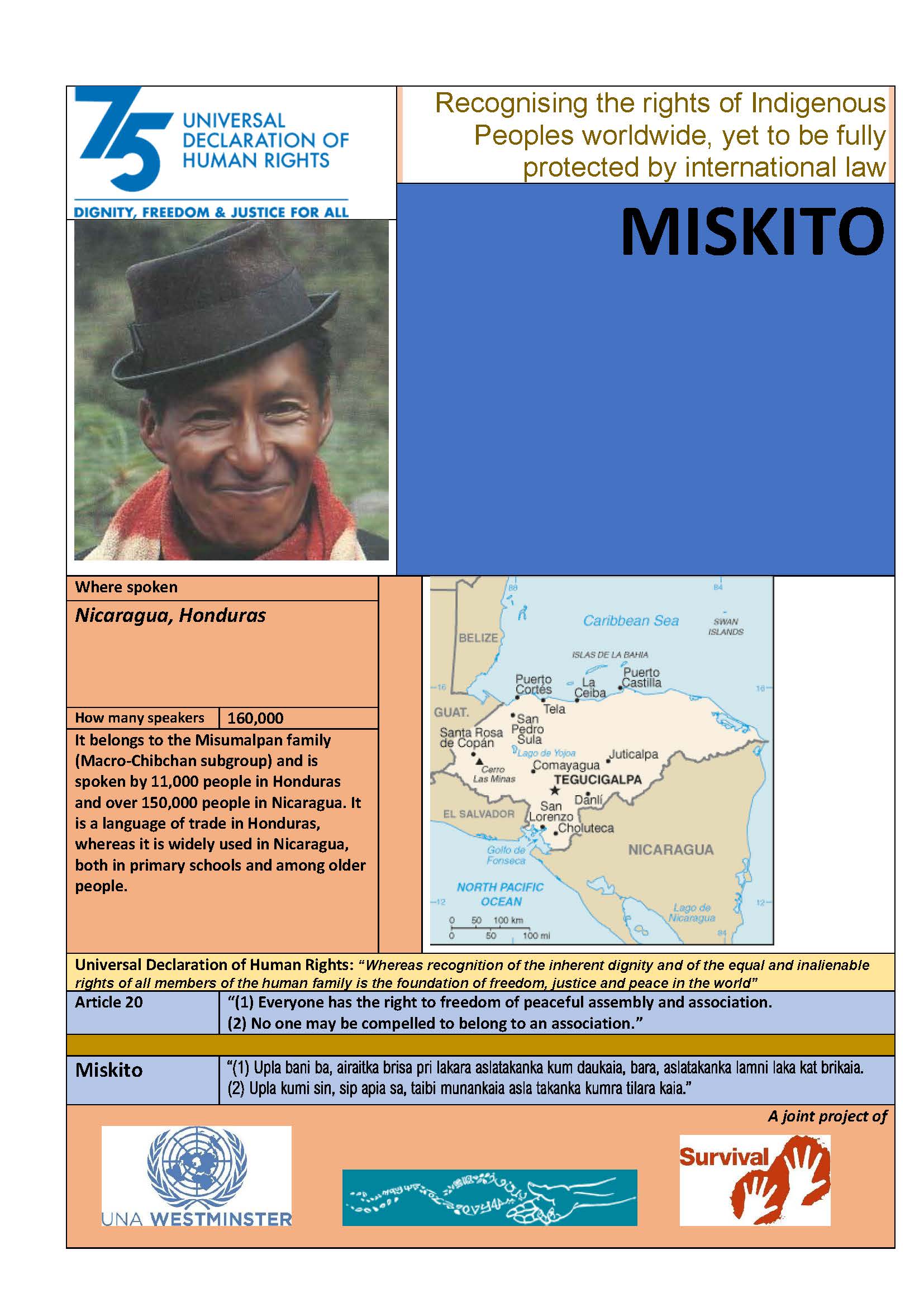
Westminster UNA has joined the collective demand for action titled ‘Stop the Inhumanity at Europe’s Borders!’ The campaign points to refugees, asylum seekers and other migrants throughout the world being treated in cruel and illegal ways. Some European states are systematically violating the rights of people attempting to escape from persecution, armed conflict, disasters, and deprivation. At Europe’s borders, such people are confronted with the constant threat of destitution, detention, exploitation, and physical violence. In the worst cases, their lives have been lost, both at sea and on land.
This Collective Demand for Action has now been signed by more than fifty civil society organisations in several European countries. All signatories are united in their call for humanity in the treatment of people on the move. The demands are:
Stop Pushbacks – European states must immediately desist from pushbacks and expulsions on land and at sea and halt the practice of detaining people in punitive conditions.
End ‘deterrence by death’ – All activities aimed at preventing rescue at sea must cease. Mediterranean states must agree to facilitate initiatives that prevent loss of life at sea.
Humane Borders – Where border control agreements between European and other states cause refugees and other migrants to be treated in a manner that violates their human rights, such agreements must be terminated. Relevant international organisations must have full access to, and be allowed to assist, all those in need of protection and assistance in non-European countries.
Justice and Compensation – When refugees and other migrants lose their lives, are criminalized, injured, or suffer other forms of grievous harm at the hands of European states, such episodes must be investigated by an independent judicial authority. The government ministers and officials responsible for such abuses must be held to account. Justice and compensation must be provided for the victims of such harms.
Safe Routes – Cooperating closely with relevant international organizations, European states should explore the potential for refugees to reach and establish productive lives in Europe by safe and regular means, including state and community-sponsored resettlement programmes, family reunion and labour mobility initiatives.
No Externalization – States must not adopt de-humanizing legislation that outsources or externalizes their asylum obligations to non-European states. It is unacceptable for refugees and asylum seekers to be treated as commodities and deported to countries where there are inadequate human rights safeguards, which do not have adequate refugee status determination procedures, and where livelihood opportunities are scarce.
Reform Frontex – The EU’s border agency, Frontex, must be held fully accountable and be transparent in its activities and reporting methods. The agency must operate in a manner that enables member states to uphold their obligations under international law, including the right to seek asylum.
Westminster UNA Chair David Wardrop has now attended his investiture as a Member of the Most Excellent Order of the British Empire held at Windsor Castle. The award, recognising his ‘Services to the United Nations and its Institutions’, was presented by the Princess Royal.
David was accompanied at his investiture by Westminster UNA Vice-Chair Paul Mrazek and Honorary Secretary Vivienne Eka and Kirsteen Say, widow of the late William Say, a longtime member of the Westminster UNA Executive Committee (Standing on right in image below).
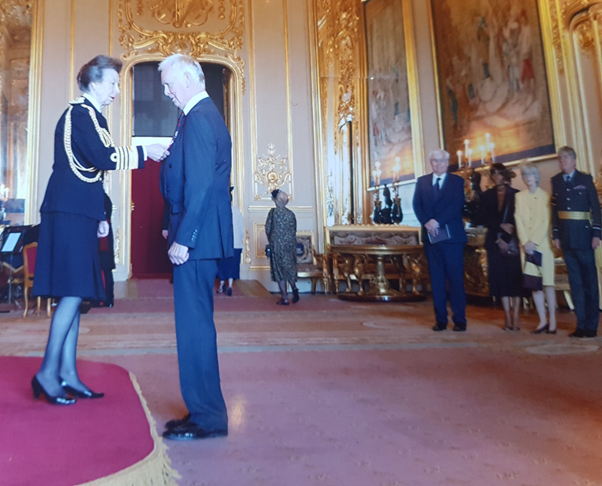
Westminster UNA deplores the government’s cynicism as the new Illegal Migration Bill moves towards Royal Assent later this year.
The opening guidance on the government’s website is both chilling in its language and patently a case of unfinished business, a deplorable statement by legislators claiming to be speaking in the name of their constituents. Firstly, its opening text is chilling:
The Illegal Migration Bill will change the law to make it unambiguously clear that, if you enter the UK illegally, you should not be able to remain here. Instead, you will be detained and promptly removed either to your home country or to a safe country where any asylum claim will be considered. You will no longer be able to frustrate removal attempts with late or spurious legal challenges or appeals, and once removed, you will have no right to re-entry, settlement or citizenship.
Secondly, it is clearly a case of unfinished business in that it states:
The only way to come to the UK for asylum will be through safe and legal routes and, as we get a grip on illegal migration, we will create more of those routes.
Here it admits that such ‘safe and legal routes’ have yet to be identified, let alone tested in either the field or in the courts.
David Wardrop, Chair, Westminster UNA, stated “While it may be the case that the majority of the British population will associate with efforts to ‘stop the boats’, I do not believe they would have agreed to the fate of those amendments that sought to humanise the Bill, as tabled in the House of Lords on Monday 17 July. Let it be clear to all: the United Nations Offices of the High Commissioner for Human Rights and the High Commissioner for Refugees both state unequivocally that the Bill is in breach of international law and non-compliant with our hitherto recognised international obligations.”
The UN statement can be read here
In opening his address, David Hammond, Chief Executive of the NGO Human Rights at Sea, revealed alarming statistics: there are thirty million people at sea at any moment; amongst those, forty-five percent of women working at sea reported sexual harassment; and an unknown number, thought to be between thirty and one hundred thousand fishers lose their life at work every year. David Hammond's entire powerpoint presentation can be followed here.
In responding to the title of the meeting, ‘Who cares about human rights beyond the horizon?', he stated that his organisation’s mission was to end human rights abuse at sea. A landmark effort towards this has been the launch of the Geneva Declaration of Human Rights at Sea in 2022. This important international instrument is structured around four principles central to the protection of human rights at sea:
a) Human rights are universal; they apply at sea, as they do on land.
b) All persons at sea, without any distinction, are entitled to their human rights.
c) There are no maritime specific reasons for denying human rights at sea.
d) All human rights established under both treaty and customary international law must be respected at sea.
However, such Declarations need governmental support, as evidenced by the historic move taken by the New Zealand government which has updated its Maritime Transport Act (1994) responding to effective lobbying by the New Zealand Seafarer’s Welfare Board into failures to financially support seafarers and their welfare services by Human Rights at Sea.
David Hammond listed other cases where human rights at sea continue to be flouted, referring to the plight of women and children, fishers, slavery at sea, mariners abandoned on their ships - there are 3000 at this moment - and migrants seeking to traverse the Mediterranean and the Dover Strait.
David Hammond served as an officer in the Royal Marines in many of the world’s oceans and founded Human Rights at Sea, a UK-registered charitable NGO, in 2014, having witnessed the scale of human rights abuses that take place at sea. Having qualified as a barrister, he also teaches on international human rights and international humanitarian law worldwide. In 2022, Human Rights at Sea gained special consultative status with the UN’s Economic & Social Council (ECOSOC). Also, it holds Observer status for the Western and Central Pacific Fisheries Commission.
The meeting was held in the House of Lords and hosted by Lord Teverson, a patron of Human Rights at Sea.
Westminster UNA hosted an informative event titled “How two cartoonists portrayed international cooperation with wit and satire”. This introduced the remarkable collaboration between Aloïs Derso and Emery Kelen who first worked together in 1923 and continued until well after World War Two.
Stefan Slater and David Macfadyen, co-authors of “The Political Cartoons of Derso and Kelen: Years of Hope and Despair” (Lund Humphries 2023), introduced the work and careers of the two cartoonists, revealing their extraordinary political insights into international affairs. Drawing on their own original research, the co-authors led their audience through the key moments in history so forensically captured by these two artists through their cartoons, a format too little recognised as valid historical evidence. Later, the co-authors responded to questions from the audience before signing copies of their book.
The meeting was held in the Chapel of Methodist Central Hall Westminster with the kind agreement of the Revd Tony Miles, Superintendent Minister.
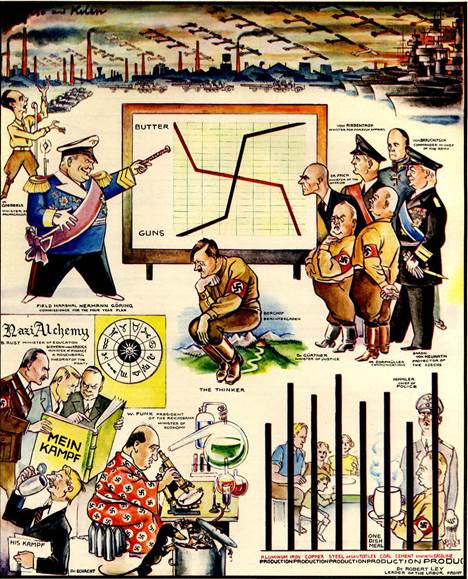
Westminster UNA has welcomed UNA-UK’s latest Blue Smoke report, "The appointment of the UN Secretary General and other executive heads: opportunities for reform". This sets out 10 actionable ideas for the General Assembly to strengthen UN appointment processes and provides detailed analysis on the under-explored issue of interruptions to a Secretary-General’s term of office.
Westminster UNA was an early supporter of the globally successful ‘One for Seven Billion’ campaign launched in 2014 which advocated a more transparent selection process for the post of UN Secretary-General. At the time (News Item 3 December 2014), we stated that this initiative did not extend to cover appointments for other top UN posts, referencing the intention of the UN Department of Management (UNDM) to extend the scope of Senior Managers’ Compacts (2006) to include such posts. The new UNA-UK report addresses these points, and we will follow how it progresses and will report back to our members. The Report can be read here.
It is with great sadness that Westminster UNA announces the death on 10 June of Sir Peter Marshall, aged 98.
Sir Peter’s fruitful and enjoyable association with Westminster UNA started on 10 January 2016 at Methodist Central Hall Westminster when we jointly held a service to mark the 70th anniversary of its hosting the first meeting of the UN General Assembly in 1946. A highlight of the service was a spirited and illuminating exchange between Sir Peter and the Revd Tony Miles. Sir Peter stated he considered the UN to be the greatest experiment in international cooperation the world has ever seen. “The UN has changed international relations from the zero-sum game of classical diplomacy to the positive-sum diplomacy of the modern world. The benefit to humankind has been enormous” he stated.
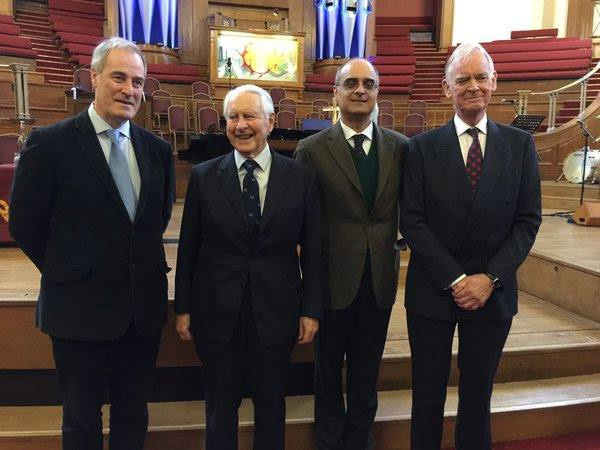
Lord Bates, Sir Peter Marshall, Kishan Manocha and David Wardrop
From then on, Sir Peter contributed a series of articles to our news pages. These were:
12 January 2020 In ‘The world we seek in 2020’, he made a plea that the UK should remain as globally oriented once it leaves the EU as it was 75 years ago at the foundation of the United Nations.
23 June 2020 He chronicled the UN’s seventy-five years.
15 December 2020 He urged support for multilateralism and for the United Nations.
26 June 2021 In ‘On our way!’, he charted progress in the year since marking the UN’s 75th anniversary in June 2020.
21 September 2021 In ‘Multilateralism a year on’, the first of three essays, he reviewed the year now passed since the Declaration on the Commemoration of the 75th anniversary of the UN.
6 January 2022 His second essay ‘Capability our compass: Multilateralism our lodestar’ heralded Westminster UNA’s inaugural event marking the opening session of the UN General Assembly.
29 May 2022 In ‘The clarion call to multilateralism - in Ukraine's finest hour’, the third essay in his trilogy, he pointed to those current political developments which demonstrate the resilience of the multilateral system and those which point to its weaknesses.
3 May 2023 His final contribution was a concise but remarkably informative guide to the accession of King Charles III and the ceremony of the Coronation.
Westminster UNA was delighted when Sir Peter accepted our invitation to become a Vice-President, recognising all the assistance he had given us over these years. We were so fortunate to work with and to learn from such a distinguished colleague.
Sir Peter served as a navigator in the RAF from 1943 to 1946, later joining the Diplomatic Service. He took on senior appointments in Paris, Geneva and London, becoming UK representative on the Economic and Social Council of the UN, and from 1979 to 1983 ambassador and permanent representative to the UN and other international organisations in Geneva. He became Commonwealth Deputy Secretary-General before a long and active retirement, taking roles with many Commonwealth-linked roles. He died peacefully while watching on television cricket, his favourite sport.
Westminster UNA coordinated the 20th annual wreath laying ceremony at the Cenotaph to mark the International Day of UN Peacekeepers and also the 75th anniversary of the introduction of peacekeeping.
Wreath layers were led by Lord Ahmad, Minister for the UN; the Deputy Chief of Defence Staff, Admiral Lt Gen Sir CRV Walker, and Andy Cooke, HM Chief Inspector of Constabulary. They were joined by about ninety members of the diplomatic corps. The Band of the Royal Marines (Portsmouth) provided musical support.
Contingents from the 1st The Queen’s Dragoon Guards, The Royal Scots Dragoon Guards, and 21 Engineer Regiment, all with recent experience in UN peacekeeping operations, participated also, together with members of the UN Veterans’ Association.
Immediately after the ceremony, Lord Ahmad and General Walker met the serving men and women, congratulating then on their successful deployments. Later, Lord Ahmad hosted a reception in parliament for serving military and civilian members of the UN Peacekeeping Joint Unit.
This year’s annual conference marked the seventy-fifth anniversary of UN peacekeeping. In the Folke Bernadotte Memorial Conversation, Dr Karin von Hippel, RUSI Director-General, and Nicholas Haysom, Special Representative and Head of the UN Mission in South Sudan, reviewed the UN’s current challenges in that country, noting the recent turmoil in neighbouring Sudan. The conversation can be viewed on our dedicated UN Peacekeepers Day page.
In a panel discussion on Peacekeeping Training, Dr Georgina Holmes, Lecturer in Politics and International Studies at The Open University and a Visiting Research Fellow in the Department of War Studies, King’s College London, introduced experts in this field.
Ramona Taheri, Executive Director of the Peace Operations Training Institute (POTI), introduced the modular structure of the Institute’s programmes which have been used by more than 100,000 military and civilian personnel. She referred to the increasing use of technology in this work, noting the growing importance of programmes relating to both the physical and mental health, of those serving in the field. POTI is a non-profit non-governmental organisation and has been providing globally accessible e-learning services on topics related to peace operations since 2008.
Hester Paneras, currently the Head of Institutional and Operational Partnership Service at the UN Office to the African Union (UNOAU), highlighted the need for coordination and collaboration between the UN and the AU on Peace Operations within the context of the UN-AU Joint Framework on Enhanced Partnership in Peace and Security. She stressed the need for peace operations to be a ‘full spectrum’ activity, beyond the traditional observation role as from a passing jeep. She referred to current huge demand for appropriate training, stressing the importance of maintaining quality and accountability in today’s peacekeeping training institutes.
Col GS Michael Freudweiler, Deputy Commander of the Swiss International Command (SWISSINT), introduced the unique nature of Swiss involvement in peacekeeping. With all Swiss conscripts serving up to five years, they have the option whether to serve in peacekeeping duties. SWISSINT is the centre of competence of the Swiss Armed Forces responsible for recruiting, training, deploying and conducting in all peace support activities of the Swiss Armed Forces. It also assists in locating post-operation full time jobs for all ranks. Marissa Conway, CEO of United Nations Association UK, summarised the several contributions and closed the conference.
Westminster UNA Vice-President Sir Peter Marshall whose service in our nation’s foreign affairs stretched over many decades, has written this concise but remarkably informative guide to the accession of King Charles III and the ceremony of the Coronation.
The Coronation of King Charles III will be watched avidly worldwide, particularly by viewers living in Commonwealth nations. While the ceremony relates primarily to the responsibilities entrusted to His Majesty as Sovereign of the United Kingdom and as Supreme Governor of the Church of England, central themes such as service, justice, rule of law and protection of the vulnerable apply more broadly within the wider personal responsibilities and commitment of King Charles III as Head of the Commonwealth.
His Majesty succeeded Queen Elizabeth II as Head of the Commonwealth in accordance with the agreement reached by Commonwealth Heads of Government and communicated in their Leaders’ Statement issued following the Retreat at Windsor Castle on the final day of the CHOGM 2018. In doing so collectively, on behalf of all member nations of the Commonwealth, Heads of Government stated that: ‘…we put on record our continuing gratitude for the duty and commitment Her Majesty has shown to all members of the Commonwealth over those decades. We recognise the role of The Queen in championing the Commonwealth and its peoples.’
In doing so, she had carried forward a record of service and dedication begun by her father King George VI to whom the role of Head of the Commonwealth had first been entrusted in 1949, with the London Declaration by the then Heads of Government of Commonwealth nations recognising ‘…acceptance of The King as the symbol of the free association of its independent member nations and as such the Head of the Commonwealth.’ The future King Charles III was at that time less than six months of age.
In the year before his birth, his mother, then a young princess laid great emphasis on the ideal of service when in her 21st birthday broadcast from Cape Town in 1947 she said: “I declare before you all that my whole life whether it be long or short shall be devoted to your service.”
Seventy-five years later, on the occasion of the 70th anniversary of her accession to the throne she signed her message to the Commonwealth “your servant Elizabeth”. King Charles has made it crystal clear in the speeches that he has made recently that he sees his high calling as being to serve. Indeed, through his many years as Prince of Wales in preparation for becoming King, his motto was ‘Ich Dien’ – ‘I serve’.
The notion of service of course is very wide ranging, but its implicit logic is that it is relevant internationally, nationally, regionally and within communities. There is in fact no difference between the rendering of service one to another, from the highest to the most modest member of society. What counts is the notion itself.
There is no more dazzling array of symbols than those used in the Coronation service. These have accumulated over the ages in relation to the monarch and his or her role as Supreme Governor of the Church of England, yet from these inheritances there are aspects of deep significance in modern terms for the Commonwealth as a whole.
After the rituals of the Recognition, the Oath and the Anointing comes the Investing. At the Investing, the Gold Spurs symbolise courage and honour; the Sword of State justice; the Golden Bracelets sincerity and wisdom; the Orb surmounted by a Cross a righteous world order; the Ring a commitment to the people; the Sceptre with Dove, which is the Rod of Equity and Mercy; and the Sceptre with Cross, which symbolises good governance.
The Investing is followed by the Crowning, which symbolises righteousness, trust and commitment and good works; and is in turn followed by the Enthronement, symbolising vision and purpose.
That King Charles begins his reign with vision and purpose is clear and has been well expressed in four recent speeches. In June 2022, when he deputised for the Queen at the Commonwealth Summit in Kigali in Rwanda; in his address to the Commonwealth on the Queen’s death; in the traditional broadcast at Christmas; and then his Commonwealth Day message.
These four texts repay close study as expressions by King Charles on behalf of those whom he represents of collective commitment to cooperation and coordinated action for the common good. In them, he conveys with persuasive clarity his confidence in the part the Commonwealth can play in mobilising and delivering such service globally to one another.
Notably, his 2023 Commonwealth Day Message delivered from the pulpit in Westminster Abbey concludes with the rallying call to “Let ours be a Commonwealth that not only stands together, but strives together, in restless and practical pursuit of the global common good”. There could be no more encouraging or uplifting prospect on which to fix our eyes and to guide our progress as we celebrate this coronation and a new reign. ‘God save The King!’
To mark the thirtieth anniversary of World Press Freedom Day, Westminster UNA and the Centre for Freedom of the Media (CFOM) at the University of Sheffield, together with the Commonwealth Journalists Association and the Association of European Journalists, hosted a meeting in parliament titled ‘Towards Press Freedom, new hope or false dawn?’
In his introduction the meeting’s moderator William Horsley, CFOM’s international director and UK Chair of the Association of European Journalists, referred to the historic anniversary to be marked at the UN in New York the following day. Meanwhile, here in the UK, he reminded his audience that the University of Sheffield also hosts the UNESCO chair for Media Freedom worldwide, underlying the UN-wide commitment to the safety and journalists and international recognition of the dangers of states assuming a sense of impunity.
Mr Horsley introduced Karuna Nundy, Advocate at the Supreme Court of India and a member of the High Level Panel of Legal Experts in Media Freedom set up in 2019 jointly by the governments of the UK and Canada to advise the then newly-formed the Media Freedom Coalition which today numbers fifty nations as members. In her recorded address, Ms Nundy spoke to the theme of human rights, noting that the right to know is the ‘flip side’ of the right of speech. She cited examples where the right to know is the test but warned that the freedom of speech is ‘in crisis’ because fake news and opinion had taken the place of ‘edited fact that is as close to the truth as can be’. Truth tellers had been persecuted merely for doing their jobs as journalists, and that was why the UK and others had set up the Coalition of countries committed to defending media freedom and the rule of law four years ago. The High-Level Panel has published four Advisory Reports for the attention of states, which cover the use of targeted sanctions to protect journalists; strengthening consular support to journalists who face prosecution or jail abroad; providing safe refuge including emergency visas to journalists at risk; and promoting more effective investigations into unresolved killings and other abuses against journalists. The reports can be accessed here. In concluding, she referred to her report on the need for reform or repeal of Blasphemy laws which was about to be launched in New York.
Amberin Zaman, the UK-based Turkish-born international correspondent for Al-Monitor, named by the Coalition of Women Journalists as a press freedom Hero, reported graphically on efforts by the Turkish authorities to interfere with her work down the years. Last year, after she met Turkey’s opposition party leader Kemal Kılıçdaroğlu in London, she was the target of a massive wave of online abuse, harassment and death threats on social media platforms. The widespread dissemination of death threats and explicit warnings of rape and sexual violence, accompanied by lurid and unfounded attacks on her reputation, raise acute fears for the journalist’s personal safety. Amberin identified the explosion of threats of violence and hate speech directed against journalists on unregulated social media platforms as the most significant reason for the dramatic worsening of the environment for independent media reporting in recent years.
Maria Ordzhonikidze, Director of the Justice for Journalists Foundation, outlined the variety of ways in which independent media is silenced today, even in more civilised parts of the world. These include:
1] Disinformation that includes propaganda and the production of fakes and lies. She stated that social media platforms, with their algorithms programmed to show the content that is easy to monetise, over the one that is truthful but not as exciting, are the battlefields of this and other information wars.
2] SLAPPs (strategic litigation against public participation), a mighty tool to silence voices seeking to unveil corruption and other crimes by rich and powerful actors. London continues to be the most attractive jurisdiction for SLAPPers, effectively bullying into silence UK and international journalists.
3] Shutting down independent voices, limiting public access to alternative sources of information. This is done by the abuse of national security rhetoric as well as laws that allow to block foreign and independent media such as ‘foreign agent law’ or ‘undesirable organisations’.
Maria Ordzhonikidze’s presentation can be read in full here.
Kingsley Abbott, Director of the Institute of Commonwealth Studies and formerly Director of Global Accountability and International Justice for the International Commission of Jurists, focussed on the misuse of the law to suppress and criminalise free speech, and the misuse of the concept of the rule of law to justify it. As evidence, a recent survey revealed that 50% of nearly 500 journalists said that they or their media organisation were currently facing legal threats. In discussing these trends with Burmese lawyers, the junta’s actions were explained by its need for apparent legitimacy, both inside and outside the country, particularly in the face of upcoming elections. This, it argues, shows it is merely applying Burmese law in accordance with the rule of law. He cited cases in Thailand and Cambodia where the claimed exercise of the Rule of Law is no more than the Rule by Law. The “weaponization” of the law in this way is precisely the opposite of the Rule of Law.
His three recommendations were firstly, to use international human rights law to push back on this trend. Secondly, to strengthen justice sectors as we need to encourage states to ratify the key human rights treaties. And thirdly, to protect and support civil society which plays a key role in advancing human rights.
There followed lively conversation with members of the audience. The meeting was hosted by Lord Black of Brentford, Deputy Chairman of the Telegraph Media Group, and Chairman of the Commonwealth Press Union Media Trust.
The 19th Ruth Steinkraus-Cohen International Law Lecture titled Brexit, the Good Friday Agreement and the Constitutional Future of Northern Ireland was given by Professor Colin Harvey, Director, Human Rights Centre of the School of Law at Queen's University Belfast. The focus of his lecture was how the Good Friday Agreement deals with the questions of self-determination and sovereignty, issues that rest at the heart of the ethno-national conflict in and about Northern Ireland. In recognising that the precise mechanism used is of wider international significance and interest, he averred that the following month’s 25th anniversary of the Agreement offers the opportunity for reflection and renewal, drawing upon three themes: context, framework, and ‘where now?’ The lecture can be read here.
The lecture series is a joint project held in association with the Bar Council of England and Wales, and the Centre for International Studies and Diplomacy (CISD) at the School of Oriental and African Studies (SOAS), University of London.
The lecture, scheduled to have been given in the Brunei Gallery Lecture Theatre at SOAS, London University, was switched to the online format following a suddenly called strike by university staff and also by TFL tube train drivers.
In response to the UN Secretary-General’s invitation to civil society to contribute ideas to his New Agenda for Peace, generated by Our Common Agenda, his is report to the General Assembly.
Following discussion at the annual general meeting of the Westminster United Nations Association, it was agreed we should contribute towards this project. The proposals are set out below.
UN Member States are encouraged to:
• Support the expansion of the UNSG's Peacebuilding Fund to cover more states in tension and to contribute towards it,
• Further support the capacity building in states in conflict, through Peacebuilding Centres and university programmes, ensuring they are inclusive, involving women, young people, members of different ethnic and religious communities and to formally recognise these initiatives,
• should establish Peacekeeping Training Centres if regularly contributing troops,
• nominate a minister charged to appoint an independent commission to deliver a report annually on initiatives, including projects to mark the International Day of Peace (Sept 21), taken by their governments, devolved and local authorities in the cause of peace, in time to be presenting to the opening of the UN General Assembly each September,
• encourage devolved governments and local authorities to encourage the naming of Peace Parks and other similarly identified places, and to ensure these are properly signed and supported and used by their communities,
• encourage and promote peace-related themes in all fields of culture and the arts, and extend the remit of their grant-making bodies accordingly,
• invite proposals for annual national award programmes which recognise individual efforts in the cause of peace.
Speaking at the Westminster UNA Annual General Meeting, Sara Shaw, International Program Coordinator for Climate Justice & Energy at Friends of the Earth International, reported on the principal outcomes of the recent COP27 meeting in Sharm el-Sheikh in Egypt. She regretted that the event tended to resemble a conventional trade fair, with ninety percent of sponsors having fossil fuel links. To augment that reality, she shared her surprise that on that day, the chair of the COP28 conference would be the chairman of the Abu Dhabi petroleum company. She urged all present to support the hard-won Loss and Damage initiative, a ‘historic first’.
A second speaker, the economist Benny Dembitzer, spoke to the evident failures of the international aid programme which continued to hinder regeneration of indigenous farming patterns, worsening dependence.
The meeting included the annual general meeting in which the Chair presented the annual reports and financial reports for the past four years. The annual report ending 31 March 2023 can be read here. The officers and committee were re-elected and the meeting ended with a reception during which the health of the United Nations was toasted, noting that its first meeting was held in nearby Methodist Central Hall.
Westminster UNA Chair David Wardrop has been appointed an MBE* in the New Year 2023 Honours List, in recognition of his services to the United Nations and its institutions.
“I am very grateful to those who nominated me, some of whom, I am sure, I have the continuing privilege to work with in Westminster UNA” he said. “UNA members nationwide have wide-ranging and detailed expertise on the UN’s wider mission, along with which comes the obligation to try to explain why world developments don’t go the way planned. That said, the UN, now in its 77th year, is as vitally needed as ever.”
* Member of the Most Excellent Order of the British Empire. The appointment is listed on the Overseas and International List of the Foreign, Commonwealth and Development Office (FCDO) here.
Westminster UNA has welcomed the UN General Assembly resolution to continue the UN-led inquiry into the possible causes of the plane crash in which former UN Secretary-General Dag Hammarskjöld and fifteen others died in 1961. The initiative was led by Sweden and cosponsored by 141 Member States, a remarkable increase in international support.
The Resolution can be read here. It requests the Secretary-General to reappoint Chief Justice Othman, the Eminent Person, to continue his work, confident that he is well-placed to pursue the investigation following his recent report which threw up so much new and relevant information.
Westminster UNA continues to host the Hammarskjöld Inquiry news page to which the United Nations refers all inquiries on the continuing process.
Following the second UN General Assembly debate on the continuing crisis in Ukraine (12 October), Westminster UNA has revisited the voting record of eight Commonwealth members comprising Bangladesh, India, Mozambique, Pakistan, South Africa, Sri Lanka, Tanzania and Uganda. All these Commonwealth states had abstained in the vote held in first UN General Assembly debate on 2 March and all except Bangladesh did so again on 12 October. The Westminster UNA analysis of their votes is posted in our Perspectives blog.
Westminster UNA members were shocked to learn of the death of long-time executive committee member William (Bill) Say on 28 September following a fall and losing consciousness from which he never recovered. William was a committed supporter of UNA over many years, contributing work on peacekeeping, human rights, development and the principle of fair equity for all. A memorial service will be held in St Peter’s Church Harpenden on Saturday 26 November.
Westminster UNA Vice-Chair Paul Mrazek, a close colleague over many years, has written an obituary which can be read here.
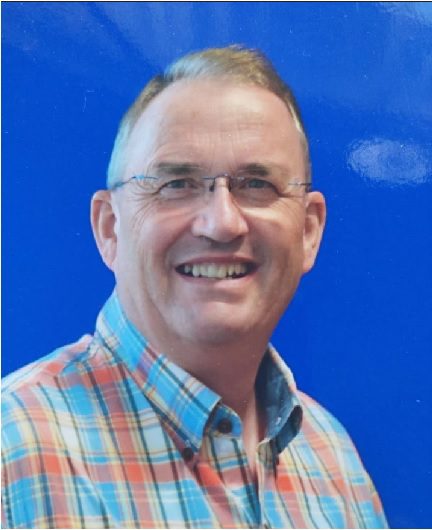
Westminster UNA has learned of the death of Prince Mohsin Ali Khan, a Vice-President since 2007.
Throughout his life, Prince Mohsin sought to bring people together, especially those in the Abrahamic faiths, an initiative he had particularly encouraged and led since the 1990s. He was surely the most courteous and generous man in London, always ready with a small gift, and genuinely interested in those in all strata of society. To support that claim, David Wardrop, Westminster UNA Chair, recalls Prince Mohsin requesting a meeting in the Hilton Hotel, Park Lane, but ‘looking smart’.
“He told me we would now attend the annual diplomatic reception at the nearby embassy of Saudi Arabia. Outside its main entrance, a lengthy line of sodden guests held their umbrellas against the heavy rain. We passed them without a glance and turned two corners before entering an unmarked door. Now in the embassy kitchens, staff nodded towards Prince Mohsin, clearly a regular visitor. Within seconds, we were at the head of the receiving line, elbowing our way past a startled Sir David Frost, the celebrity TV personality, and readying for our photograph with the ambassador, clearly as good a friend of the prince as were his own kitchen staff.”
In his capacity as our Vice-President, Prince Mohsin arranged in 2008 for HRH Prince Turki Al Faisal, former ambassador to the United Kingdom and later to the USA to interrupt his journey to the USA to address Westminster UNA on “The Challenges Facing the International Community and the United Nations”, a speech that was widely reported.
In that same year, he helped to secure funding for our event at St. John’s, Smith Square marking the 60th anniversary of the Universal Declaration of Human Rights. In 2011, he secured sponsorship from Land Rover for our annual ceremony held at the Cenotaph to mark the International Day of UN Peacekeepers. We will miss him greatly.
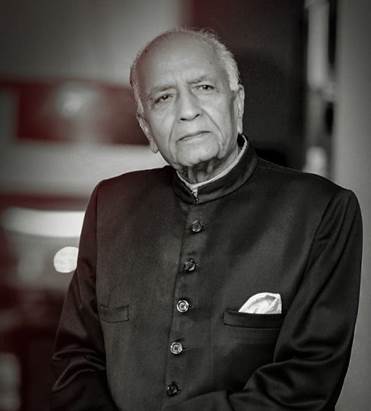
The Westminster United Nations Association joins others worldwide in mourning the death of Her Majesty Queen Elizabeth.
In 2005, Westminster UNA coordinated the Service of Thanksgiving and Rededication in St. Paul’s Cathedral to mark the UN’s 60th anniversary, attended by Her Majesty the Queen, HRH the Duke of Edinburgh, and dignitaries from throughout the United Kingdom, the diplomatic corps as well as UNA members and the public. The lessons were read by HRH the Duke of Edinburgh and the Prime Minister, the Rt. Hon. Tony Blair, and the address was given by the Rt. Hon. Lord Ashdown. In the picture, the Dean of St. Paul's introduces to the Queen Mr Jeremy Thorpe, Honorary Vice-President, Westminster UNA and David Wardrop, Chair, Westminster UNA.

Her Majesty visited the United Nations headquarters in New York twice, addressing the General Assembly on both occasions. A CBS compilation of these two visits can be seen here.
Westminster UNA has published a blog summarising the genesis and continuing relevance of the Universal Declaration of Human Rights and the European Convention of Human Rights, both conceived during the early post-war years and now being challenged on narrow-minded ideological grounds. In September, a judicial review will determine the legality of the UK-Rwanda Asylum Partnership Agreement leading Suella Braverman MP, Solicitor-General, to claim that the recent Interim Decision of the ECHR in Strasbourg barring the transfer of asylum seekers to Rwanda should prompt the UK’s withdrawal from the Council of Europe. The blog explains why this is misguided.
Westminster UNA hosted a second birthday party for United Nations Green, enjoyed under a warm sun and cooling breeze. A number of diplomats from embassies and high commissions arrived to plant their national flags in the giant UN75 Flags of the World display which also attracted tourists from many countries, all taking selfies with the flags of their own countries.
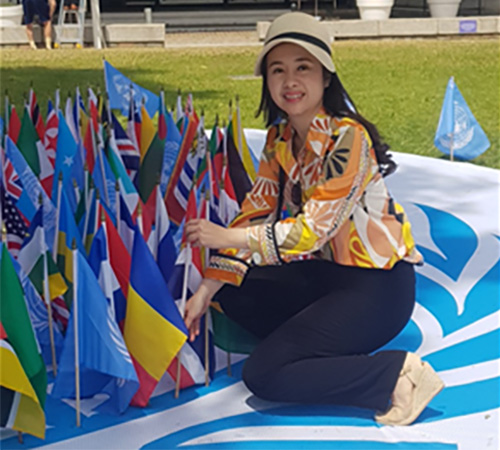
Kanyalak Cheeravinij, Royal Thai embassy, plants her national flag
Music was provided by Kavel Alexander from St. Lucia playing steel pans, and the release of Peace Doves was followed by the cutting of the giant decorated birthday cake which was enjoyed by guests and tourists alike.
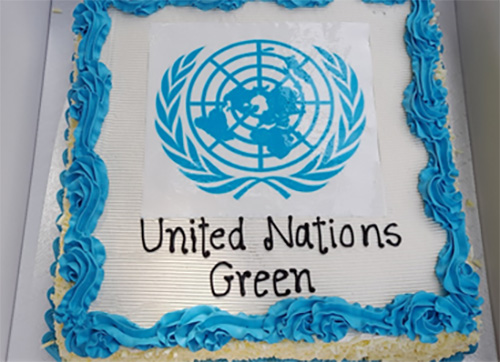
The historically important archives of Methodist Central Hall recording the inaugural meeting of the UN General Assembly in that building had been assembled for display by Paul Moynihan, the Hall’s archivist, offering a rare opportunity to re-live history.
Also, a number of people walked the Mandela Mile, from Nelson Mandela’s bust at the South Bank to his statue in Parliament Square, all qualifying for their certificate and badge, when they reached UN Green.
Westminster UNA has been shocked by the partisan and shallow mainstream media coverage of the recent application for an ‘interim measure’ judgement from the European Court of Human Rights (ECHR). “The Court was set up in 1959 and we would have expected the media to present its judgement in a balanced manner but alas, we have been poorly served” said David Wardrop, Chair of Westminster UNA.
The following explanation of the ECHR judgement appears on our blog page located in ‘Your Guide to the World’, the bottom centre panel on our Home Page.
“Opaque….scandalous….politically motivated” are the UK Home Secretary’s choice observations on the recent judgements of the European Court of Human Rights (ECHR). The ‘Rwanda removals’ incident has certainly lit up media interest, leading to predictable, partisan opinion but little explanation. The appeal to the European Court of Human Rights by those due to be flown to Rwanda sought an ‘interim measure’, not a lasting judgement. The government’s case for its planned action is well-documented elsewhere so this summary sets out to clarify what happened in Strasbourg, no more.
In agreeing to grant the interim measure, the ECHR noted that the asylum partnership arrangement between the governments of the UK and Rwanda provided for asylum seekers to have their claims considered after relocation to Rwanda but also that a UK Court would be ruling on the issue in July.
The ECHR ruled that the removal of the initial applicant should not take place until three weeks after the final decision of the UK court. However, on the same day as its ruling, five others also due to be flown to Rwanda, lodged applications with the Court, requesting similar interim measures to halt their own removal. In two of these, the Court decided to stay the applicants’ removal until 20 June so their requests could be considered in greater detail. Two others had their appeals rejected and the final request was withdrawn as the UK Home Office had by then ‘capitulated’.
The Court is empowered by the Convention to rule in such cases without prejudging the subsequent decision on the case by a UK court. Such requests to the ECHR are rare but apply when the applicants would otherwise face a real risk of irreversible harm. That irreversible harm was clear in this case because, if the UK Courts decide in July that the Home Office’s case falls, to whom should those already deported apply for return to the UK? The Home Office’s failure to respond satisfactorily led the ECHR to reach the only possible decision, whatever partisan media uproar this provoked.
A brief guide to the European Court of Human Rights
The Court was a creation of the Council of Europe, following the adoption of the European Convention on Human Rights in 1953. Only a few years before, the machinery of the United Nations had failed to agree a Convention, that is a binding instrument that signatory states cannot cherry pick. Instead, the UN’s Members States had to settle for the non-binding Universal Declaration of Human Rights (UDHR), although this is widely agreed as the most important international statement after the UN Charter itself. Rene Cassin of France and other European human rights activists who had worked on the UDHR knew that a Convention for Europe was both within their grasp and sorely needed as its member states were emerging from such a wounding war. The Court was set up in Strasbourg in 1959.
Today, the Council or Europe numbers forty-six member states. Only two member states have left it. Greece pulled out in 1969, to avoid expulsion, after a military coup but re-joined five years later. Earlier this year, Russia pulled out following its invasion of Ukraine, which would have seen it expelled anyway. Few can imagine the UK following these.
The workload of the ECHR is enormous. In 2021, there were 72,000 pending applications including those targeting Russia (25%), Turkey (23%) and Ukraine (15%), collectively totalling two thirds of all applications. Only a tiny proportion of these reach legal process but each can create a storm in the accused Member State. In 2021, the Court dealt with 215 applications from the UK, 205 of which were declared inadmissible. Only one violated the European Convention on Human Rights but this failed to generate indignant outrage.
Bruce Kent, that seemingly indestructible force for reason, has gone! Never one to tarry long explaining what seemed to him the obvious, his links with and loyalty to the United Nations Association were among those that tested him as much as any. Always ready to pull out a copy of the UN Charter to explain, to question, to debate, to damn well ‘make progress at last’, he was endlessly frustrated by the decision of the United Nations Association to decline taking on responsibility for the dissemination of freely available UN publications, including the *UN Charter in pocket version.
Even though his loyalty to the United Nations as a concept was unshakable, more than once he let his UNA-UK membership lapse. However, he died a member of Westminster UNA, having been coaxed back by its programme of activities.
There have been some excellent obituaries, but we feel that this appreciation by Paul Vallely, published in The Church Times, captures the personality this wonderfully generous man so well.
Bruce Kent was a prophet who kept our eyes lifted
Paul Vallely, 17 JUNE 2022
“I Don’t know what the future holds. I’m not a prophet,” Bruce Kent said last year on the day that he received his honorary doctorate, on Peace and Reconciliation Day, in Coventry. It was a secular turn of phrase. In religious terms, of course, a prophet is exactly what Bruce Kent was. That was why he sometimes made me feel uncomfortable.
I remember how thrilling it was in the 1980s when he led the opposition against the installation of US Cruise missiles in Britain at Greenham Common. I, too, was opposed to the replacement of Britain’s Polaris nuclear missiles with Trident, arguing that we had better things to spend our money on, and adding — doubtless erroneously — that we could just keep running the old Polaris submarines until they conked out. And I agreed that Ronald Reagan’s calling out the Soviet Union as the “evil empire” risked making things worse, not better.
Best of all, this all came from a Roman Catholic priest — a monsignor, to wit — something that gave hope to young Catholics with reservations about the conservatism of the hierarchy.
But where I was at one with Bruce’s boss, Cardinal Basil Hume, was in my unease at Bruce’s idealistic absolutism. Bruce argued that possessing nuclear weapons was just as immoral as actually using them. The morality of deterrence was specious, he argued, since it was based, in the last resort, on “a willingness to commit mass murder”. The threat to do something appallingly wicked carries an equal responsibility with that of the actual act.
There seemed a lack of proportion about this argument. Cardinal Hume appeared to have a similar feeling. He once said that he would love to be able to walk along the Embankment with a banner saying, “But I have to take my responsibilities as a bishop seriously”.
That meant listening to the arguments of another prominent Catholic, Sir Michael Quinlan, who was then Permanent Secretary at the Ministry of Defence. Deterrence, Quinlan had said, was “the keystone of an arch of freedom from war”. Nuclear weapons, the Cardinal believed, had added a new dimension to traditional Thomist thinking about just war. Deterrence preserved “an unpeaceful peace in an uneasy and unjust world”.
Yet, for all that, Cardinal Hume consistently resisted pressure from Conservative MPs to force Bruce to desist from his peace work. The Cardinal even rejected pressure from the Apostolic Nuncio, Archbishop Bruno Heim, who said that Bruce was either a “useful idiot” or a Soviet ideologue.
Bruce was right on so much. In his heyday, he helped to build a public consensus that contributed to the removal of intermediate-range nuclear missiles from Britain — and created the public mood that allowed Reagan, Margaret Thatcher, and Mikhail Gorbachev to renegotiate a reduction in global nuclear payloads. In his later years, Bruce spoke out about the links between militarism and climate change, and condemned the killing of innocent Yemenis by British bombs and fighter jets sold to the Saudis.
His Christian idealism constituted a counsel of perfection, which, for all his personal amiability, sometimes made mere pragmatists like me feel reprimanded. But he kept our eyes lifted, as is the job of a prophet. Rest in peace, good and faithful servant.
* UNA-UK has commissioned two AO size posters based on the UN Charter, each costing £20 including postage.
In The clarion call to multilateralism - in Ukraine's finest hour, the third essay in his trilogy, former diplomat Sir Peter Marshall points to those current political developments which demonstrate the resilience of the multilateral system and those which point to its weaknesses. The essay builds on All Together Now which defined the UN Charter as manifesting the widest and most far-reaching co-operative experiment ever launched in the conduct of international relations, and Capability our Compass, Multilateralism our Lodestar which pursued the examination of how the mighty experiment has fared in practice. The third essay can be read here.
Sir Peter Marshall joined the UK Diplomatic Service in 1949, serving in UK Permanent Missions to the UN in New York and Geneva. He also served as Commonwealth Deputy Secretary-General (1983-88).
After a two-year interval during which reduced ceremonies were held, Westminster UNA coordinated the return to the traditional wreath-laying ceremony at the Cenotaph for diplomats. Wreath layers were led by Lord Ahmad, Minister for the UN; the Chief of Defence Staff, Admiral Sir Tony Radakin; and Martin Hewitt, Chair of the National Police Chiefs Council. Also, wreaths were laid in memory of Count Folke Bernadotte, the UN’s first mediator, assassinated in 1948 and Commandant René de Labarrière of France, the first UN peacekeeping fatality. Diplomats from sixty nations participated and the Band of the Grenadier Guards provided musical support.
The military participation was provided by members of the Royal Anglian Regiment, the Light Dragoons, the Rifles and the Royal Logistics Corps, totalling eighty personnel returned from UN duties in Cyprus, the Sahel and South Sudan. After the ceremony, the Minister for the UN and the Chief of Defence Staff met the soldiers informally, congratulating then on their deployments.
As in previous years, pupils from the Grey Coat Hospital School for Girls and the Westminster City School for Boys played an invaluable role in leading the diplomats to and from their positions adjacent to the cenotaph. In a break from tradition, the wreath on behalf of the ‘Children of the World’ was laid by young refugees from Iran. They were joined by other refugees from Syria, Afghanistan and other countries. A short film of the ceremony will be released in the Summer.
The accompanying conference hosted by the Royal United Services Institute and UNA-UK took place concurrently. Its first session reviewed how effectively the UN addresses the challenges of Peacekeeping. The closing session, named after the late former USG Margaret Anstee, titled ‘The Digital Transformation of Peacekeeping’, was chaired by Marissa Conway, the newly appointed Executive Director of UNA-UK. The Folke Bernadotte Memorial Conversation with Jean-Pierre Lacroix, UN Under-Secretary-General for Peace Operations was hosted by Dr Karin von Hippel, Director-General, RUSI. A podcast of the conference encompassing the new film will be available later.
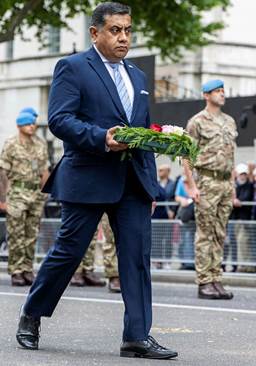
Lord Ahmad, Minister for the UN, lays wreath on behalf of the government
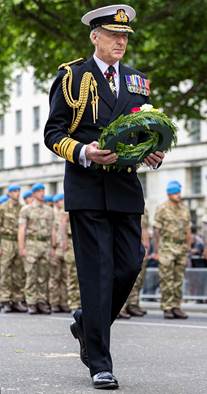
Admiral Sir Tony Radakin, CDS, lays wreath on behalf of HM armed forces
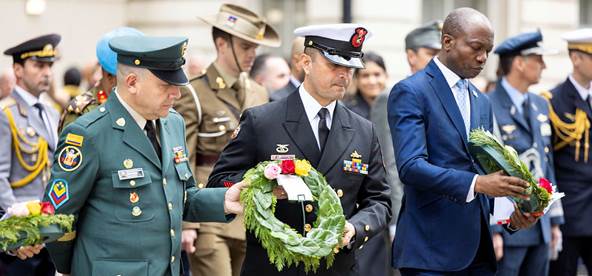
Diplomats and Defence Attaches lay wreaths
To mark the International Decade for Indigenous Languages (2022-2031), Westminster UNA joined the Foundation for Endangered Languages (FEL) and the Institute of Ismaili Studies (IIS) to organise a half-day long conference titled “Celebrating Indigenous Languages – Defending Endangered Languages”. The hybrid event was kindly hosted by the IIS at the Aga Khan centre in London. The programme can be viewed here.
Following the passing of UN General Assembly Resolution ES/11/1 (2 March 2022) supported by 141 Member States which deplored Russia's invasion of Ukraine and demanded a full withdrawal of Russian forces, much interest was directed towards the 35 Member States which abstained in the vote and the 17 which did not vote at all. These included eleven Commonwealth members. In the week of Commonwealth Day (14 March), we wrote to the High Commissioners of those countries which abstained, Bangladesh, India, Mozambique, Namibia, Pakistan, South Africa, Sri Lanka, Tanzania and Uganda, and to those which did not vote, Cameroon, and Eswatini, seeking further enlightenment on their voting decisions. A month later, none had responded.
The eighteenth Ruth Steinkraus-Cohen International Law Lecture was given before a large audience by Sir Howard Morrison KCMG, CBE, QC, until recently the UK judge on the International Criminal Court (ICC). Earlier he had defended in genocide and war crimes cases at the UN Tribunals for the Former Yugoslavia at The Hague and Rwanda in Arusha, Tanzania.
In his address titled “The International Criminal Court: more needed yet more challenged than ever”, Sir Howard spoke about the nature of the ICC, its capabilities and its limitations. He fielded a number of questions, several relating to new initiatives to set up an international special tribunal to try Russian President Vladimir Putin, and those responsible for Russia’s acts of aggression against Ukraine. He stated that although he had been an early signatory to the proposal, he was unsure that that would be the best approach.
The lecture was held at the Brunei Gallery Lecture Theatre, linked with SOAS, and as in previous years, in association with the Bar Council of England and Wales and the Centre for International Studies and Diplomacy (CISD) at SOAS. The lecture was not recorded but this this interview (January 2022) with Sir Howard conducted by Ruby Turok-Squire provides a valuable insight into the role of a judge serving on the International Criminal Court.
Westminster UNA and UNA-UK co-hosted a webinar, to be continued annually, marking London’s centrality in the UN’’s earliest days, comprised two dialogues, introduced by Lord Wood of Anfield, outgoing Chair of UNA-UK. The first featured Baroness Anelay of St Johns, incoming UNA-UK Chair, former UK Minister for the UN, and Sir Peter Marshall, former diplomat, and was moderated by Rianna Nayee, Communications Coordinator, UNA-UK. The second featured Lord Malloch-Brown, UNA-UK Patron, former UN Deputy Secretary-General, and Natalie Samarasinghe, CEO, UNA-UK, and was moderated by Dalí ten Hove, former chair, UNA Youth, and now serving with MONUSCO. The participants then fielded questions sent in by UNA members and viewers worldwide. The webinar can be watched on YouTube here.
Westminster UNA has joined organisations, academics, policy makers and civil society advocates worldwide in co-signing an open letter to the P5 nuclear powers (China, France, Russia, UK and USA) urging action on four key initiatives during the 10th Review Conference of the Parties to the Treaty on the Non-Proliferation of Nuclear Weapons due to start this week.
However, due to the Covid pandemic, the conference has been postponed to later in 2022.
The open letter has been coordinated by NoFirstUse Global, the platform and network working cooperatively for adoption of no-first-use policies by nuclear-armed States, support for such policies from nuclear allied and non-nuclear countries, and the implementation of such policies to help achieve broader nuclear risk-reduction, non-proliferation and disarmament goals.
The open letter is below:
Dear Representatives of China, France, Russia, the UK the USA and other States Parties to the NPT,
Nuclear weapons threaten current and future generations. The security they may have provided in the 20th Century has no place in the world of today and tomorrow, which is struggling to address the COVID pandemic, stabilise the climate, resolve national and international conflicts in peaceful ways, protect cyberspace, and advance human security and the sustainable development goals.
It is time to start phasing out the role of nuclear weapons in security doctrines and develop a practical plan to achieve the peace and security of a nuclear-weapon-free world.
At the Tenth Review Conference of the Non-Proliferation Treaty (NPT-X) in January 2022, we call on you to:
Start the process to permanently end arms racing and phase out the role of nuclear weapons in security doctrines by supporting the adoption of no-first-use policies and cessation of the manufacture of nuclear weapons no later than the 11th NPT Review Conference in 2025;
Commit to a timeframe of no later than 2045 to fulfil the Article VI obligation to achieve the global elimination of nuclear weapons;
Agree to adopt a concrete plan to implement this commitment, including through the systematic and progressive reduction of nuclear arsenals, at the Conference on Disarmament or the 11th NPT Review Conference;
Agree to shift budgets and public investments from the nuclear weapons industry to instead support public health, climate stabilization and sustainable development.
The NPT was adopted in 1970 for a fixed timeframe of 25 years, after which it was expected that it would be replaced by a more comprehensive nuclear disarmament regime. This did not happen.
In 1995 the NPT was extended on the basis of three near-term (incremental) commitments – to achieve a Comprehensive Test Ban Treaty (CTBT) by 1996, to negotiate a fissile materials treaty and to establish additional nuclear-weapon-free zones especially in the Middle East – and a more comprehensive commitment by the nuclear armed States to reduce nuclear weapons in a process leading to their total elimination. Of these, only the CTBT has been negotiated, and it has yet to enter-into-force.
There can be no excuse for not achieving the three incremental commitments in the near future, and the more comprehensive commitment – the global elimination of nuclear weapons – within the next 25 years, if not sooner.
A key measure to reduce the risk of a nuclear war and to start phasing out the role of nuclear weapons in security doctrines while maintaining strategic stability, is to commit to never initiate nuclear warfare by adopting no-first-use (or sole purpose) policies and related operational controls.
Options to use nuclear weapons first in a conflict, and preparations to enable such a first-use, escalate tensions and risks, stimulate counter measures such as launch-on-warning, justify nuclear modernisation programs and prevent negotiations on nuclear disarmament. First-use options are literally playing with fire in very combustible situations, and have nearly led to a nuclear war being initiated by mistake or miscalculation.
Unilateral no-first-use declarations, bilateral no-first-use agreements and/or a multilateral no-first-use agreement can reduce these risks. We commend China and India for already adopting unilateral no-first-use policies and we commend China and Russia for adopting a bilateral no-first-use agreement. These can be followed by nuclear force restructuring and operational controls to implement no-first-use policies, and to build credibility and confidence in the policies to further reduce nuclear risks.
And most importantly, the adoption of no-first-use or sole purpose policies could open the door to the nuclear armed states and their allies joining negotiations for the complete elimination of nuclear weapons. If nuclear weapons are required to deter against a range of threats – not only nuclear weapons – then countries relying on nuclear deterrence will most likely not agree to eliminate the weapons while these other threats still exist. However, if the only purpose of a country’s nuclear weapons is to deter against the nuclear weapons of others, then the country can agree to join a verified nuclear disarmament process as long as all other nuclear armed countries participate. For this reason, the States Parties to the NPT also need to engage with the states which are not parties (India, Israel, North Korea and Pakistan) in the nuclear disarmament process.
We thank the governments of China, France, Russia, the UK, USA and other States Parties to the NPT for considering this letter, and we look forward to supporting and engaging with you as you adopt these policies and as we jointly establish the peace and security of a nuclear-weapon-free world.
Westminster UNA announces a new annual event to mark the historic opening session of the UN General Assembly held in Methodist Central Hall, London, on 10 January 1946. Since 10 January 2021 when, following Westminster UNA’s six-year campaign, the government confirmed the naming of United Nations Green which faces Methodist Central Hall, we have sought to raise public awareness of this historic moment in modern international history.
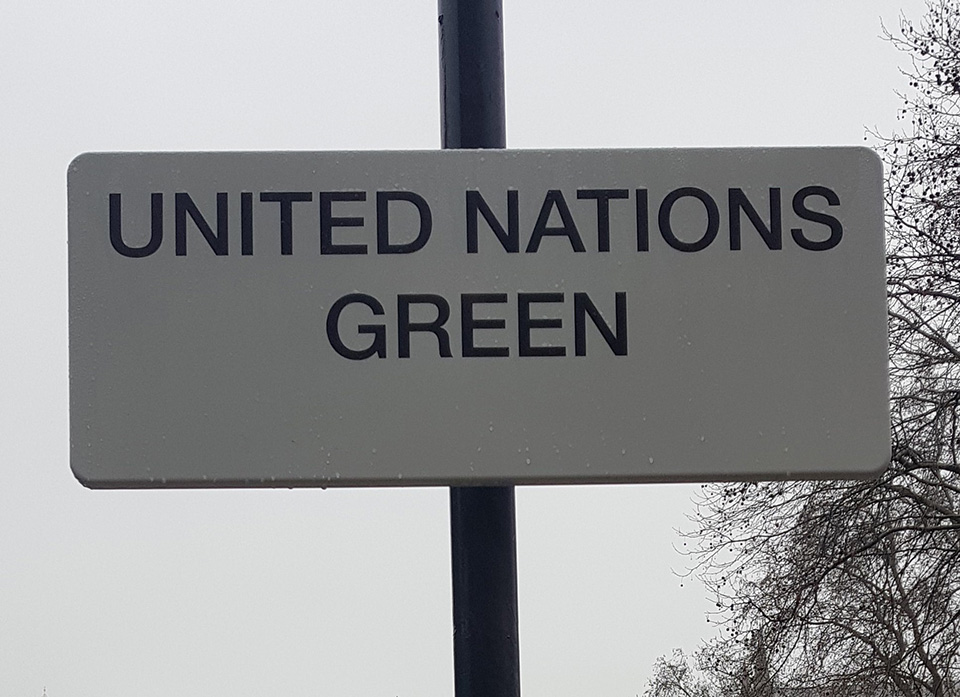
The inaugural event, to be held on 10 January, will feature discussions between speakers who will review the course of world affairs over the last fifteen years during which our departing Executive Director, Natalie Samarasinghe, has served with UNA-UK. How has the UN performed during this period of rapid change and how might the UK contribute to ‘the future we want, to the UN we need?’
Participants include Lord Malloch Brown, former UN Deputy Secretary-General; Sir Peter Marshall Former Commonwealth Deputy Secretary-General; Baroness Anelay, incoming Chair, UNA-UK and former Minister for the UN, Lord Wood Retiring Chair, UNA-UK and Dali ten Hove, former President, UNA Youth, now serving with MONUSCO in the DRC. The discussions will be led by Natalie Samarasinghe.
For details and how to register (free), click here.
Former diplomat Sir Peter Marshall releases today his latest essay Capability our compass: Multilateralism our lodestar, written to herald Westminster UNA’s inaugural event marking the opening session of the UN General Assembly in Methodist Central Hall, London, on 10 January 1946. In his essay, Sir Peter underpins his unwavering support for multilateralism, lauding the UN75 Commemorative Declaration, adopted at summit level on September 21, 2020, without reservation or amendment, by all 193 Member States and which he considers ‘the most neglected major international text of modern times’. In the Declaration, the UN’s Member States agree that “multilateralism is not an option: it is a necessity.” The essay can be read here
United Nations Green celebrated its first Christmas and New Year with this enormous decorative bauble, fit for surely the largest Christmas tree ever! Methodist Central Hall provides an appropriate drop to the illuminated attraction located on the centre of the Green. It attracted many passersby who with their children enjoyed climbing inside and taking selfies. The attraction was the inspiration of the QEII Conference Centre which faces the Green and which serves as its curator.
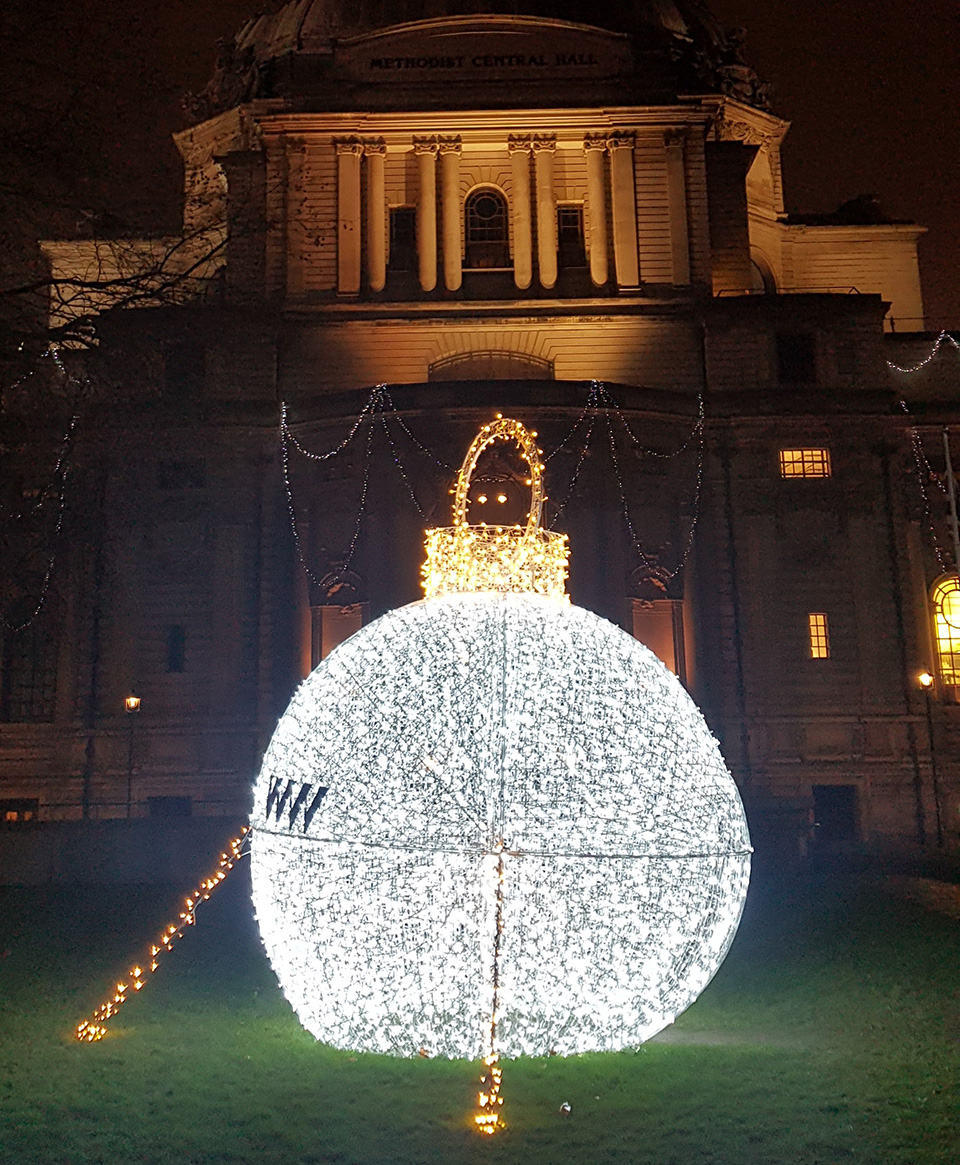
Westminster UNA joined UNA-UK and UNA’s London and Southeast Regional Council (LASER) in organising a webinar tackling the key international challenges presented by the Covid19 pandemic. The webinar was introduced by Paul Mrazek, Vice-Chair, Westminster UNA and moderated by Natalie Samarasinghe, Chief Executive Officer, UNA-UK who invited contributions from María Fernanda Espinosa Garcés, Member of the Lancet Commission on Covid-19 and former President of the UN General Assembly; Dr David Nabarro CBE, Special Envoy on Covid-19 for the World Health Organisation; and Mandeep Tiwana, Chief Programmes Officer at CIVICUS, the World Alliance for Citizen Participation.
A full report of the event can be read here.
Westminster UNA, a member of the UK Forum on Freedom of Religion or Belief, has co-signed a letter to the Foreign Secretary relating to the government’s Afghan Citizens' Resettlement Scheme and also call on the Government to request the protection and safety of those adhering to marginalised religions and beliefs whilst remaining in Afghanistan. The text of the letter is below.
To: Rt. Hon. Elizabeth Truss MP
Secretary of State for Foreign, Commonwealth and Development Affairs
23rd September 2021
Dear Foreign Secretary,
Congratulations on your appointment to the FCDO. As Secretary of State for the FCDO one of the most critical issues you will need to address are the violations of Freedom of Religion or Belief in countries around the world.
As stakeholders working in the area of Freedom of Religion or Belief (FoRB), we write to you about the current situation in Afghanistan following the withdrawal of international troops and the rapid resurgence and establishment of the Islamic Emirate of Afghanistan (also known as the Taliban) Government. We urge the UK Government to act swiftly to ensure that the Afghan Citizens' Resettlement Scheme will include those at risk of death due to their adherence to another faith or belief within the total of 20,000 seeking asylum in the UK.
Breaches of Freedom of Religion or Belief have been in evidence over the last twenty years and longer in Afghanistan, with religious minorities, atheists, and humanists being forced to exist ‘underground’ or suffering direct attacks. This includes the bombing of the Gurdwara Har Rai Sahib, Kabul (a Sikh place of worship on 25th March 2020 and then the subsequent bomb attack at the funeral of those killed on 26th March 2020). In the USCIRF Annual Report 2021 on Afghanistan, it was noted that the United Nations reported 8,820 civilian casualties (3,035 killed and 5,785 injured) in 2020, with some of the most brutal attacks targeting minorities of marginalised religions or beliefs. Over the last ten years the single remaining Christian church building in Afghanistan used by international personnel was permanently closed. The last remaining Jew in Afghanistan, Zebulon Simentov left on the 7th September 2021. There are currently just 170 Sikhs left in Afghanistan – most waiting to be evacuated.
More recently there appears to be reports of increasing violations by the Taliban who are believed to be seeking out individuals who adhere to anything other than Sunni Islam, in an attempt to bring about a pure Islamic state. The Shia Hazara community are particularly vulnerable due to their ethnicity and their long problematic history with the majority Sunni religious community in Afghanistan. This targeting is based upon deeply entrenched beliefs that have not changed over centuries of following the religious texts found in the Dars-i-Nizami curriculum, which includes the Shar’ia law, taught in Madrassas in Pakistan to Taliban members.
The APPG FoRB report published on the 18th August includes an excellent summary with the following stipulations under this law:
a) Christians who have converted from an Islamic family background
i) Any sane adult male deemed to be a convert from Islam should be killed after being given three days to repent and return to Islam.
ii) Any sane adult female deemed to have left Islam is to be imprisoned until she repents.
The signatories of this letter are disturbed at the continuing breach of FoRB, as highlighted in the Archbishop of Canterbury’s speech to the House of Lords on the 18th August 2021:
‘We must renew commitment to freedom of religion and belief everywhere, a point not much mentioned so far. That will count in Pakistan and Afghanistan for Christians and religious communities such as Shia, Hindus, Jains, Ahmadis and Sikhs.’
Women’s rights have always been a concern, and despite the successes made over the years the international community is deeply concerned that since the Taliban took over control on August 15th 2021 the lives of all women and girls will be negatively impacted. While this has been a focus of discussion in general, we would like to bring to the UK Government’s attention the complex threat of a double vulnerability for women belonging to minority groups due to their gender and beliefs. For example, women from religious minorities have had their freedoms severely curtailed due to fear of kidnapping, forced conversion, and forced marriage.
We, the undersigned, convey our utmost concern and strongly recommend to the UK Government that you ensure the Afghan Citizens' Resettlement Scheme will include those at risk of death due to their adherence to a minority faith or belief within the 20,000 Afghans seeking asylum in the UK.
This would be in addition to those who are already recognised as vulnerable because they worked alongside the allied forces and officials (translators, human rights defenders, women at risk, members of the media etc.)
We also call on the Government to request the protection and safety of those adhering to marginalised religions and beliefs whilst remaining in Afghanistan, by the insistence that FoRB be included in any negotiations with the Taliban government.
The protection and safety of those crossing borders into Pakistan, Uzbekistan, and Tajikistan should also be ensured, especially for those holding beliefs that are also marginalised within recipient countries. In particular, this should be considered in relation to Pakistan, where the situation is already grave for religious and belief minorities.
Yours sincerely,
All Faiths Network
Andrew Copson, Humanists UK Chief Executive
Christian Solidarity Worldwide
Dr. Jagbir Jhutti-Johal
Gender & Religious Freedom network
Mosaic Middle East
Prayer Pioneers
Stephen Evans, CEO, National Secular Society
Tearfund
Westminster United Nations Association
Sir Peter Marshall reviews the year now passed since the Declaration on the Commemoration of the Seventy-Fifth anniversary of the United Nations
As world leaders gather in New York, and British Prime Minister Boris Johnson reminds us that Cop26 is now less than 1000 hours away, we recall that year ago today, September 21, Heads of State and Government of all 193 members of the United Nations, "representing the peoples of the world”, adopted without reservation or amendment the "Declaration on the Commemoration of the Seventy-Fifth anniversary of the United Nations". The full text follows beneath.
True to form, the event passed all but unnoticed by those in the UK, as elsewhere, whose responsibility it is to keep abreast of developments, by virtue either of the posts they hold, or of their desire to shape the opinions of their compatriots.
Yet the significance, and the potential, of the Declaration can scarcely be over-estimated. First, whereas the United Nations Charter launched the greatest experiment in the management of international relations ever undertaken, the Declaration unequivocally endorses the outcome of that experiment, and sees it as the template for the future.
Never before have the world's statesmen and stateswomen collectively and unanimously paid such a tribute to the inspiration and the aspiration of their predecessors or reached such a fundamental and wide-ranging judgment about how interdependence should be managed.
Secondly, neither "multilateral”, nor "interdependent” occurs in the UN Charter. But the Declaration confidently asserts, without defining the term, that "multilateralism is not an option, but a necessity". It can do so on the basis of the demonstrated validity of the propositions set forth in the Preamble to the UN Charter.
In that sublime 200-word text, "We the peoples of the United Nations, determined to save succeeding generations from the scourge of war, which twice in our lifetime has brought untold sorrow to mankind", firstly reaffirm their faith in fundamental human rights, in the dignity and worth of the human person, in the equal rights of men and women and of nations large and small; and secondly declare their intention to employ international machinery for the promotion of the economic and social advancement of all peoples".
Thirdly, while they were remarkably prescient in emphasising the close inter-relationship between what are now called the "three pillars” of co-operation and endeavour - peace and security, human rights and development - the Founders of the United Nations cannot be expected to have foreseen either the near-exponential ramifications of that relationship, as it has developed over the last seventy-five years, or the extent of the benefits which it has conferred on humankind.
Even more noteworthy, perhaps, has been the depth of humanitarian concern, manifested worldwide, not only by governments, but also by non-governmental organisations and agencies of every kind, at every level and in every sphere - the product of civil society at its best. That concern is the greatest feature of governance, as the complement of government, rather than its rival or opponent.
We are all conscious of the needs of those who are most at a disadvantage of one sort or another. One of the great slogans of the UN 2030 Sustainable Development Goals is "we will leave no-one behind". That says a great deal. A key test of civilisation is the treatment accorded to the least fortunate members of the community.
* * *
What multilateralism is about in practice - repeat practice - can be summed up in a single prescription: our ready acceptance of responsibility, not only for doling well what may be required of us specifically, but also for having an eye out, and mind open, as to what more needs to be done.
Edmund Burke famously said - or did not say: the experts are divided on the matter - that all that is necessary for evil to triumph is that good people should do nothing. In the age of interdependence, we have to go further than that: unless we all do our bit, we all suffer.
Multilateralism is thus concerned both with every element of the substance of international relations, and with every aspect of the processes by which they are conducted, at both macro and micro level, and in every time frame. It is objective in that its foundation is accurate analysis of the relevant factors, and efficient and effective implementation of the policies adopted.
It is simultaneously subjective because it is qualitative as well as quantitative. It is directed by moral principles and priorities held in common. It is a matter of the heart as well as of the head. Itis driven byaninstinctforwhatis fair. It underlines the truth that a profound understanding, collective and individual, of the past is a prerequisite for wise management of the present and provision for the future.
Pie in the sky? Pabulum for the naive? Open house for freeloaders, shirkers, cheats and bullies? Undesirables there will be under any arrangement: but they can be shown up for what they are by having a prominent code of conduct which everyone professes to respect, and publicising situations in which it is obviously being ignored. Bullies, of whatever size, are not totally insensitive to attention, especially when they may be endeavouring to appear as paragons of virtue. Peer pressure can work wonders.
And what is the alternative? Hard-bitten, no-nonsense persons speak glibly of a "rules-based international order" an obfuscation which cannot survive a moment's rigorous analysis. But it is meat and drink to those who behave with total irresponsibility, and to those who are too scared to speak up or out.
* * *
What, then, have we to show as the harvest of this great Commemorative Declaration? The answer is "far more than almost everyone realises".
Prime Minister Boris Johnson’s General Assembly speech of September 26, 2020 heralded the intention to take a lead, and looked forward to January 10, 2021, the 75th anniversary of the symbolic opening of the inaugural session of the General Assembly in Methodist Central Hall, Westminster, an internationally renowned place of worship at the heart of London, facing Westminster Abbey across historic Broad Sanctuary Green.
The Presidential Election of November 2020 brought us the most welcome prospect of relief from President Trump, whose behaviour in the ensuing two months has marked him out as the most ungracious loser in American political history.
The planned visit to the UK by the UN Secretary-General to mark the General Assembly anniversary occasion had to be cancelled for Covid 19 reasons. A number of virtual visits and events replaced it.
Of these, none was as significant as the virtual service organised on the morning of January 10 by Tony Miles, the Superintendent of Methodist Central Hall and broadcast worldwide. At its outset, David Wardrop, the Chairman of the Westminster United Nations Association, was authorised to announce that Broad Sanctuary Green had been renamed "United Nations Green".
The photograph below shows the modest welcoming party for United Nations Green held on August 21. "We the peoples”, of every age and nationality, gathered round a display of the flags of the United Nations. They realised that, in the wording of the discreet reminder in the text of the Commemorative Declaration that "there is no other global organisation with the legitimacy, convening power and normative impact as (sic) the United Nations". Its spirit will outlive the mindless and heartless activities of any terrorist movement.
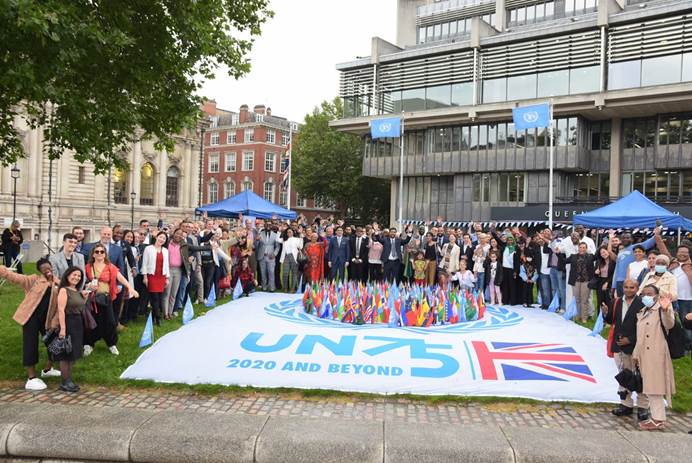
UNA members and diplomats and their families join refugees and asylum seekers temporarily staying in local hotels join to welcome United Nations Green. Photo: Javier Mandirola
* * *
Although the Commemorative Declaration may have left the vast majority of UK cerebrals unmoved, it did not fail to resonate with the UK Government. The latter in its turn did not fail to pass on the message. It was in a unique position to do so. As 2021 dawned, the Prime Minister was host to the UN Secretary-General's virtual visit; was "Chair-in-Office" of the Commonwealth, by virtue of the last meeting of Commonwealth Heads of Government having taken place in London in 2018; assumed the presidency of the G7; and was the leader of the government which would host COP26 in Glasgow in November.
It soon showed. At the close of their virtual meeting on February 19, chaired by the Prime Minister, the G7 leaders "resolved to work together to beat Covid 19 and to build back better.... Drawing on our strengths and values as democratic, open economies and societies, we will work together and with others to make 2021 a turning point for multilateralism".
The UK Government's "Integrated Review of Security, Defence, Development and Foreign Policy" (CP 406, March 16)) testifies to awesome powers of joined-up thinking. In Section 2 of "The Strategic Framework”, entitled "Shaping the open international order of the future”, it says "the UK remains deeply committed to multilateralism".
Most recently, the Foreign Affairs Committee of the House of Commons has published the detailed and absorbing response of the UK Government (HC 618) to the Committee's own wide-ranging report on the UK's role in multilateral diplomacy (HC 199).
* * *
Multilateralism could be said to have achieved lift-off during the course of President Biden's visit to Europe in June. We are entitled to draw from the five texts agreed during the course of it - in chronological order, the New Atlantic Charter; the US/UK statement; the G7 Summit communique; the NATO Summit communique, and the US/EU Declaration - the encouraging conclusion that there is near- unanimous agreement throughout the international community as to our multifarious common agenda, and a near-miraculous consensus on the best way of tackling it: namely multilateralism.
* * *
"And how”, the cynics and the "realists" and the woebegone might ask, “do you reconcile all those fine words and sentiments with the debacle in Afghanistan?" There is much to be said for starting to answer a difficult question by asking another of the same.
"Given", my question would run, "that the US rightly invoked Article 5 of the North Atlantic Treaty in the light of the Nine/Eleven attacks; given further that the watchword was that if those responsible were not brought to justice, justice would be brought to them; given yet further that the latter procedure was accompanied by a inevitably controversial foreign-financed-and-led policy of "nation building", was it not apparent that a viable exit strategy would be a matter of extreme delicacy?"
The "agreement" reached between the United States and the Taliban (the Afghan Government not being involved) on February 29, 2020 would seem to raise as many questions as it was intended to answer as its title is supremely uninviting: "AgreementforBringingPeacetoAfghanistanbetweentheIslamicEmirate of AfghanistanwhichisnotrecognisedbytheUnitedStatesasastateandtheUnited States". Alarm bells should surely have been ringingallaround.
Nowhere does the writ of the Law of Unintended Consequences run more freely than in the field of international relations. The unexpected provides opportunities, as well as challenges, to those sufficiently up to speed, and nimble enough, to grasp them. Afghanistan, seemingly doomed to be the cockpit of Asia, is a spectacular case in point.
Security Council Resolution 2593 of August 30 is an excellent start to the process of furnishing Afghanistan with a secure place within the international community, together with the provision of the assistance it so desperately needs, on condition that its government respects the obligations of UN membership.
Peter Marshall,
September 21, 2021
Sir Peter Marshall, KCMG, CVO, joined the UK Diplomatic Service in 1949, rising to Economic Under-Secretary in the FCO and then Deputy for Economic and Social Affairs. He then joined the UK Permanent Mission to the UN in New York and later served as UK Permanent Representative to the UN in Geneva (1979-83). He also served as Commonwealth Deputy Secretary-General (1983-88).
He was Chairman of the Commonwealth Trust and Royal Commonwealth Society (1988-92) and Chairman of the Joint Commonwealth Societies Council (1993-2003). His book Public Diplomacy (Macmillan) was published in 1997.
His previous articles published in these pages include:
DECLARATION ON THE COMMEMORATION OF THE
SEVENTY-FIFTH ANNIVERSARY OF THE UNITED NATIONS
We, the Heads of State and Government representing the peoples of the world, have gathered on September 21, 2020, to commemorate the seventy-fifth anniversary of the United Nations. We do so with a sense of awe and deep respect for the founders who created this Organization. There is no other global organization with the legitimacy, convening power and normative impact as the United Nations. No other global organization gives hope to so many people for a better world and can deliver the future we want. The urgency for all countries to come together to fulfill the promise of the nations united, has rarely been greater.
Born out of the horrors of World War II, the United Nations, as a common endeavor for humanity, was established to save succeeding generations from the scourge of war. Even in times of great global challenges and tension, our Organization has catalyzed decolonization, promoted freedom, shaped norms for international development, and worked to eradicate disease. The United Nations has helped mitigate dozens of conflicts, saved hundreds of thousands of lives through humanitarian action and provided millions of children with the education that every child deserves. It has worked to promote and protect all human rights and fundamental freedoms for all, including the equal rights of women and men. The Charter of the United Nations, which is the cornerstone of international law, has declared the principle of sovereign equality of all States, respect of their territorial integrity, political independence and the right to self-determination of peoples. It has affirmed the principles of non-intervention in the internal affairs of States and the resolution of international disputes by peaceful means and in conformity with the principles of justice and international law. It has determined that all states shall refrain from the threat or use of force against the territorial integrity or political independence of any state, or in any other manner inconsistent with the Purposes of the United Nations.
The achievements are many, and we owe the United Nations and its personnel much gratitude and respect, not least to those who have paid the ultimate price in the line of duty. Over the years, more than one million women and men have served under the UN flag in more than 70 peacekeeping operations. Every day, countries, citizens, private sector and civil society representatives use the platform provided by the United Nations to make life better for all of humanity.
However, the United Nations has had its moments of disappointment. Our world is not yet the world our founders envisaged 75 years ago. It is plagued by growing inequality, poverty, hunger, armed conflicts, terrorism, insecurity, climate change, and pandemics. People in different corners of the world are forced to make dangerous journeys in search of refuge and safety. The least developed countries are falling behind, and we still have not achieved complete decolonization. All this calls for greater action, not less. When Member States lend their will and resources to the collective efforts of the Organization, powerful results have been seen. Through the Global Conversation launched by the Secretary-General this year, we have listened to the concerns and aspirations of the people. We are here to respond.
Our challenges are interconnected and can only be addressed through reinvigorated multilateralism. As we meet, the COVID-19 pandemic continues to reverberate around our world. In a matter of weeks, the pandemic manifested itself as the largest global challenge in the history of the 2 United Nations. It has not only caused death and serious illness, but also global economic recession, increased poverty, anxiety, and fear. It has put enormous pressure on our societies, economies, and health systems. While none of us have been left untouched, people in vulnerable situations and the most vulnerable countries have been the hardest hit. The COVID-19 pandemic has reminded us in the most powerful way that we are closely interconnected and only as strong as our weakest link. Only by working together and in solidarity can we end the pandemic and effectively tackle its consequences. Only together can we build resilience against future pandemics and other global challenges. Multilateralism is not an option but a necessity as we build back better for a more equal, more resilient, and more sustainable world. The United Nations must be at the center of our efforts.
Strengthening international cooperation is in the interest of both nations and peoples. The three pillars of the United Nations – peace and security, development, and human rights – are equally important, interrelated, and interdependent. We have come far in 75 years but much more remains to be done. We have the tools and now we need to use them. The 2030 Agenda for Sustainable Development is our roadmap and its implementation a necessity for our survival. Urgent efforts are required. Therefore, we are not here to celebrate. We are here to take action. Guided by the purposes and principles of the Charter, we are here to ensure the future we want, and the United Nations we need.
* * *
We will leave no one behind. The next ten years, which have been designated as the Decade of Action, will be the most critical of our generation. It is even more important as we build back better from the COVID-19 pandemic. We need a strong UN development system and effective collaboration between the United Nations and the international financial institutions. We support the Secretary General’s efforts and measures in this regard. We are determined to implement the 2030 Agenda in full and on time. There is no alternative. The peoples have to be at the center of all our efforts. Particular attention must be given to people in vulnerable situations. Humanitarian access to those in need of assistance must be granted without obstacle or delay and in line with the humanitarian principles. We are guided by the Universal Declaration of Human Rights, international human right treaties and instruments and will ensure everyone’s human rights and fundamental freedoms.
We will protect our planet. Without more determined action we will continue to impoverish our planet with less biodiversity and fewer natural resources. We will see more environmental threats and climate related challenges, including natural disasters, drought, desertification, food shortages, water scarcity, wildfires, sea-level rise, and depletion of the oceans. The time to act is now. Many countries, not least small island developing states, least developed countries and landlocked developing countries, are already among the most affected. We need to adapt to the circumstances and take transformative measures. We have a historic opportunity to build back better and greener. We need to immediately curb greenhouse gas emissions and achieve sustainable consumption and production patterns in line with the Paris Agreement and the 2030 Agenda. This cannot wait.
We will promote peace and prevent conflicts. The ongoing armed conflicts and threats against international peace and security must be urgently resolved through peaceful means. We reiterate the importance of abiding by the Charter, principles of international law, and relevant resolutions of the Security Council. International arms control, non-proliferation and disarmament agreements and their architectures need to be upheld. The United Nations must better address all forms and domains of threats. Terrorism and violent extremism conducive to terrorism are serious 3 threats to international peace and security. The diplomatic toolbox of the Charter needs to be used to its full potential, including preventive diplomacy and mediation. We call on the Secretary-General to enhance this toolbox to prevent the outbreak, escalation and recurrence of hostilities on land, at sea, in space and in cyberspace. We fully support and promote the Secretary-General’s initiative for a global ceasefire. International humanitarian law must be fully respected. To build, keep and sustain peace is now one of the main responsibilities of the United Nations.
We will abide by international law and ensure justice. The purposes and principles of the Charter of the United Nations and international law remain timeless, universal and an indispensable foundation for a more peaceful, prosperous and just world. We will abide by the international agreements we have entered into and the commitments we have made. We will continue to promote respect for democracy and human rights, to enhance democratic governance and the rule of law by strengthening transparent and accountable governance and independent judicial institutions.
We will place women and girls at the center. Conflicts will not be resolved, and sustainable development not occur, without the equal and active participation of women at all levels. Human rights can never be fully upheld unless they are also enjoyed by all women and girls. Persistent gender inequalities and abuse, including sexual- and gender-based violence, have deprived us of a more just and better world. We will accelerate action to achieve gender equality, women’s participation, and the empowerment of women and girls in all domains.
We will build trust. Growing inequality within and among countries is jeopardizing our efforts to ensure the future we want. Inequality leads to mistrust between countries, and to people’s mistrust in institutions of governance. It also contributes to acts of xenophobia, racism, intolerance, hate speech and disinformation. We condemn all such acts. We will address the root causes of inequalities, including violence, human rights abuses, corruption, marginalization, discrimination in all its forms, poverty and exclusion, as well as lack of education and employment. It is our responsibility.
We will improve digital cooperation. Digital technologies have profoundly transformed society. They offer unprecedented opportunities and new challenges. When improperly or maliciously used, they can fuel divisions within and between countries, increase insecurity, undermine human rights, and exacerbate inequality. Shaping a shared vision on digital cooperation and a digital future that show the full potential for beneficial technology usage, and addressing digital trust and security, must continue to be a priority as our world is now more than ever relying on digital tools for connectivity and social-economic prosperity. Digital technologies have a potential to accelerate the realization of the 2030 Agenda. We must ensure safe and affordable digital access for all. The United Nations can provide a platform for all stakeholders to participate in such deliberations.
We will upgrade the United Nations. The world of today is very different from what it was when the United Nations was created 75 years ago. There are more countries, more people, more challenges but also more solutions. Our working methods need to keep pace and adapt. We support the ongoing reforms by the Secretary-General. They are creating a more agile, effective, and accountable organization that can deliver better in the field and adapt to global challenges. We reiterate our call for reforms of three of the principal organs of the United Nations. We commit to instil new life in the discussions on the reform of the Security Council and continue the work to 4 revitalize the General Assembly and strengthen the Economic and Social Council. The review of the peacebuilding architecture has our full support.
We will ensure sustainable financing. Realizing our aspirations will require sustainable and predictable funding of the Organization. We will pay our assessed contribution in full and on time. Measures to better ensure this should be explored. We will further enhance transparency, accountability and efficient use of resources. The full and timely implementation of the Addis Ababa Action Agenda on Financing for Development is key for the implementation of the 2030 Agenda. Joint public-private financing plays a central role in our efforts to make the United Nations deliver better on its purposes.
We will boost partnerships. Today’s challenges require cooperation not only across borders but also across the whole of society. We have to make the United Nations more inclusive and engage with all relevant stakeholders, including regional and sub-regional organizations, non-governmental organizations, civil society, the private sector, academia, and parliamentarians to ensure an effective response to our common challenges.
We will listen to and work with youth. Youth is the missing piece for peace and development. As we benefitted from the foresight of the founders of the United Nations, young people today will have to live with the consequences of our action and inaction. For too long, the voices of youth have been sidelined in discussions about their future. This has to change now through meaningful engagement with youth.
We will be prepared. The COVID-19 pandemic caught us off-guard. It has served as a wakeup call for improving our preparedness for not only health related crises but also other challenges and crises. We need to strengthen international cooperation, coordination, and solidarity. It is important to learn, share experiences and information to reduce risks and make our systems more resilient. While improving our global crisis prevention and response systems, there is an urgent need to accelerate development, production as well as equitable and affordable global access to new vaccines, medicines, and medical equipment. We applaud all healthcare and other frontline workers who put their own safety at risk when saving others, and pledge to put the people at the center of our response.
* * *
What we agree today, will affect the sustainability of our planet as well as the welfare of generations for decades to come. Through reinvigorated global action and by building on the progress achieved in the last 75 years, we are determined to ensure the future we want. To achieve this, we will mobilize resources, strengthen our efforts and show unprecedented political will and leadership. We will work together with partners to strengthen coordination and global governance for the common future of present and coming generations.
We request the Secretary-General to report back before the end of the seventy-fifth session of the General Assembly with recommendations to advance our common agenda and to respond to current and future challenges.
To mark the 60th anniversary of the plane crash in which Secretary-General Dag Hammarskjöld and fifteen others died, Westminster UNA and the Institute of Commonwealth Studies co-hosted a webinar titled “The UN Inquiry into Hammarskjöld’s death: Last chance to reach the truth?” The webinar can be watched here.
The webinar was chaired by the Rt. Hon, Lord Boateng PC, former High Commissioner to South Africa, who reminded the audience of its sub-title “Why are governments such as the UK continuing to make the UN inquiry's task so difficult, raising further suspicion as to their reasons?”
David Wardrop, Chair of Westminster UNA, chronicled events following Dag Hammarskjöld’s death, from the crash reports to the appointment of Judge Mohamed Chande Othman to lead the UN inquiry. He noted Judge Othman’s request for assistance, contrasting the responses of the UNA, UK and South Africa with those of other nations. He surmised that Judge Othman’s final report due in September 2022 might well focus upon the recognised capacity at the time of the crash of the US and UK to monitor and intercept communications and to record these, but which has still not been released. He noted that in the previous week’s special session of the UN General Assembly held to mark Dag Hammarskjöld’s integrity as an international civil servant, a member of the UK’s UN Mission had encouraged the Secretariat and the international civil service to ‘challenge us and to speak truth to us, a little but more’. “We will do so!” Mr Wardrop promised.
Asa Theander, Deputy Head of Mission, Embassy of Sweden, confirmed that Sweden would continue to support the UN inquiry, noting the many and increasing number of co-sponsors for successive resolutions seeking to pursue the truth. She referred also to Dag Hammarskjöld’s speech titled The International Civil Servant in Law and in Fact, given in Oxford in the year he died. In this he spoke about the key principles for fulfilling this important role and if these were compromised, internationalism would be abandoned, and that price would be steep.
In introducing Senator Dr Sydney Sekeramayi, the High-Level Independent Appointee for Zimbabwe, Lord Boateng recalled their first meeting decades before when the Senator had been a freedom fighter. Dr Sekeramayi summarised his team’s extensive secondary research on the possible causes of the crash, in the pursuit of the truth. This work included unrestricted and unsupervised access to the archives held by Zimbabwe’s armed forces, police, Central Intelligence Organisation, and other bodies, confirming its keen interest in continuing research in archives held in both the UK and Zimbabwe. In closing, he reported that his team has submitted five reports to Judge Othman and a sixth is being finalised and he confirmed that it remains funded by the Government of Zimbabwe up to February 2022.
In introducing Dr Henning Melber, Emeritus Director, Dag Hammarskjöld Foundation, Lord Boateng noted that, when in his teens, Dr Melber had moved with his family from Germany to Southwest Africa, now Namibia. Later he became involved in its independence movement and was expelled, returning after independence to assist the new government. In his remarks, Dr Melber reminded his audience of Dag Hammarskjöld’s skill in navigating a geopolitically divided bipolar world, identifying with the UN Charter and the aspirations of the UN’s smaller member nations and, throughout, warning against what later became known as Eurocentrism and colonial-apologetic notions. He noted that for the Pan Africanist Nigerian scholar Adekeye Adebajo, Dag Hammarskjöld was “the Southern prophet par excellence”, combined with the role of “a stubborn pharaoh”. “We owe it to him”, said Dr Melber, “and all others who sacrificed their lives in the service of United Nations missions in search of peace, to live up to the values and principles for which they died.”
The Chairman then introduced the Rt. Revd. Trevor Musonda Mwamba, former Bishop of Botswana and a contender in the recent elections for the presidency of Zambia, representing Zambia’s United National Independence Party (UNIP). Bishop Mwamba reminded his audience that Dag Hammarskjöld had died on Zambian soil and thus ‘his soul became a part of Zambia and Zambia a part of him’. This explained why Zambians are ‘desirous to know the truth of why Dag Hammarskjöld was killed and, for the importance of Zambia's identity, to know its past in order to embrace its authentic self in the future.’ He recalled that in his recent presidential hustings through Zambia, he concluded in Ndola where his first act was to visit the Dag Hammarskjöld Memorial Crash Site, declared a national monument in 1970 and now a UNESCO World Heritage Centre. There, he said, ‘I reflected about Hammarskjöld’s life as a peacemaker and ethical leader which is an inspiration to us all and good place to conclude.’
The Chairman invited audience members to submit questions which were handled by panellists. Justice Richard Goldstone, a member of the Hammarskjöld Commission also contributed.
To mark the naming of United Nations Green on 10 January this year, Westminster UNA held a Welcome United Nations Green party principally to give UNA members and friends the opportunity to meet in person after so long in isolation. We also invited members of the diplomatic community and refugees and asylum seekers now living in nearby hotels.
United Nations Green sits between Westminster Abbey, the QEII Centre and Central Hall Westminster which hosted the first meeting of the UN General Assembly seventy-five years ago. The centrepiece was the Flags of the World display featuring the world’s largest UN75 banner into which were planted the flags of all nations. Features of the day included a peace-dove release and for children, SDG hopscotch and a ‘Learn about the UN’ treasure hunt with attractive prizes. Sales of the ever popular ‘I’m the Peacekeeper’ teddy bear were brisk, and many visitors signed the UN Green Declaration which marked three important UN International Days relating to Victims of Terrorism, Victims of Acts of Violence based on Religion or Belief, and Remembrance of the Slave Trade and its Abolition.
Also, Central Hall Westminster very kindly opened its doors to visitors for the first time in the COVID era, organising a fascinating display of memorabilia of the UN General Assembly’s opening session in 1946. The QEII Centre also cooperated, opening its café for the first time February 2020, and hosting three presentations on the upcoming Decade for Indigenous Languages; the work of the Climate Coalition; and Equity in Sport. A video featuring high points of this historic get-together is being prepared and will be posted on this webpage.
Westminster UNA hopes to host future events on United Nations Green which is already becoming a London landmark on Google Maps. In April, it recorded 6,000 visitors and in August this figure rose to 150,000.
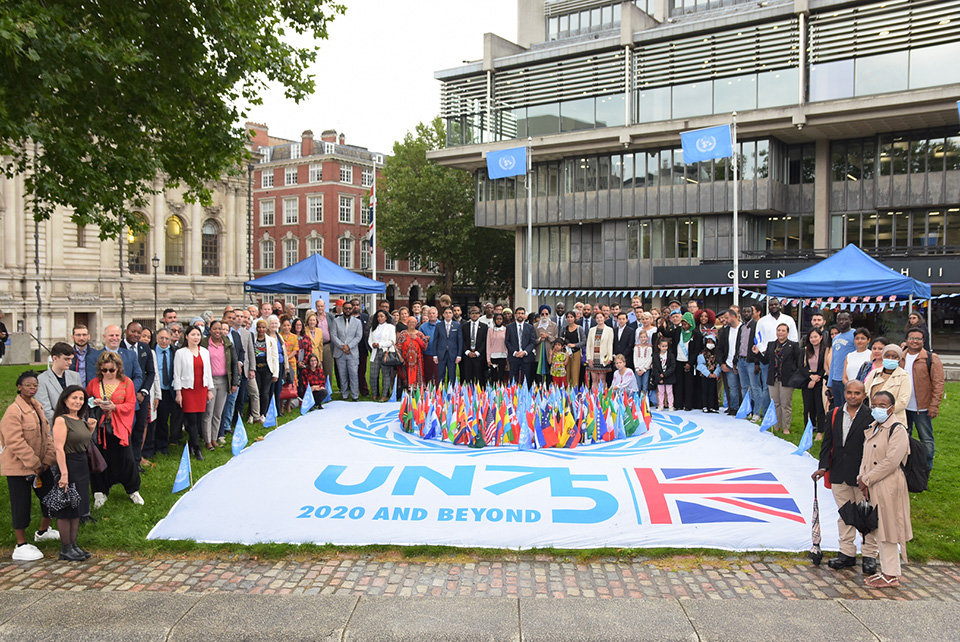
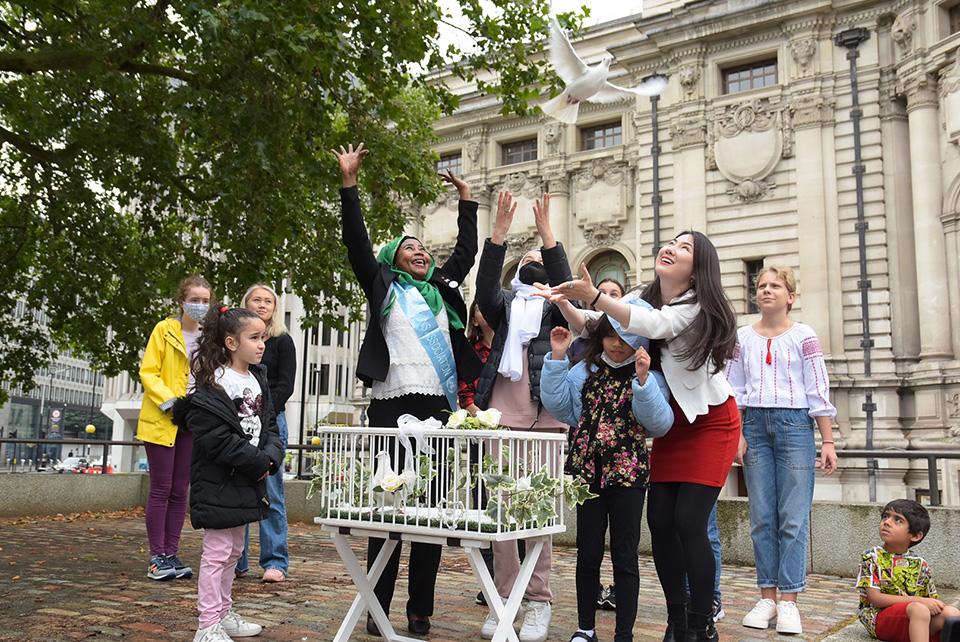
A year ago today the United Nations celebrated the seventy-fifth anniversary of the signature in San Francisco of the United Nations Charter. The last twelve months, dominated by the Coronavirus pandemic and the imminent threat of climate change, and manifesting every sign of great and growing worldwide interdependence, have been the most administratively and diplomatically challenging in human experience.
The first lesson to learn when dealing with public affairs is that everything has a long history. Over the year - over the long years - people have learned the hard way that it is in general a good idea to curb one's aggressive tendencies and jaw-jaw instead of making war. “Democracy is a system for counting heads rather than breaking them”.
The concept of Positive Rights
So it is with international relations, however sophisticated they may appear to be. I am fascinated by the New Atlantic Charter. Underlying its comprehensively forward-looking and action-oriented content are two fundamental concepts, both dating from 1776.
On the west side of the Atlantic, there was the notion of "positive" rights, originating enigmatically in the Declaration of Independence. Whereas the prime concern of Magna Carta and what followed was with "justiciable" rights, e.g. with the responsibility of government to refrain from threatening life and liberty; the Declaration of Independence, by including "the pursuit of Happiness" among the unalienable rights proclaiming with which we are endowed by Our Creator, charged the government with an additional operational responsibility: namely, that of creating and facilitating conditions in which the people could seek their fulfilment, individually and collectively. The most important of these conditions are enshrined in President Roosevelt's Four Freedoms.
The concept of positive sum trading instead of mercantilism
At the same time on this side of the Atlantic, Adam Smith was pointing out in his book Wealth of Nations that mercantilism was not the only basis on which international trade can take place. He showed that it made far more sense and profit to play the positive-sum game.
But he was no mere utilitarian bean-counter. On the title page of Wealth of Nations, he is described as "formerly Professor of Moral Philosophy in the University of Glasgow". Seventeen years previously he had written The Theory of Moral Sentiments. His message was that all our moral sentiments arise from "sympathy" which he said, "leads us to enter into the situations of other men and to partake with them in the passions which those situations have a tendency to excite".
Worthwhile sentiments do not just remain sentiments. They will find expression in behaviour or action in the naive, innocent notion of leaving the world in a better state than you found it. Most particularly, I would like to think we will all readily have an eye to the needs of those who are at a disadvantage of one sort or another. One of the great slogans of the UN Sustainable Development Goals is "we will leave no-one behind". That says a great deal. A key test of civilisation is how it treats the least fortunate members of the community.
Adam Smith had his overall priorities right: defence was more important than "opulence".
Putting the two Positives together in the UN Charter
Each of these concepts - Positive Rights and Positive Sum - has within it an element of the limitless, of the exponential. In combination, they are an unbeatable recipe for what Alexander Hamilton called, in the first of the Federalist papers, "establishing good government from reflection and choice”, as distinct from "accident and force".
The two Positives come together for the first time in the adoption of the United Nations Charter, and above all in its iconic 200-word Preamble. They were at the core of a unique commitment by all the members of a universal organisation, taken amid the death and destruction of two world wars scarce twenty years apart:
(i) to abandon their previous traditional policies of pursuing their supposed individual national interests at the incidental expense of anyone else, the devil taking the hindmost; and
(ii) to replace them with the collective sustained pursuit of the common good: "reaffirming our faith in human rights, in the dignity and worth of the human person, in the equal rights of men and women and of nations large and small".
The latter phrase with which the Preamble opens may be familiar and underrated as a result but there should be no mistaking its profound comprehensiveness. It marked the greatest ever paradigm shift in the conduct of international relations. It was a mighty experiment and it met with mighty success.
The enduring United Nation-Commonwealth symbiosis
The world owes the Preamble to the UN Charter in the first instance to Jan Christiaan Smuts, hero and champion of the failed League of Nations, and to the six Commonwealth Delegations to the San Francisco Conference - Australia, Canada, India, New Zealand, South Africa and the UK - meeting in London on its eve. Under Smuts’ inspiration, they hammered out a draft, and backed him in securing its acceptance at San Francisco. This was the beginning of a striking and enduring symbiosis, nowhere better illustrated than in the special edition last autumn of The Parliamentarian, the Journal of the Commonwealth Parliamentary Association.
The two Positives together: Edmund Burke
The joint burgeoning of the Two Positives goes far to explain the phenomenal improvement in the lot of the individual we have witnessed the world over since 1945. There is every reason to be cheerful about the contribution they can make to our collective future.
But their full long-term potential depends on the acceptance by all concerned - repeat all concerned - of the unalienable responsibilities which are the other side of the coin of the unalienable rights. Edmund Burke famously said - or did not say: the experts are divided on the matter - that all that is necessary for evil to triumph is that good people should do nothing. In the age of interdependence, we have to go further than that: unless we all do our bit, we all suffer.
How can we ensure this? The answer, of course, is that we can't. In any open society, there are always going to be freeloaders, shirkers and bullies. But you can show such undesirables up by having a prominent code of conduct which everyone professes to respect and publicise situations in which it is obviously being ignored. Bullies, of whatever size, are not totally insensitive to attention, especially when they are endeavouring to appear as paragons of virtue.
The systemic crisis of the early 1970s
The systemic crisis in the early 1970s saw the end of dollar convertibility, the regime of fixed parities and the end of the Pax Americana via Vietnam, Watergate and Nixon's resignation. Peace and amity did not at the time prevail in the United Nations. In two special sessions of the General Assembly in 1974 and 1975, a "third world coalition", shrewdly led by Algerian President Boumediene in his dual capacity as current leader of the Non-Aligned Movement (NAM) and OPEC chairman, tried to establish a "New International Economic Order” (NIEO) by General Assembly resolution. It did not succeed. The stand-off between North and South persisted throughout the decade until a measure of constructive calm was provided by the Brandt Report.
The emergence of functionalism
In the circumstances, it was natural for the G5/G7 concept to develop independently of the United Nations system, and to find itself more in the realm of the IMF, the World Bank Group and the "international financial institutions (IFI).
This functional approach certainly improved the delivery of development assistance and other declared policy objectives, but it served to put in some doubt the legal or normative validity.
These differing tendencies were to a great extent reconciled de facto once the Cold War was over by four wide-ranging General Assembly Summit-level Declarations in 1995, 2000, 2005 and 2015, on the occasions of the UN's 50th anniversary, the Millennium, the 60th and the 70th anniversaries respectively. The last of these enshrined the admirably comprehensive Sustainable Development Goals.
The inadequacy of the concept of a "rules-based international order"
The notion of a "rules-based international order" is alive and well, as we may read in Section (2) of the New Atlantic Charter, and in the final paragraph of the G7 communique. But no-one has defined it adequately. The only academic, to my knowledge, who has subjected it to rigorous analysis is Professor Malcolm Chalmers of RUSI. "Which rules?”, he asks. "There is no single rules-based international system: the contemporary international order comprises a Universal Security System, a Western System, and a Universal Economic System. These dynamically interact with the bargains and interrelationships established by the major powers". That description has an unstable ring about it, reminiscent of Europe in the years leading up to 1914. Of itself, it is no adequate recipe for managing modern world-wide interdependence.
For it is not only a question of "Which rules?", it is also a question of "Whose rules?" and of "Why should I heed them if it doesn't suit me?" “Am I, China, not so big and powerful that I can do what I like with impunity?" The answer to that is "up to a point, Lord Copper”.
Enter the concept of multilateralism
On June 26, 2020, the Secretariat and the delegations in New York published the UN75 Commemorative Declaration which was adopted unanimously and without reservation on September 21, 2020, by the Heads of State and Government of all 193 member states.
It is a document which has received in this country, as elsewhere, nothing like the attention it merits. It makes no monopolistic claims as to the role of the United Nations as such. It insists rather that "multilateralism is not an option, but a necessity”, reminding us discreetly in its opening paragraph that "there is no other global organisation with the legitimacy, convening power and normative impact as (sic) the United Nations".
The point has resonated. At the close of their virtual meeting on February 19, chaired by the Prime Minister, the G7 leaders "resolved to work together to beat Covid 19 and to build back better.... Drawing on our strengths and values as democratic, open economies and societies, we will work together and with others to make 2021 a turning point for multilateralism".
The UK Government's "Integrated Review of Security, Defence, Development and Foreign Policy" (CP 406, March 16) testifies to awesome powers of joined-up thinking. In Section 2 of "The Strategic Framework”, entitled "Shaping the open international order of the future”, it says "the UK remains deeply committed to multilateralism".
We are entitled to draw from all this the encouraging conclusion that there is near unanimous agreement throughout the international community as to our multifarious common agenda, and a near-miraculous consensus on the best way of tackling it: namely multilateralism.
Humpty Dumpty will help us out
Let us not be worried, therefore, by the absence of a precise definition of the word. We can endeavour to supply that in the light, first of the G20 meeting in Rome at the end of October, and second of COP26 in Glasgow in November. Multilateralism is as multilateralism does. "When I use a word”, Humpty Dumpty said, in rather a scornful tone, "it means just what I choose it to mean - neither more nor less".
Peter Marshall,
June 26, 2021
The 18th annual UN Peacekeepers Day conference was organised in association with UNA-UK and the Royal United Services Institute for Defence Studies (RUSI), attracting a large international audience. Two excellent panel discussions accompanied the Count Folke Bernadotte Memorial Lecture which this year comprised an informative discussion between Dr Karin von Hippel, Director General, RUSI, and Ms Bintou Keita, Special Representative of the Secretary General, MONUSCO, speaking direct from Kinshasa.
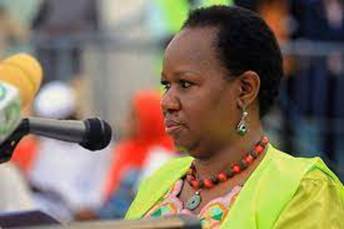
Ms Bintou Keita, SRSG for MONUSCO
The complete programme can be watched here. The UN Peacekeepers day film was screened following the keynote lecture.
The 2021 ‘Meet the Ambassador’ programme opened with a meeting with HE Mr Omar Al Nahar, ambassador of the Hashemite Kingdom of Jordan. Isabella Qin, Chair, Westminster Young Professionals, who moderated the event congratulated the ambassador on this the centenary of the founding of the Emirate of Transjordan, predecessor of the modern Hashemite Kingdom.
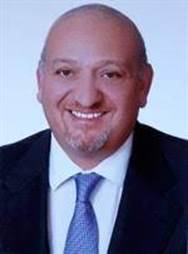
The ambassador highlighted some of his country’s key achievements over these hundred years, including the key role it played in seeking to resolve the Palestinian/Israeli conflict and serving as guarantor protector of the Holy Christian and Muslim sites in Jerusalem.
He discussed the importance of Jordan’s geopolitics, highlighting its handling of the flow of refugees into the country, action which reflects Jordan’s altruistic approach of putting its citizens and guests first, but also how this has impacted the country. He reported on the challenges in managing the COVID-19 crisis, including measures to protect the country’s economy.
He answered questions on a range of subjects, domestic and international, posed by members of the Westminster Young Professionals group.
Westminster UNA coordinated a small wreath-laying ceremony at the Cenotaph which was filmed for screening at the annual Peacekeepers Day conference. As in 2020 when a small wreath-laying ceremony took place (News Item 26 May), we did not want to break this long tradition. Participants in the ceremony included the Rt. Hon. Lord Ahmad, Minister of State for the United Nations, and Lt Col Simon Briggs, Royal Artillery representing the military and Chief Inspector (Rtd) Cecilia Dunster representing the police, both having served in UN peacekeeping duties. Military attachés from Poland, Thailand, Ghana, Argentina and Australia represented their continents and, as customary, members of the UN Veterans Association carried the UN standard.
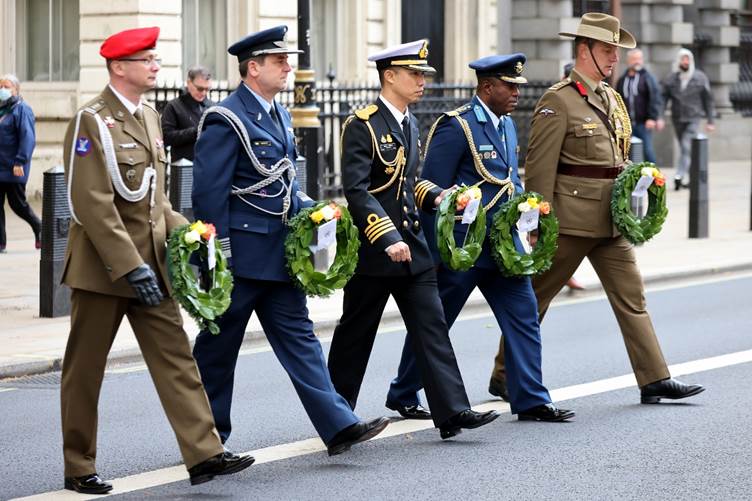
Defence attaches from Thailand, Poland, Ghana, Argentina and Australia, representing their continents, lay wreaths
The film also included a wreath-laying ceremony at United Nations Green by students from the Grey Coat School for Girls and the Westminster City School for Boys. Both schools customarily lead the diplomats during the regular ceremony at the Cenotaph. The film can be seen here.
The Westminster UNA committee has agreed to organise study tours to the UN in Vienna in late 2022, and to UN Nairobi in Spring 2023. Karin Pointner will act as coordinator for Vienna and Salem Mezhoud will do so for Nairobi. Both are members of the Westminster UNA committee. Reports on previous study tours organised by Westminster UNA to Vienna (10 October 2015), New York (24 June 2017) and European cities (30 September 2018) can be read on our News Page.
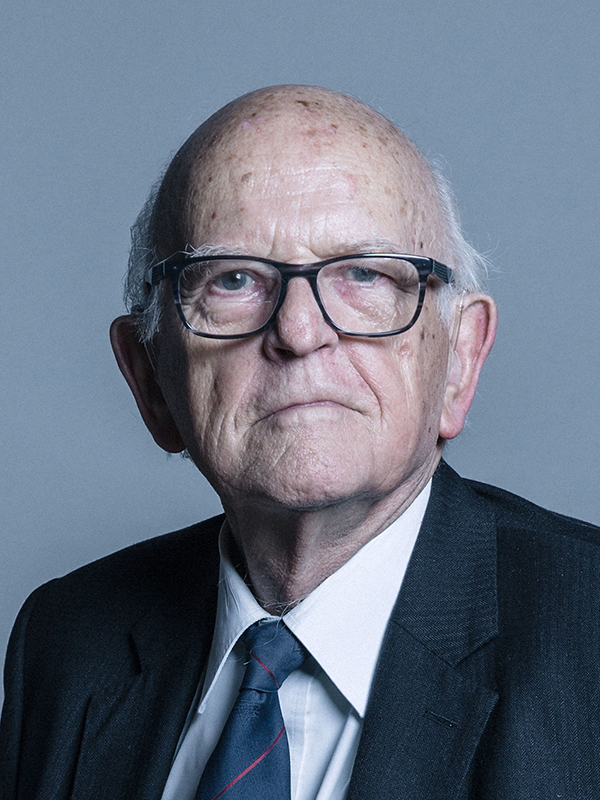
Westminster UNA sadly announces the death of Lord Judd of Portsea, one of our Joint Presidents, a loyal supporter of our activities and initiatives over many years.
Lord Judd represented Portsmouth as an MP between 1966 and 1979 and served as a minister in the Wilson and Callaghan governments, for the Royal Navy and Overseas Development and later in the Foreign and Commonwealth Office. Choosing the title Baron Judd of Portsea, he reaffirmed his affection for Portsmouth which he had represented.
Natalie Samarasinghe, Executive Director of UNA-UK, called him ‘an incredible advocate for the UN and for UNA-UK for many decades and a leading member of the All-Party Parliamentary Group on the UN. Since the start of this millennium, Lord Judd accounted for over 10 percent of all mentions of the UN in the House of Lords – a huge proportion. He made nearly 1,500 speeches in the House, most of them on global issues, and triggered 882 written answers from ministers.’
David Wardrop, Chair of Westminster UNA, stated ‘Frank Judd was so willing to help, chairing our meetings in parliament and lobbying on international issues we raised with government’. In 2017, Lord Judd was awarded the Sir Brian Urquhart Award for Distinguished Service. We hope to feature an Appreciation of Lord Judd’s life at a later date.
In a webinar co-hosted by the Institute of Commonwealth Studies (ICwS) and Westminster UNA, speakers urged Commonwealth members to ensure that their biennial meeting (CHOGM) to be held in Kigali in June leads to a strong and united message addressing the climate change crisis. The webinar had been called to identify key priorities, especially those relating to Small Island Developing States (SIDS) as Commonwealth members comprise the largest community of SIDS worldwide. The webinar can be watched here.
Sir Ronald Sanders, Ambassador of Antigua and Barbuda to the United States and to the Organisation of American States, and a Senior Research Fellow at the ICwS, stated that it would be nothing new for the Commonwealth to tackle climate change and particularly its effect on SIDS, having first addressed the issue in 1987. Since then, circumstances have worsened such that a robust, joint Commonwealth position is now needed and urgent. He chronicled international efforts to alert to the dangers of sea-level rise, noting that not only SIDS are affected but large countries like Bangladesh. The Report of the expert group led by Dr Martin Holdgate titled “Climate Change: Meeting the Challenge” (1989) had been insufficiently pursued by larger member states like the UK, Canada, South Africa, India and Australia, all among the top 15 greenhouse gas emitting states worldwide. Meanwhile, 58 small states which the UNDP calculates contribute less than 1 per cent to the world’s greenhouse gas emissions are the first to experience the worst and most devastating impacts of climate change. This brings greater risks to their economies, livelihoods, and food security and those islands dependent on tourism have suffered even further through the devastating collapse of this source of income.
Sir Ronald called for Britain and Canada, both members of the G7 and G20, and India, a G20 member, to become the vocal champions in Glasgow, advocating the easing of conditions and procedures for delivering funds for adaptation and resilience. Also, that developed countries should keep their pledge of channelling $100 billion annually to the Global South, an already missed deadline of 2020. Sir Ronald’s speech can be read here.
The Revd. Guy Hewitt, former High Commissioner of Barbados to London and also an ICwS Senior Research Fellow, stated that the Commonwealth brand is now under test. Commendably, it was among the first to address climate change issues so it is right that it should be under critical examination on its performance for COP26. He noted that at COP21, there had been demand for equitable social outcomes as well as climate change itself. Further, at CHOGM in Malta (2005), Premier Trudeau had shared with him that both President Obama and Chancellor Merkel had urged him to ensure the Commonwealth reach tangible outcomes. So, the fate of small Commonwealth members, especially SIDS, is critical, and he recalled that a task force had set up the UN’s Multi-Dimensional World Vulnerability Index (MVI) but that regrettably this has still to become a reality. His greatest fear, it was clear, was that with small states still not sufficiently championed by larger fellow Commonwealth states, there is a danger that its policies are being driven by the agendas of those larger members. His hopes for CHOGM are for recognition of the existential danger facing small states and there is a need to influence larger members’ behaviour, through new mechanisms. The Commonwealth Secretariat is not strong and it needs funding, direction and the need to work together. After all, he concluded, ‘we have a shared destiny’.
Gabrielle Swaby, a researcher into global climate diplomacy, policy and governance working with the International Institute for Environment and Development, outlined her work helping LDCs in UN climate change negotiations. In her case, these dated from COP24 to date, and she was assisting these in identifying opportunities for mitigation in their Nationally Determined Contributions (NDCs) which, under the Paris Agreement, identified their own plans to cut greenhouse gas emissions, thus attracting funding for mitigation and adaptation. She argued that vital components for a successful COP26 would be added climate-related financing, greater transparency in determining qualifications for debt relief and also clear audit of accountability in identifying transactional costs.
In the general discussion that followed, questions covered the newly launched Adaptation Action Coalition, promoted by the UK government; the recently signed MoU between the Caribbean Community Climate Change Centre (CCCCC) and the UNFCCC aimed to improve climate resilience in the Caribbean; the Commonwealth Disaster Management Agency which assists deal rapidly with the aftermath of catastrophes such as the 2020 hurricanes in the Caribbean which led to such damage; the adverse impact of climate change on women, and the appointment of John Kerry as the USA’s Climate Envoy; and initiatives set up to assist navigate all these mechanisms by a range of organisations beyond the UN, the IMF and the Commonwealth, seeking to accelerate funding for mitigation and adaptation. All this adds to the organisational workload of governments of small nations and too often fails to account for the need for the long-term financial underpinning of new projects. The human dimensions must also be noted: while climate justice is often cited, climate change is more than purely environmental or physical in nature. It involves concepts such as equality, human rights, collective rights, and the historical responsibilities for climate change.
Finally, in noting that Justin Mundy has been recently appointed Commonwealth Special Envoy on Climate Change, the speakers shared what their messages might comprise.
Gabrielle Swaby would put adaptation and resilience on a par with mitigation of emissions as in previous UN climate change negotiations they had always been treated as of secondary importance certainly for LDCs and SIDS as, after all, these countries have negligible impact on global emissions. Long term mechanisms must also be introduced and sustained.
Sir Ronald Sanders noted that Justin Mundy’s mandate extended to all Commonwealth members and that therefore he should target both the largest members and the business and industrial community in themselves advocating carbon-free policies. There can be no compromises.
Noting Sir Ronald’s call for business to cooperate, David Wardrop shared the recent statement by former BlackRock CEO Tariq Fancy who had stated that its Environment, Social and Corporate Governance (ESG) funds totalling $1 trillion cause little impact on greenhouse gas emissions and that Wall Street is “greenwashing the economic system”. In his closing remarks, Guy Hewitt, the only ordained speaker, regretted he could not call upon higher powers in this challenge(!) but urged the Commonwealth to task Mr Mundy to deliver something more tangible than generalities. He must be able to work closely with regional and sub-regional groups to reach consensus, as the Commonwealth too often operates in a top-down manner.
Professor Philip Murphy highlighted key observations made by the speakers and closed the meeting.
Westminster UNA organised an interesting public online meeting which examined the UN’s early days and Britain’s contribution to its creation.
Dr Dan Plesch, Director of the Centre for International Studies and Diplomacy at SOAS, took his audience back to 1941 when Winston Churchill visited Franklin D Roosevelt leading to agreement on the title United Nations. The first UN Day parade was held in London and other British town in June 1942 and also in Wellington, New Zealand as shown in this archive clip. He referred to the Declaration of St. James’s Palace agreed between Commonwealth governments and the exiled representatives of occupied European states and to Britain’s leadership in supporting the UN War Crimes Commission. Dr Plesch’s books on the era include America, Hitler and the UN: How the Allies Won World War II and Forged a Peace and Wartime Origins and the Future United Nations are highly recommended reading on the matter.
John Burley who recently co-authored the monograph The Early Contributions of British Nationals to the Post-War International Organisations (News Item 26 December 2020) spoke about the Foreign Office’s proposals for the UN Charter and the considerable work of the Preparatory Commission in late 1945. He referred also to the creation at the same time of key UN agencies including UNESCO, FAO, WHO and Bretton Woods instruments.
The final speaker was Sir Peter Marshall who was serving with the RAF in Asia seventy-five years ago before a distinguished diplomatic career, taking him to the UN in New York and Geneva, and later serving as Commonwealth Deputy Secretary-General. He referred to the vital cooperation between statesmen with rival views, Churchill, Attlee, Eden, who worked together so effectively. He then expanded on the Commonwealth’s contribution to the drafting of the Preamble to the Charter (News Item 12 December 2020).
Westminster UNA welcomes the announcement that Broad Sanctuary Green will now be named United Nations Green, an initiative for which it has been campaigning since 2016, the UN’s 70th anniversary.
United Nations Green is perfectly suited for its name, located between three important institutions; Westminster Abbey, the nation’s principal location for state events; the QEII Conference Centre, host to major international events; and Methodist Central Hall Westminster which hosted the first UN General Assembly in 1946.
David Wardrop, Chair of Westminster UNA stated “Over the centuries, London has accumulated many landmarks and statues to military leaders including most recently those commemorating Bomber Command, the Battle of Britain, Women of World War 2, and Animals in War, in all thirty-nine but none to peace. This new space encourages us to look forward, committing ourselves to reconciliation and dialogue, and the search for peace.”
Later, black granite panels will be installed, featuring the text of the Preamble to the UN Charter, the UN symbol and ‘United Nations’ in the six official UN languages, in an installation approved by Westminster City Council.
By naming United Nations Green, London will join other cities which boast squares, thoroughfares and landmarks linked by name to the United Nations. These include New York, Paris, Berlin, San Francisco, Mexico City, Manila, Buenos Aires, Casablanca, Liege, Ans, Dijon, Doha, Tunis, Nairobi, Lusaka and Bauru.
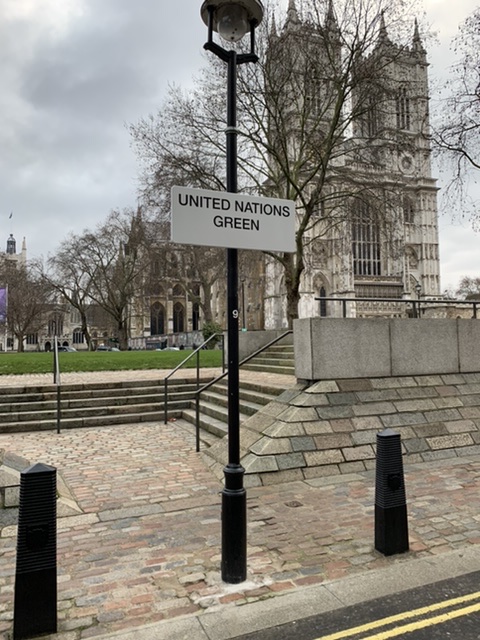
Methodist Central Hall which hosted the opening session of the UN General Assembly exactly seventy-five years earlier, held an excellent service to mark the work of the United Nations. The service, led by the Revd Tony Miles, featured excellent video material provided at short notice by the United Nations, the Ministry of Defence and the UK Permanent Mission to the United Nations in New York. The sermon ‘God’s Channel of Peace’ given by the Revd. Lansford Penn-Timity focused on the work of the United Nations. The text of the video contribution by Sir Peter Marshall can be read here. The complete service on YouTube can be watched here.
Westminster UNA is proud to record that our website has now chronicled our activities for a span of twenty years. The website was first posted in 2005 but features all that we have done since 2001. For the early years, see Events Reports on the Home Page menu bar. Annual Reports are listed in Event Reports also. Full details of our annual flagship events are listed on the homepage. News of our Young Professionals can be reached through the home page menu bar.
The news pages commenced in 2011 and now list more than two hundred items, showing the breadth of our work. The renamed About Us menu item introduced the current executive committee and lists previous chairs dating back to 1952. Most written documentation since 1952 is available for inspection for archivists and members alike.
For an overview of our highlights over 20 years, click here.
Westminster UNA welcomes the timely publication of The Early Contributions of British Nationals to the Post-War International Organisations , a 30-page monograph jointly written by John Burley and Michael Davies, both members of the British Association of Former UN Civil Servants (BAFUNCS). This work grew out of the earlier work done by them as co-authors, together with David Macfadyen and Marilyn Carr, of Eric Drummond and his legacies - The League of Nations and the beginnings of global governance (2019) reviewed here.
The monograph recalls
- key officials in the Foreign Office who made significant contributions to the drafting of the UN Charter in 1943-1945 – Alexander Cadogan, Gladwyn Jebb and Charles WebsterIt concludes with some comments on the British government’s attitude to the UK staffing of the multilateral system in the 1950’s and 1960’s. A version was presented to the recent Edinburgh University on-line Conference on “Britain, the League of Nations and the New International Order” that David Macfadyen helped to organise. Click Here to see their PowerPoint Presentation to the Conference.
Those interested in the subject covered by the book on Eric Drummond will find these links both interesting and useful:
In this important study titled All Together Now, Sir Peter Marshall sets out a convincing case for multilateralism and the need for support for the United Nations. Click here to read it.
Set against the end of 2020 with its ‘awesome Coronavirus trail of death, bereavement, suffering, separation, anxiety, loneliness, disruption and destruction of livelihoods’ he notes we are increasingly bound together in our interdependent future. To engage with it, we should, in the words of the Preamble to the United Nations Charter, “reaffirm faith in fundamental human rights, in the dignity and worth of the human person, in the equal rights of men and women and of nations large and small".
Sir Peter describes his work as a preliminary version of a study in continuation of work done with Professor Nabil Ayad with whom he created the concept of Geodiplomatics, the study of the management of interdependence. The completion of the study must await a return to normal life.
This study is presented to his United Nations Association friends, in prospect of the 75th anniversary on January 10, 2021, of the opening session of the UN General Assembly in the Methodist Central Hall, Westminster.
Sir Peter Marshall, KCMG, CVO, joined the UK Diplomatic Service in 1949, rising to Economic Under-Secretary in the FCO and then Deputy for Economic and Social Affairs. He then joined the UK Permanent Mission to the UN in New York and later served as UK Permanent Representative to the UN in Geneva (1979-83). He also served as Commonwealth Deputy Secretary-General (1983-88). He was Chairman of the Commonwealth Trust and Royal Commonwealth Society (1988-92) and Chairman of the Joint Commonwealth Societies Council (1993-2003). His book Positive Diplomacy (Macmillan) was published in 1997.
Westminster UNA is delighted to publish All Together Now! A UN75 reflection on our multilateral future specially written by former diplomat Sir Peter Marshall in advance of the UN Secretary-General’s visit to London to mark the first UN General Assembly held in Methodist Central Hall Westminster on 10 January 1946. Click here to read this.
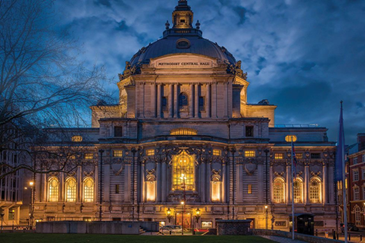
In this UN75 Reflection, Sir Peter writes with the authority of one who served with the Royal Air Force during World War II and who entered the diplomatic service in 1949. It chronicles events from the outbreak of war in 1939, leading to the ready support for the ‘Mother Country’ given by the Commonwealth, and early efforts to conceive a new general security organisation, suited to all "peace-loving states". In describing the San Francisco conference in 1945, he explains how the iconic Preamble to the UN Charter owes so much to its Commonwealth delegates and enlarges on the symbiosis between the Commonwealth and the UN, a relationship encouraging for the future. In praising the Commemorative Declaration adopted by all Heads of UN Member State on September 21, 2020, he points with confidence to a new sense of "re-invigorated multilateralism". He hopes for the resumption of US leadership of "the free world".
Westminster UNA has published previous contributions by Sir Peter Marshall. See these news pages:
A review of the UN’s first seventy years (6 January 2016), Britain after Brexit must be as “global” as when hosting the inaugural meeting of the UN in 1946 (12 January 2020).
The Westminster UNA Blog, started in April 2016 by the Westminster UNA Young Professionals, is reopening for contributions from all Westminster members. “This can offer an excellent shop window for new ideas from our members” says Isabella Qin, Chair of Westminster Young Professionals. The Blog now features on the homepage menu bar.
Westminster UNA contributed to the What Next 4 UN Festival held to mark United Nations Day in the UN’s 75th year. The festival, co-ordinated by the UNA London and South East Region (LASER), Peace Child International and UNA-UK, taking as a theme the overwhelming sense of insecurity induced by Covid-19, invited teams to link security with six major issues: health, food, the environment, economics, peace, and the digital space. Each team was charged to organise an evening online workshop during the week preceding the festival, agreeing Action Points to be shared in short reports to the main conference on UN Day. Westminster UNA was charged with the Peace and Security issue.
The conference watched addresses given by António Guterres, UN Secretary-General and Lord Ahmad, UK Minister for the United Nations and, after the workshops’ reports, the programme featured the presentation of the annual Sir Brian Urquhart award to Zeinab Badawi, the well-known broadcaster, in recognition of her support for key international development issues.
There followed homages to six UN ‘heroes’, Eleanor Roosevelt, Dag Hammarskjöld, Jim Grant, Kofi Annan, Sergio Vieira de Mello and the unknown heroes of today working with the UN in the field. The action-packed programme continued with a concert and finally an intergenerational dialogue on the application of artificial intelligence and the challenges facing the UN in the digital sphere.
All elements of the festival are available on the WhatNext4UN75 YouTube channel.
Westminster UNA teamed up the Faith Forum for London to host a webinar marking the first UN international day on violence based on religion or belief. Webinar moderator Katharine Thane, Senior Researcher & Policy Advisor to the UN Special Rapporteur on Freedom of Religion or Belief (FORB), provided participants with an overview of the challenges facing those working in the FORB field. She referred to religious minorities in several countries, observing that persecutors in one country might be the persecuted in another. Also, persecution within religions can fracture wider societies. The advent of COVID-19 has introduced further complexities, leaving some communities to choose between contagion and starvation. Access to the internet during the pandemic has been important for so many, but this has thrown up into full view the imbalances in the Digital Divide.
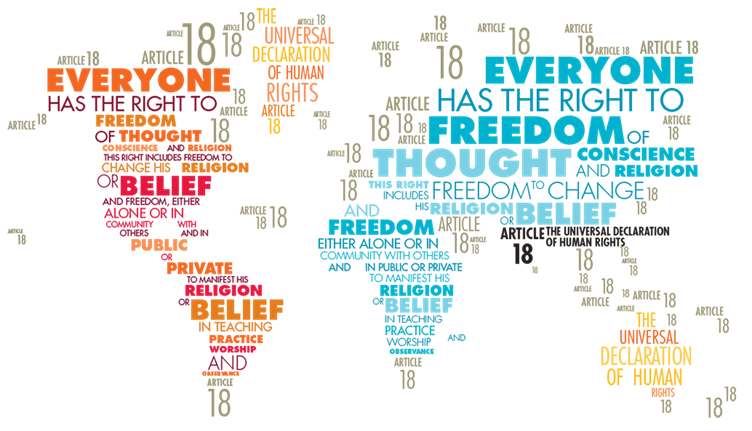
Dr Ahmed Shaheed, UN Special Rapporteur on Freedom of Religion or Belief, outlined the UN’s role in this field, setting normative standards, monitoring compliance, engaging with stakeholders, responding to crises, building resilience and providing neutral space. As an example of building resilience, he referred to the UN Sustainable Development Goals which demand that ‘no-one is left behind’. Neutral spaces are important to counter rising sectarianism, testing the UN’s claim to offer protection, he said, also citing the ambitions of the Responsibility to Protect commitment, sometimes pitted against regional systems that might challenge these. For instance, the decision of the European Court of Justice relating to the wearing of the hijab in France and Belgium.
Zahed Amanullah, Resident Senior Fellow, Institute for Strategic Dialogue (ISD), referred to lessons learned through the Prevention and Countering of Violent Extremism programme. The activities of state and non-state actors could lead to the weaponisation of religion. To counter this, the ISD had championed the ‘Strong Cities Network’ which works with local prevention networks, also the Plan of Action to Prevent Violent Extremism. He referred to case studies led by ISC in Kenya through youth programming (YouthCAN and Young Cities) for the Global Peace Foundation.
Dr Kishan Manocha, Office for Democratic Institutions and Human Rights, Organisation for Security & Cooperation in Europe (OSCE), referred to the achievements in this field by organisations whose work does not principally involve human rights. He also mentioned those who, whilst driven by their faith, fulfil important roles in their localities even though their faith group itself has no formal role in civil society. That said, faith-based organisations have repeatedly shown solidarity when politicians have been weak or worse, silent. Individual voices, from women or the young, must be heard too, especially in this COVID affected environment.
Questions from participants covered cases where ‘shut down speech’ legislation had been introduced under the disguise of combatting the pandemic. Human Rights and FORB freedoms had been reduced as never before with failures by governments to introduce due diligence checks on such moves. State failure in Iraq and UN failure in Syria and its inability to protect the Yazidis six years ago was reviewed but Dr Shaheed felt that the UK was in a good position to exercise influence internationally as its own FORB programme was good.
All speakers referred to the challenges to holding religious gatherings facing all communities. Zahed Amanullah noted how mosque leaders had played important roles in track and trace activities.
The 2020 Mandela Mile project, for which Westminster UNA played an important initial role, featured projects in more than twenty-five countries with individuals and groups completing their own ‘Mandela Miles’ in a variety of creative ways. Video coverage from nine countries was coordinated by an all-female team, generating 30+ interviews with global leaders, community townships representatives and leaders of off-grid communities, all working to amplify the voices of the unheard. The livestream transmission generated over 16,s000 views. The Mandela Mile Facebook group has now grown to 73,869, and 600 new subscribers have signed up as Mandela Mile Supporters.
One innovation led to 36 young leaders completing the new Mandela Mile Leadership Programme launched in collaboration with the Caux Peace & Leadership Forum in Switzerland.
The traditional after-party was held online using innovative software enabling visitors worldwide to roam across a virtual tropical beach (see image below), meeting others and sharing notes of the day’s activities.
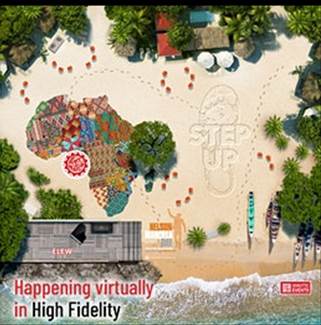
To mark the 75th anniversary of the signing of the United Nations Charter in San Francisco in 1945, Westminster United Nations Association installed what it believes to be the world’s largest banner of the UN symbol on Broad Sanctuary Green and then ‘planted’ it with the flags of all 193 UN Member States. Broad Sanctuary Green is located between the QE2 Centre, Westminster Abbey and Central Hall Westminster which hosted the inaugural meeting of the UN General Assembly. Over the weekend, visitors were welcome to inspect the installation and learn more about the early years of the United Nations, from information boards close to the display.
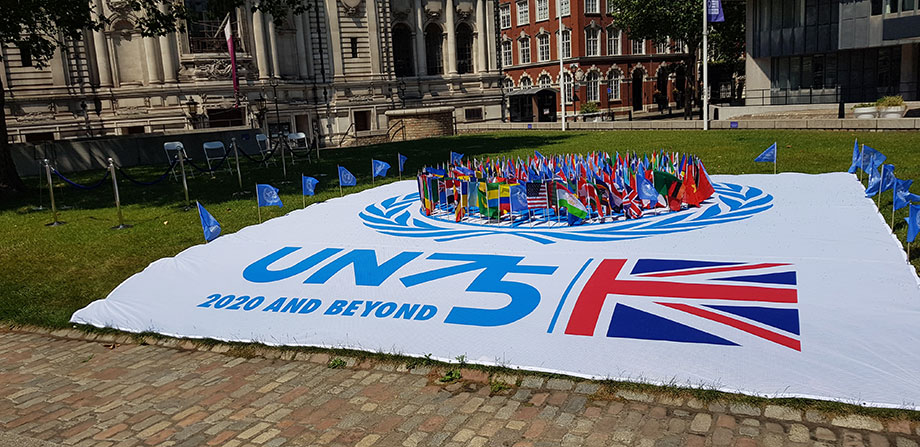
“We took the decision to go with the idea as every other UN75 project worldwide was only reachable online” said David Wardrop, Westminster UNA Chair. “It’s remarkable that even when V2 rockets were still falling on UK soil, diplomats from fifty nations were already gathering in San Francisco to discuss and agree the Charter of the new United Nations.”
Also on display was the iconic Preamble to the UN Charter. Information boards recorded that, meeting in London before leaving for the San Francisco conference, the Commonwealth delegations backed an inspirational proposal from Jan Christiaan Smuts, South African Prime Minister. “The draft Charter, prepared at Dumbarton Oaks needs a Preamble”, he had said, as this would make its noble provisions more readily understandable and meaningful for the millions of ordinary people who had known ‘the scourge of war, which twice in our lifetime has brought untold sorrow to mankind’. As adopted, the Preamble, about 200 words long, is perhaps the greatest text in modern diplomacy. It has been the Pole Star of the United Nations and of international life ever since.
Westminster UNA thanks the LASER Trust, the LASER Regional Council and private donors for helping fund the display.
Sir Peter Marshall, whose long diplomatic career led him to serve with UK missions to the UN in New York and Geneva, and who later became Commonwealth Deputy Secretary-General, has written a personal letter to members of the Westminster United Nations Association on the occasion of the UN’s seventy-fifth anniversary. In this, he recalls his earlier message to us on 10 January 2016, the 70th anniversary of the inaugural session of the UN General Assembly which he had described as the launch of the greatest experiment in international co-operation the world has ever seen. “Four years later,” he writes, “as we celebrate the 75th anniversary of the signing of the UN Charter in San Francisco and look back across the Coronavirus chasm which separates us from even our very recent past, I plead guilty to understatement”.
Sir Peter, now aged 95, is well-placed to speak of the course of events since 1945. He refers knowledgably to the initiatives of Prime Minister Clement Attlee, US President Harry Truman, and European statesman Robert Schuman. He praises the initiative on COVID-19 taken by the UN General Assembly, but not the Security Council. He looks forward to the UN’s planned Youth Forum (in whatever form it proves possible), hoping they study the text of the UN Charter’s Preamble, even seeking to update it. Separately, Westminster UNA will be asking its Young Professionals to do likewise.
On 12 December 2001, Westminster UNA held a public meeting in parliament to review the outcome of the UN World Conference Against Racism (WCAR) held in Durban that year. The comprehensive report of the meeting can be read here. It offers a valuable record of the febrile political climate at the time and shows how efforts to combat racism in the UK were upended by the 9/11 attack in New York. In turn this led to an unprecedented joint statement by all the UN Human Rights Independent Experts.
With publication of Community Cohesion, the report on the 2001 Northern Town riots, and with expectations from the UN World Conference on Racism (WCAR), many had hoped that the government would map out an anti-racism policy which all could support. However, the 9/11 attack led to UN Security Council Resolution 1373 requiring governments to report before the year end on progress in tackling terrorism. The newly formed 1373 committee was led by the UK Permanent Delegate, so the UK was expected to deliver. It did so, along with only a handful of other nations. Back home, any proposed anti-racism policy was upended, conflated with the need to combat terrorism. A staffer at the Runnymede Trust, the leading independent race equality think-tank, reckoned progress was stalled for more than three years.
What did we learn? Publication of the report on the WCAR had been stymied by disagreement on whether issues of slavery-related reparations should feature in its Declaration or its Programme of Action, leading to both documents being withheld from publication. However, Westminster UNA managed to secure their early release and, gathering the best ideas, assembled a twelve-point Guide comprising more than one hundred recommendations. The Guide can be read here.
This COVID-free story has three parts and a coda summarised in its title. Firstly, whilst the current UN Secretary-General Antonio Guterres seeks unity amongst the Security Council’s Permanent Members in this new 21st century challenge, and not re-kindle one from the previous century, the fate of his predecessor Dag Hammarskjöld who died in a plane crash in 1961 while seeking to bring peace to the Congo has continued to puzzle us over these near sixty years.
The incident puzzled the UN General Assembly at the time. It agreed to leave the inquiry verdict open pending further data. Fifty years later, analysis of much of that needed data prompted the UN to re-open the inquiry which then took evidence from eyewitnesses and experts, diplomats, and governments. Well, from many governments but not the UK. Why?
The UK’s Foreign & Commonwealth Office (FCO) claimed it had already shared all it knows (response, UK Permanent Representative, 10 June 2015) but refused to extend that assurance to the records of MI5, MI6, and GCHQ, all operating in or around the Congo at the time of the plane crash. The UN’s inquiry team suspected that some other countries were being similarly coy. In May 2018, the UN asked initially nine countries (adding five later) to grant access to all relevant records, including security and intelligence records, to an ‘independent and high-ranking official’ which the countries would appoint. The official was tasked to report progress and obstacles encountered before October 2018, after which the UN would prepare a new report. All countries responded except the UK which neither even acknowledged the UN’s request, nor the follow-up from the UN Secretary-General. Only when the closing date for responses had passed did it reply, stating that it would not appoint anyone to the role, although some months later it did do so. How could the UK act this way, at the time it claims to be establishing a new post-Brexit, Global Britain identity? If it had nothing to hide, as claimed in 2015, why that delay?
So, to the story’s second part. In March 2019, we submitted a Freedom of Information Request seeking records documenting the FCO’s decision. Its initial response, refusing to provide the information, rested on its narrow interpretation of the Freedom of Information Act, much of which we rejected as we did its second response. We appealed the matter to the Information Commissioner, arguing that public interest arguments weighed in favour of disclosure.
After acknowledging similar difficulty extracting information from the FCO, the Information Commissioner relayed her judgement in May 2020. She ‘accept(ed) that there is a clear public interest in understanding more about the decision-making process’, noting ‘potential consequences on the UK’s relationship with the UN’ but concluded in respect of one of the five exemptions under the Act that the FCO had cited, that ‘by a relatively narrow margin the public interest favours maintaining the exemption.’ Is that the end of it?
Not quite, and so to the third part. In assessing the public interest, the Information Commissioner has taken a very narrow interpretation of the public interest, under that and one other exemption. However, the FOI Act requires government departments, and the Information Commissioner in deciding appeals, to consider “all the circumstances of the case” in assessing the public interest. The Information Commissioner did not look at all of the circumstances. There is a powerful public interest in knowing why the UK was alone in failing to acknowledge both the UN’s initial request for cooperation and the Secretary-General’s personal follow-up, or even the timing of its appointment of an independent and high ranking individual, a full seven months after the UN commenced preparing its report. There is a public interest in knowing why the FCO adopted such an unhelpful, even cynical approach, and those public interests should have been properly weighed by the Information Commissioner.
So, to the coda. Knowing all this, why are we not appealing the Commissioner’s judgement? Firstly, because our government’s performance can be clearly judged against that of Russia, Zimbabwe, the D.R.C, Angola and other UN Member States. Such exposure to international scrutiny shames us as a nation. Secondly, as a small organisation, we cannot match the power of a battery of State-funded lawyers. However, we will continue to support the hammarskjöldinquiry information service which sets out to report the progress of the continuing UN inquiry and associated developments.
David Wardrop is Chairman of the Westminster United Nations Association which hosts the hammarskjoldinquiry.info website which has posted informed updates on the Hammarskjöld Inquiry process since 2014.
The 2020 annual conference and diplomats wreath-laying ceremony to mark the International Day of UN Peacekeepers was cancelled but important elements were salvaged.
This year’s keynote Folke Bernadotte Memorial Lecture, to mark the twentieth anniversary of UN Security Council Resolution 1325 (Women, Peace & Security), was to be presented personally at RUSI by Brigadier Maureen O’Brien, the second most senior officer in the Irish Defence Forces (IDF), and now serving as Acting Force Commander of the UN Disengagement Observers Force (UNDOF) based in the Golan Heights, between Syria and Israel. The COVID-19 pandemic has led to all UN Peacekeeping missions to extend to at least end June so Brigadier O’Brien’s address was delivered in her headquarters and can be seen here.
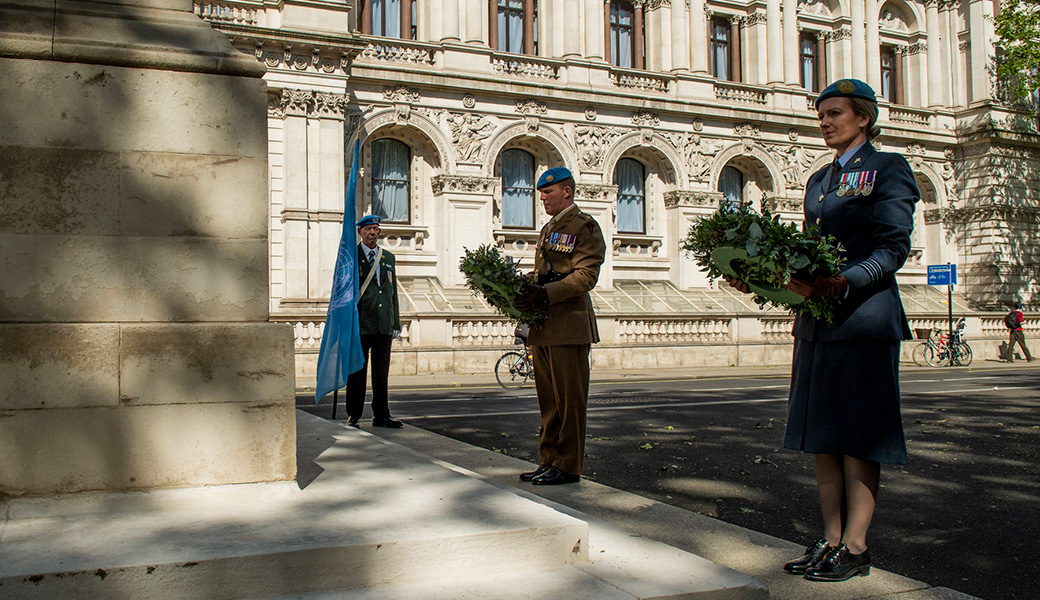
On 26 May, a small wreath-laying ceremony was held at the Cenotaph. Wreaths were laid on behalf of the government by Lt-Col Steven Neville, previously serving with MINUSMA in Mali, and on behalf of HM Armed Forces by Wg-Cdr Cat Davison, previously serving with UNMISS in South Sudan. Wreaths were also laid by Tim Landy, Chairman of the UN Veterans Association, and by Bryony Pike, Finance & Events Coordinator, UNA-UK. The event was coordinated by Westminster UNA.
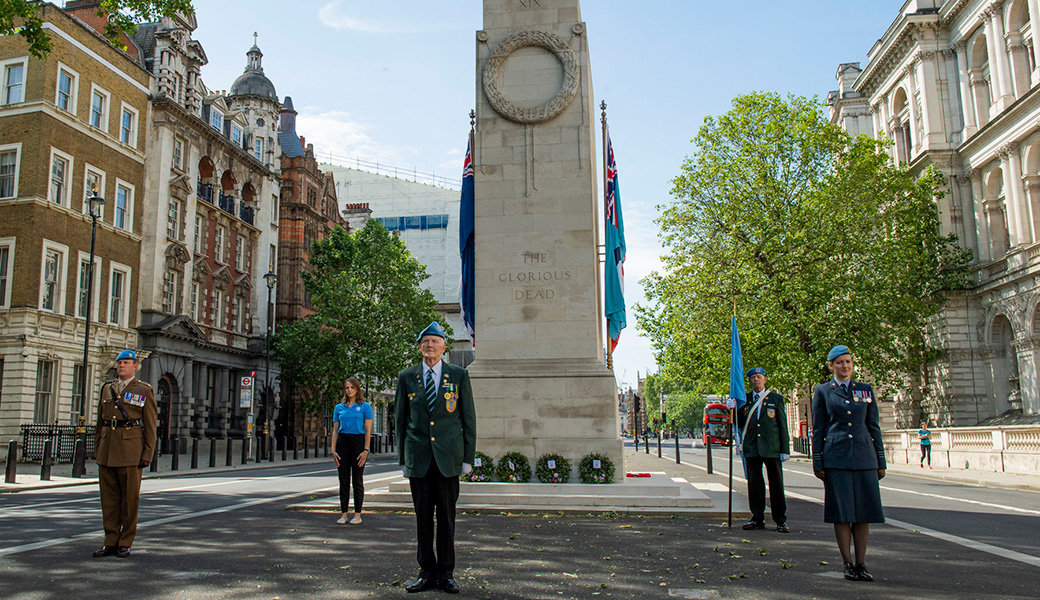
The annual conference and ceremony, initiated by Westminster UNA in 2004 and now co-organised with UNA-UK and RUSI, is the world’s oldest and largest event to mark this important UN anniversary.
Westminster UNA has submitted a resolution on the situation in Idlib province, Syria, to the UNA’s London & South East Regional Council. This points to the continuing lack of coordinated leadership as demonstrated by the UN Security Council’s five permanent members. In explanation, David Wardrop, Westminster UNA’s chair stated “We know our voice is small on this issue but when echoes of the Arab Spring hit Syria leading to small scale street riots in three cities, that was the time for the UN to act. However, as the resolution’s text shows, the P5 members collectively failed the Syrian people and the entire international community. And lives were needlessly lost.”
The resolution states:
Westminster United Nations Association notes that,
1) 2020 marks the 75th anniversary of the founding of the United Nations, the Charter of which sets out to ‘save succeeding generations from the scourge of war, which twice in our lifetime has brought untold sorrow to mankind’,
2) For which the five principal victorious powers (P5) chose themselves to become permanent members of its Security Council, awarding themselves extraordinary powers,
3) over these 75 years, they have attracted universal criticism for too often placing national self-interest before their duties to the wider international community, such that in 2020, Antonio Guterres, Secretary-General, has chosen to reach out beyond them to the entire global community to share with him their vision for ‘The Future we want, the United Nations we need’,
4) in 2011, the Security Council supported unanimously Kofi Annan’s Six Point Plan to insert a UN observer mission into the three Syrian cities experiencing non-violent civil unrest but then inexcusably failed to ensure the necessary follow-through since when the world has watched the self-destruction of one of the UN’s founder Member States, leading to misery for its peoples and their scattering to many countries,
demands that the Security Council, led by the P5 working in partnership,
1) instructs the re-opening of all necessary crossing points into the Idlib region,
2) demand the end of attacks of medical centres, in line with Security Council Resolutions 1674 and 2286, whereby it not only condemns attacks and demands compliance with international humanitarian law in armed conflict,
3) convene a meeting of its members before the end of April, within the Idlib region, to demonstrate to the global community that, after 75 years, its members continue to honour and uphold the principles underpinning the creation of the United Nations as set out in the Preamble to its Charter.
Westminster UNA has now set up a Freedom of Religion or Belief Forum and welcomes all interested UNA members to participate. Initial work will comprise mapping current UN Human Rights mechanisms for protecting victims of religious discrimination and persecution, identifying NGOs and others already active in this field, some working in isolation, and gathering media case studies, all with a view to identifying gaps and determining where this new forum can best add value. The focus of the group would be on how to make the UN more effective, ensuring that member states comply with rulings of the General Assembly. Later, a Religion & Belief page will be added to the Westminster UNA website. The forum’s inaugural meeting took place on 26 February.
Westminster UNA announces the 17th conference and wreath-laying ceremony to mark the International Day of UN Peacekeepers to be held on Thursday 21 May. As in previous years, the conference will be hosted by the Royal United Services Institute (RUSI) in Whitehall, close to the Cenotaph. More than one hundred embassies are expected to participate in the ceremony, now the largest worldwide to mark this important UN anniversary. The conference (10am to 4.30pm) will break for the Cenotaph ceremony at 2pm. Soldiers from the Royal Anglian Regiment who have served with the UN in South Sudan will join the parade to be led as customary by members of the UN Veterans Association who will provide the colour guard. Registration for the conference is open to all UNA members and the public and details will be posted on the UNA Events page and also on the Westminster UNA Future Events page.
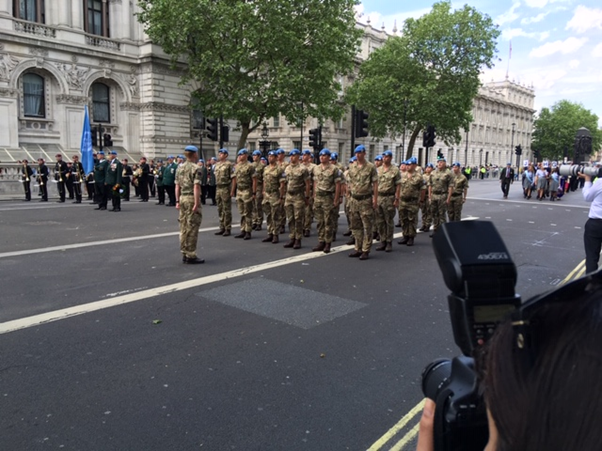
Westminster UNA, together with other organisations, has now applied to use Trafalgar Square for a programme of music and talk, including a series of Speakers’ Corner-type dialogues around the square. The event will be live-streamed to other cities participating in the Mandela Mile project, pioneered by Westminster UNA in 2018. For details as they develop, see Mandela Mile here.
Westminster UNA are delighted to congratulate Giulia Gandini who won the 2018 branch’s We The Peoples Film Festival #TweetaPitch competition with her proposal to give a homeless person the opportunity to make a film using a mobile phone (image: Lily who filmed her life as a homeless person). The finished film, Home Stream, the first of two, was given its world premiere at the 2019 film festival and later received 3.5 million views on Real Stories. It is one of fifteen films selected by the Mobile Motion Film Festival 2020 (Switzerland) and has been shortlisted for the Best Mobile Short Film Award at this year’s Min Max Film Festival in Germany. “We are so pleased for Giulia,” said Karin Pointner, Associate Director of the festival, “and we look forward to holding the 2020 competition.”
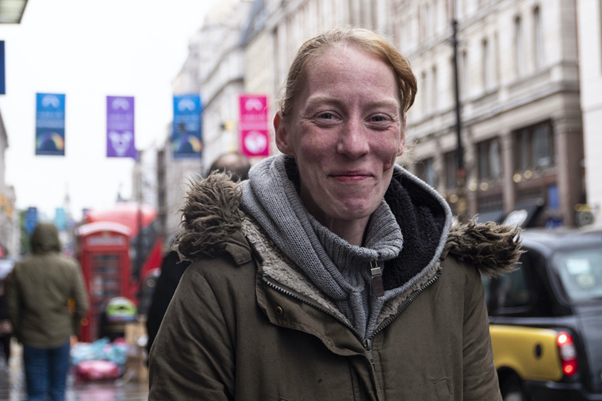
Westminster UNA’s 17th annual International Law lecture titled “In Search of the International Law of Cyberspace: A Travelogue” was given by Professor Michael Schmitt, a former USAF Judge Advocate and Visiting Professor of Public International Law at Exeter Law School. In a lively address, he described how the world continues to struggle to introduce and seek ratification of laws to contain the excesses of conventional warfare and its cruel humanitarian consequences. To address these important issues, the UN set up the Group of Governmental Experts (GGE) and an Open-ended Working Group (OEWG) on “Developments in the field of ICTs”, developed from the UN’s First Committee which discusses and exchanges views on issues related to international peace and security, including those related to cyberspace. Both these UN initiatives have their challenges, not least because they seek to cover the same territory but from either a Western or Russian standpoint. Despite definite progress in 2015, all seemed to fall apart in 2017 with China, Russia and Cuba all questioning prior agreement on the right to respond to internationally wrongful acts, the right to self-defence and adherence to international law. However, divisions are not only on well-trodden East-West lines. Whereas the 2004 Budapest Convention on Cybercrime, endorsed by 64 states, can be updated with amendments to fill loopholes, some states seek to create a new Convention. But there is great distance between states, even those from whom one might expect convergence. France, the Netherland the UK differ on key issues. This challenging environment offers the world community two options, to raise barriers or to lower them. Each option has advantages – but what about the victims of cyber-attacks? This might prove to be the best start point for future negotiation.
In his article ‘The world we seek in 2020’, published in Briefings for Brexit, Sir Peter Marshall former Commonwealth Deputy Secretary General makes a plea that the UK should remain as globally oriented once it leaves the EU as it was 75 years ago at the foundation of the United Nations.
Paragraph 2 of the “Political Declaration setting out the framework for the future relationship between the European Union and the United Kingdom” reads as follows:
“The Union and the United Kingdom are determined to work together
to safeguard the rules-based international order, the rule of law and
promotion of democracy, and high standards of free and fair trade and
worker’s rights, consumer and environmental protection, and co-operation
against internal and external threats to their values and interests”.
One’s first instinct is surely to applaud such an admirable wide-ranging agenda. The follow-up question is “how do you deliver it?” The operative verb is “safeguard” which implies that the desirables are already in place, at least in essence. But is that so? The verdict of the December 12 election – which I think of as “the wisdom of the miners”- suggests otherwise.
The first item on the list for safeguarding is “the rules-based international order”, a phrase much in use but entirely lacking in precise definition. What in fact is it? An established, over-arching framework within which one may aspire to safeguard the other items? Or something separate from those items? If so, of what does it consist, and how does to relate to them?
Good friends on both sides of the Channel, in a year in which we mark the 75th anniversary of the end of the Second World War and the launch of the United Nations, and the 70th anniversary of the Schuman Declaration, it behoves us to go a little deeper into the matter.
The truth is that we live not in a rules-based international order (or “system”, as some would have it) but in a values-based interdependent community. The founding of this community is no accident. It came about because of the determination of the United Nations “to save succeeding generations from the scourge of war, which twice in our life-time has brought untold sorrow to mankind”. The past seventy-five years have mightily vindicated that determination and the action taken to pursue it. We have witnessed an immense improvement in the general human lot.
The acceptance by all concerned of their appropriate share of responsibility is the sine qua non, not only of a community’s sustained harmonious management but also of its very existence. Edmund Burke said – or did not say: opinions differ on the matter – ‘all that was necessary for evil to triumph was that good [people] should do nothing’. In complex modern times, we have to put the thought the other way around: eternal vigilance and involvement are the inescapable price of safety. The buck stops everywhere.
Concepts such as “rules-based international system/world order” are seriously inadequate descriptions of the reality. They can – and do – so easily lead to a detached, self-regarding evasion of responsibility. If in 1945 the San Francisco Conference had accepted the draft United Nations Charter as prepared at Dumbarton Oaks by the “Great Powers”, the UN system might have declined over the years to little more than a “rules based international system”. But it was saved from that possible fate by the Commonwealth delegations – Australia, Canada, India, New Zealand, South Africa and UK – devising, under the inspiration of Jan Christiaan Smuts, the now-famous Preamble to the Charter.
Smuts, the South African Prime Minister, and a stalwart of the League of Nations, expressed his conviction that something was missing. The draft was a legalistic document which did not fill the bill. We had been engaged in one of the greatest struggles of all history. What the world expected was a statement of our human faith, of the things which we had fought for and which we should try to stabilise and preserve in the world.
Of translucent clarity, and a mere two hundred words long, it is the only part of the Charter with which most people have any familiarity.
The Declaration prophetically concludes “in a world torn by strife, we have met here in unity. That unity finds its strength not in any formal bond, but in the hidden springs from which human action flows… We believe that when victory is won and peace returns, this same free association, this same unity of purpose, will make us able to do further service to mankind”.
And how do we sustain in adverse, or confused and confusing times, this all-important sense of active and joint responsibility? For those of great antiquity, memory is an invaluable aid.
On January 10, 1946 – seventy-four years ago today – Clement Attlee, one of the greatest British political figures of the twentieth century, delivered the keynote speech at the inaugural session of the United Nations General Assembly, held in Methodist Central Hall, Westminster.
The speech itself, the occasion and the setting – a world-famous and revered place of worship in the heart of war-torn, bomb-scarred London, happily adaptable for so special a purpose – together symbolised both the central participation of the United Kingdom, with the Commonwealth, from the beginning to the end of the Second World War, and the role they jointly played in fashioning the enduring peace which ensued.
Britain had never been more “global” than it was at that poignant moment. As we approach the day of our withdrawal from the European Union, we need collectively to affirm that we shall be no less global in years to come.
The online journal Briefings for Brexit sets out to provide factual evidence and reasoned arguments on the issue. It comprises professionals from a wide range of academic, business and other backgrounds.
Sir Peter Marshall, formerly of the Foreign and Commonwealth Office, served as Assistant Secretary-General of the Commonwealth. He worked with Jean Monnet, one of the founding fathers of European integration. In 2016, in Methodist Central Hall, Westminster, he participated in the service to mark the 70th anniversary of the opening session of the UN General Assembly held there, co-organised by Westminster United Nations Association.
Since outgoing Westminster Young Professionals chair Harry Wright moved from Ashfords LLP, the successful Meet the Ambassador programme has been looking for a home. Through the introduction of member Vitalis Mkworie, also a member of the Royal Overseas League (ROSL) Younger Member programme, Isabella Qin, incoming Young Professionals chair, has now agreed with ROSL Younger Members chair, Samantha Pickett, for ROSL to host future Meet the Ambassador events. A team comprising members of both groups will be appointed to select and invite ambassadors, arrange promotion, meeting management and post-meeting hospitality for the programme.
Judge Mohamed Chande Othman, the UN’s Eminent Person charged to lead the inquiry into the death of former UN Secretary-General Dag Hammarskjöld and others has thanked Westminster UNA for its support.
In his letter, he writes ‘Your contribution in 2018-19, as well as in prior years, has again been an important part of the advancement of the process. Particularly, I am grateful for your leadership and mobilisation of resources through the United Nations Association of Westminster, which has brought considered and widespread attention to key issues faced by the Investigation in its attempt to obtain access to key documents.’
The centenary of the founding of the League of Nations was marked by a meeting jointly organised by Westminster UNA and the British Association of Former UN Civil Servants (BAFUNCS) held in the QE2 Centre in central London.
Professor Patricia Clavin, Professor of International History, Jesus College, University of Oxford, gave a well-received lecture on the emergence of the League, following the horrors of World War I, aiming to replace conflict with cooperation between states although, in practice, its membership was dominated by the war’s imperial victors. Yet for two decades, it attempted to resolve problems ranging from the post-war collapse of the Austrian Empire to Italian colonial ambitions in Ethiopia. Also, it introduced innovative initiatives in many fields including the reform of national finances and the establishment of an international court - and the Save the Children Fund. Professor Clavin noted parallels with the United Nations formed after World War 2, and highlighted the differences, not least the crucial reluctance of the United States to play a full role in the work of the League.
David Macfadyen, lead author of Eric Drummond and his Legacies (2019, Palgrave Macmillan), argued that global governance today is powerfully influenced by its origins in the League. Drummond, the League’s first Secretary-General (1919-1933), created ‘an international secretariat, lifted above all national contexts’. Dr MacFadyen stated he deserves recognition for having conceived a new permanent element of world life – impartial multilateral cooperation. Drummond and his senior colleagues showed that the way towards building a better world was through nations acting together. They set a pattern of international governance which today’s international civil servants follow in the UN and other international bodies. They are ‘the glue that holds the multilateral system together’. The League sparked moves to build a range of international bodies and it changed ideas about gender equality and human rights in general. All this and yet there is no public memorial to Drummond! The meeting was chaired by Lord Malloch-Brown, former UN Deputy Secretary-General.
(We thank UNA Tunbridge Wells member Brian Beeley for this report)
The We The Peoples Film Festival ended its 14th season on 26 November having screened twenty-six films at seven events across London including new venues Conway Hall in Holborn and The Exhibit in Balham, both new venues. The films were selected from more than three thousand submissions from one hundred and thirty countries over the summer by Westminster UNA volunteers. These relating to topics linked to the UN’s Three Pillars of Freedom: freedom from want (development), freedom from fear (security), and the freedom to live in dignity (human rights) as well as the environment. As in previous years, the screenings were curated by students from the Event Academy. The winning films in four categories were:
Human Security Opium Wars Director: John La Raw
The film records how in the Myanmar state of Kachin, more than half of the youth is addicted on opium sold with the help of a corrupted police force. Citizen efforts to fight the dealers are stymied by armed drug dealers and government indifference as the Kachin state is a Catholic area in a Buddhist country.
Human Rights Liu Xiaobo: the man who defied Beijing Director: Pierre Haski
Liu Xiaobo mentored students at the time of the Tiananmen Square protests and after his arrest was sent to a re-education camp. Upon release, he was re-arrested for co-signing Charter 08, a program for a democratic transition in China, thus unable to receive personally the Nobel Peace Prize in 2010. This new film covers his one and only interview, in 2008.
Human Development By the Water Director: Kaelyn S Maehara
The filmshows how India’s draft legislation will open its entire coastline to industry and development, leaving the 170 million people who live mostly by traditional fishing out of options as demonstrated by the fishing village of Baguran Jalpai in north-east India.
Environment Chasing the snot of the whales of Samana Director: Marvin del Cid
‘SnotBot’ is a project of OCEAN ALLIANCE which uses drones to capture the whales’ blows to study the biological matter it contains.
The We The Peoples Film Festival is a project of the Westminster United Nations Association.
Westminster UNA is delighted to announce that the 2020 Ruth Steinkraus-Cohen International Law Lecture will be given by Professor Michael Schmitt, Visiting Professor of Public International Law at the Exeter Law School.
Professor Schmitt is a Senior Fellow at the NATO Cyber Defence Centre of Excellence, Senior Research Associate at Hebrew University, Affiliate at Harvard's Program on International Law and Armed Conflict, and General Editor of both International Law Studies and the Lieber Studies series.
He serves also as the Howard S. Levie Professor at the United States Naval War College's Stockton Centre for International Law and Francis Lieber Distinguished Scholar at the Lieber Institute of the United States Military Academy at West Point. He is the Strauss Center Distinguished Scholar and Visiting Professor of Law, University of Texas, and he has served 20 years in the United States Air Force as a judge advocate specializing in operational and international law.
Professor Schmitt was due to give the 2019 lecture, but illness intervened. As the world struggles to introduce and seek ratification of laws to contain the excesses of conventional warfare and its cruel humanitarian consequences, governments are already embarking on developments in cyber warfare and defence. Who is going to define the limitations of this new universe of humankind’s capacity to exploit technological advances only for further destruction? Who will then draw up laws within which humanity must work, even if only to maintain a sense, however tenuous, that humanity itself still has a place in tomorrow’s world?
The lecture will be held in association with the Bar Council of England and Wales and the Centre for International Studies and Diplomacy at SOAS, University of London.
Registration through Eventbrite will be available in December
Westminster UNA has welcomed the Final Report of the UN’s ‘Eminent Person’, Judge Mohamed Chande Othman, charged by Secretary-General António Guterres to lead the investigation into the plane crash in Ndola in 1961. Noting that some UN Member States have not adequately supported the investigation, Mr Guterres reminds them that ‘the circumstances of the plane crash ……nearly 60 years ago were unique and occurred in a global context that has long since changed.’
In his report, Judge Othman refers to
(a) probable intercepts by Member States of relevant communications;
(b) the capacity of the armed forces of Katanga or others to have staged a possible attack
against the plane of the Secretary-General (including aircraft, as well as airfields and
airstrips); and
(c) the presence in the area of foreign paramilitary, including pilots, and intelligence
personnel. Further information was also received in relation to the South African Institute
for Maritime Research, mentioned in the context of the so-called “Operation Celeste”.
Judge Othman reminds readers that in 2018 he invited key Member States to appoint and authorise an ‘independent and high-ranking person’ to examine records held by all relevant departments. Some responded well but others are picked out as failing to provide the assistance he sought. He asserts that ‘historical records show that South Africa, the United Kingdom and the United States must be almost certain to hold important undisclosed information. (They) created or received records resulting from interceptions of United Nations and other communications, had intelligence, security and defence sources involved in, incidental to and/or monitoring the events in question (but whose reports or other information have not been disclosed), and/or their personnel interacted with foreign intelligence and paramilitary forces within Katanga.’
In outlining the UN’s next steps, Mr Guterres has given his support to the judge’s recommendations, summarised here:
In concluding, Mr Guterres states ‘We owe it to the memory and the service of our esteemed second Secretary-General and the members of the party accompanying him, their families, and the notion of a strong and independent United Nations, that no less than full efforts are redoubled and applied to search for the full truth of what occurred over Ndola in September 1961.’
Westminster United Nations Association, utilising the Freedom of Information Act, has pursued its request that the British government release information relating to the UN Secretary-General’s request to the UK Government to appoint a high ranking and independent official to examine state records on the matter. Having received an unsatisfactory response to its follow-up request, it has referred the matter to the office of the independent Information Commissioner. On 5 August, the Commissioner confirmed that the reference was eligible for further consideration and would be ‘carried forward as soon as possible’.
The complete Report can be read here. For regular updates, see here
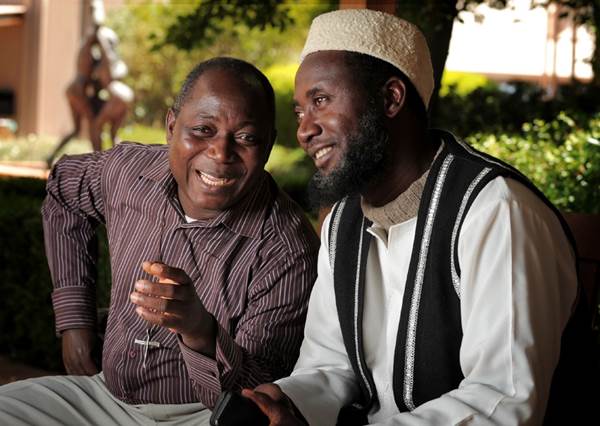
Westminster UNA members and guests were fortunate to hear Pastor Dr James Wuye and Imam Dr Muhammad Ashafa, known worldwide as the Imam and the Pastor from the film of the same name, speak about their continuing efforts to strengthen inter-faith relations. The meeting titled ‘The Road to Peace in Nigeria’ took place at the time of the International Day of Peace (21 September).
The two men had met in 1995, during a UNICEF outreach programme about child immunisation against polio, hesitantly putting aside their differences for the sake of the larger community. They realised that their voices, speaking together, could convince more people to protect their children against a common threat. Their agreement was cautious and guarded at first, gradually building over the years the respect and trust necessary to form a partnership.
Imam Ashafa described Nigeria’s unique challenges. Its peoples speak about five hundred languages, work within three legal codes and are divided about 50/50 between Christians and Muslims making it one of the world’s most religious nations. Challenges included the spoiling role of Boko Haram and others which has led to the deaths of 250 thousand people and the displacement of more than 4 million. The level of insecurity was exacerbated by kidnappings, banditry on the borders, and traditional rivalry between farmers and cattle breeders.
Pastor James added that deforestation leading to desertification had brought more challenges, introducing political issues which, if not tackled by Nigeria’s leadership, could further destabilise the community. In such a religious country, discontent was too often manifested by attacks on churches and mosques.
Together, he told his audience, they had set up the Interfaith Mediation Centre in 1995, still the only one. They work together to act as an example to their communities that peace is possible. They teach members of youth militias methods to resolve their conflicts peacefully rather than infinitely escalating violence and have even led successful efforts to rebuild the churches and mosques that had fallen during their conflict. The Centre has contributed to defusing tensions in the 2002 and 2004 clashes in Kaduna and Yelwa.
Over the years, they have tackled hate speech and set up pilot projects in six Nigerian states. Soon, a new law on hate speech will be introduced in Nigeria’s federal parliament. Other initiatives have followed, such as marking the UN Interfaith harmony week but more importantly, providing a much-needed platform for discourse. Soon, a new Interfaith Institute of Peace will be set up. In 2017, the Interfaith Mediation Centre, was among five recipients of the prestigious ‘Intercultural Innovation Award’, conferred by the United Nations Alliance of Civilizations and BMW held at the UN in New York.
Also, Imam Muhammad Ashafa and Pastor James Wuye have received the Breme Peace Award in 2005, the Prize for Conflict Prevention awarded by the Fondation Chirac in 2009[3] and the Deutsche Afrika-Preis awarded by the German Africa Foundation in 2013. Ashafa also received the Peacemaker in Action Award in 2000 from the Tanenbaum Center for Interreligious Understanding.
Dr Alan Channer, Director & Producer of ‘The Imam and the Pastor’ and Co-Director of the ‘Summer Academy on Land, Security and Climate’, Geneva, referred to a 2007 report on the state of tension in Nigeria and the danger of this becoming weaponised.
Dr Musa Aliyu, lecturer in Journalism and Media, Coventry University and author, researcher and commentator on Boko Haram, spoke about the importance of working closely with traditional rulers and asked how the diaspora might help.
He recalled how Pastor Wuye and Imam Ashafa had responded to a similar question in New York, 'How can we, the audience, join you in making a difference?’ They had replied: 'Share with everyone that tackling farmer-pastoralist conflict will restore the social fabric of the Sahel region, while healing the land will restore the environmental fabric. Support inter-dependence, celebrate the gifts of diversity and collaborate to care for the planet wherever you are - and we will make a difference to our world.' Perhaps a meeting of experts could be convened to develop a framework of action, he suggested.
Amina Dikedi-Ajakaiye, President, Creators of Peace on Geneva, raised three issues; gender, for which she praised the work and support of Initiatives for Change, the prevalence of corruption which has resulted in shortfalls in funding for schools, hospitals and roads, and the need for the diaspora to become more involved.
David Wardrop, chair of Westminster UNA, remarked on what had been such an illuminating meeting and assured Dr Wuye and Imam Ashafa of continuing support. He thanked Initiatives of Change for arranging their visit to the UK which included an appearance at the previous Saturday’s event at the Shakespeare Globe theatre marking the 20th anniversary of the founding of Peace One Day.
The meeting was chaired by Dr Philip Murphy, Director of the Institute of Commonwealth Studies at London University, joint organiser of the meeting.
For an excellent interview with Dr Wuye and Imam Ashafa, see here.
Westminster UNA is shocked to learn that the government has no plans to nominate a candidate for one of the 172 seats on the ten Human Rights treaty bodies due for election from 2020.
David Wardrop, Chair, Westminster UNA observed “That means that, upon the expiry of the mandate of Professor Sir Malcom Evans, Chair of the UN Subcommittee on Prevention of Torture, and who delivered our annual International Law lecture in 2013, there will be no one from the UK represented on any of the UN treaty bodies. We agree with other UK NGOs engaged in human rights issues that this is very bad for the image of the UK and makes it appear it is not interested in Treaty-based UN human rights protection.”
Westminster UNA shares the concerns of observers who fear the UK is now on the cusp of disengagement with the legal end of UN human rights protection for the first time in more than forty years. These had raised with Jeremy Hunt, then Foreign Secretary, and with Lord Ahmad, Foreign Office Minister responsible for United Nations and human rights, but to no avail. Westminster UNA has written to the Foreign Secretary setting out its deep concerns. For more background, see Guide to the UN Human Rights treaty bodies
Westminster UNA welcomes the appointment of Rehman Chishti MP as the government's Special Envoy for Freedom of Religion or Belief. He follows foreign office minister Lord Ahmad of Wimbledon in this role. Mr Chishti led one of the campaigns to give Asia Bibi asylum in the UK and in November 2018 authored a letter signed by 125 parliamentarians from across the house calling on the Government to offer her asylum. He resigned his position as a Vice Chairman of the Conservative Party, citing partly the failure of the Government to respond positively.
“Westminster UNA also worked hard to secure asylum for Asia Bibi and her family (News items 7 November 2018, 8 May 2019) and we were delighted when Canada announced its willingness to give her and her family a new home,” said David Wardrop, Chair Westminster UNA “We look forward to working closely with the new envoy.”
Westminster UNA has welcomed the UN General Assembly’s decision to mark 22 August as the UN International Day Commemorating the Victims of Acts of Violence Based on Religion or Belief. The resolution’s core supporters were Poland, Brazil, Canada, Egypt, Iraq, Jordan, Nigeria, Pakistan and the USA, most of which contributed to the debate.
At the same time, the UN announced that it will now introduce two new initiatives, a first-of-its-kind UN Strategy and Plan of Action on Hate Speech and a Plan of Action to safeguard religious sites. The latter initiative has been urged by Westminster UNA since 2013 when Shia shrines in Damascus were being systematically destroyed by rival Islamic groups (UNA Westminster news item 27/09/13).
“We welcome these initiatives and won’t sit on our hands when this International Day is marked in 2020, the UN’s 75th anniversary year” said David Wardrop, Westminster UNA Chair “We will organise an event and invite the embassies of the General Assembly resolution’s core supporter nations to join us”.
Westminster UNA has announced its programme for the balance of 2019. This will comprise two public meetings and the 14th We The Peoples Film Festival. There might be further events.
On 23 September, Peace Prize laureates Pastor Dr James Wuye and Imam Dr Muhammad Ashafa who have gained worldwide fame for their joint work for reconciliation in Nigeria will be inviting their audience to mark the UN International Day of Peace and share ideas on how to bring peace to northern Nigeria and the West African Sahel region. This will be their only UK engagement other than marking the 20th anniversary of the creation of Peace One Day. See Future events for registration.
On 28 November, we will mark the centenary of the founding of the League of Nations. In a meeting titled A Century of International Civil Service: the legacies of Eric Drummond, Professor Patricia Clavin, Professor of International History, Jesus College, University of Oxford will speak on 'Britain and the Century of the International Civil Servant: the Legacy of Sir Eric Drummond'. Eric Drummond, the League’s first Secretary-General (1919-1933), created ‘an international secretariat, lifted above all national contexts’. The response will be given by David Macfadyen, lead author of 'Eric Drummond and his Legacies'. The event is co-organised with the British Association of Former United Nations Civil Servants and will be chaired by the Rt. Hon. Lord Malloch-Brown, former United Nations Deputy Secretary-General. See Future events for registration.
The 14th We The Peoples Film Festival will be held in late November and screen films selected from more than three thousand submissions received from one hundred and thirty countries. The dedicated website will list venues and chosen films.
Harry Wright, Chair, shared his delight that Julie Luanco, Alan Quinn-Byrne and Ayessha Ghulati have agreed to join the Young Professionals Executive Committee. Julie works in communications; Alan is concerned with health law matters; and Ayessha currently masters in international relations. Working groups will be set up to tackle key issues, to be yet announced, using social media systems which will enable access to all who wish to contribute. “We’re the United Nations, after all!” said Harry Wright.
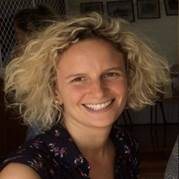
Julie Luanco
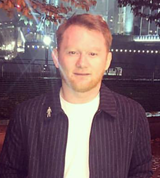
Alan Quinn-Byrne
Westminster UNA’s inauguration of the *‘Mandela Mile’ on 18 July 2018, the centenary of the birth of Nelson Mandela which encouraged many to walk from Parliament Square to the South Bank Centre as if in the company of the great Madiba himself, has now been adopted worldwide. A coordinating group, including Westminster UNA, led by Shanthi Annan, daughter-in-law of the late Kofi Annan, former UN Secretary-General, succeeded in promoting the 2019 ‘Mandela Mile’ initiative worldwide. Social media reports support form tens of thousands and Mandela Miles were walked in Accra, Bali, Beijing, Caux, Dakar, Lagos, Luton, New York, Oslo, Popayan, Rio de Janeiro, Sao Paulo, Soweto and in Virginia, USA. A live link-up between cities generated great international interest. The London walk starting in Parliament Square was launched by Shanthi Annan and Geoff Thompson, former world heavyweight karate champion and now Chair of Governors, University of East London and an early supporter of the Mandela Day programme.
Westminster UN Young Professionals helped organise the Mandela Mile march which concluded at the South Bank Centre and a welcome social gathering in the Underbelly festival gardens.
Held at The Feathers public house, opposite St James’s Park station, Westminster UNA Young Professionals chair Harry Wright invited fellow YPs and those new to the United Nations Association to discuss international issues they considered important. This invitation brought together thirty young people, British and from many countries who are currently working or studying in the London area. This event led to a follow up meeting at the Royal Festival Hall on 24 July which covered many topics including climate change, air pollution, security in the Middle East, stopping the Saudi war in Yemen, Iran-UK relationships and education. The primacy in delivering the UN Sustainable Development Goals (SDG) was agreed and those present felt confident that, working together, they could agree a Westminster UN Young Professionals platform of proposals representing ‘The World We Want’, the established tag line of the SDGs.
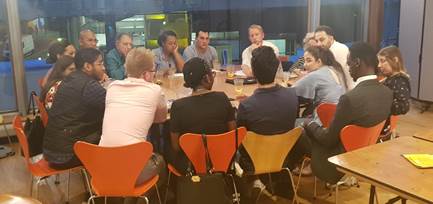
Westminster Young Professionals discuss strategy at Royal Festival Hall meeting
To mark 2019, the UN International Year of Indigenous Languages, Westminster UNA, together with the Foundation for EndangeredLanguages (FEL) and Survival International, organised this conference, enabling those working in this interesting aspect of the UN’s work to show how their projects are working to assist indigenous peoples worldwide. To assist the large audience recognise both the diversity and enormity of the programme, the conference opened by screening short films from the UN in Action series depicting challenges facing indigenous peoples in several countries worldwide.
Professor Stephen Hopgood, Pro-Director (International), SOAS, welcomed all to the university, noting its long-standing education record in the subject. Salem Mezhoud, member of both Westminster UNA and FEL, chronicled the UN's development of support for indigenous peoples, from the many exploratory initiatives, to the setting up of the Permanent Forum on Indigenous Issues which completed its 18th session in May this year and also in 2007, the acclamation by the UN General Assembly of the Declaration on the Rights of Indigenous Peoples. In introducing the work of FEL, Chris Moseley introduced UNESCO’s Programme of Mapping and Recording Indigenous Languages and also the Atlas of the World’s Languages in Danger.
Nicholas Ostler, FEL’s founder, explained the reasoning for the its creation and pointed to the many grants it has made over the years. Kristen Tcherneshoff, Wikitongues, showed how volunteers are working to collect video oral histories in every language in the world. To date, nearly 1,000 videos in over 400 languages have been recorded and, in coordination with libraries and archival institutions, these are being preserved, ensuring long-term public access to every language in the world.
Dr Jo Woodman, senior researcher and advocacy officer at Survival International, introduced its newly-launched campaign against ‘Factory Schools’, residential schools which aim to ‘reprogramme’ tribal and indigenous children to fit the customs and mores of the dominant culture. She showed how Survival International’s campaign had successfully helped the Dongria Kondh tribe in India to stop a US$1billion mine on their sacred Niyamgiri Hills and how it had researched the impacts of forced development and colonial-style conservation on tribal peoples worldwide. Charlotte Hemmings, University of Oxford, introduced “The Language Landscape Project: A Case Study of Promoting Indigenous Languages in Borneo”, a remarkable public access mapping exercise enabling all to hear indigenous voices from round the world.
To learn more about the United Nations Systemwide Action Plan which sets out to achieve the ends of its Declaration on the Rights of Indigenous Peoples and which UN agencies and programmes are participating in this, see here.
Westminster UNA has set up a working group to advise it on how it might agree a programme of activity addressing this important issue. The working group, chaired by Westminster UNA Vice-Chair Paul Mrazek, noted the efforts of many organisations, including Westminster UNA, in seeking the release of Asia Bibi (News item, 8 May). However, Katherine Thane, Senior Researcher & Policy Advisor to the UN Special Rapporteur on Freedom of Religion or Belief, observed that the strong rhetoric used by some Christian groups on the case had been counterproductive. Agreeing that campaigning for freedom of religion or belief needs to be applied to all faiths to reach traction in UN, efforts to focus only on the plight of Christians as shown, for example, by the Interim Report of the Bishop of Truro, commissioned by the UK Foreign Secretary, could be seen to weaken efforts for a holistic, comprehensive and inclusive approach.
Discussion turned to how the issue had already become too politicised, and yet the right to criticise other religions should be protected by International law. Further, atheists and linguistic minorities were also the victims of persecution.
There was consensus that the group’s continuing work should best concentrate on the “big picture” looking at the underlying causes of religious persecution and limitations on religious expression which so often accompanied poor national education policies. Efforts should be made to influence and gain the support of the next generation of leaders and build coalitions and alliances between different faith groups.
The group concluded that Westminster UNA’s ongoing work should address violations of freedom of religion or belief; it should identify potential allies with whom to work; and it should use its identify as an independent NGO to speak out on topical issues both in the UK and internationally.
The annual ceremony held at the Cenotaph in Whitehall featured for the first time a contingent of current UK military personnel. These were members of the Defence Medical Services, recently serving in the UN Field Hospital in South Sudan, and a platoon of the 1st Battalion, the Scots Guards, returned from serving with UNFICYP in Cyprus.
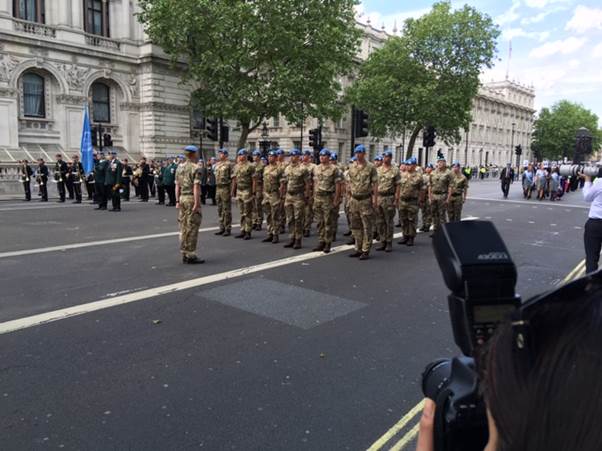
Participants arrive for the ceremony, about to pass the Scots Guards and Medical Services Staff: Photo Rodney Mantle
Official wreath-layers were led by the Rt. Hon. Mark Lancaster MP, Minister of State in the Ministry of Defence and Assistant Commissioner of Police Martin Hewitt, Chairman of the National Police Chiefs’ Council. Count Edward Bernadotte laid the wreath in memory of his grandfather, Count Folke Bernadotte, the UN’s mediator in Palestine, assassinated in 1948 and Lt-Colonel Gregoire de la Bernardie, French embassy, laid the wreath in memory of Commandant René de Labarrière, the first UN peacekeeper to lose his life. Diplomats from 108 embassies and high commissions laid wreaths as did those representing former UN military and civilian UN peacekeepers, the War Widows Association, the British Association of Former UN Civil Servants, the United Nations Association of the UK (UNA-UK), the Royal United Services Institute (RUSI), and students representing the ‘Children of the World’.
The Colour Guard was provided by members of the UN Veterans Association, retired UN peacekeepers who have served in the Irish and British armed forces. The Band of the Parachute Regiment provided musical support. In all, more than 250 participants marked the anniversary before large crowds.
The ceremony accompanied a conference held at RUSI, co-organised by UNA-UK, RUSI and Westminster UNA. The keynote speech was given by Ambassador Ellen Margrethe Løj, formerly Special Representative of the Secretary General and head of UN Peacekeeping missions in Liberia and South Sudan. More information on the conference can be reached here. See here for an excellent compendium tweet on events worldwide.
Since November, Westminster UNA has been active in seeking the release of Asia Bibi (see News Item, 7 November) and been trusted by the family to keep secret details of their movements. The announcement on 8 May of Asia Bibi’s arrival in Canada enables us to recount our small part in her release.
On 5 November, the Executive Committee requested Chairman David Wardrop to write to Mark Field, Minister of State for Asia and the Pacific noting that he had failed to illustrate that sense of commitment to grant asylum to Asia Bibi and her immediate family as sought in the question tabled by Tom Brake MP. This had requested the government to grant Ms Bibi asylum following her acquittal of the charge of blasphemy. David Wardrop’s letter was passed to the UK Visas and Immigration Department for reply but none came. A letter addressed to the Pakistan High Commission also went unanswered.
Later, at the request of close friends of Asia Bibi’s family, we wrote to Justin Trudeau, Prime Minister of Canada, seeking his support for Asia Bibi. His office responded, forwarding the request to Ahmed Hussen, Minister of Immigration, Refugees and Citizenship.
On 19 December, we learned in confidence that Asia's children and family member Joseph's family had reached Canada although it was well known that Asia and her husband remained in Pakistan. That extended stay has been a matter of public record and the good news of their safe arrival in Canada ends a story that shocked the world.
Westminster UNA intends to pursue the wider issue, focussing on the persecution of ethnic, religious and linguistic minorities and the need for the UN to renew its efforts to protect them. The meeting “It’s my language, it’s my life!” marking 2019 UN International Year of Indigenous Languages to be held on 19 June will be a first step in that process.
Held in the House of Lords in association with the Institute of Commonwealth Studies, the meeting featured excellent speakers and attracted a good audience. In his introduction, Lord Judd praised David Cameron’s leadership as a co-chair of the UN Secretary-General's High-Level Panel on the Post-2015 Development Agenda which led to the Sustainable Development Goals programme. However, two and a half years later, Lord Judd stated, there is widespread concern that the UK government still cannot demonstrate it has either the necessary vision or grasp to develop a coherent National Strategy to deliver on these Goals. Two parliamentary committees have published critical reports, fearing it lacks a viable strategy. This is worrying as next month, the UK will host the Commonwealth Summit when all member states will review progress on the SDGs. The UN’s own website which tracks progress worldwide shows the UK not just behind the curve but gone missing!
Lord McConnell, Co-Chair, APPG, Global Goals for Sustainable Development summarised the reasons why the government should revise its approach to the SDGs as these relate to domestic issues as much as they do in developing countries. The tagline ‘Leave No-one behind’ explains all, he stated. Steve Kenzie, Executive Director, UK Network for the UN Global Compact explained why the network’s 150 members, including major commercial organisations, are committed to realising the SDGs. In that they have signed up to the Global Compact’s universal principles on human rights, labour, the environment and combatting corruption, the SDGs should be seen as a natural extension of these. And yet, he confessed, the Network’s series of Roadshows held round the country in 2017 reflected Euromonitor surveys that indicate awareness on the SDGs is lowest in the UK of all European countries. Farooq Ullah, Director, Stakeholder Forum for a sustainable future, showed how, in the vacuum created by lack of government leadership, the UK Stakeholders for Sustainable Development, a consortium of concerned NGOs, had been formed and which has set about creating a national strategy.
Dr Amina Osman, Education Adviser for the Commonwealth Secretariat, demonstrated how the Commonwealth is tackling SDG4 (Quality Education) and sharing its expertise with member states. Dr Carl Wright, Former Secretary-General, Commonwealth Local Government Forum and a UNA-UK Trustee pointed to the opportunity for a bottom-up approach, energising local authorities, towns and communities to endorse the SDGs. He spoke about the ongoing initiative of UNA Canterbury to engage its council as this might provide a template. In this way, we might generate better awareness of the SDGs and realisation that they refer also to developed countries like ours.
Lord Judd then invited questions and comments for the audience and there followed further exchanges of valuable information. In summing up, David Wardrop likened the challenges to those faced following the Rio Summit (UNCED) in 1992 which led to the setting up worldwide of Local Agenda 21 networks. Similarly in 1992, the International Year of the Oceans, with failure of government to promote the programme widely, UNA led in encouraging littoral local authorities to endorse The Ocean Charter. It was agreed that the UNA London & South East Regional Council (LASER) should take this idea forward, following closely UNA Canterbury’s engagement with its City Council.
Westminster UNA regrets to announce that Professor Michael Schmitt, Professor of Public International Law at the Exeter Law School who was due to deliver his address titled “In Search of the International Law of Cyberspace: A Travelogue” was taken ill shortly before the scheduled date. We are delighted he is now recovering and we wish him well. Unfortunately, Professor Schmitt will spend the rest of the calendar year in the United States so regretfully, the lecture has been cancelled.
Now in its 17th year, the conference to mark the International Day of UN Peacekeepers will be held on Thursday23 May at the Royal United Services Institute and titled The Thin Blue line.
Ellen Løj, keynote speaker, served as the Special Representative of the Secretary General and head of the United Nations Peacekeeping Mission in Liberia (UNMIL) from 2008-2012 and in a similar post in South Sudan (UNMISS) from 2014-2016. Prior to joining the UN, she served as Denmark’s Permanent Representative to the UN in New York (2001-2007).
The conference will focus on challenges and opportunities that face contemporary UN peacekeeping as the Secretary General’s Action For Peacekeeping agenda is endorsed by a growing number of member states at the same time as missions in Mali, Central African Republic, South Sudan and the DRC become ever more challenging. It will have a broad agenda with sessions considering the relationship between the UN, the mission and parties to a conflict as well as on the role of policing in peacekeeping.
The event is open to the public and registration can be made here.
The annual conference and accompanying wreath-laying ceremony at the Cenotaph in Whitehall was originally conceived and organised by Westminster UNA and is now co-organised with UNA-UK and the Royal United Services Institute.
Westminster UNA Young Professionals have continued their ‘Meet the Ambassador’ series, hosting HE Amar Abba, Ambassador of Algeria and Dean of the African Union Heads of Mission in the UK. Prior coming to London, Mr Abba served in Luanda, Brasilia and Geneva. His ambassadorial postings have been in Tanzania, Greece and the Russian Federation.
In opening the meeting, Harry Wright, Chair of Westminster UNA Young Professionals, thanked Ashfords LLC for their hospitality in hosting the meetings series. He then introduced the ambassador, noting that Anglo-Algerian relations go back four hundred years and recommending the famous Algerian Coffee Stores in Soho has been operating since 1887.
Mr Abba titled his address Algeria and Multilateralism and gave his audience an overview of major events in Algeria’s development since its battle for independence led by the Algerian National Liberation Front and won in 1962. From then on, Algeria has played an important role in the development of the Non-Aligned Movement, hosting important conferences during the 60s and 70s. He referred also to Algeria’s success in conflict resolution and peacebuilding, noting contributions in these fields by Lakhdar Brahimi and the late Mohamed Sahnoun. Following his address, Mr Abba answered a number of questions covering Algeria’s role in the African Union, its relations with Europe and democratic routes to presidential succession. Following the meeting, the Westminster Young Professionals hosted a networking meeting in the nearby ‘Draft House’.
HE Amar Abba, Ambassador of Algeria with Harry Wright, and Isabella Qin, Deputy Chair
The Westminster United Nations Association (UNA) which hosts HammarskjöldInquiry.info shared its dismay over articles published in The Guardian and The Observer which sought to cover the launch of the film Cold Case Hammarskjöld.
In his letter to these newspapers, David Wardrop, Chairman of Westminster UNA referred to the following articles
“RAF veteran ‘admitted 1961 killing of UN secretary general’” The Guardian, 12 January
“Coups and murder: the sinister world of apartheid’s secret mercenaries” The Observer, 20 January
he drew attention to reporting bylines granted in both newspapers to Andreas Rocksén and Mads Brügger, respectively the producer and director of the film Cold Case Hammarskjöld, suggesting to readers that both were qualified reporting staff. Clearly this was not the case.
Mr Wardrop identified five breaches in the journals’ joint editorial code of conduct relating to attribution, verification, conflicts of interest, and declaration of interest.
Replying for both newspapers, Paul Chadwick, Readers' editor, stated “I have considered the articles in light of the editorial standard on disclosure of interests and I agree that the connection of two of the bylined authors of the articles to the film referred to in the articles ought to be made clear to readers. A footnote to ensure it has now been added to the articles online.”
A third article on the subject acceded to Mr Chadwick’s instruction.
“We are pleased these newspapers agree with us on this point and they have clarified the position of these two film makers who we believe successfully led their readers to assume the authenticity of the reporting” said Mr Wardrop. “However, the online post-publication amendments to the first two articles and similar treatment with the third don’t move far enough for us. Readers should confidently assume that those granted bylines do not have financial interest in the matter covered by any article”.
David Wardrop, chairman, Westminster United Nations Association, has challenged the New York Times on its coverage of one of the claims made by the makers of the film Cold Case Hammarskjöld. The newspaper’s article “Quest to Solve Assassination Mystery Revives an AIDS Conspiracy Theory” (27 January) examined the decades old story about the activities of SAIMR (South African Institute for Maritime Affairs), an independent initiative of the Apartheid-era, revived by the film Cold Case Hammarskjöld. The New York Times betrayed well-founded scepticism on the film’s claims but Mr Wardrop urged that its reporters would be better deployed asking questions of the current government in Pretoria.
In his letter to the newspaper, he stated “As late as 2018, the UN Secretary-General and the late Kofi Annan both sought South African cooperation in the UN’s continuing and wide-ranging inquiry into the causes of the crash but it has refused. At the time it seeks permanent membership of the UN Security Council, this stance is mystifying and inexcusable. Rather than chase distant discredited diversions, your reporters should seek answers from South Africa’s ambassador to the United Nations, a few blocks away from your offices.”
Mads Brügger, Director of Cold Case Hammarskjöld has won the Directing Award: World Cinema Documentary at the 2019 Sundance Film Festival.
The conference, “The All African People’s Conference: Accra 1958 Its Impact Then and Now”
took place in the University of London, attracting speakers and audience members from several countries. It was organised by Westminster UNA, together with the Institute of Commonwealth Studies at the University of London.
The conference keynote speech titled ‘Pan-Africanism and Relations Today between Africa and the Commonwealth’ was delivered by former Commonwealth Secretary-General H.E. Chief Emeka Anyaoku. Throughout the day, speakers referred to events during the conference described by one delegate as ‘A moment at once defining and awe-inspiring’.
Speakers included two who had attended the 1958 conference, Cameron Duodu, a journalist from Ghana and Professor Bereket Habte Selassie, a delegate from Ethiopia. Also, the conference screened a pre-recorded message from Dr Kenneth Kaunda, former President of Zambia, who also attended. The closing session, a round table chaired by the Rt. Hon. the Lord Boateng, reflected on how the 1958 conference had helped determine Africa’s course over the following sixty years. A schedule of principal attendees at the 1958 conference is here.
David Wardrop, Chair of Westminster UNA, shared the view of many, stating “It was a privilege to meet and hear those who were there in Accra in 1958, and to learn about those others who had played such a major part in the development of the continent.” A film of the conference will be accessible through the website of the School of Advanced Study at the University of London.
Conference attendees learned about the major three day conference marking the original event, taking place at the University of Ghana in Accra and that the organisers of both conferences had cooperated closely to mark this important anniversary.
For longer report of conference, see blog in Review of African Political Economy, click here
For commentary on event by attendee Mpumelelo Tshabalala, click here
For report on conference held in Accra, Ghana, to mark the anniversary, click here
Westminster UNA was shocked to learn from the UN’s latest report (3 December) on its continuing inquiry into the cause of the plane crash in which former Secretary-General Dag Hammarskjöld died along with others, which shows the United Kingdom to have been uncooperative and discourteous to current Secretary-General Guterres.
Westminster UNA recalls that Judge Othman, who leads the inquiry, stated in his report (September 2017), that ‘the burden of proof has now shifted to Member States to show that they have conducted a full review of records and archives in their custody or possession, including those that remain classified, for potentially relevant information.’ This followed reluctance by some countries, including the UK, to release documents which he believed could assist him. This year, he again requested cooperation from nine countries including the UK which delayed its response until after closing date of his interim report and in its reply, it stated its refusal to cooperate. David Wardrop, Chair, Westminster UNA, observed “At a time when the UK seeks to impress on all its ‘good UN member’ credentials, its stance here is puzzling and only attracts further speculation on what it might be hiding. Our government should instruct its ambassador at the UN to confirm immediately that, like the other states so requested, it will now cooperate.”
The interim Report of the Judge Othman, the Eminent Person leading the UN inquiry can be read here.
The 13th We The Peoples Film Festival ended on 24 November. Forty films were screened over eleven evening, selected from about four thousand submitted from 130 countries. The We The Peoples Film Festival, a project of Westminster United Nations Association, is one of the very few film festivals worldwide which searches for films which address issues such as security, human rights, development and the environment.
To mark the seventieth anniversary of the Universal Declaration of Human Rights, the festival screened the documentary The Uncondemned which followed the first ever successful prosecution of rape as a war crime which took place at the International Criminal Tribunal for Rwanda in 1998. This flagship event was kindly hosted by Clifford Chance LLP in Canary Wharf. Other venues were the Rio Cinema, Dalston; the Cinema Museum; SOAS, Hackney Attic, Miranda at the ACE Hotel, Shoreditch; and South Bank University.
The Young Film Makers Day held at the BFI Southbank attracted a record attendance. The #TweetaPitch competition attracted forty entrants with ten making their two minute pitch to the panel of judges. The winning pitch was made by film maker Giulia Gandini who plans to make a four minute film addressing homelessness and the digital world. The proposal can be viewed here. The 2017 #TweetaPitch winner, Pascale Kann, screened her film Day by Day which tells the story of Layla, a chalk artist, who is surprised by her period and without tampons, pads or any other supplies, attempts to make it through the day. For full reports on the 2018 We The Peoples Film Festival, visit the festival’s website here.
The Festival judges chose the following films for awards.
Best Film in Festival
Syria’s disappeared: the case against Assad
(Director: Sara Afshar)
Best Film: Human Rights
As Human As I Am
(Director: Alice McDowell)
Best Film: Human Security
The Truth: Lost at Sea
(Director: Rifat Audeh)
Best Film: Human Development
Are you Volleyball?
(Director: Mohammad Bakhshi)
Best Film: Environment
The Prophecy – A Warning of Climate Change in Alaska
(Director: Dmitry Trakovsky)
Best Short Film (chosen by the audience at the BFI Young Film Makers Day)
Strive (Director: Charlie Watts)
The Executive Committee of the Westminster United Nations Association has released the following statement on the case of Asia Bibi, a Pakistani woman who upon acquittal of all charges by Pakistan’s Supreme Court now fears for the life of her immediate family and herself and seeks asylum in the UK.
Westminster United Nations Association,
While noting that Prime Minister Imran Khan’s ‘Naya Pakistan’ formula, outlined upon his taking office, made no mention of religious minorities, marginalised communities, attacks on women and religious intolerance,
Congratulated him on his promise to resolve outstanding court cases within a year, and thus
Welcomed the decision of Pakistan’s Supreme Court to acquit Asia Bibi, ending her eight years in remand awaiting review of her case and,
Reminds the Pakistan government that seventy years ago, it was a founder signatory to the Universal Declaration of Human Rights (UDHR) and in 2010 it ratified the International Covenant for Civil and Political Rights (ICCPR) which in Article 18 protects the ‘right to freedom of thought, conscience and religion’ and in Article 27 seeks to ensure that as ‘ethnic, religious or linguistic minorities exist, persons belonging to such minorities shall not be denied the right, in community with the other members of their group, to enjoy their own culture, to profess and practise their own religion, or to use their own language. ‘
Regrets that it has not repealed its draconian blasphemy laws which are at odds with the principles enshrined in the UDHR and the ICCPR and which only serve to encourage religious extremists now seeking to overturn the due process of its Supreme Court,
Urges it to work to repeal these laws, and
Requests it to facilitate the release and safe passage of Asia Bibi and her immediate family to a country prepared to offer them asylum, and
Calls upon
1] The UK government to grant asylum immediately to Asia Bibi and her immediate family,
2] UNA-UK to press the UK Government to make the strongest possible representations to the Pakistan Government,
3] The World Federation of United Nations Associations (WFUNA) to raise the issue with the Office of the High Commissioner for Human Rights, and to bring the matter to the attention of the UN Human Rights Council at the earliest opportunity.
This statement has been forwarded to the Rt. Hon. Mark Field MP, Minister of State for Asia and the Pacific at the Foreign & Commonwealth Office. It refers to the reply he gave to this question from Tom Brake MP,
Tom Brake MP: “To ask the Secretary of State for Foreign and Commonwealth
Affairs, what discussions he has had with Cabinet colleagues on the granting of
asylum to Asia Bibi following her acquittal of the charge of blasphemy.”
Mark Field MP: “Asia Bibi’s acquittal will be very welcome news to her family and
those who have campaigned in Pakistan and around the world for her release. We
are closely monitoring the situation and developments. The UK’s position on the
death penalty in all circumstances and in all countries is well-known, we call for its
abolition globally.”
This conference will mark the 60th anniversary of the All African People's Conference held in Accra, Ghana. Driven by Dr Kwame Nkrumah, Prime Minister of newly-independent Ghana, it set out to advance the ideology of Pan Africanism through non-alignment, anti-colonialism, anti-imperialism and African unity. It has been hailed as a watershed moment in the history of Africa’s liberation from colonial rule and white supremacy. Our speakers, some of whom participated in 1958, will examine the role of the AAPC within the framework of the Pan-African movement and will assess its significance and impact. Organised by the Institute of Commonwealth Studies and UNA Westminster.
The Senate Room, Senate House, Malet Street, London WC1E 7HU
For further information and to book your ticket, click here.
UNA Westminster has completed its week-long Study Tour to The Hague, Brussels, Strasbourg and Paris, all hosting important international institutions. The 14 strong party first visited The Hague, meeting Jeroen Vervliet, Director of the Peace Palace Library who chronicled the life and importance of Hugo Grotius, ‘father of international law’. Later, he showed the party the library’s unrivalled archive of books collected by Grotius himself. The party visited to courtroom of the International Court of Justice, learning about its work and association with the Peace Palace, financed initially by Scottish-American philanthropist Andrew Carnegie. Later, the party attended the opening session of the inaugural Carnegie Peace-Building Conversations, a three day symposium.
In Brussels, the party visited the headquarters of the European Commission (photo), learning about its role as the EU’s political executive and the working relationships between it, the Council and the Parliament. Presentations were also made on the EU’s international humanitarian work through ECHO [1] and also its External Relations policy [2]. Later, they met Guy Milton, Head of Media Relations for the European Council, who discussed the outcome of the recently completed Informal Summit of Heads of Government in Salzburg.
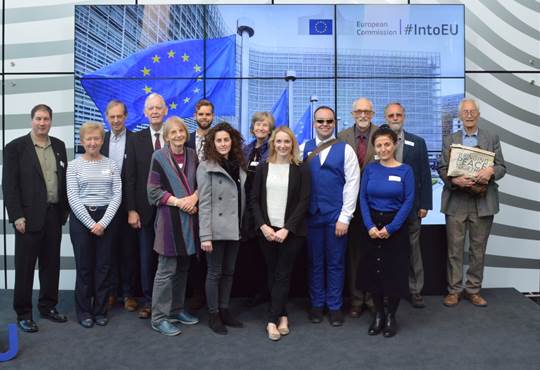
In Strasbourg, the party’s visit coincided with an important hearing before the seventeen judges of the Grand Chamber of the European Court of Human Rights. The case, titled N.D. and N.T. v. Spain, concerns the immediate return to Morocco of sub-Saharan migrants who attempted in 2014 to enter Spanish territory illegally by scaling the fences which surround the Melilla enclave on the North African coast. Later, the party revisited the Court, learning about its workings from a British lawyer working there. Also, they met Rob Linham, the UK’s Deputy Permanent Representative to the Council of Europe who outlined the delegation’s role at the Strasbourg-based institution. Later, they visited the impressive Parliamentarium Simone Veil where the 651 members of the European Parliament meet regularly.
In Paris, they visited the United Nations Educational, Scientific and Cultural Organisation (UNESCO), learning about its multi-faceted nature making it the most difficult UN agency to fully comprehend its important role in the UN system. Later, they visited the Pasteur Museum, housed in the Louis Pasteur’s own house, learning about his pioneering discoveries of the principles of vaccination, microbial fermentation and pasteurisation.
Members of the study tour took the opportunity to visit key attractions in all cities visited; briefly in Rotterdam, its canals; in The Hague, the Mauritshuis, Escher Palace and Binnenhof; in Strasbourg, the cathedral and its quaint streets and canals; and in Paris, its traditional favourites and newer ones like the Frank Gehry-designed Fondation Louis Vuitton, set in the Bois de Boulogne.
Presentations 1 and 2 can be forwarded to those interested.
In early September, the United Nations Association Westminster Young
Professionals Association shared their concerns for the fate of Nazanin Zaghari-Ratcliffe following her continued detention by Iranian officials in 2016. They expressed their grave concern at her current deteriorating situation. “Striving for uprightness is never easy, but history has shown that with sheer persistence and unimaginable determination, justice can be achieved. It is here again that we hope that the government can take action and Nazanin will soon be free” the Young Professionals wrote.
In reply, the Foreign & Commonwealth Office stated that “the treatment of all British-Iranians detained in Iran, including Mrs Zaghari-Ratcliffe, is a priority for the Government. One of the challenges we face is that Iran does not recognise dual nationality and therefore does not allow access to any of the British-Iranian detainees. However we are committed to ensuring that we do everything we can for each of the detainees, including continuing to push the Iranian authorities for access, not least so that we can be assured of their welfare.
It is important that we act in the way that we judge is the most likely to be in the best interests of each of our detainees in Iran, and this is paramount in our consideration of the strategy for each case. However, we can assure you that we raise all of our Iranian consular cases at every opportunity with the Iranian Government.”
In solidarity with Belgian colleagues, to mark Belgium’s Memorial Day, the UK UN Veterans Association which is closely linked with UNA Westminster, organised the laying of a wreath at the tomb of the Unknown Soldier at the Place de Congrès in Brussels. On their behalf, the wreath was laid by Albert Tibor, Secretary of the Belgian UN Veterans Association.
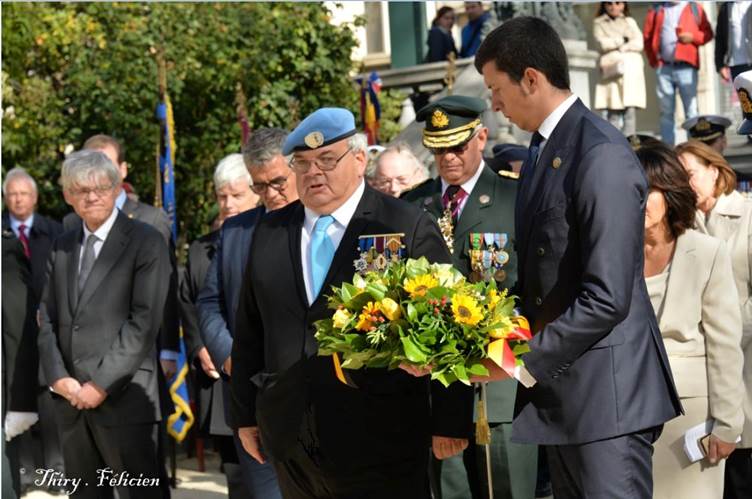
The ceremony marked the sacrifice of Belgian, German, American, Australian, British, Canadian, French, Indian, New Zealand and South African soldiers and civilians who died on Belgian soil in 1918 and also those from Belgium and the Congo who died killed in Africa in 1918. The ceremony took place in the presence of a representative of His Majesty, King Philippe of Belgium.
The UNA Westminster proposal to walk a mile to support the year-long campaign of The Elders was taken up with enthusiasm by hundreds of people on the day of the centenary of nelson Mandela’s birth. The principal route for the Mandela Mile runs from Nelson Mandela’s statue in Parliament Square through to Trafalgar Square and across Hungerford Bridge to his bust adjacent to the Royal Festival Hall, a mile to within a few yards.
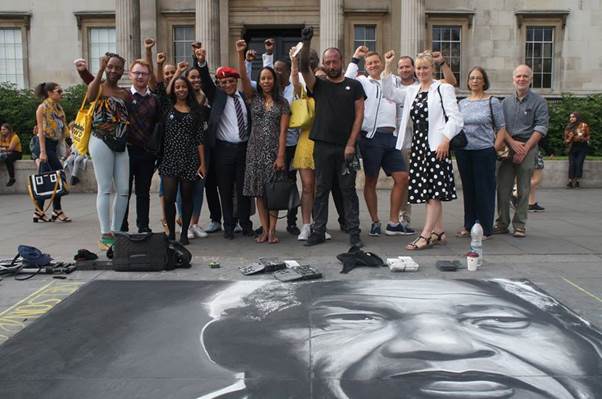
Mary Rice, Executive Director of the Environment Investigation Agency, addressed the meeting title “Poaching, Trafficking and Security: threats posed by the illegal wildlife trade”.
She reported on the Agency’s current successful campaigns to track poachers and traffickers, citing the recent arrests of the leaders of the largest ivory smuggling gang. Even so, the illegal wildlife trade is worth £17 billion and the fourth most valuable illicit crime after arms, drugs and human trafficking. Illegal ivory trade activity worldwide has more than doubled since 2007 and increases in rhino poaching in Africa reached 1,338 in 2015, the worst on record. As few as 3200 wild tigers remain across their Asian range, more than a 95% decline from just over 100 years ago and about 277,000 pangolins have been illegally traded since 2000, most in the last ten years. The lives of those working hard to protect endangered wildlife are also at risk; in the last year, over 100 rangers have died in the line of duty, many at the hands of poachers.

Ms Rice referred to preparations being made by the UK government which will host an international conference in London in 2018, bringing together global leaders to help eradicate the illegal wildlife trade and better protect the world’s most iconic species from the threat of extinction. She stated that this will follow up its conference in London in 2014 and two intermediate conferences in other countries over a period when international coordination had slipped badly. At the time of the meeting, Ms Rice was unsure which government department would lead at the conference, the FCO, DEFRA or DFID. “Clearly the government is showing signs of distraction but this must be clarified very soon.” she stated.
David Wardrop, Chair, UNA Westminster, reported the annual general meeting that all problems relating to the completion of financial accounts for the last three years had now been resolved and these were tabled together with a summary of the branch’s activities over the same period which can be read here. Copies of the three separate annual reports for 2015/6, 2016/7 and 2017/8 are posted under Event Reports. Mr Wardrop thanked Ms Perri Mahmood for completing the financial accounts without which the meeting would have been deferred. The meeting included elections for the coming year and the results are posted on the ‘who we are’ webpage.
Ian Martin, former Executive Director of the authoritative and independent online journal Security Council Report, delivered the Folke Bernadotte Memorial Lecture held at the Royal United Services Institute (RUSI). Mr Martin called on his wide field experience for the UN in Haiti, Rwanda, Bosnia & Herzegovina, Libya, Nepal and Timor-Leste and his membership of the UN’s High-Level Independent Panel on Peace Operations 2014-5 to deliver a focused, hard-hitting critique of the UN at work and the role which he believed the UK could better play. His address can be read here.
The accompanying wreath-laying ceremony at the Cenotaph attracted diplomats and military staff representing one hundred and ten countries. The Band of the Irish Guards provided musical support and prayers were delivered by the Reverend Canon Joseph Hawes and Imam Fadel Soliman, Director of the Bridges Foundation.
Full reports of the conference and ceremony are posted on the Home webpage, UN Peacekeepers day.
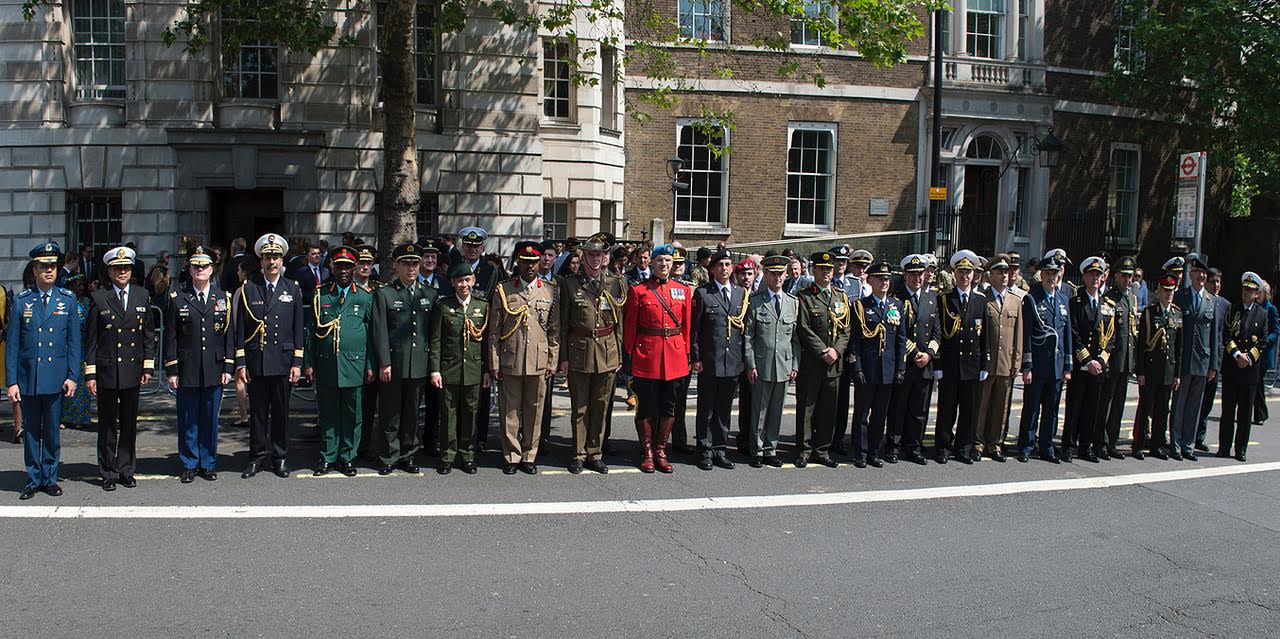
Military staff participating in wreath-laying ceremony
On 18 July, the centenary of the birth of Nelson Mandela, UNA Westminster will coordinate with other organisations, encouraging people worldwide to walk a mile in the causes Nelson Mandela espoused; peace, health, justice and equality.
In central London, UNA Westminster is encouraging all to walk from Nelson Mandela’s statue in Parliament Square, towards Trafalgar Square and across to his bust alongside the Royal Festival Hall. A reception desk will be located on Queen’s Walk, by the river, where people can obtain their ‘I Walked the Mandela Mile for Mandela 100’ badges. Visitors will be encouraged to view the free entry Mandela exhibition in the foyer of the Queen Elizabeth Hall.
A second Mandela Mile will take place in Docklands, starting at the Excel Centre, to be coordinated by the University of East London.
The project, put together in less than three weeks, involves The Elders, the Nelson Mandela Foundation, Kinship of Kush, the Queen’s Commonwealth Trust, the Youth Charter, the Youth Production Network, the University of East London and the Greater London Authority’s Community Engagement team.
The Mandela Mile website encourages people round the world to choose their own walks and share these on Facebook, Twitter and Instagram.
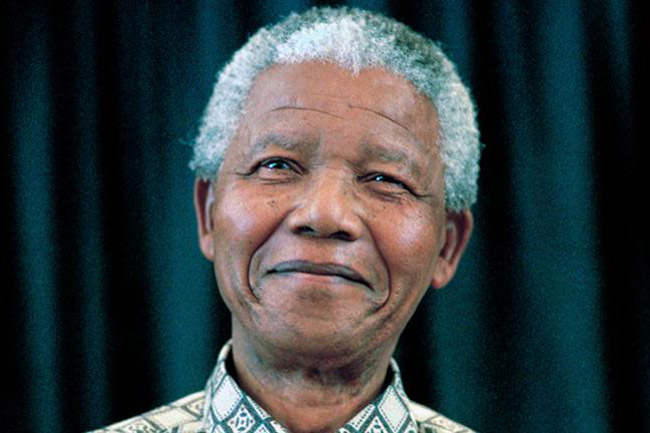
For the second ‘Meet the Ambassador’ meeting, Harry Wright, Chair, welcomed HE Mr Igor Pokaz, ambassador of Croatia, to address members of the Young Professionals and UNA Westminster.
In his wide-ranging address, Mr Pokaz, recently arrived from Moscow where he served as ambassador, spoke about his earlier service with his country’s mission to the United Nations in New York and serving with the UN in the field. He referred to Croatia’s recent history, leading to its successful applications for membership of the European Union and NATO. These alliances were important for a small country, he stated, referring also to that week's election results in Croatia's neighbour Slovenia where efforts to form a new government around an anti-immigration policy was being watched closely in Croatia. Also he spoke about news from Serbia where President Vucic had restated his opposition to NATO membership. Croatia’s President and Prime Minister were confident however of its chosen course, seeking new opportunities for trade with new partners. In passing, he surprised his audience with the news that the electric-powered Jaguar E Type which Prince Harry drove his new bride to the wedding party had been built in Croatia by Rimac, the leading developer of advanced electric traction systems which works with such companies as Aston Martin, Jaguar Land Rover, and Renault, as well as Siemens and Magna Steyr.
Following his address, Mr Pokaz invited questions which covered a range of topics. Following the meeting, Harry Wright thanked Mr Pokaz and his colleague Mr Domagoj Rogulj who was instrumental in setting up the event. Later, all repaired to the Draft House for a thirsty networking session. The next ‘Meet the Ambassador’ will be in September.
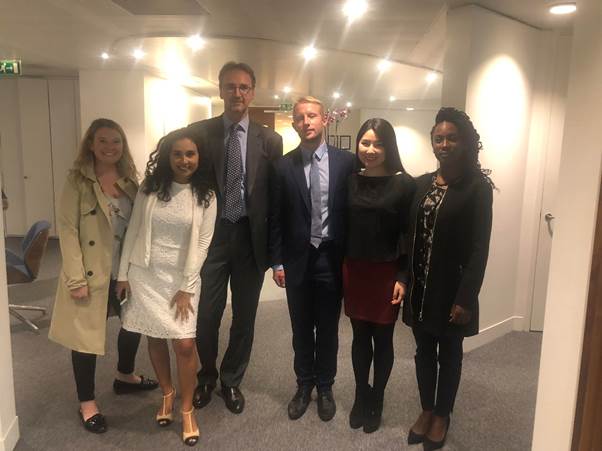
HE Igor Pokaz and the Young Professionals Committee
Young Professionals have now published the Report of their project, initiated jointly with Liberal International in September 2016, which set out to reignite the Responsibility to Protect debate in the United Kingdom. In the Report, they urge UN Member States, and especially the United Kingdom, to reassess their policies regarding R2P. In particular, they urge the British government to initiate parliamentary debate on how R2P can be best implanted into British foreign policy. Click here for the Report
Now in its 16th year, the well-attended conference focused on 'Politics, Partners and Protection’. The opening session “When there’s no peace to keep” reviewed what ‘robust peacekeeping’ really means in the context of the recent report by Brazilian General Cruz and the increasing hostility UN missions have faced, particularly in sub Saharan Africa.
The Folke Bernadotte memorial lecture was given by Ian Martin who led UN missions to Libya, East Timor and Nepal and also co-authored the UN’s High-Level Independent Panel on Peace Operations (HIPPO) report. In a hard-hitting address, he stated that the UK is the Security Council’s penholder for Yemen was now particularly inappropriate in view of its support for the Saudi-Arabian-led coalition, which has contributed to the Council’s lack of effective action in the face of the worst humanitarian crisis in the world. Noting that the UK is a major financial contributor, it must ensure good housekeeping but not follow the Trump administration’s non-strategic push for budget cuts. Also, the UK’s current troop contribution does not constitute the commitment that should be made by a permanent member with our military capability. Mr Martin’s address can be read here.
The afternoon session, now named the Margaret Anstee memorial seminar titled “Future peacekeeping” examined the search for capacity, how the gap between expectations and resourcing can be met, particularly in the context of budget cuts and changes to the UN’s peace and security architecture. The speakers, from the military, government, academic and not-for-profit communities wrestled in trying to square the circle.
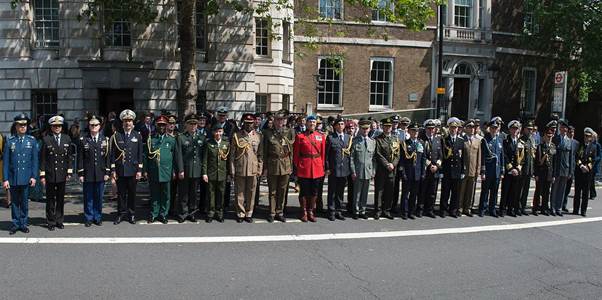
Defence attaches at Cenotaph ceremony
The traditional Cenotaph wreath-laying ceremony featured two government ministers, parliamentarians, the military and police along with diplomats from ninety seven countries, honouring those who lost their lives in the cause of peace. The public address system was managed by members of the Youth Production Network, all with disabilities and magnificently overcoming these. A complete report of the conference and ceremony will be posted on the home page (International Day of UN Peacekeepers)
UNA Westminster member Keith Hindell's new play Dead or Alive? examined abortion at a time when a woman's right to choose is still limited by law, although medical advances have made the procedure safer and easier than ever before. In the play, a pregnant woman ponders whether to abort the twin embryos she is carrying and discusses it directly with them. One of them wants the right to live, while the other respects her mother's decision. Her tentative intention to abort is forcefully challenged by a modern prince charming, the putative father. The situation is further complicated when two strange creatures emerge from "inner space". Ultimately, the woman must choose the fate of her unborn children.
The play ran for two weeks at the Theatro Technis, Campden Town, and was watched by many UNA Westminster members throughout its two week season.
David Wardrop, Chair, UNA Westminster, was invited by the Dag Hammarskjöld Foundation to hear UN Secretary-General Antonio Guterres deliver the annual Dag Hammarskjöld Lecture which it jointly hosts with the University of Uppsala.
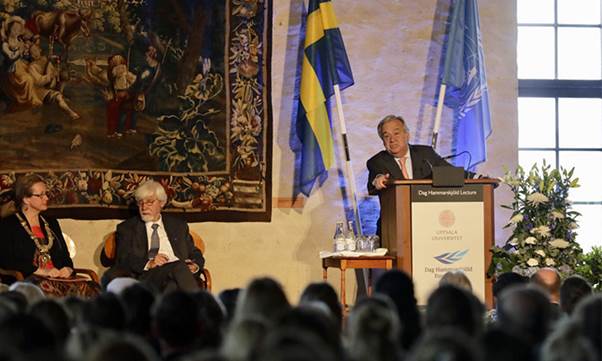
UN SG Antonio Guterres in Uppsala
UNA Westminster manages the Hammarskjöld Inquiry website which sets out to update all interested worldwide on the progress of the UN’s re-opened Inquiry into the causes of the crash of the plane carrying Hammarskjöld and fifteen others in 1961.
Following criticism of the UK’s lagging performance in promoting and implementing the UN’s Sustainable Development Goals initiative by Harry Wright, Chair of UNA Westminster Young Professionals (News Item 8 April), David Wardrop, Chair, UNA Westminster wrote to all members of the House of Commons Commission drawing attention to this published article. His letter is here and the reply received from the House of Commons Commission is here. “We look forward to seeing the Commission’s 2018 Annual Report duly acknowledging that the UN’s Sustainable Development Goals initiative must impact all UK institutions, even parliament itself.
Harry Wright, Chair of UNA Westminster Young Professionals, explains in his article The UN Sustainable Development Goals should not be Terra incognita to Westminster and Whitehall alike how the UK government is still failing to properly address the challenge of the UN Sustainable Development Goals. Also, he shows how our parliament has much to learn from those in Commonwealth partners soon to arrive in London for the Commonwealth Summit. The article can be read here.
Westminster Young Professionals have inaugurated their ‘Meet the Ambassador’ programme, intending to host ambassadors and high commissioners throughout the year, learning about their work and the political challenges facing their countries.

The well-attended meeting was chaired by Harry Wright, Co-Vice-Chair of UNA Westminster Young Professionals (left) and hosted by the law firm Ashfords LLP in New Fetter Lane. The invited ambassador for the inaugural meeting was to have been HE Mr Khaled Al-Duwaisan, ambassador of the State of Kuwait and Dean of the Diplomatic Corps. However, suffering a bout of ‘flu, Mr Nawaf Bushaibah, Consular Affairs Officer (right), took his place. Mr Bushaibah reviewed the ambassador’s special responsibilities as Dean of the Diplomatic Corps and then turned to Kuwait’s current political initiatives, in the Middle East and as currently a non-permanent member of the UN Security Council.
He then told his audience that, after the collapse of the Ottoman Empire at the end of WWI, Britain had taken responsibility for the region covering Kuwait and its neighbours. After gaining independence from Britain in 1961, British soldiers were soon back to defend it against threatened Iraqi aggression, evidence of the strong ties between Kuwait and the UK. Today, he stated, Kuwait has good relations with Iraq and also, in its capacity as chair of the Gulf Cooperation Council (GCC), it continues to mediate in searching for a regional solution following the breakdown of relations between Qatar and the quartet of Saudi Arabia, the UAE, Bahrain and Egypt. Separately, it has offered to mediate in the protracted war in Yemen.
He stated that Kuwait, a member of the UN Security Council (to 2019), served as its President for February 2018. To mark the 27th anniversary of its liberation in 1991, it organised a briefing intended to show how the collective security machinery outlined in the UN Charter was used to address a breach of the peace. Also, in tandem with Sweden, it drafted the resolution aimed to bring about the cease-fire in Syria, to mixed reports.
The Q and A period covered many subjects before Harry Wright, Young Professionals Co-Vice-Chair who had chaired the meeting, called it to a close. After thanking Ashfords LLP for their hospitality, he led the way to The Draft House nearby where discussion continued.
Westminster Young Professionals will launch the first of their planned monthly ‘Meet the Ambassador’ meetings on 13 March, to be kindly hosted by the law firm Ashfords LLP. The event will feature the longest serving ambassador in London, HE Mr Khaled Al-Duwaisan. As Dean of the Diplomatic Corps, he represents all diplomats in London, liaising with government.
The meeting room will be open from 5.30pm from when Ashfords will kindly provide tea, coffee and soft drinks. The ambassador will give a brief overview to be followed by open discussion. The meeting will end at 7pm after which all are invited to join the Westminster Young Professionals at a nearby location for a networking session and more. The fee will be £5. To register, click here
UNA Westminster plans to lead an autumn study tour to The Hague, Luxembourg and Strasbourg, Europe’s three cities principally linked with the exercise of law, and also to Paris to visit UNESCO. Starting on Saturday 22 September from central London, the tour group will return on Saturday 29 September.
In The Hague, as well as the chance to learn about the work of the International Court of Justice and the International Criminal Court, the group will visit the great Peace Palace financed by the philanthropist Andrew Carnegie. The group then travels to Luxembourg which hosts the European Court of Justice and then on to Strasbourg to visit the European Parliament which will be in session, the Council of Europe and the European Court of Human Rights.
The group will travel to Paris to visit UNESCO to hear presentations on several of its key programmes. After a visit to the striking Fondation Louis Vuitton designed by Frank Gehry, the group will travel to Compiègne for their last night and farewell dinner. On the way to Calais, they will visit the Clairiere de l'Armistice which hosted the 1918 Armistice and was used by Hitler to accept France’s surrender in 1940. The group will reach London by 7pm.
For an outline of the planned day-by-day programme, click here.
To receive updates without commitment, register here
The UNA meeting held on 5 December in the House of Lords titled “The UN, the UK and people with disabilities: who's listening?” attracted a large audience comprising Disabled People’s Organisations, activists and UNA members. A verbatim report of the meeting can be read here.
In introducing the meeting, Baroness Campbell of Surbiton recalled when the UK ratified the Convention on the Rights of Persons with Disabilities (CRPD) in 2009, it did so with very good cross party support. Despite widespread opinion that the government has not made the progress expected of it and in 2017, its submission to the UN's Committee on the Rights of Persons with Disabilities was poorly received, it will host a global summit next year on the issue and thus its credibility will rest on its recent past record and its claimed reputation as a beacon of best practice.
Rebecca Hilsenrath, Chief Executive, Equality & Human Rights Commission, outlined some of the many recommendations made by the UN Committee, principally that the Convention should be incorporated into UK law so that there would be domestic remedies available for enforcement when rights are breached, that disabled people and their organisations should be fully engaged including around designing strategic action plans. Further, implementing the Convention shouldn't be done without consulting them; that protection for equality and non-discrimination should be brought into force, including parts of the Equality Act 2010 that have not yet been implemented. The recommendations talk about raising awareness campaign, tackling prejudice and stereotypes and about identifying gaps in accessibility for disabled people including housing, transport, and provision of information.
In his address, Kamran Mallick, Chief Executive Officer, Disability Rights UK, chose to drill down into a single feature of the Convention, Article 19 which refers to living independently and being included in the community. The Convention recognises the equal right of all disabled people to live in the community with choices equal to others and commits Government to taking effective and appropriate measures to facilitate full enjoyment by disabled people and their full inclusion and participation in the community including ensuring that disabled people have the opportunities to choose where and with whom they live on equal basis with others and are not obliged to live within a particular living arrangement. This means disabled people have access to the range of in home residential and other community support services including personal assistants necessary to support for them to live and feel included in the community and to prevent isolation and segregation. As example, the plight of Laki, a single 28 year old, was discussed.
Debbie Abrahams MP, Shadow Secretary of State for Work and Pensions, referred to the ‘disability employment gap’ stubbornly staying at about 30%, that is, no real change on top of which the 2016 Welfare Reform Act has added to that gap. Cuts around the Employment Support allowance (ESA) for work related activity groups have led to a loss of £1,500 a year.
“We have tragically seen people take their own lives; we have seen more punitive work capability assessments and if you look at it in the round is anyone surprised that the UN committee came up with their assessment that there have been grave systematic violations against disabled people?” She referred to cuts to local authority health and social care totalling £6 billion, all having direct impact on disabled people. In the Health Service, specialist nurses are in short supply and continued “if we think about our public transport system, only one in 5 stations is fully accessible.”
There followed a lengthy series of questions from the audience, covering the punishing impact of Personal Independence Payment (PIP) changes disabled people; claims that schools argue they cannot meet disabled students’ needs, hiding their wish to hold on to their position in the league tables; the incorrect treatment of prisoners who are dyslexic and dyspraxic; employers who claim to follow regulations but change their stance “as soon as they see you walk in and they hear you communicate. The prejudice that you are less capable of doing the job kicks in.”
On a more positive note, Rachel Haughey, Director of the Youth Production Network, introduced Even Ground, its new programme for disabled young people wishing to start a career in event production.
In closing the meeting, David Wardrop, UNA Westminster Chair, recalled that he had attended the inaugural meeting in the UK to mark the UN International Year for Disabled Persons in 1981. He felt all at that event would have been greatly disappointed if they had known so little progress had been made in the UK in the interim.
Professor Dapo Akande, Yamani Fellow at St. Peter's College and Co-Director of the Oxford Institute for Ethics, Law and Armed Conflict will deliver our 16th annual Ruth Steinkraus-Cohen International Law Lecture on 22 February in the Brunei Lecture Theatre at SOAS. The lecture is held in association with the Centre for International Studies and Diplomacy at SOAS, University of London, and the Bar Council of England and Wales. The lecture will be followed by a Q and A session and a wine reception. The event is free but all must register here.
Professor Akande is a recognised expert on the use of armed drones and the attendant legal implications. In 2017 he commenced as legal adviser to All Party Parliamentary Group on Drone’s inquiry into the ways in which the UK works with partners on the use of drones. His 2016 co-authored article “The International Legal Framework Regulating the Use of Armed Drones” published in the International Comparative Law Quarterly (ICLQ) was selected for the ICLQ Annual Lecture 2017.
He has acted as consultant, expert, or adviser on international law issues to United Nations bodies, the African Union Commission, the Commonwealth Secretariat, and the Association of South East Asian Nations (ASEAN). He has provided advice to States and non-governmental organizations on matters of international law. In addition, he has assisted counsel, or provided expert opinions in cases before several international tribunals, including the International Court of Justice, the European Court of Human Rights, the International Tribunal for the Law of the Sea, international arbitral tribunals in mixed disputes, World Trade Organization and North American Free Trade Area Dispute Settlement panels. He has also acted as consultant/adviser in cases in national courts, including the UK Supreme Court.
UNA Westminster is delighted to welcome its Young Professionals group’s link-up with the well-established UK Youth Climate Coalition for a Clean, Clear Future (UKYCC). Leading the link-up has been Harry Wright, Co-Vice-Chair, UNA Westminster Young Professionals, who was invited to address the 13th Conference of Youth (COY) in Bonn, Germany, in early November. This was linked to and immediately preceded the 23rd UN Climate Change Conference of Parties (COP23) in the same venue. “UKYCC and its programmes will help bring focus to our own environment initiatives, especially that relating to the UN Framework Convention on Climate Change (UNFCCC)” Harry says. “We plan to cooperate in promoting events and linking our social media networks to broaden knowledge on these issues.”
UNA Westminster which hosts the internationally accessible Hammarskjöld Inquiry information website has welcomed the decision of the UN General Assembly to support the resolution presented by Sweden and about one hundred co-signatory Member States which will ensure the continuation of the investigation led by Judge Othman Chande and that he will be reappointed.
In the face of calls for budgetary restraints throughout the UN system, the Fifth Committee (Finance) agreed a budget for his continuing work together with his Special Assistant and also funding for management costings (report and translation into the six UN recognised languages) for the biennium 2018–2019. The Fifth Committee agreed the sum of US$357,300 but this was later reduced by 10 per cent ($35,700) to $321,600.
“This ten percent reduction is part of a new blanket policy covering many critically important UN projects including peacekeeping in the Congo,” said David Wardrop, Chair of UNA Westminster. “It will reduce Judge Othman’s capacity to press key Member States to cooperate with his investigation. We urge all interested parties to consider donating archivist hours to his team’s work.”
UNA Westminster’s resolutions on UN Reform, the Sustainable Development Goals, the UN Treaty on the Prohibition of Nuclear Weapons and the UN investigation into the death of former UN Secretary General Dag Hammarskjöld have been endorsed at the new style policy meeting which preceded the Annual General Meeting of the London & South Eastern Region Council (LASER). Following the restructuring of UNA (UK), its policy will now be determined by its Board of Directors, not by its general membership. This does not affect the autonomy of UNA branches such as UNA Westminster or the London & South Eastern Region Council which covers about twenty five branches. This inaugural policy meeting, offering UNA members the opportunity to debate and vote on substantive issues proved very popular and is sure to be repeated. The resolutions passed become LASER policy and have been submitted to UNA (UK) and to other organisations as necessary. The UNA Westminster resolutions together with those on the role of women in the UN, Yemen and Saudi Arabia, North Korea, Sri Lanka and ‘Palestine 100 years after the Balfour Declaration’ can be read here.
The 12th We The Peoples film festival, a project of UNA Westminster, screened 35 films in eleven events and as in previous years, depended so much on the time and leadership given by students from the Event Academy. “About forty of them, juggling their day-jobs and project work to curate our events, made it all possible” said David Wardrop, Festival Director. “They have shown such initiative, dealing with venue owners, film makers and engaging expert speakers covering the wide range of subjects tackled by our films and also running such an efficient social media campaign. They are great people and we are adding their names to our United Nations Association Young Professionals Network mailing list.” David Wardrop also thanked Karin Pointner, Festival Manager, who coordinated the volunteers all of whom will be invited to a social evening early in the New Year.
The 12th We The Peoples film festival, a project of UNA Westminster, opened on Monday 17 November with Director, Fabien Guillermont, travelling from France to speak about his film EXODOS and ended on Friday 24 November with Kyla Simone Bruce, Director of UNDOCUMENT, introducing cast members in an informative Q & A session following its screening.

Over the eleven screening events, twelve experts led informative discussions on the subjects covered. New festival venues for 2017 included the historic Cinema Museum in Lambeth, the 100 Year Gallery in Hackney, the Royal Navy shore establishment, HMS President, close to St Katherine’s Dock and Café Cairo in Clapham. The festival also returned to popular venues including the Century Club, Miranda at the ACE Hotel London, the University of Westminster, SOAS and The Attic at Hackney Picturehouse.
Including the Young Film Makers Day at the BFI Southbank, thirty five films were screened, selected from the 3500 submitted. The Best Films in their categories were:
Human Development:
The Cultural Journey to Timbuktu, Director, Marco Romano (Switzerland)
Human Security:
My Friend Boris Nemtsov, Director, Zosya Rodkevich (Russia)
Human Rights:
Impunity Director, Isaac Matovu (Uganda)
Environment:
Sonic Sea Directors, Michelle Dougherty and Daniel Hinerfeld (USA)
The theme for this popular feature of the We The Peoples film festival, a project of UNA Westminster, related to refugees and immigrants and how they could use film as an expression of their energies. The programme opened with award-winning director Mo Ali introducing his film ‘Somaliland: the Documentary’, followed by the “Judge the Shorts” feature in which the young audience voted or the ‘Best Short Film of the Festival’ award. This was won by DYAB and the audience was surprised and delighted that its director Mazin M Sherabayani from Iraq could collect the award in person.
Masterclasses were run by multi award-winning smartphone film-maker Cassius Rayner, showing how to make good films on a mobile phone and Lucrezia Pollice introducing her I-DENTITY project, working in film with refugees.
The programme continued with the screening of ‘You can’t do anything, can you?’ madeby Mei Leng Yew, winner of the 2016 #TweetaPitch competition.
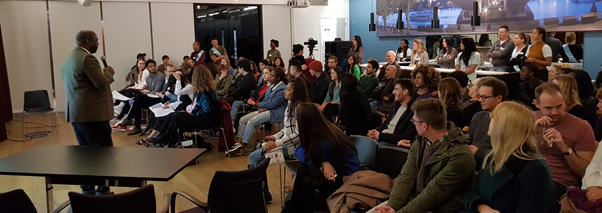
The 2017 #TweetaPitch competition for a £500 bursary attracted seventeen entries from which nine were chosen to make their 2 minute pitches to judges Mo Ali, the film maker, Jordan Stephens, popular musician and poet and Mei Leng Yew. Pascale Kann's winning pitch will see her making a film on the need for free access to menstrual products for homeless and poor people. The Young Film Makers Day was hosted by Iyare Iyighon from the BFI. Karin Pointner, Festival Manager, thanked the production team from the Event Academy and the BFI Future Film team, Noel Goodwin, Toyin Ayinde and Iyare Iyighon after which followed a lively networking session with refreshments kindly provided by Sainsbury’s Nine Elms.
UNA Westminster, coordinator of the global campaign to reopen the 1962 UN inquiry into the death of Dag Hammarskjöld, welcomes the latest report released by UN Secretary-General António Gutteres. The report has been led by the UN’s ‘eminent person’, Judge Mohamed Othman, the former Tanzanian Chief Justice tasked to review both old and newly uncovered evidence. His quest has not been fruitless as he observes that “far from approaching the possible limit of our understanding, the deeper we have gone into the searches, the more relevant information has been found.”
Mr Othman’s recommendations are firstly, that the UN follow up on discrete unfulfilled aspects of the current inquiry; secondly, that relevant Member States each ‘appoint an independent and high-ranking official to conduct a dedicated internal review of their intelligence, security and defence archives to determine whether relevant information exists’; and thirdly, the UN review its own specific records and archives for possible declassification. In endorsing the report, Mr Gutteres has instructed that this recommendation be taken forward. Finally, to give focus to the continuing process, Mr Othman advises the appointment of a specific person or persons mandated on an ongoing basis to receive and collate new information in order to transmit it to the Secretary-General.
A summary of the report can be read in the 25 October news item on our Hammarskjold Inquiry webpage.
The much awaited UN Reform proposals set out to cover all elements of the organisation’s plethora of responsibilities even though its scope might not satisfy the demands of all. The need to embrace technology is key to this but is the UN sufficiently inter-connected to stand back and assess whether its own targets for technological advance are sufficiently networked and sufficiently far-reaching? A new report United Networks: Can Technology Help the UN Meet the Challenges of the 21st Century? published by the Emirates Diplomatic Academy, New York University and the Makhzoumi Foundation addresses this issue, offering twenty recommendations shown below. Ryan Gawn, former UNA Westminster Treasurer, now Head of International Communications at ActionAid International was a leading contributor to the Report and reviews here its salient features. The Report can be read here.
Recommendations
1] Set out a simple, compelling case for UN as the spiritual home of global citizenship, coexistence and universal values.
2] Appoint a DSG for The Future.
3] Create a UNSG-chaired Innovation Panel with leading technology companies, to fix problems together.
4] Publicly review all UN partnerships against tangible, practical results, and provide real time, online access to UN spending statistics.
5] Open up all top positions to public hearings, debates, and online Q&A.
6] Get all senior UN officials on social media in an authentic, engaging and purposeful way.
7] Overhaul the UN web presence, improving search functions, user experience, and rapid response; and allowing global citizens to join genuine policy debate and share content.
8] Equip peacekeeping missions with the right technology, including a cloud-based information platform and advanced mobile devices for peacekeepers on the ground.
9] Overhaul membership of the Internet Governance Forum.
10] Better protect the creative industries from digital counterfeiting.
11] Create a Geneva Convention for Cyber Security.
12] Redirect resource towards challenging online hate.
13] Get the world online.
14] Back an online Global Curriculum, and pioneer a global effort to back the next generation with the right skills for the Digital Age.
15] Crowdfund compassion
16] Develop data modelling for migrant and refugee flows.
17] Lead work on how block chain can help create a single digital identity, and allow every individual to see how entities access their data.
18] Produce a Universal Declaration of Digital Rights.
19] Establish a Data Science Partnership to help all UN operations deliver a faster and better service, increasingly driven by artificial intelligence.
20] Lead a public debate on a UN Code of Practice on Artificial Intelligence.
This month, Mark Lowcock, formerly DFID Permanent Secretary, takes on the dual role of Under-Secretary-General for Humanitarian Affairs and UN Emergency Relief Coordinator. His hands-on experience in large-scale aid programmes as well as being a qualified chartered accountant will be valuable at a time when many consider OCHA to be at the crossroads at best. Yesterday (27 September), he reported for the first time to the UN Security Council, detailing OCHA’s challenges in Syria. “The Syrian people remain trapped in a cycle of violence that must be broken” he stated, noting that an estimated 419,920 people remain besieged in 10 locations across Syria. Of these, 95 per cent are besieged by the Government, two per cent by non-State armed groups, and three per cent by both non-State armed groups and the Government of Syria. “These sieges must be lifted” he said.
Mr Lowcock faces many other challenges as he embarks on his dual role. OCHA faces accusations of being poorly structured, under-funded, unfocused and suffering from low morale. Read here our analysis.
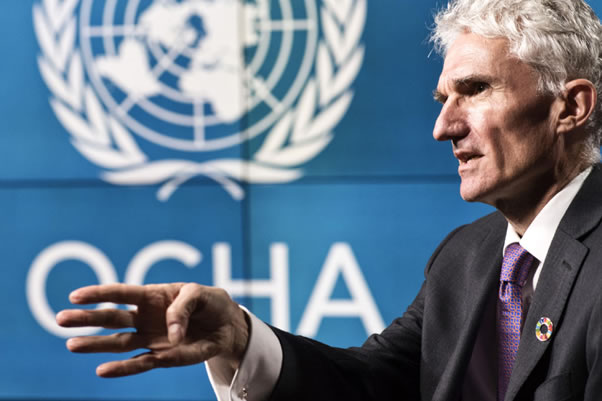
Harry Wright, Co-Vice-Chair of UNA Westminster Young Professionals, has been invited to address the 13th Conference of Youth (COY in Bonn, Germany, in early November linked to and which immediately precedes the very crucial 23rd UN Climate Change Conference of Parties (COP23) in the same venue.
 The three-day conference is an official event of YOUNGO, the official youth-constituency to the United Nations Framework Convention on Climate Change (UNFCCC). It is an annual international gathering of young people passionate about environmental and climate change thematics and which seeks to provide capacity building and policy training to prepare youths for their involvement in the upcoming climate negotiations, facilitate the sharing of knowledge and experience in the broader context of climate change between the participants, and build and enhance youth networks and movements.
The three-day conference is an official event of YOUNGO, the official youth-constituency to the United Nations Framework Convention on Climate Change (UNFCCC). It is an annual international gathering of young people passionate about environmental and climate change thematics and which seeks to provide capacity building and policy training to prepare youths for their involvement in the upcoming climate negotiations, facilitate the sharing of knowledge and experience in the broader context of climate change between the participants, and build and enhance youth networks and movements.
The COY13 organising team invited organisations as well as individuals to submit programme proposals to contribute to COY13 and its goals. Harry’s successful 90 minute submission is titled Bringing Conservation into the 21st Century: How social media and online crowdfunding can lead the way to a brighter and more sustainable future.
Click here for more information on COY and on COP23.
Since becoming involved with the UNA for the past 15 years, building bridges of understanding has become primary focus of my life. Each year, my wife Barbara and I seek to visit areas of global concern, engage with locals, professionals, academics and service personnel. Our hope is to make local connections, seek to connect in a significant way with UNAs where extant, help organize and participate in seminars when possible and deepen our immersion experience within a culture different from our own. Upon return, our commitment is to search for ways to share this experience.
This spring we were privileged to spend time in the Persian Gulf area with extended visits to the United Arab Emirates, including Dubai, Abu Dhabi and Sharjah along with Qatar and Oman. Previous visits in the Middle East, beginning in 1972, have included Syria, Iran, Israel, Jordan, Egypt, Georgia, Armenia, Saudi Arabia and Turkey. Most welcoming in terms of people, culture and religion, Iran; least welcoming Saudi Arabia. Clearly this is a volatile geographic region, grossly disproportionate to its size and population. There are only 450 million people in the Middle East, (6 % of the world’s population) and it contains only 16 of the world’s 193 nation states. Although primarily Islamic in religious practice, the numbers are minuscule in comparison with Indonesia and areas of Africa. It is, however, the heart of the Arab world and at the same time the centre of the holy Shrines of Islam, Mecca and Medina, sacred also to Turks and Iranians. Mosques are everywhere; Imams, Sheikhs, and Ayatollahs have determined that everyone should be able to walk to one within five minutes.
The Middle East has a young population, approximately 30-70% are under the age of 30. Exposed to the West through the internet, influenced by Al Jazeera, a provocative Arab version of CNN, significantly unemployed and underemployed, dejected by the failed promise of the Arab Spring, the youths of the Middle East are restless. The dramatic decrease in oil revenue has predictably caused unaccustomed or intensified economic pain. In addition, the Shite-Sunni religious rivalries reveal both spiritual and nationalistic competition. A narrow, religious educational standard promoted for boys by the Madrassas especially in Saudi Arabia (focused on the memorization and interpretation of the Koran), intensify this unease and discontent. Only in Iran did we find a significant number of educated women who worked in professional careers.
One question that I carried with me: Is it possible to be Arab and a global citizen? Is it possible for the Middle Eastern countries to take their equitable place at the table of nations, apart from their gas and oil reserves? Much of the news coverage of the Middle East during the last few decades has been laden with conflict. From the 1917 British Balfour Declaration to the 1967 war to the present moment, the Jewish and Palestinian populations have been unable to find a shared land/political solution. With the demise of the Ottoman Empire in 1918, the end of WWI and the failure of the League of Nations, France and England maneuvered artificial land borders. This strategy enormously skewed oil profits away from local populations, formalized their control of puppet autocrats, neglected the historic tribal landscape and left the Kurds without a homeland. No doubt the map of the Middle East will be redrawn after the tragedy of Syria is finally stabilized. I expect a home for the 30-40 million Kurds, a Kurdistan to emerge, but not without intense upheaval. Israeli and Palestinian populations will no doubt finally become exhausted and borders established. Someday, Islam will experience an enlightenment that moves beyond the Sunni-Shite division and finds a peaceful reconciliation with modernity. Ultimately, the citizens of the Middle East will come to grips with a pan Middle East that includes Arabs, Turks, Persians and Kurds, welcoming Christians. My dream!
Is there a meaningful strategy forthcoming, encouraging a future that is both Arab, Persian, Turkish and global? The desire of the Sheikhs, Emirs and Sultans, at least on the Western side of the Gulf seems to be emerging. Perhaps stifled now in this effort by the new Crown Prince of Saudi Arabia, nevertheless, there are some positive elements. First, I highlight the United Arab Emirates and the branch of New York University in Abu Dhabi, sponsored and paid for by Sheikh Kalifa. His goal is to eventually attain a 15% Arab student population interwoven with students from more than 100 nations, preparing these students for global Arab cooperative leadership. It was very impressive to be immersed in this endeavour, if only for a day. A second positive element are the new museums built or under construction; In Doha, the Museum of Islamic Art; in Sharjah, the Museum of Islamic Civilization. In Abu Dhabi, both the Guggenheim and the Louvre have construction ongoing. These are in addition to the world renowned museums in Egypt, Turkey and Iran. Museums inspire, engage, educate and enlighten.
Personally, I am not inclined to want to live in Dubai with its incredible skyscrapers or in the Middle East. I will always cherish moments spent, often enhanced by human kindness …. be it the Western Wall and Holy Sepulchre in Jerusalem or visiting the pyramids outside of Cairo or listening to poetry at Hafez’s tomb in Shiraz or enjoying 3 am coffee with Bedouins at a desert camel market or walking the Street called Straight in Damascus. Nevertheless, the heat, the intense traffic congestion with its accompanying pollution, the sandstorms which turn day into night, the separation of the sexes, men in white thobe tunics and women in black abaya gowns, the fact that a majority of the servant class of individuals (up to 90% in some countries) is imported from around the globe to sustain the wealthy citizens of countries sustained through petrochemicals … all of these are challenging to encounter. Nevertheless, I did appreciate so many people on the ground, welcoming us; hosting us with kindness; seeking to honour their cultural heritage, creating magnificent, stunningly beautiful mosques and the many who actualize the Arab proverb:
لا تمشي ورائي .أنا لا أقود .لا تمشي أمامي .أنا لا أتبع .امشي بجانبي وكن صديقي - .ألبرت كامو
Don't walk behind me; I may not lead. Don't walk in front of me; I may not follow. Just walk beside me and be my friend.
With warmest wishes, Joe
(Joe Baxer is President of the Connecticut Chapter of UNA-USA which is twinned with UNA Westminster. This happy union came about through the energy and enthusiasm of the late Ruth Steinkraus-Cohen, a former Chapter President. In her memory, we have given her name to our annual International Law Lecture, held each spring in association with the Bar Council of England and Wales and the Centre for International Studies and Diplomacy in the School of Oriental and African Studies at London University.)
UNA Westminster hosted a meeting for the launch of the first of two volumes of ‘Angola in the Security Council 2015/2016: Resolutions and Experiences in World Governance’ written and compiled by Dr António Luvualu de Carvalho, Roving Ambassador of the President of Angola.
David Wardrop, UNA Westminster Chair, welcomed the opportunity to host the meeting, referencing former UN Secretary General Dag Hammarskjöld’s famous riposte to Soviet premier Nikita Khrushchev, ‘It is not the Soviet Union or indeed any other big Powers who need the United Nations for their protection. It is all the others.’ He asserted that the voices of smaller states such as Angola, both in the UN General Assembly and on the Security Council, must be both heard and listened to and that this event offered just such an opportunity.
 Dr Carvalho was joined by Lt-Colonel Luīs Bernardino from the Portuguese Military Academy in offering valuable overviews on previous conflicts in Angola and on the current situation, noting the presidential elections due in August. Following their statements, they answered a series of questions on a range of subjects.
Dr Carvalho was joined by Lt-Colonel Luīs Bernardino from the Portuguese Military Academy in offering valuable overviews on previous conflicts in Angola and on the current situation, noting the presidential elections due in August. Following their statements, they answered a series of questions on a range of subjects.
In welcoming HE Mr Miguel Neto, ambassador of the Republic of Angola, Mr Wardrop presented an overview of the pioneering role played by the late Dame Margaret Anstee, the first women to be appointed to the post of UN Under-Secretary-General and who later led the unsuccessful UN election supervision mission (UNAVEM 2) in Angola (1992) and the UN peacekeeping mission there. He referred to his meeting with Dr Carvalho at the memorial service for Dame Margaret which had led to Angola’s generous support for the 2017 UN Peacekeepers’ Day conference and ceremony.
Mr Wardrop referred to the paper ‘Gender Equality and women’s empowerment in the United Nations system and its Member States’ which sets out the rationale for setting up an annual lecture and travel bursary programme for young women to visit and report on the UN’s progress in its field operations towards the goal of gender equality. Comments and suggestions for strengthening the proposed programme were then invited from the large audience. There were many of these and in closing the meeting, David Wardrop thanked all present for contributing to such a lively and interesting meeting. The event was made possible through the generosity of the Consulate-General of the Embassy of Angola. All enjoyed the reception which concluded the evening held at the Naval & Military Club in St James’s Square.
UNA Westminster has welcomed the adoption in New York of the Treaty on the Prohibition of Nuclear Weapons, the first multilateral legally-binding instrument for nuclear disarmament to have been negotiated in 20 years. “The treaty represents an important step and contribution towards the common aspirations of a world without nuclear weapons,” the spokesperson for Secretary-General António Guterres said following its adoption. “The Secretary-General hopes that this new treaty will promote inclusive dialogue and renewed international cooperation aimed at achieving the long overdue objective of nuclear disarmament,” he added.
The treaty, adopted by a vote of 122 in favour to one against (Netherlands), with one abstention (Singapore), prohibits a full range of nuclear-weapon-related activities, such as undertaking to develop, test, produce, manufacture, acquire, possess or stockpile nuclear weapons or other nuclear explosive devices, as well as the use or threat of use of these weapons.
During the conference, a study group to the UN led by UNA Westminster was able to listen to updates from UK observers to the conference. UNA Westminster believes the UK was wrong to stay away from the Non-Proliferation of Nuclear Weapons talks earlier in spring 2017 and also in June, in line with NATO policy. “The club of nuclear states continue to play their own dangerous game,” said David Wardrop, Chairman, UNA Westminster, “making little effort to recognise the fears of those states not in the Club. The UK, other NATO states and other nuclear powers owe it to the 122 states who signed the historic treaty to explain their positions on the issue”.
UNA Westminster shares its disappointment that the UK government continues to delay in setting out its national strategy to promote and implement the UN Sustainable Development Goals (SDG) to which it committed in the 2030 Agenda for Sustainable Development. The reports of two House of Commons committees, those on International Development and Environment Audit, point to the government’s lack of direction and strategy and now many in the NGO community feel that if government continues to sidestep the responsibility, it will be for the NGO community to ensure the UK manages to keep ‘ahead of the curve’. Read here for UNA Westminster’s analysis.
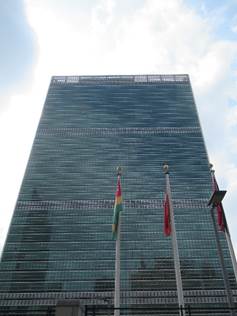 UNA Westminster has recently completed a study visit to the UN in New York to gather an overview on some of its current programmes and to hear from other organisations how they feel it is performing. There were sixteen briefings and a full report will be posted on the UNA Westminster website shortly (Event Reports).
UNA Westminster has recently completed a study visit to the UN in New York to gather an overview on some of its current programmes and to hear from other organisations how they feel it is performing. There were sixteen briefings and a full report will be posted on the UNA Westminster website shortly (Event Reports).
At the time of the visit, the UN was hosting several intergovernmental meetings, with the largest of which with no UK representation. This was the latest in a series of meetings to negotiate a legally binding instrument to prohibit nuclear weapons. There were more than 130 States present but only the Netherlands from a NATO state and no attendance by other nuclear powers. Rebecca Johnson, Director of the Acronym Institute, and Dave Webb, CND, both found time to leave the meeting to update us on progress. We learned that this was one example of a distancing of the permanent members of the Security Council from non-nuclear and middle rank and developing states, also that the current climate in the Security Council sees it caught in a period of name-calling and lack of much will for cooperation. So it was interesting that the presentation made by the UK Mission to the UN principally covered its work in the field of development which is conducted in the General Assembly.
The group listened to presentations on UN standing committees on counter terrorism, and weapons of mass destruction, learning with mixed feelings about hideous weapons as yet undeveloped and the UN’s planned strategies to contain the use of these within existing and new protocols. There were presentations on the Sustainable Development Goals, the application of the Rule of Law, UN Women and the tensions between UN peacekeepers and UN health staff seeking to work in war-torn states.
Not all presentations were made by UN staff. Adam Lupel, Vice-President of the International Peace Institute, introduced its seminal project “Pulling Together: The Multilateral System and Its Future” the final report of its Independent Commission on Multilateralism, and UNA-UK member Ian Martin introduced the group to the exceptionally important work of the Security Council Report for which he serves as Director. The group visited the Center on International Cooperation based in New York University, a vitally important institution to which the UN turns to very much when testing new ideas in peacekeeping and peacebuilding. One speaker, Richard Gowan, former editor Global Peace Operations, reviewed the UK’s current challenges, foreseeing more troubled waters post-Brexit. See here his recent blog ‘The UN is giving up on Trump’.
 The group was fortunate to be hosted by the Board of the UNA New York Chapter on the 44th floor boardroom of Akin Gump for whom their chairman works and which has a stunning view (left).
The group was fortunate to be hosted by the Board of the UNA New York Chapter on the 44th floor boardroom of Akin Gump for whom their chairman works and which has a stunning view (left).
On the final day, the group took the train to visit UNA Westminster’s sister chapter in Westport, Connecticut, to share in its annual jUNe Day celebrations. The visit included a tour of the historical old town and a chance to swim on its peaceful, sandy beach and a memorable walk across the Ruth Steinkraus-Cohen Memorial Bridge (below), bedecked with the flags of all nations, a fitting tribute to the achievements of a remarkable lady.
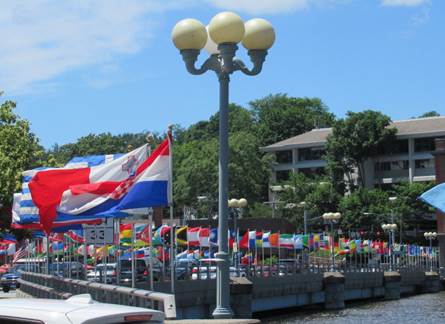 The project did not only comprise serious meetings. Group members enjoyed eating in nice affordable restaurants, sometimes dancing into the night and ended up attending a morning service at the Abyssinian Baptist church in
The project did not only comprise serious meetings. Group members enjoyed eating in nice affordable restaurants, sometimes dancing into the night and ended up attending a morning service at the Abyssinian Baptist church in
The village of Writtle in Essex has installed a plaque outside the Village Hall in memory of Dame Margaret Anstee, born in the village and the first woman to serve as UN Under-Secretary-General. Dr. Ziaul Islam, formerly serving with WHO and a member of the Executive Committee of British Association of Retired UN Civil Servants (BAFUNCS) read a message from Edward Mortimer, President of BAFUNCS, and then, with Lord Petre of Writtle, jointly unveiled the plaque in the presence of members of Margaret Anstee’s family, the head teacher of her school in Chelmsford, the local press and members of the village community.
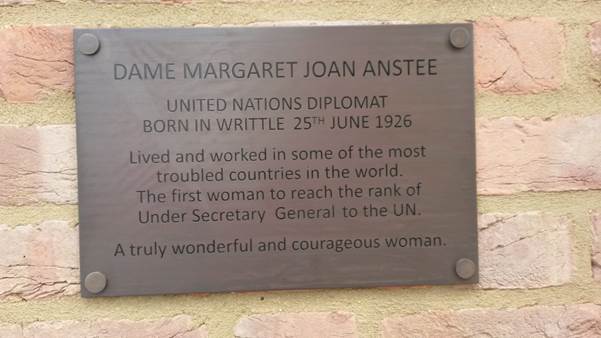
Margaret Anstee (known as Joan to her family) served the United Nations over five decades, working tirelessly for development and peace, to encourage and promote its talented women. She served as Special Representative of the UN Secretary-General in Angola which she tried desperately to save from further civil war and where she is remembered with great affection. Upon retirement, she made her second home in Bolivia. In recent years, she strongly supported UNA Westminster’s annual conference to mark the International Day of UN Peacekeepers, chairing sessions and advising on programme content.
The annual wreath-laying ceremony to mark the International Day of UN Peacekeepers witnessed a record attendance by foreign diplomats in London. A total of 115 laid wreaths on behalf of their countries. Wreaths were also laid by Alok Sharma, Parliamentary Under-Secretary of State, Foreign & Commonwealth Office, General Sir Chris Deverell, Commander of Joint Forces Command and Sir Thomas Winsor, HM Chief Inspector of Constabulary. The band of the Welsh Guards provided musical support and members of the UN Veterans Association led the parade. 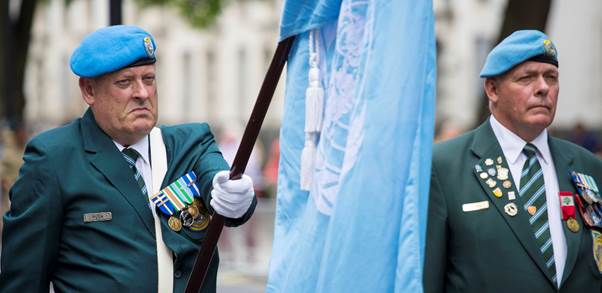
The accompanying conference held in association with UNA-UK and the Royal United Services Institute attracted a capacity audience. Opening remarks were made by General Sir Gordon Messenger, Vice Chief of the Defence Staff, Ministry of Defence, and the keynote Folke Bernadotte Memorial Lecture was given by Major General (Retd) Patrick Cammaert, former General Officer Commanding of the Eastern Division of the UN Organization Mission in the Democratic Republic of the Congo (MONUC) and a former UN Force Commander and investigator.
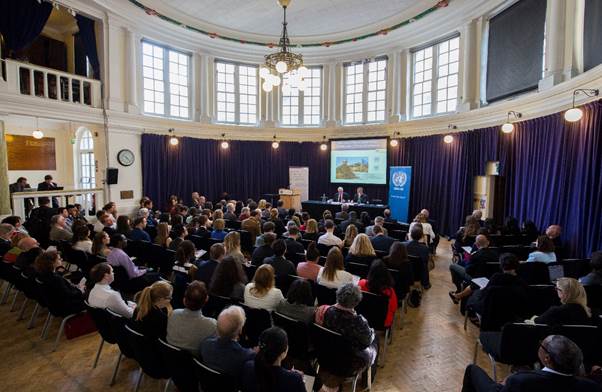
The inaugural Margaret Anstee Memorial Seminar featured a presentation by Antonio Luvualu de Carvalho, Ambassador at Large for the President of Angola, and HE Miguel Neto, Angola’s Ambassador.
The conference was sponsored by the High Commission for Canada, marking Canada’s 50 years in UN Peacekeeping, and by the Consul-General of Angola marking her country’s appreciation of the work of Dame Margaret when serving there as Special Representative of the UN Secretary General. A full report of the conference and ceremony can be found here.
The 15th annual conference to mark the International Day of UN Peacekeepers, held in association with UNA-UK and the Royal United Services Institute (RUSI) will be held on 24 May, will be introduced by General Sir Gordon Messenger, Vice Chief of the Defence Staff, Ministry of Defence.
The Folke Bernadotte Memorial Lecture will be delivered by Major General (Retd) Patrick Cammaert, former Force Commander of UNMEE and author of the Independent Special Investigation which occurred in Juba, South Sudan in 2016 and the UNMISS (South Sudan) response.
The opening session will tackle the dilemma between “Better Peacekeeping” or “People Centred” and ask what do these approaches mean and how can they be implemented. Hilde F. Johnson, former Special Representative of the Secretary-General and Head of UNMISS (South Sudan) and Julian Harston, Former Special Representative of the Secretary-General and Head of Mission MINURSO, Western Sahara, will share their views.
The afternoon session, the Margaret Anstee Memorial Seminar will tackle leadership and accountability and consider how to improve trust and credibility in a context of ongoing allegations of sexual exploitation and abuse and a perceived failure to protect. Nicola Dahrendorf, former Director and Senior Advisor on Sexual Abuse (SEA) & Chief of the MINUSCA Conduct and Discipline Team, Central African Republic, and Fred Carver, Head of Policy, UNA-UK will review progress in this field.
The registration fee is £24 (Students with ID, £12). Please click here to register for the conference.
The traditional wreath-laying ceremony at the Cenotaph will take place at 1.00pm, to include representatives of London’s diplomatic community. The UN Veterans Association (UK) will lead the parade and the Band of the Welsh Guards will provide musical support. Attendance is open to all.
UNA Westminster supports UNA-UK in all its campaigns, emphasising also its stance on current issues including:
Human Rights
The UK should uphold the European Convention on Human Rights. Why?
Nuclear Weapons
The UK was wrong to stay away from the Non-Proliferation of Nuclear Weapons talks (Spring 2017)
The Responsibility to Protect
Follow us when our Young Professionals re-boot this debate shortly
Sustainable Development Goals
We promote the role of youth in their promotion. See SDGs: from Promise to Practice
Conservation and the Environment
We closely follow and support The Conservation Project, led by a member of the UNA Westminster Young Professionals
We have made 27 statements on various issues, all recorded as News items
Overview
The defence of human rights 21/11/11, 27/11/12, 31/10/14, 16/09/16, 01/10/16
Pursuing transparency in the UN 03/12/14, 20/02/15
Tackling piracy in Somalia 05/01/12, 13/03/12, 13/04/16
The Libya crisis 23/02/11, 28/02/11, 17/03/11
The Gaza crisis 05/08/14,
The Syria tragedy 10/05/12
UN Peacekeeping 26/05/11, 27/09/15
Desecration of Muslim monuments 27/09/13, 26/07/14
Re-opening the inquiry into Dag Hammarskjöld’s death 02/07/11, 28/07/14, 12/10/14, 17/11/14, 01/06/15
Marking the Olympic Truce and its legacy 26/06/12, 10/07/13, 30/09/13
UNA Westminster Young Professionals screened the Fisher Stevens documentary Before the Flood featuring Leonardo DiCaprio before a capacity audience at the L’ Escargot restaurant on London’s Soho.

Following the screening, Harry Wright, Co-Vice-Chair of the Young Professionals moderated a Q and A session with Paula Owen, founder and CEO of Green Gumption ; Joanna Haigh CBE: Co-Director of the Grantham Institute, Imperial College; and Georgina Shiplee, Sustainability Consultant at Corporate Citizenship.
Join fellow UNA members enjoy watching top names from the British stage coming together to help raise funds for UNHCR. With work from Richard Bean, David Edgar, Phil Porter and more, Moving Stories will see a host of stars perform in aid of the current overwhelming global refugee crisis – the largest since the Second World War. Click here for information and tickets.
The afternoon will be hosted by Mel Giedroyc (The Great British Bake Off and Let It Shine) and will include performances from James Bolam (New Tricks, The Likely Lads), Rufus Hound (One Man, Two Guvnors, Celebrity Juice), Anna Jane Casey (Billy Elliot, Spamalot), Natalie Casey (Hollyoaks, Two Pints of Lager and A Packet of Crisps).
Since its creation in 1950, UNHCR, the UN Refugee Agency, has been providing essential protection and support to the millions of people around the world who have been forced to flee their homes because of conflict, persecution or violence.
Over the last six decades, UNHCR has been on the ground fulfilling its mandate to safeguard the rights and wellbeing of refugees, ensuring that those who cannot seek protection from their own country can exercise the right to seek asylum and find safe refuge in another. Today, an unprecedented 59.5 million people are displaced around the world – of whom more than half are children. These are people whose lives have been shaped by war, fear and loss, but for whom UNHCR works hard to provide life-saving assistance, and crucially, hope for a better future.
The film The Swimming Club, winner of the 2015 annual #TweetaPitch competition and which received its world premiere at the 2016 We The Peoples Film Festival has now been released for public access viewing. “We are extraordinarily proud to have played an important part in the funding of this film” said David Wardrop, chairman of UNA Westminster which organises the We The Peoples Film Festival. “The Swimming Pool will serve as a valuable resource to all tackling prejudice on transgender issues, especially those in less tolerant societies. We will help the film’s directors reach out to all interested parties.”
The film focusses closely on the experience of swimming for transgender people, but in doing so, it obliquely looks at the broader subject of what it's like to be transgender in 2017. It follows a group of transgender women in London who have set up a 'safe space' swimming club as they come together for their weekly swim. For some of the club’s older members, it had been 20 years since they had last felt brave enough to go for a swim.
The film’s joint directors, Cecilia Golding and Nick Finegan, recently commented on the challenges facing their film’s subjects, observing “Going swimming isn't easy when you’re transgender. In fact, simply being in a public space can be challenging for trans people. Changing rooms become daunting places, and revealing your body to a crowded pool might be the last thing you want to do. So, for them, swimming is a brave act of resistance.”
The proposed study tour to the United Nations headquarters in New York will take place on 18-24 June 2017. We plan to hold briefings with several UN agencies and programmes and with other organisations based in New York. Also, we will meet the UK Mission to the UN and UNA Chapters in the city. If the UN calendar allows, we will seek to attend major UN meetings. On 23 June, we will lead an optional tour outside the city and on 24 June, we will visit Westport CT to join the UNA Connecticut Chapter (our twin) as it marks jUNe Day, traditionally attended by diplomats from many countries and UN staff.
Tour members will meet up at our chosen hotel in Manhattan on Sunday evening, 18 June. If you arrange your own accommodation, we can re-adjust costs accordingly. The target cost of £430 (sharing) and £760 (single). This covers accommodation for six nights, two dinners and return travel to Westport CT. It does not include air travel or meals other than indicated. Some travel bursaries of £100 will be available to UNA members under 35 who will be requested to submit a tour report.
Please register your interest at info@unawestminster.org.uk to receive updates.
Joe Baxer, Chairman of the UNA Connecticut Chapter with which we are twinned reports here on his recent visit to Moscow. In noting the election of Donald Trump, he shares his anxiety that he and Mr Putin may overlook and denigrate the work done to allow Europe years of peace while creating a Yalta style agreement. “These are the times of crisis and opportunity.” he concludes. In March, Joe Baxer will next visit Oman, Qatar and Abu Dhabi and later Frankfurt at the invitation of the German UNA.
UN Secretary-General Antonio Guterres has appointed Tanzania's former Chief Justice Mohamed Chande Othman to review potential new information, including from South Africa, on the 1961 plane crash that killed U.N. Secretary-General Dag Hammarskjöld. This decision follows the resolution adopted by the UN General Assembly on 23 December.
Chief Justice Othman is not new to this challenge. In 2015, he led the UN’s independent panel reviewing new information about the crash. The panel's report (News Item 20 July 2015) discounted claims that Hammarskjöld was assassinated after surviving the crash but pointed to new information about a possible aerial attack or interference.
UNA Westminster has closely followed developments on this issue since the publication of report of the Hammarskjöld Commission in 2013 and now hosts the Hammarskjöld Inquiry website.
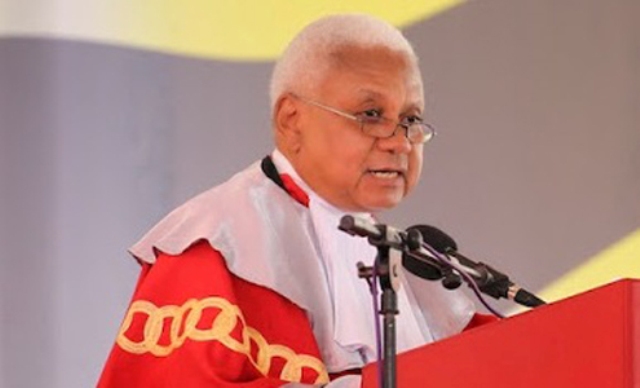
Professor Françoise Hampson has chosen the title "Should we be worried about the health of international law?" for the 14th Ruth Steinkraus-Cohan International Law lecture to be delivered on 7 March. To support her concerns, Professor Hampson will draw attention to certain states announcing their intention to withdraw from the jurisdiction of the International Criminal Court; the use of torture by US and UK agents in Iraq and Afghanistan disregarded both human rights law and the law of armed conflict; and, in the UK, threats by the government to withdraw from the European Convention on Human Rights. The lecture is open to all and registration to attend can be made here. It is co-sponsored by the Centre for International Studies and Diplomacy at SOAS and the Bar Council of England and Wales. A reception will follow the Q & A session.
The notice of the meeting can be downloaded here.
UNA Westminster regrets to announce the death of John Cooke, founder Chairman of the UN Veterans Association of the UK (UNVA). John Cooke first served with the Irish Guards in the British army but on moving to Ireland joined the 36th battalion of the Irish army. In 1961, he was posted to the 38th battalion then deployed by the United Nations to Elizabethville in the Katanga province of the Republic of the Congo. The Congo crisis was then at its height and in late 1962, John Cooke’s unit sustained a three week long attack by Katanga’s mercenaries which ultimately failed. Later, he returned to London where he remained for the rest of his life.
For several years, Irish UN veterans living in London formed the London ‘post’ of the well-established Irish UNVA but in June 2011, an independent organisation was formed with John Cooke elected as Chairman. At the time, goodwill messages were received from UK government ministers Henry Bellingham and Andrew Robathan, retired generals Sir Michael Rose and Sir Rupert Smith and also Colonel Bob Stewart MP. (News Report 8 June 2011).
The UN veterans will again provide the colour guard at the traditional ceremony at the Cenotaph to mark the International Day of United Nations peacekeepers, to be held on 24 May at 1pm.
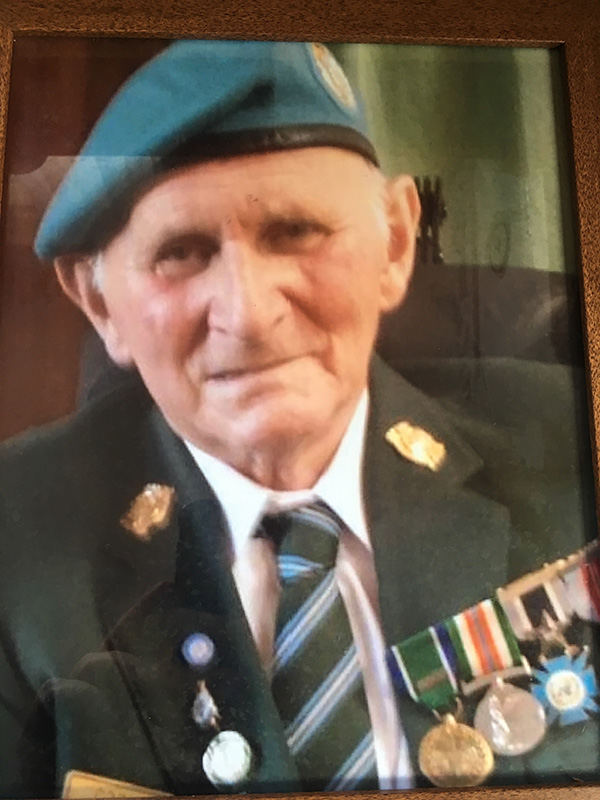
The UN General Assembly has adopted the Swedish resolution requesting the appointment of an eminent person to review and assess any new information that might throw light on the plane crash that killed Dag Hammarskjöld and his colleagues. The adoption of the resolution, co-sponsored by eighty-five Member States, followed the decision of the UN’s 5th Committee which advises on administrative and budgetary questions to allocate US$326,300 for its implementation.
The search for and appointment of the required ‘eminent person’ will now commence. “This development shows that the UN under Secretary-General Ban Ki-moon remains determined to pursue the principle of transparency in this matter.” said David Wardrop, Chairman of the United Nations Association Westminster Branch. “An African choice for the role of ‘eminent person’ would be admirable. Dag Hammarskjöld’s flight to Ndola was so closely linked to the bitterly resisted decolonisation process, the injustices of that period still resonate today.”
For UNA Westminster’s role in this process, visit HammarskjöldInquiry.info
UNA Westminster’s branch meeting titled ‘The UK response to the UN’s race audit: blueprint for change or empty promises, to gather dust until the next submission to the UN in 2021?’, chaired by Lord Ouseley, followed up that held in 2014 when Westminster UNA reviewed the UK’s progress in implementing recommendations made in the 2011 audit conducted by the Committee for the International Convention for the Elimination of Racial Discrimination (CERD). That report had criticised the UK for its treatment of gypsies and Irish travellers and its record on the disproportionate use of ‘stop and search’ powers.
The CERD Committee’s Periodic Review for the UK, published 29 August, had expressed concern on funding cuts to the Equality and Human rights Commission (EHRC) and the dilution of its powers and noted with alarm the sharp rise in race hate crime during the recent EU referendum campaign.
A key CERD recommendation urged the UK to develop a race strategy. Also, the EHRC had called on the Government to take urgent steps to tackle deep-seated racial inequality or risk societal disintegration. It proposed tough new race targets covering criminal justice, education and employment. Concerns for the state of UK race relations had been supported by its own research which evidences painfully slow progress and disproportionate outcomes in the life chances of black and minority ethnic people.
Upon becoming Prime Minister, Theresa May had committed the Government to an audit of public services to identify and tackle racial disparities and injustice. But many asked whether this indicated that ‘Race’ was back on the UK policy agenda after a prolonged period on the side-lines?
Andrea Murray, Human Rights and Research Director, Equality & Human Rights Commission (EHRC), stressed the Commission’s role as one of the UK’s three ‘A’ status National Human Rights Institutions (NHRI) and its place in the CERD examination process. This matter had taken on extra relevance following the race hate spike following the Brexit referendum and had been addressed in the report Healing a divided Britain published in August. This document and the call for a race equality strategy was an example of UK civil society at work. She heralded the publication of a new shadow report on the Universal Periodic Review (UPR) and drew attention to the Commission’s work on Gypsies and travellers and on the government’s Prevent Strategy. Finally, notwithstanding the reduction of 25% in the Commission’s annual grant, staff were determined to pursue their remit, submitting commentaries on key government policies and noted that while the next UPR is some years away, the issues to which refers remain priorities.
Barbara Cohen, Runnymede Trust, outlined the manner in which UK civil society had made the submission of a widely supported Shadow Report to the UN Committee on the Elimination of Racial Discrimination (CERD) regarding the UK Government’s Periodic Reports. This included reference to the UN body’s ‘special measures which had highlighted weaknesses in the UK government’s performance (hate crimes, gypsies and travellers and the Prevent strategy). She noted the start of the International Decade for People of African Descent (2015-2024) but awaited clarity from government on what strategy might address this. She drew attention to the vision in the original UK Race Relations Act (1965) and regretted that, in her opinion, such clarity and courage are not shown today.
Ian Naysmith, Senior Policy Adviser in the Integration and Faith Division at the Department for Communities and Local Government (DCLG) spoke of the devolvement of responsibilities in this field throughout central government, to the devolved administrations and also overseas territories. Policy when collated must be presented to Ministers before and after sharing with the EHRC. He shared with the audience the environment in which governments and NGOs present their respective cases in Geneva to a panel comprising experts from Ireland, Jamaica and Turkey. NGOs may comment also and in August 2017, the UK must return to the UN’s Human Rights Council to present its case on gypsies and travellers and on the Prevent strategy.
The meeting ended with a lively Question and Answer session, covering mental health, the empowerment of women, and the delicate balance between freedom of speech and the dangers of hate speech.
More than one thousand registrations have been made to attend screenings during the festival. “We are delighted we will have given many, many people the opportunity to see films chosen from over 1500 submitted from 70 countries. Our festival is unique in Europe and we look forward to next year with enthusiasm!” said David Wardrop, Chairman. The We The Peoples Film Festival is a project of UNA Westminster.
The Best Film in Festival award in 2016 has been awarded to A Brilliant Genocide, a film by Ebony Butler. The film sets out to be a counterpoint to Kony 2012 which brought worldwide awareness to the crimes committed by the Lord’s Resistance Army in Uganda and neighbouring countries. It shows how the government of President Museveni has used Kony as a straw man, enabling it to garner international sympathy and resources in the supposed “war on terrorism” while in fact diverting attention from its own crimes against humanity. The film shows its efforts to wipe out a significant part of Uganda’s Acholi people, using interviews with survivors of the most pre meditated torture and murder like no other in Uganda’s history.
The Best Film in Category awards were hotly contested between the forty films screened during the 2016 Film Festival. The Judging committee comprising Sophia Dembitzer, Bethany Ward, Karin Pointner, Isabella Qin and David Wardrop agreed on the following awards.
Human Rights - A Brilliant Genocide
Human Security - When you hear the bells
Development - K2 and the invisible footmen
Environment - Moving Forest
Short Film - This is not a Pizza Order
Nick Finegan and Cecilia Golding, winners of the festival’s 2015 #Tweeterpitch competition, have now premiered their film The Swimming Club at NFT2 at the BFI Southbank in front of a large, enthusiastic young audience. The film follows members of a transgender swimming club who have managed to find a ‘safe space’, a municipal swimming pool where, free from the stares of the public, they can relax, talk and swim.
The premiere was attended by members of Tag Support CIC and other members of the transgender community. “We are delighted to have kick-started this important film,” said David Wardrop, Chairman, UNA Westminster. “We will now inform our international contacts, within the United Nations family and beyond, that we all have a valuable asset that can greatly help to improve understanding of the special challenges of others.” Nick Finegan and Cecilia Golding will now embark on a crowdfunding project to raise the profile of the film and the issues it tackles.
Speakers at our meeting in the House of Lords on 5 December (6.30pm) titled ‘The UK response to the UN’s race audit: blueprint for change or empty promises, to gather dust until the next submission to the UN in 2021?’ will be Barbara Cohen, Runnymede Trust, Andrea Murray, Equality & Human Rights Commission and Ian Naysmith, Department for Communities and Local Government. The meeting will be chaired by Lord Ouseley, former chair and chief executive of the Commission for Racial Equality from 1993 to 2000.
All are welcome but please register here
For A4 Notice (pdf) click here.
Background: The meeting follows up that in 2014 when Westminster UNA reviewed the UK’s progress in implementing recommendations made in the 2011 audit conducted by the Committee for the International Convention for the Elimination of Racial Discrimination (CERD). That report had criticised the UK for its treatment of gypsies and Irish travellers and its record on the disproportionate use of ‘stop and search’ powers.
The CERD Committee’s recent Periodic Review for the UK, published 29 August, has expressed concern on funding cuts to the Equality and Human rights Commission (EHRC) and the dilution of its powers and noted with alarm the sharp rise in race hate crime during the recent EU referendum campaign.
A key CERD recommendation urged the UK to develop a race strategy. Also, the EHRC has called on the Government to take urgent steps to tackle deep-seated racial inequality or risk societal disintegration. It proposes tough new race targets covering criminal justice, education and employment. Concerns for the state of UK race relations are supported by its own research which evidences painfully slow progress and disproportionate outcomes in the life chances of black and minority ethnic people.
Now, upon becoming Prime Minister, Theresa May has committed the Government to an audit of public services to identify and tackle racial disparities and injustice. But does this indicate that ‘Race’ is back on the UK policy agenda after a prolonged period on the side-lines? What has triggered this renewed interest? Is the UN Treaty Monitoring process starting to pay dividends?
Our panel of experts will review the UN Report, assess prospects for action to tackle racial inequality, and discuss where action by Government and the EHRC is most needed and will have greatest impact.
Former chairman of Westminster UNA, Titus Alexander, has published Practical Politics: Lessons on Power and Democracy, which sets out to cover all levels of politics, from the office and neighbourhood to global governance. It argues that people need to be able to learn practical politics to solve problems of all kinds, from child abuse to climate change, conflict and population.
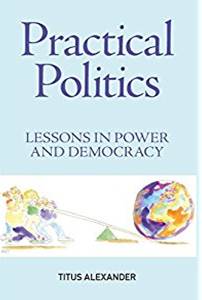 David Wardrop, current chairman of UNA Westminster, writes “Titus Alexander takes such a refreshing step in his book ‘Practical Politics, Lessons in Power and politics’, telling us it is ‘written for my son’s generation, the billion-plus people born since 2000’. I am sure they will welcome it as attempts to revive dull and dated ‘civics’ in schools have had little impact. The last major effort in this direction, by Professor Bernard Crick, became smothered by an increasingly overcrowded school curriculum. It is time to reflect on and learn from that loss. Titus Alexander makes simple statements but he comprehensively backs these up with well-researched data which will reassure any sceptical reader. This is the style of book that should populate school bookshelves and then be read. Then that generation which Titus Alexander targets might well see that ‘world of peace and prosperity’ that his own and earlier generations have so signally failed to deliver.”
David Wardrop, current chairman of UNA Westminster, writes “Titus Alexander takes such a refreshing step in his book ‘Practical Politics, Lessons in Power and politics’, telling us it is ‘written for my son’s generation, the billion-plus people born since 2000’. I am sure they will welcome it as attempts to revive dull and dated ‘civics’ in schools have had little impact. The last major effort in this direction, by Professor Bernard Crick, became smothered by an increasingly overcrowded school curriculum. It is time to reflect on and learn from that loss. Titus Alexander makes simple statements but he comprehensively backs these up with well-researched data which will reassure any sceptical reader. This is the style of book that should populate school bookshelves and then be read. Then that generation which Titus Alexander targets might well see that ‘world of peace and prosperity’ that his own and earlier generations have so signally failed to deliver.”
As chairman of UNA Westminster in 1998, Titus initiated Charter 99, which greatly influenced the UN Millennium Summit and government policy on accountability of global institutions.
The book is available in bookshops and c. £22 at Amazon here.
On 7 March 2017, Emeritus Professor Francoise Hampson of the School of Law at the University of Essex will give next year’s International Law Lecture at the Brunei Theatre at the School of Oriental and African Studies (SOAS). Professor Hampson was an independent expert member of the UN Sub-Commission on the Promotion and Protection of Human Rights from 1998-2007 and acted as a consultant on humanitarian law to the International Committee of the Red Cross. She has successfully litigated many cases before the European Court of Human Rights in Strasbourg and, in recognition of her contribution to the development of law in this area, was awarded Human Rights Lawyer of the Year jointly with her colleague from the Centre, the late Professor Kevin Boyle.
This annual lecture is held in association with the Centre for International Studies and Diplomacy at SOAS and the Bar Council of England and Wales.
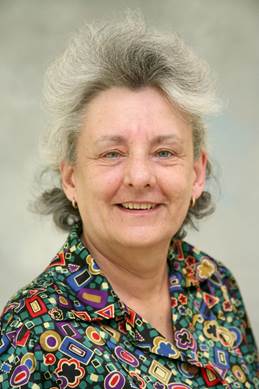
UNA Westminster joined the Mayor of London, Sadiq Khan, and other members of the London Boroughs Faith Network at a Faith and Community Assembly at Southwark Cathedral to sign up to a new London Declaration. The Assembly was organised by the Bishop of Southwark, the Rt. Revd Christopher Chessun following concerns shown by pupils in local schools following the referendum result and the increased incidence of inter-community tension.
The Declaration states:
1 We pledge our determination as Londoners to ensure that this great city shall continue to be a place of welcome, generosity and equality, with respect for all.
2 We condemn and oppose prejudice and distrust and will work unceasingly for tolerance and the common good.
3 We abhor all examples of exclusion based on ethnic identity that mar relationships between neighbours of all ages, faiths and backgrounds.
4 We stand in solidarity with those in London who are mistreated or held in contempt because of who they are or where they have come from.
5 We affirm that our diversity is a source of strength and that we are committed to learning from one another.
6 We commit to living out the declaration in our own lives, in our teaching and preaching and in our community engagement.
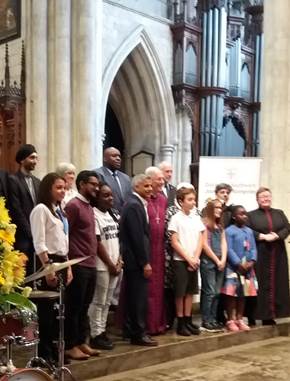
UNA Westminster has created a new website for its News Pages which report progress on the UN’s continuing efforts to seek the truth behind the plane crash in 1961 killing UN Secretary-General Dag Hammarskjöld and fifteen others. The Hammarskjöld Inquiry website is now the most authoritative source of information on current developments and has been added to the Dag Hammarskjöld Timeline posted by the Hammarskjöld Library at the United Nations.
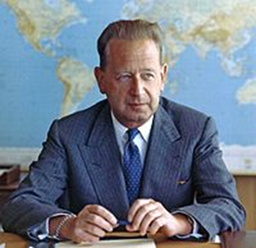
UNA Westminster joined other members of the London Boroughs Faith Network at St. Martin in the Field’s church to preview a short film stressing that London’s faith buildings
(churches, synagogues, temples, mosques and other faith buildings) would be open to all visitors over the following weekend. The film which comprises a sequence of about forty doors of faith building opening to all will now be launched during Inter Faith Week (13-20 November). UNA Westminster hopes that the film will be screened during the We The Peoples Film Festival (7-21 November).
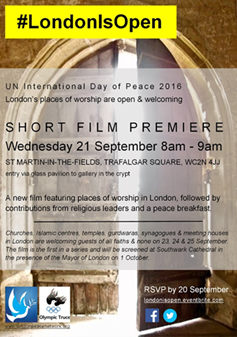
UNA Westminster’s close involvement with the London Boroughs Faith Network dates back to 2012 when it coordinated events to mark the Olympic Truce linking these with the work of the United Nations. See News Items of 26 June, 7 August and 16 August (all in 2012).
The UNA Westminster Young Professionals group has participated in the year-long programme initiated by the British Institute of Human Rights (BIHR) to produce a Joint Civil Society Report for submission to the United Nations as part of its Universal Periodic Review (UPR) of the UK. The document will be presented when the UN Human Rights Commission embarks on the second cycle of the UPR which studies the human rights situation of all UN Member States every 4.5 years. The UK was one of the first 42 UN Member States to be reviewed.
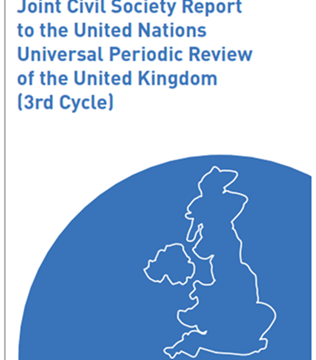 The BIHR Report covers domestic human rights protections such as women’s rights; children’s rights; poverty, welfare and adequate standard of living; criminal justice; counter terrorism; racism and hate crime; Immigration, asylum and trafficking; prisons; additional equality and non-discrimination issues; and access to justice.
The BIHR Report covers domestic human rights protections such as women’s rights; children’s rights; poverty, welfare and adequate standard of living; criminal justice; counter terrorism; racism and hate crime; Immigration, asylum and trafficking; prisons; additional equality and non-discrimination issues; and access to justice.
The Report stresses the need for government guarantees that it will build upon the Human Rights Act (HRA), rather than amending or repealing it via a new Bill of Rights. It argues that refusal to give such a guarantee should be recognised as an indication that there is a significant risk of the human rights framework in the UK being eroded. UNA-UK has also published an excellent submission here.
UNA Westminster is one of many civil society organisations which is deeply sceptical about the prospects, in the current political climate, for a new bill of rights to improve human rights protections in the UK. Notwithstanding this, if improvement is intended this can be done without repeal of the HRA, focusing on better implementation of current protections.
UNA Westminster especially welcomes the BIHR Report as it successfully moved a resolution in the 2009 UNA Annual Conference proposing that ‘a group of NGOs assist in monitoring the UK’s performance and agree an annual report. “The success and wide support for the BIHR initiative is excellent” said David Wardrop, UNA Westminster Chairman, “and we thank Isabella Qin and Mafalda Damosa of our Young Professionals group in their work on this project. UNA Westminster will be examining the recently published audit conducted by the Committee for the International Convention for the Elimination of Racial Discrimination (CERD).
The UNA Westminster branch meeting followed the ‘UN General Assembly Special Session on the World Drug Problem’ (UNGASS) which had been triggered by an accelerated review process prior to the formal review conference in 2019. It was chaired by Baroness Meacher, Co-Chair of the All Party Parliamentary Group on Drug Policy Reform, who hailed the UNGASS as a ‘moment of transformation’, seeing it as the moment when the UN had turned its back on the concept of a ‘war on drugs’.
HE Mr Nestor Osorio, Ambassador of Colombia, referred to his country’s painful experience as an unwilling source of coca, controlled by local mafia groups and the subsequent recognition for a coordinated approach. This was taken by president Santos and the presidents of neighbouring states. He spoke about valuable guidance documentation from the LSE in London which managed to prompt international debate, despite opposition from Russia and China. The emphasis on moving this debate into the human rights field, citing health priorities - the drug user is a patient, not a delinquent - was a key move. He feels confident that the summit in 2019 will be successful, the necessary ‘transition’ to which Baroness Meacher referred being progressed. We should concentrate on the real enemies, the traffickers, the money launderers and the dealers in chemical precursors.
Steve Rolles, senior policy analyst of the Transform Drug Policy Foundation, stated that the UN’s general policy of prohibition has put the drugs trade in the hands of criminals and led to suffering for millions. UNGASS sought to change that but only with limited success. The war on drugs will become the war on drug abuse, a small but significant shift. He praised the submissions to UNGASS made by fifteen UN agencies but reflected that traditional schisms between member states showed up, preventing, for instance, indicators making it into the Outcome Document.
Anne-Marie Cockburn, whose daughter Martha had died of an accidental ecstasy overdose, movingly recounted the effect of this tragedy on both family and friends. Now Anne-Marie works with the awareness charity Anyone's Child where her full story is reported. She described her visits to schools and prisons.
Chris Ford, Clinical Director of International Doctors for Healthier Drugs Policies, reported on her impressions of the UNGASS which was less optimistic than that of ambassador Osorio.
A wide-ranging Question and Answer session followed, covering points from the aggressive and selfish high-level politicking between UN Member States to the continuing challenges in prison education, racial stereotyping of addicts and inconsistently presented government guidance.
UNA Westminster Young Professionals and Liberal International organised a round table discussion in the House of Lords to review the effectiveness and relevance of the Right to Protect (R2P) concept to the ongoing Syrian refugee crisis.
The meeting was addressed by Lord Alderdice, President, Liberal International; Lord Hannay, Chairman, UN All Party Parliamentary Group; Kate Ferguson, Protection Approaches; and Leisha Beardmore, Chair, UNA Westminster Young Professionals Each offered different viewpoints to the challenges faced by states and individual citizens alike.
The Westminster Young Professionals stated that their aim was to re-ignite the R2P debate in the UK, raising public awareness and knowledge on the topic and to assist it gather sufficient momentum to generate a debate in parliament in 2016. Later this year, the Westminster Young Professionals will release a follow-up paper setting out their position on R2P and its applicability to the refugee crisis. This will be first released on the Young Professionals blog and Twitter account.
15 April 2016 Faisal Attrache, Director of Growing Home, which won UNA Westminster’s We The Peoples Film Festival award for a film on Human Security last year, has now taken the project further in association with Save the Children.
The original film featured the daily life of a Syrian barber struggling to maintain normality in the Za’atari refugee camp in Jordan. The new project features instruction of the camp’s refugee teenagers on how to make documentary films using their mobile phones. Faisal’s three week workshop culminated in the creation of nine short films shot entirely by the Za’atari teenagers. Students from McNally Smith College of Music in Minnesota have now composed original music for each film resulting in 44 minute compilation film depicting life in the Za’atari camp through the teenagers’ own eyes. The film “My Dream, My Right" will soon be available and some of the films can be viewed here.
The 2016 We The Peoples Film Festival will be held in November and currently, the First Stage judging team is assessing the 2500+ films already submitted. These will be shortlisted to about 200 from which about forty will be screened in the festival.
Visit the We The Peoples Film Festival website for all new information on the 11th festival.
13 April 2016 UNA Westminster will be advising World G18 Somalia, the leading non-clan UK Somali diaspora group, as it prepares to host a major meeting in the summer to address the special challenges facing Somalia’s coastal communities. The meeting will update participants on current efforts to revive the traditional fishing and coastal communities of Somalia. Many of these have witnessed loss of population, caused by piracy, lack of investment, poor education and health facilities, poor road connections and the rival attractions of inland cities.
UNA Westminster and World G18 Somalia believe the international community has continually failed to create a credible policy for reviving Somalia’s coastal communities. “In 2012, the responsible UK government minister Henry Bellingham stated the government would to commit £2M to community engagement and economic development projects in coastal regions” said David Wardrop, Chair, UNA Westminster Branch, “We tracked this and discovered it had been allocated to the UNDP’s Joint Programme on Local Governance which, while a worthwhile project, had only a minimal part relating to coastal activities.”
Surveys undertaken by World G18 Somalia for its ‘Six Villages project’ covering Las Quoray, Hiis, Eyl, Garacad, Hobbio and Lughaya indicate clearly the shortcomings in international support for these coastal communities and the degree of assistance needed.
Currently, there are several projects being undertaken about which the UK Somali diaspora will wish to learn more about. These industry-supported initiatives provide an opportunity to foster greater synergies and momentum. They include
• Norwegian Church Aid: supported by Norwegian Ship owners’ Association and Den Norske
Krigsforsikring for Skib
• Save the Children: supported by Danish Ship owners’ Association & individual companies
• Somali Fair Fishing: supported by 20+ companies and foundations
• UNDP Alternative Livelihood Project: funded by 7 shipping companies under the Joint
Industry Contribution to Support Community Projects in Somalia
• Oceans Beyond Piracy - Port Development Pilot Project: Berbera
Also, the UN FAO initiative to deploy Fish Aggregating Devices (FADs) along the Somali coast supervised by EUROMARFOR.
A scoping meeting will be held in London on 7 May to be attended by diaspora groups linked to coastal villages, principally the six villages of Las Quoray, Hiis, Eyl, Garacad, Hobbio and Lughaya.
21 March 2016 At the meeting with its title referencing UN Secretary-General Ban Ki moon’s declared commitment following the findings of a UN panel of experts, speakers updated the audience on his continuing efforts to uncover all available information on the fatal crash of the plane carrying his predecessor in 1961.
In opening the meeting, David Wardrop, Chairman of the United Nations Association Westminster Branch, chronicled the collective efforts by individuals worldwide in raising international awareness of the issue. This pressure encouraged the UN General Assembly to unanimously adopt two Resolutions which successfully triggered firstly the appointment of the UN Panel charged to examine existing information and secondly to support the Secretary-General pursue the matter. These efforts are fully reported in the news pages of this website.
Professor Henning Melber, Senior Research Fellow, Institute of Commonwealth Studies, and Director Emeritus of the Dag Hammarskjöld Foundation, explained how Hammarskjöld’s commitment to global governance, social justice and international solidarity was guided by strong personal integrity and solid values. “Despite his failures and setbacks, his brand of diplomacy offers important lessons for mediators today”, Professor Melber stated. He reminded the audience that Hammarskjöld had been widely praised for the UN’s role in the Suez crisis of 1956 but that the Congo crisis, resulting in the largest UN peace operation to date and continuing today, presented different challenges. He quoted one observer ‘the Congo was simultaneously a hotbed of inter-African intrigue, a playground for the superpowers and a turning point in the decolonization process.’ Professor Melber explained how Hammarskjöld tackled his mediation task against this background, concluding that as the world’s highest international civil servant to assume global leadership, he set standards that have lost none of their value and relevance. Professor Melber’s paper Dag Hammarskjöld and Conflict Mediation (February 2016) covers his address more fully.
Dr Roger Lipsey, author of Hammarskjöld: A Life, introduced his audience to Dag Hammarskjöld’s ethic, revealed in four key aspects. These were his conscious self-scrutiny (of himself); mobile awareness and empathy (in diplomatic and public life); facing facts, total engagement and selfless service. Dr Lipsey illustrated each of these aspects of Hammarskjöld’s ethic with excerpts from his book Markings. These included ‘You can only hope to find a lasting solution to a conflict if you have learned to see the other objectively, but, at the same time, to experience his difficulties subjectively’ written in 1955. In this and other passages, one can follow more clearly the manner of Hammarskjöld’s mission in the Congo.
Dr Lipsey, Professor Melber and David Wardrop
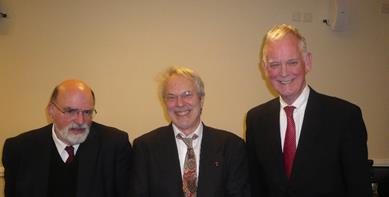 A lively discussion followed in which the speakers and members of the audience congratulated Ban Ki moon on his determination to ‘establish the truth of what happened on that fateful night’ but noted that despite the supportive General Assembly Resolution (19 November 2015), his term of office runs out this year. So what might his successor do? Mr Wardrop referred to the 1 for 7 Billion Campaign comprising 750 organisations and 170 million supporters worldwide, committed to getting the best Secretary-General to follow Ban Ki moon. Through this campaign, the candidates are identified and the UN has made it possible to pose them questions. Mr Wardrop told the audience he hoped that his own question “Ban Ki moon has shown great courage in pursuing the truth on Dag Hammarskjöld’s death. Although supported by most Member States, some powerful states are being slow to release relevant information. Will you guarantee to continue his courageous work?” might be among the thirty to be short-listed in April. Audience contributions included those currently researching contemporary papers deposited in the UK national archives and journalists covering Sweden and African issues. In conclusion, the speakers urged the audience to follow news reports on these pages.
A lively discussion followed in which the speakers and members of the audience congratulated Ban Ki moon on his determination to ‘establish the truth of what happened on that fateful night’ but noted that despite the supportive General Assembly Resolution (19 November 2015), his term of office runs out this year. So what might his successor do? Mr Wardrop referred to the 1 for 7 Billion Campaign comprising 750 organisations and 170 million supporters worldwide, committed to getting the best Secretary-General to follow Ban Ki moon. Through this campaign, the candidates are identified and the UN has made it possible to pose them questions. Mr Wardrop told the audience he hoped that his own question “Ban Ki moon has shown great courage in pursuing the truth on Dag Hammarskjöld’s death. Although supported by most Member States, some powerful states are being slow to release relevant information. Will you guarantee to continue his courageous work?” might be among the thirty to be short-listed in April. Audience contributions included those currently researching contemporary papers deposited in the UK national archives and journalists covering Sweden and African issues. In conclusion, the speakers urged the audience to follow news reports on these pages.
The event was jointly organised by the Institute of Commonwealth Studies, School of Advanced Study, University of London and the United Nations Association Westminster Branch.
To mark the first meeting of the UN General Assembly held in Methodist Central Hall Westminster on 10 January 1946, UNA Westminster worked closely with Superintendent Minister Revd Dr Martyn Atkins and his deputy, Revd Tony Miles, to create a service in the same location, worthy of this important anniversary. Members of the UN Veterans Association paraded the UN flag which the Revd Tony Miles later used to explain the significance of its design to the many children present. During the service, he interviewed former diplomat Sir Peter Marshall who had seen service at the UN in both New York and Geneva. They discussed the origins of the text of the Preamble to the UN Charter and the increasingly important role of the organisation. Sir Peter stated he considers the UN to be the greatest experiment in international cooperation the world has ever seen. Their discussion covered from the UN’s earliest days when its founding nations chose London to host the inaugural meeting although it was a war-torn, bomb scarred, threadbare city at the time, and up to the organisation’s current form which is multi-polar, stretching beyond New York, to Geneva and Vienna and many other cities. “The UN has changed international relations from the zero-sum game of classical diplomacy to the positive-sum diplomacy of the modern world. The benefit to humankind has been enormous” Sir Peter stated.

The two Lessons were read by members of the UNA Westminster Committee, Kishan Manocha, now Senior Adviser on Freedom of Religion and Belief, Organisation for Security and Cooperation in Europe Office for Democratic Institutions and Human Rights, and David Wardrop, Chairman of UNA Westminster Branch. In his sermon, the Revd Miles referred to the recent birth of his first grandchild when asking his listeners to imagine the world in which she would grow up. He reminded them that, to make it possible for London to host the inaugural UN meeting, Mr Ernest Bevin, Foreign Secretary, had asked the Methodist community to ‘leave their building’ for a period of some months and the continuing sense of pride that Methodists still have in this important link with the United Nations today. The service ended with an Act of Resolve using text based on the preamble to the UN Charter.
More than two hundred members of the United Nations Association responded to the invitation to attend the service, joining the regular Sunday service congregation. “We feel privileged to have played a part in this important anniversary” said David Wardrop, “and re- committing ourselves to working together for a better world.”
(Photo: from left, Lord Bates, Sir Peter Marshall, Kishan Manocha and David Wardrop)
As we approach the seventieth anniversary of the first meeting of the UN General Assembly, held in Central Hall Westminster on 10 January 1946, UNA Westminster has invited Sir Peter Marshall who served the UK at the UN in New York and Geneva to comment on the UN’s performance in its first seventy years and also to share his views on the UK’s record at the UN and in other international organisations.
In his summary, Sir Peter remarks that “it was symbolic of the crucial part played by the UK, both in the Allied victory during World War II and in securing the peace in its aftermath, that the United Nations General Assembly and Security Council should hold their first ever meetings in bomb-scarred London starting on January 10, 1946.”
He concludes that “The United Nations has decisively shown not only its worth but its indispensability. In the past seventy years, it has coped with a quadrupling of the membership and a vast increase in the volume and complexity of the business which it transacts. It has also helped manage the transition of our collective habitat from World Economy to Global Village. Continued strong UK support for the UN and deep involvement in its activities are essential to the promotion of British interests as well as to the maintenance of a secure and prosperous world.”
Sir Peter Marshall, KCMG, CVO, joined the UK Diplomatic Service in 1949, rising to Economic Under-Secretary in the FCO and then Deputy for Economic and Social Affairs. He then joined the UK Permanent Mission to the UN in New York and later served as UK Permanent Representative to the UN in Geneva (1979-83). He also served as Commonwealth Deputy Secretary-General (1983-88).
He was Chairman of the Commonwealth Trust and Royal Commonwealth Society (1988-92) and Chairman of the Joint Commonwealth Societies Council (1993-2003). His book Public Diplomacy (Macmillan) was published in 1997.
The full text of Sir Peter’s review can be read here.
Lights of Soho, London’s newest art gallery and member’s lounge, played host to the final screening in the 2015 We The PeoplesFilm Festival. In all, forty films were screened in ten venues, including universities and pubs. Hundreds of reservations led to some cases of ‘standing room only’ but no complaints! The Festival’s assessors viewed hundreds of films submitted from round the world, seeking films which fitted with the strict criteria of the festival. Once again, volunteers studying Events Management with the Ashdown Academy curated all aspects of all the screenings, from internet logistics, host liaison and hospitality down to the last carton of free popcorn!
The 2015 Festival says goodbye to Vivienne Eka who has steered it over the last few years. “We are so grateful to Vivienne who has been the human face of We The Peoples for so long”, said David Wardrop, Chairman of UNA Westminster branch which set up the festival in 2004. “Even so, we are delighted she will continue as Honorary Secretary of the branch”.
Baroness Cox of Queensbury, one of UNA Westminster’s Joint Presidents, titled her address to the branch’s Annual General Meeting “The Pain and the Passion: The Privilege of making a difference through local partners on front lines of freedom around the world”.
Baroness Cox is the founder of the Humanitarian Aid Relief Trust (HART) which combines aid with advocacy working with communities in active conflict zones. These include Burma, Nigeria, South Sudan and Sudan, post-conflict areas still devastated by war like Nagorno-Karabakh, northern Uganda and Timor Leste and also areas where people are marginalised, oppressed and exploited for cultural, political and economic reasons such as the Dalits and Temple Prostitutes in India. Baroness Cox supported her address with an informative series of images from Burma, South Sudan and northern Nigeria, all relating to her own missions in these conflict zones, allowing her to obtain first hand evidence of the human rights violations and humanitarian needs.
David Wardrop, Chairman, confirmed that the branch website’s homepage would now link to HART through NGO Initiatives in Working for a Better World.
Earlier, the meeting adopted the Annual Report and Accounts for the Year ending 31 March 2015 and elected the incoming officers and executive committees as posted under Who We Are and also welcomed the appointments of the UNA Westminster Young Professionals committee, also posted.
Highlight of the We The Peoples Film Festival Young Film Makers Day at the BFI, was the #TweetAPitch final featuring eight contestants whittled down from thirty eight original entrants. Each contestant made a two minute pitch to the judges panel which comprised John Glen, director of five James Bond films, Jade Jackman, #TweetAPitch winner in 2014 and noted film-maker Esteban Uyarra.
The Swimming Club will be a 10 minute film , co-produced and co-directed by Nick Finegan and Cecilia Golding who made the pitch. It will follow London’s only ‘trans’ swimming club, TAGS (Trans And Gender-non-conforming Swimmers), an inspiring group of individuals who struggled against the tides of the status-quo to affect positive change for their community.
Nick and Cecilia describe The Swimming Club as ‘a story defined by the inherent struggles of living publicly as trans in 2015, providing an incredible insight into issues that transcend the world of just this particular community.’
Nick and Cecilia will receive a £500 Bursary from the We The Peoples Film Festival and benefit through guidance from the British Film Institute. The Swimming Club will be premiered at the 2016 festival in November at the BFI South Bank.
Other finalists set out to tackle various issues such as the “Jungle” refugee camp in Calais; the integration challenges of teenage refugees; challenges facing ex-FARC women fighters on finding feminist solutions in post-conflict Colombia; the loss of dignity in death with more and more people living and dying alone; and the conflicts in a Hindu family with one son marrying and another struggling with coming out.
The Study Tour group comprising nineteen members including members of university UNA groups and UNA Young Professionals have completed a comprehensive visit to UN agencies based in Vienna as well as other institutions located in the city. Meetings were arranged with the Preparatory Commission for the Comprehensive Nuclear-Test-Ban Treaty Organisation, the UN Office of Drugs and Crime, the UN International Development Organisation, the UN Commission on International Trade Law, the International Narcotic Control Board and the UN Office for Outer Space Affairs.
The group received two presentations from the Organisation for Security and Cooperation in Europe which invited it to attend a rare meeting of its Forum for Security Co-operation (military) and its Permanent Council (civilian) to discuss UN SCR 1325 (Women, peace and security). It also met Dr Ali Ahmad, Director of Vienna’s newly-opened Peace Museum and Prof Dr Heinz Gärtner, Director, Austrian Institute for International Affairs, who discussed his recent visits to Iran in connection with the landmark deal reached on its nuclear programme.
The group also met Dr Gerhard Sailler, Deputy Director of the Vienna Diplomatic Academy who explained to younger members the Academy’s comparative advantages. Michael Platzer, Director, Academic Council on the UN System introduced the group to the upcoming UN General Assembly debate on Femicide.
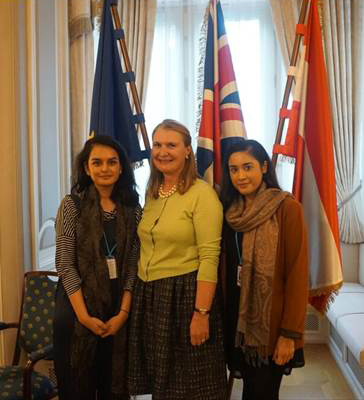 The group was especially fortunate to be entertained to a lavish tea by the British Ambassador to Austria and the UN in Vienna, HE Susan le Jeune d’Allegeershecque (left, with Farzana Lodhi, SOAS, and Habiba Akthur, Goldsmiths College London). She introduced her team of diplomats who answered the group’s questions on several topics. The programme allowed time for sight-seeing in the beautiful city and the group enjoyed a concert in the Kursalon and several good meals together.
The group was especially fortunate to be entertained to a lavish tea by the British Ambassador to Austria and the UN in Vienna, HE Susan le Jeune d’Allegeershecque (left, with Farzana Lodhi, SOAS, and Habiba Akthur, Goldsmiths College London). She introduced her team of diplomats who answered the group’s questions on several topics. The programme allowed time for sight-seeing in the beautiful city and the group enjoyed a concert in the Kursalon and several good meals together.
2015 witnesses a plethora of reports covering the UN’s initiatives in peacekeeping and peacebuilding. But have we been here before? A frustrated Hervé Ladsous, USG for Peacekeeping Operations, asserts the UN “cannot continue just using tools of 50 or 100 years ago”. But who is listening?
The first major Peacekeeping review since 2000 has been led by José Ramos-Horta of Timor-Leste, well acquainted with UN peacekeepers in his then named East Timor. His Panel identified essential shifts to be embraced if UN peace operations are to make real progress. These shifts demand UN operations must be driven by politics, be more flexible to changing needs on the ground, more inclusive and finally, the UN Secretariat must be more field-focused and its operations be more people-centred, responding to the experiences of local people. In short, the legacy of the “white -SUV culture” must give way to a more human face.
Some Member States, including many leading troop contributors, firmly adhere to the three core principles of peacekeeping; consent of the parties, impartiality; and the non-use of force except in self-defence or defence of the mandate. Others suggest that these are outmoded. This is part of the dilemma that Hervé Ladsous faces.
So can the UN avoid the need for peacekeeping, even preventing conflict in the first place? Since its creation in 2005, the Peacebuilding Commission (PBC), conceived to assume this task, is widely seen to have underperformed, even with the seven states it was charged to principally assist. Its diverse membership, representing different UN groups of Member States, seemed destined to lead to confusion, reducing it to a vague advisory role. So Ban Ki Moon tasked a group of experts to review the UN’s ‘Peacebuilding Architecture’. The group’s report has alarmed some, seeking to redesign the PBC root and branch. Claiming that the UN’s mechanisms are fragmenting thus damaging its capacity in peacebuilding, its recommendations will surely lead the Security Council to get jumpy, suspecting the General Assembly seeks to encroach onto the maintenance of international peace through the “back door” of peacebuilding. But maybe the Panel is right. Its raft of hard-hitting proposals include charging the PBC with early conflict prevention priorities (rather than the Security Council), beefing up the Peacebuilding Fund and working closely in post conflict work with the World Bank which all rate as more focused in this field than the UN. Ban Ki Moon wants both sets of recommendations implemented. This will upset members of the Security Council. Watch this space.
UNA Westminster and the Bar Council of England and Wales jointly organised a prestige diplomatic reception to mark the UN’s 70th anniversary, held in the historic Great Hall of the Inner Temple. Among the sixty embassies represented, thirty were from amongst the UN’s founder members which attended the inaugural meeting of the UN in London in January 1946. Addressing the audience of nearly three hundred, the noted international barrister Vaughan Lowe QC pointed to the many successes of the UN in the establishment of international norms, the establishment of working protocols, all underpinned by the necessity to agree a common Rule of Law. Later, he fielded questions from the audience. The event also set out to create a new network comprising members of the Young Bar Council, the Young Diplomats in London Group and our own UNA Young Professionals, each group represented by forty of their members. Each of the groups will organise one event annually to which members of the others will be invited and they will jointly arrange a dedicated social event.
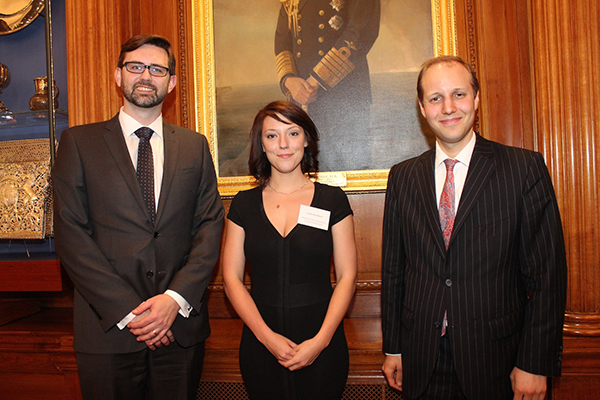
Leisha Beardmore, Chair, UNA Young Professionals is flanked by Bartosz Tymkowski, Chair, Young Diplomats in London and Daniel Sternberg, Chair, Young Bar Committee
6 August Final arrangements are being made to ensure the UNA Westminster Study Tour to Vienna provides a challenging and enjoyable experience to the twenty lucky participants. Bookings are now closed. Many UN agencies are based in the Vienna International Centre and many meetings with UN personnel will take place in this impressive building. The party will visit the UN International Development Organisation, the International Atomic Energy Agency, the Comprehensive Nuclear-Test-Ban Treaty Organisation, the UN Office of Drugs and Crime, the UN Office for Outer Space Affairs and the UN Commission on International Trade Law. They will visit the Organisation for Security and Cooperation in Europe (OSCE) and hope to attend a regular meeting of its Forum for Security Co-operation. To gain a UK perspective on the work of the UN agencies and OSCE, the party will visit the UK Missions to both the UN and OSCE.
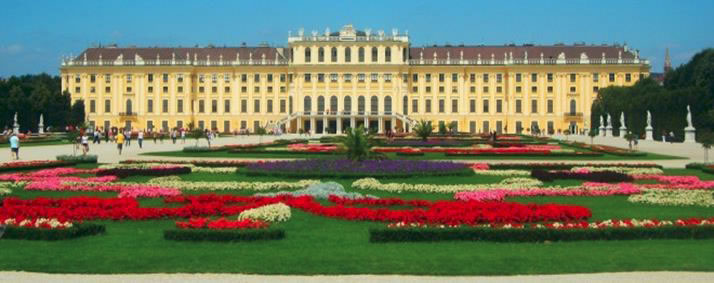
“The programme is not all work” promises David Wardrop, Study Tour party leader. “We have time to visit the many attractions in the Museum Quarter and see over the magnificent Schönbrunn Palace (above). Also we will enjoy a concert at the Wiener Kursalon. A Vienna-based student will share ideas for evening entertainment for younger members.”
Those joining the Study Tour include experienced UNA members and a number of young people, many planning careers in international affairs and development programmes. Some of these will be benefit through bursaries provided by the London and South East Region UNA Trust and UNA Westminster branch.
25 July Leisha Beardmore is to be the new Chair of United Nations Association Westminster Young Professionals. Leisha is a Gender Justice researcher with OXFAM and also advises Small Island States on environmental issues. Recently she attended the UN Climate Change preparatory conference in Bonn (picture below). She succeeds Ludre Stevens who remains an adviser to the group and a member of the Executive Committee of UNA Westminster.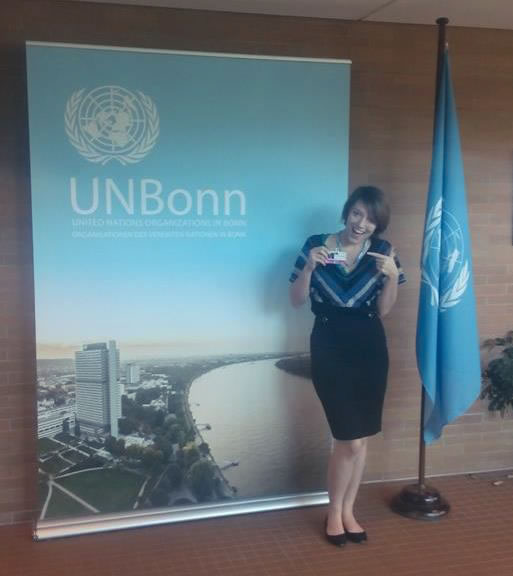
Through her Facebook page, Leisha said “I will be the first ever woman to be Chair of the group, and the first woman within Westminster to be chair for 15 years! Super excited and thrilled to have the opportunity!! I want to make it AMAZING, so I hope lots of you will want to be involved with making creative, innovative and thought-provoking ways of bringing international affairs across London.”
Leisha will be coordinating representation of the UNA Westminster Young Professionals at the Bar Council’s reception for the diplomatic community in September. She will lead discussions on cooperation with the Young Bar group and the Young Diplomats in London organisation.
UNA Westminster’s conference to mark the 70th anniversary of the nuclear era, held in association with the School of Commonwealth Studies at London University, considered the contestation over knowledge about nuclear bombs and warfare, including the impact and roles of misinformation and secrecy, from the start of the Second World War until the present day. The last 70 years have seen a number of moments – such as the Cuban Missile Crisis – when it seemed that the horror of Hiroshima would be repeated, but the key actors pulled back from the brink. Speakers explored how the UN, governments, local authorities, NGOs and campaigners performed over this period. The keynote address was given by Dr. Akiko Mikamo, both of whose parents were in central Hiroshima when the nuclear bomb exploded. Her book Rising from the Ashes: A True Story of Survival and Forgiveness from Hiroshima has been published worldwide. Other speakers from the USA, Europe and the UK expanded on their interpretation of events past and on the future.
Is Ban Ki-moon’s Panel on Hammarskjöld’s death running out of time to properly
complete its report?
I June 2015 Observers following the progress of the Hammarskjöld Panel appointed by UN S-G Ban Kimoon
to examine new information on the death of former S-G Dag Hammarskjöld in 1961 fear that it
might have to compromise its programme as its budget extends only to 30 June 2015, when it must
present its report. The Panel, with the remit of evaluating the new information for its probative value,
began its work as recently as April, thus allowing for barely three months of investigation.
The Panel members are eminent experts in highly relevant disciplines. However, observers point to key
issues which the Panel’s report might not have time to address adequately. One issue is that the Panel
needs to understand the colonial mindset and context of British-ruled Northern Rhodesia, now Zambia,
in which the original UN Inquiry of 1961-62 was conducted.
There is understandable sensitivity that in re-opening the Inquiry, the UN needs to show due recognition
of the treatment of colonised nations in Africa and of the conduct of the superpowers at the time of the
accident. A number of African eye witness accounts of aircraft movements over Ndola airport at the
time of the crash challenged official reports – and these accounts were disregarded as inherently
unreliable by the original UN Inquiry, reiterating the approach of the inquiries by the colonial
authorities. The release of various documents many years later supports their recollection. It follows
that their claims to have witnessed extraordinary sightings in the sky, dismissed at the time, should be
re-examined fully. The Panel visited Ndola to interview eye witnesses but observers worry that the Panel
will have had insufficient time to listen carefully to all witnesses, to set them in context, and to reach
any conclusions.
In addition, it is important to know whether or not the Panel is getting traction for S-G Ban Ki-moon’s
request to Member States for the release of ‘any relevant records in their possession’. The US
government has not released into the public domain relevant documentation held by CIA, NSA and the
State Department, even though these records are well over 50 years old. Nor has the UK government
released any material held by MI5, MI6 or GCHQ, even though an MI6 official was at Ndola for six days
surrounding the crash in activities relating to Hammarskjöld’s visit. Belgium, France and South Africa
may also hold relevant files, as may the UN itself. What records have the Panel seen? How
comprehensive have the disclosures been? Are those records now available to the public?
The Panel will surely not be able to write an authoritative report on the probative value of the new evidence unless all relevant documentation has been released by the countries involved.
Budgetary issues appear to be driving the UN Panel’s agenda. With only US$500, 000 to spend, its work must complete by the end of June and it is this finance-driven deadline that worries observers. In the UK, the recent conclusion of investigations into the Hillsborough football stadium tragedy of 1989 illustrates that such exercises can lead to great expenditure but, at the same time, it is important to the community that closure is both authoritative and transparent. “We owe it to the deceased, to their families and relatives, and also to the wider global community, to undertake everything possible to establish the truth. To those who insist it is a waste of time to review such events from history, we would argue that the injustice felt at the time still resonates today” said David Wardrop, Chairman of United Nations Association Westminster branch, co-ordinator of the international campaign to re-open the Inquiry. “At a time when critics of the UN System and its Member States challenge its determination to manifest the principle of transparency, it is on such issues that it and they will be judged.”
Background
The UN Panel comprises Chief Justice Mohamed Chande Othman (Tanzania), aviation specialist Kerryn Macaulay (Australia) and ballistics expert Henrik Larsen (Denmark).
Over more than fifty years, much new information has emerged. The book Who Killed Hammarskjöld (2011) by Susan Williams provides a useful guide to key documents and to rival theories and led to the setting up of the independent and international Hammarskjöld Commission, comprising distinguished retired jurists. The 2013 Report of the Commission persuaded Ban Ki-moon to seek agreement from the UN General Assembly to set up the new Panel.
For the Hammarskjöld Commission Report, see http://www.hammarskjoldcommission.org
Thirteenth annual conference and ceremony to mark International Day of UN Peacekeepers attracts record attendance
20 May 2015 UNA Westminster welcomed the participation and support of UNA-UK this year in the planning and promotion of our annual conference and ceremony to mark International Day of UN Peacekeepers.
The conference was hosted by the Royal United Services Institute (RUSI) in Whitehall. A standing room heard speakers address the challenge facing the UN Secretary-General’s High- level Independent Panel current review of peace operations. They noted that peacekeeping reform once again tops the agenda and the continuing imbalance in global peacekeeping troop and police contributions which has led some to question whether rich states, including the UK, are pulling their weight. The Folke Bernadotte Memorial Lecture was given by Major General (Ret’d) Robert Gordon, former Force Commander of the UN Mission in Ethiopia and Eritrea. An audio recording of the conference will be posted by RUSI.
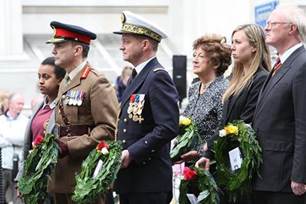
Please visit the UNA-UK's Storify here. An Instagram can be viewed here.
Images of both events, captured by the Nigerian Embassy can be viewed here.
Join our interesting visit to this important ‘UN City’, host to important UN agencies and programmes, and the OSCE. Meet and discuss their priorities and challenges.
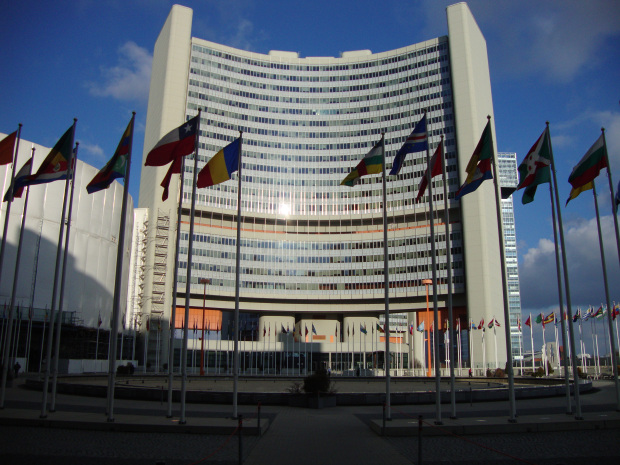
We will hold briefings with senior staff members from six UN agencies and also visit the headquarters of the Organisation for the Security and Cooperation in Europe (OSCE). We will hear about the priority issues of the UK Mission to Vienna which handles all UN agencies as well as the OSCE, in this enchanting and compact city. We will make time to explore the city also, from its Schönnbrun and Liechtenstein Palaces, its museums and concert halls to its famous cafes. Read on to learn about this exciting, informative and enjoyable programme. The cost of £425 (shared room) and £520 (single occupancy) does not include flights so you can choose and from which airport you fly from – and to. Linz and Bratislava are two attractive nearby cities to consider.
Study Tour to Vienna
To offer maximum flexibility, tour party members will travel to Vienna independently. Some will prefer to travel direct to Vienna, others may choose to fly to nearby Bratislava in Slovakia or to Linz, Austria. Travel to and from Vienna is easy from both.
We will meet up in the highly praised Hotel Magdas which is run by refugees.
Travel to the Vienna International Centre (VIC) will be by metro or by taxi for those unable to tackle the ten minute walk through the park to the metro station.
Outline programme
Sunday 4 October Arrive and register at Hotel Magdas [note 1]
Monday 5 October Morning Take sightseeing bus through Vienna
Afternoon Lunch in VIC cafeteria, then meeting with UNIDO
Evening Dinner
Tuesday 6 October Morning Meeting with IAEA, then lunch in VIC cafeteria
Afternoon Visit Schönbrunn Palace [note 2]
Evening Reception with UK Mission (TBA)
Wednesday 7 October Morning Visit UNODC, then lunch in VIC cafeteria
Afternoon Visit UNOOSA [note 3]
Into evening Visit Museum Quarter [note 4]
Evening Orchestral concert [note 5]
Thursday 8 October Morning either tour UN art or visit CTBTO, then lunch in VIC cafeteria
Afternoon Visit OSCE
Evening Formal event with City of Vienna [note 6]
Friday 9 October Morning either visit UNCITRAL or INCB, then visit city centre
Afternoon either visit peace Museum or Military Museum [note 7]
Evening Liechtenstein City Palace [note 8], then farewell dinner
Saturday 10 October Depart independently
All UN agencies are located in the Vienna International Centre (VIC)
CTBTO Comprehensive Nuclear-Test-Ban Treaty Organisation
IAEA International Atomic Energy Agency
UNODC UN Office of drugs and Crime
UNIDO UN International Development Organisation
UNOOSA United Nations Office for Outer Space Affairs
UNCITRAL United Nations Commission on International Trade Law
INCB International Narcotic Control Board
CTBTO Preparatory Commission for the Comprehensive Nuclear-Test-Ban Treaty Organisation
OSCE Organisation for Security and Cooperation in Europe (central Vienna)
How much will it cost? £425 each for a shared room, £520 for single occupancy
INCLUDES - hotel breakfasts, metro/bus ticket for tour period, visit to Schönbrunn Palace, Wiener Kursalon orchestral concert, entry to Military Museum and evening meals.
NOT INCLUDED - air flights (return flights from £116 at time of writing) or lunch in the excellent VIC cafeteria to offer maximum flexibility for diets and time for our meetings.
We hope to arrange receptions hosted by the UK Mission; the City of Vienna and the Liechtenstein family.
See notes on following page
Explanatory Notes
1 The Hotel Magdas is run by refugees and highly praised by Caritas. The nearest metro station, Praterstern, is 15 minutes’ walk and a bus can make it in 4 minutes. From there, the VIC is reached in 4 minutes. *Taxis are easily arranged.
2 Direct to the Schönbrunn Palace (below) by metro, then 10 minutes’ walk to entry.
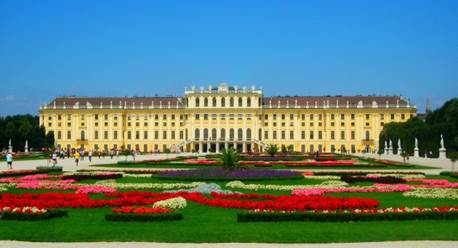
3 Our visit coincides with World Space Week which might influence the programme.
4 Tour members can choose from the many museums here and pay for their preferred options.
5 The Salonorchester "Alt Wien" performs Viennese favourites in the Wiener Kursalon (below), one of the city’s most beautiful concert venues.
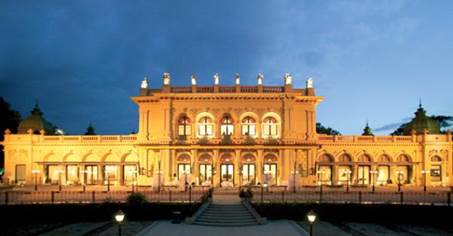
6 We hope to mark Austria’s 60th anniversary as a UN member.
7 See Archduke Ferdinand’s car and bloodstained jacket! Or choose where you want to visit.
8 We will visit the extraordinary, baroque Liechtenstein City Palace (below) owned by the princely family of Liechtenstein.


Organised jointly with the Institute of Commonwealth Studies, School of Advanced Study, University of London Conference to mark the 70th anniversary of the atomic age which has overshadowed humanity
16 July 2015
10am to 5.30pm
_______________________
The Chancellor's Hall
Senate House, University of London
Malet Street, London WC1E 7HU
The decision taken 70 years ago to use untried technology to speed the end of the war introduced Hiroshima and Nagasaki to the international lexicon. “Yesterday we clinched victory in the Pacific, but we sowed the whirlwind" wrote Hanson Baldwin in the New York Times. That whirlwind touched all humanity, redefining fear, fuelling misinformation and secrecy and encouraging denial. It led to unlikely alliances of nations, some of these of sworn enemies and others joined only by that new fear borne of inability to imagine their own worlds after another Hiroshima and Nagasaki.
Over these years, efforts have been made to return us from the brink, to wind back from only minutes to midnight, the hands of the historic Doomsday Clock. From the chambers of the United Nations where states, the powerful and the powerless, have sought to drive the narrative, from regions, towns and individuals, people have cried out for rational debate. This most dangerous period in the ascent of humankind has been variously recorded but can we now assemble the facts into a coherent historical record?
The conference will consider the contestation over knowledge about nuclear bombs and warfare, including the impact and roles of misinformation and secrecy, from the start of the Second World War until the present day. The last 70 years have seen a number of moments – such as the Cuban Missile Crisis – when it seemed that the horror of Hiroshima would be repeated, but the key actors pulled back from the brink. This will be explored, as well as efforts by campaigners and the UN to prevent such a great catastrophe. A concluding Round Table will provide an opportunity to review where we are now, and where we are going.
Register here: £20 and £10 (students and concessions)
Refreshments and post-conference reception included
PROGRAMME
0930 Registration
1000 Session 1 After Hiroshima: redefining fear, living in denial
Chair: Professor Philip Murphy, Director, Institute of Commonwealth Studies,
School of Advanced Study, University of London
Professor Peter Kuznick, Professor of History, Director, Nuclear Studies Institute, American University, Washington
"The 'Greatest Thing in History' or the Most Reckless? Reflections on the 70th Anniversary of the Atomic Bombings of Hiroshima and Nagasaki”
Professor Matthew Jones, Department of International History, London School of
Economics and Political Science
“The legacies of Hiroshima for US-Asian relations in the early Cold War”
1050 Q and A
1120 Coffee
1140 Session 2 Back from the Brink – So Far
Chair: David Wardrop, Chairman, United Nations Association Westminster Branch
Andreas Persbo, Executive Director, Verification Research, Training and Information Centre (VERTIC)
“Recognising the dangers: nuclear states agree new rules” TBC
Bruce Kent, Vice-President, Campaign for Nuclear Disarmament
“Opposition voices, national and international”
1230 Q and A
1300 Keynote address
Chair: Professor Henning Melber, Director Emeritus, Dag Hammarskjold Foundation, Uppsala
Dr. Akiko Mikamo, President, US-Japan Psychological Services, author of Rising from the Ashes: A True Story of Survival and Forgiveness from Hiroshima
“Rising from the Ashes - Under and Beyond That Mushroom Cloud”
1330 Q and A
1400 Lunch
1500 Session 3 What is the historical record? The contestation over truth
Chair: Dr John Y. Jones, Director, Voksenåsen Networkers South, Oslo
Dr Susan Williams, Senior Research Fellow, Institute of Commonwealth Studies, School of Advanced Study, University of London
“Blank pages of history: Congolese uranium and the Manhattan Project”
Dr Walt Patterson, Associate Fellow, Chatham House, Founding Member, International Energy Advisory Council, Visiting Fellow Science Policy Research Unit, University of Sussex
“Whose history? The nuclear kaleidoscope”
1550 Q and A
1620 Tea
1645 Round Table
Chair: Professor Mary Kaldor, LSE (invited)
Dr. Knox Chitiyo, Associate Fellow, Africa Programme, Chatham House
Professor Peter Kuznick , American University, Washington
Andreas Persbo , Executive Director, VERTIC
1750 Open discussion
1820 Ends
The traditional diplomatic community wreath-laying ceremony will take place at the Cenotaph at 1pm. The Ceremony prayers will be given by former Bishop of Oxford, Lord Harries and Shaykh Ibrahim Mogra, a leading Imam from Leicester. The Band of the Brigade of Gurkhas (below) will provide musical support. All are welcome.

16 April 2015 UNA Westminster welcomes news that the independent panel of experts to examine new information that has emerged on the death of Hammarskjöld has commenced its work. The panel comprises Mr. Mohamed Chande Othman (United Republic of Tanzania) as Head of the Panel; Ms. Kerryn Macaulay (Australia); and Mr. Henrik Larsen (Denmark).
The panel has been given until 30 June to examine and assess the probative value of all new information. It is hoped that the panel’s work will benefit through the release by Member States of any relevant records in their possession. The principal source document for the panel’s work will be the Report of the Hammarskjöld Commission (see below) which is underpinned by a great amount of supportive material, already submitted to the panel.
Further independent analysis of records of aircraft movements over the critical hours of the time of the crash of Dag Hammarskjöld’s plane continues. Efforts to dispel suggestions of conspiracy and foul play causing the crash have been hindered by contradictory evidence on this issue when presented to the initial official Inquiries.
UNA Westminster urges all who believe they can contribute useful information to help the panel to do so. Even though for decades, fanciful theories may seem to have exhausted any further options, the gradual release of archives by several governments has cast new light on the matter. But despite the request by the UN Secretary-General for the release by Member States of any relevant records in their possession, UNA Westminster remains concerned that this request will not be honoured. We await the report of the panel.
To follow developments so far, please use this excellent Timeline provided by the UN’s Dag Hammarskjöld Library. This includes the Report of the Hammarskjöld Commission.
In delivering the 13th Ruth Steinkraus-Cohen International Law Lecture, in the Brunei Gallery Lecture Theatre at SOAS, Dr Ahmed Shaheed, UN Special Rapporteur on the Situation of Human Rights in the Islamic Republic of Iran, set out his proposals for strengthening the UN Special Procedures and the Implementation of International Human Rights Law.
Kofi Annan has called the UN Special Procedures system the "crown jewel" of the UN’s human rights machinery. Seventy nine experts report on 50 procedures covering a wide range of thematic issues and focus on a number of countries of concern. These mechanism were not envisaged in the UN charter, emerging in response to egregious human rights violations. However, the system is under stress from political pressure within the UN Human Rights Council and also through severe resource constraints and deficits in the mainstreaming of human rights.
Dr Shaheed will argue for greater use of the special procedures system, including closer integration into the Rights Up Front framework proposed by Ban Ki moon in 2013 and formulated in the aftermath of the civil war in Sri Lanka when an Internal Review Panel characterized the UN’s conduct as demonstrating systemic failure to protect human rights. It identified the problems with priorities, flow of information and communication, capacity and inadequate responses: somewhat similar to the kinds of mainstreaming deficits that many special procedures complain about.
Also, he proposed that greater resources be spent on processing communications in the human rights system: right now, the OHCHR accepts petitions in only three languages, and the bulk of the complaints received are not even officially logged into system--- a function of serious staff shortage. More transparency in country responses to communications can also be attained, and this has in fact being done recently. He agreed with Professor Michael O’Flaherty that the funding situation of OHCHR is a global scandal: it gets about 3% of the UN’s regular budget and the total budget of the OHCHR at around 295 million dollars is far less than the budget of Amnesty International. Clearly, the third pillar of the United Nations need to look more like a pillar than a stump.
Dr Shaheed is also the Chairperson of the Geneva-based international human rights think-tank, Universal Rights Group. He was Foreign Minister of the Maldives from 2005 to 2007 and from 2008 to 2010, and led the country’s efforts to sign and ratify the major international human rights Conventions and related optional protocols, and to implement them in law and practice.
The complete text of Dr Shaheed’s address is posted here
See here for information on Dr Shaheed’s work
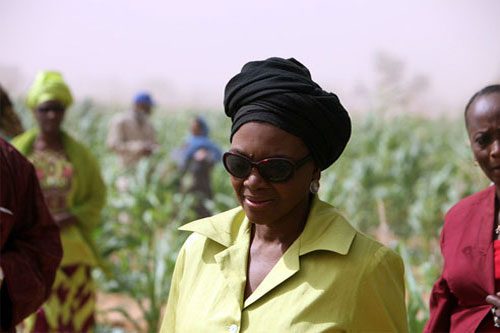
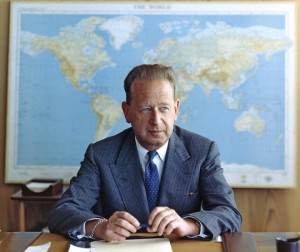
The School of Advanced Study at the University of London has now published a helpful short blog with the above title written by Hans Melber and David Wardrop. This chronicles events from the launch of the book Who killed Hammarskjöld? by Susan Williams to the creation of the Hammarskjöld Commission, the publication of its Report and the international campaign led by UNA Westminster Branch to secure support in the UN General Assembly to re-open the Inquiry into the then Secretary-General’s death.
30 December The UN General Assembly has by consensus of all 193 nations adopted a resolution to re-open the Inquiry into the death of former Secretary-General Dag Hammarskjöld. The resolution requests Ban Ki-moon to appoint an independent panel of experts to examine new information and to assess its probative value and encourages Member States to release any relevant records in their possession and to provide to the Secretary-General relevant information.
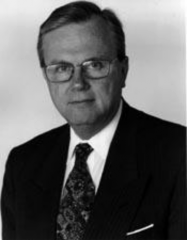
Following the General Assembly’s decision, two members of the Hammarskjöld Commission[1] have commented on developments. Ambassador Hans Corell (left), formerly Under- Secretary-General for Legal Affairs and Legal Counsel of the United Nations, was interviewed on the Swedish Radio NewsChannel, P1 Morgen. (Mr Corell inaugurated UNA Westminster’s annual Ruth Steinkraus-Cohen International Law lecture series, in 2003). Also, Justice Wilhelmina Thomassen, who served as a judge of the European Court of Human Rights in Strasbourg, was interviewed on Netherlands Radio.
Recent media coverage worldwide includes the authoritativecontribution by Claudia Antunes who reports for the Brazilian journal PIAUÍ. Joe Lauria, Wall Street Journal, who has followed the story closely since the publication of the Report of the Hammarskjöld Commission in September 2013, contributed his article on 29 December (WSJ subscribers only).
[I] Members of the Hammarskjöld Commission
The Rt Hon. Sir Stephen Sedley (Chair), UK
Ambassador Hans Corell, Sweden
Judge Richard Goldstone, South Africa
Justice Wilhelmina Thomassen, Netherlands
For the Report, see http://www.hammarskjoldcommission.org
For News Updates on this matter, see www.humanrights2008.org.uk
The UN General Assembly heard Sweden’s Ambassador Per Thöresson introduce a draft resolution on investigation into the conditions and circumstances resulting in the tragic death of Dag Hammarskjöld and those on board his flight. He stated that he spoke with the support of Argentina, Australia, Austria, Denmark, Ecuador, Egypt, Finland, Ghana, Iceland, Ireland, the Republic of Korea, Lebanon, Liechtenstein, Monaco, Myanmar, the Netherlands, Norway, Peru, South Africa, Zambia as well as Sweden.
He stated that ‘Hammarskjöld’s tenure, marked by vision and pragmatism, paved the way for policy and practices that have been mainstreamed and consolidated in ways that we now take for granted. Hammarskjöld promoted the integrity and independence of the United Nations and of the Secretary-General, ideals nowadays rarely questioned, and of crucial importance as the UN has expanded into a near-universal membership. He conceived the concept of preventive diplomacy, and set ground-breaking examples for the Secretary-General’s direct diplomatic engagement.’
He referred to General Assembly resolution 1759 (XVII) of 26 October 1962 which considered the UN inquiry’s report of the crash and requested the Secretary-General to inform it of any new evidence relating to the disaster. Following Ban Ki-moon’s recognition of such as provided by the Hammarskjöld Commission, and his suggestion that the General Assembly consider three different options to examine this, Mr Thöresson tabled a brief draft resolution with three operational elements. One, it requests the Secretary-General to appoint an independent panel of experts to examine new information and to assess its probative value. Two, it encourages Members States to release any relevant records in their possession and to provide to the Secretary-General relevant information related to the death of Dag Hammarskjöld and of the members of the party accompanying him, and three, it requests the Secretary-General to report on the progress made to the General Assembly at its 70th session. In his speech, the ambassador thanked several Member States, especially Zambia*.
The financial implications of the resolution will be considered by the Fifth Committee later this week.
[* Mama Chibesa Kankasa, a witness to events at the time of the accident and later, a member of Zambia’s Central Committee in Charge of Women's Affairs, referred to UNA Westminster’s campaign in her powerful supportive letter to her country’s Foreign Minister.]
For News Updates on this matter, see www.humanrights2008.org.uk
5 December The Rt. Hon. Jeremy Thorpe PC, a Westminster Branch Vice-President, died on 4 December. Mr Thorpe, former leader of the Liberal Party and a committed internationalist, had served the United Nations Association as Chairman and later, chaired its Political Committee. During his tenure, he steered it through a difficult period as it sought both new premises and added income. His strong leadership was tested when UNA, seeking new premises, embarked on a potentially damaging lease arrangement. Mr Thorpe managed to extract it from this and secure the current premises at 3 Whitehall Court, close to the National Liberal Club with which he was closely associated. In 1979, in the closing weeks of the Labour government, he urged the Foreign Secretary, David ((now Lord) Owen, to authorise a grant to UNA of £24,000, the maximum that could be given without recourse to parliament. Owen agreed and the grant continued, bitterly resented by the incoming government, for more than twenty years.
Mr Thorpe accepted the invitation to serve as a Vice President of UNA Westminster in 1985. His advice on international issues, especially relating to southern Africa was always welcomed. He worked tirelessly with colleagues in South Africa to establish factories to design and manufacture low-cost housing, an imperative for the immediate post-Apartheid government.
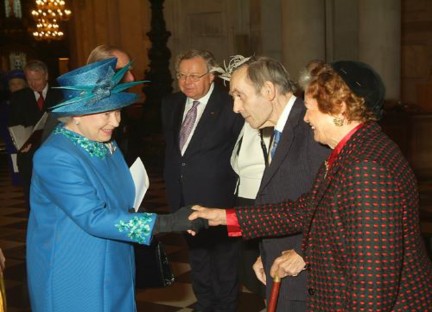
1 The Queen with Jeremy and Marion Thorpe and, behind, Sir Patrick Cormack, following the service at St. Paul’s Cathedral to mark the 60th anniversary of the United Nations
In 2005, he proposed to the branch’s Executive Committee that the UN’s 60th anniversary should be marked by a service in Westminster Abbey as had been the case for its 50th anniversary. The Dean refused, stating ‘we don’t do 60s’ although later he did authorise the service to mark the 60th anniversary of the end of World War 2. However, the Dean of St Paul’s Cathedral had no such qualms enabling Mr Thorpe, Sir Patrick (now Lord) Cormack, a West- minster branch member, and Branch Chairman David Wardrop to seek
funding for and to organise the event. The branch was delighted when HM the Queen agreed to attend the service on Sunday 24 October, United Nations Day. The Cathedral was full and the congregation included the Diplomatic Corps, Mayors, Lord Lieutenants and members of both Houses of Parliament who heard lessons read by HRH the Duke of Edinburgh and Prime Minister Tony Blair. Later, a tea party for 400 was held in the Cathedral Crypt. Photos of the service and complete details of those who attended can be found on the Westminster branch website, See What we do/Branch events/2005.
UNA Westminster has joined the ‘One for Seven Billion’ Campaign which advocates a more transparent selection process for the post of UN Secretary-General than that used to date. The campaign is co-ordinated by UNA UK and other leading UK NGOs and has been well-received. As UNA UK states, “seven billion people across the world are affected by his or her decisions. That's why choosing the best Secretary-General for the United Nations is so important.”
UNA Westminster is concerned the campaign does not extend to cover appointments for other top UN posts. Whilst we welcome the intention of the UN Department of Management (UNDM) to extend the scope of Senior Managers’ Compacts (2006) to include such posts, the call for transparency within the UN system has yet to be fully heeded and implemented. The Report of the UN Joint Inspection Unit (UNJIU) titled Transparency in the selection and appointment of senior managers in the United Nations Secretariat (2011) states:
para 69 the Secretary-General insists that the interview panel should submit to him a choice of at least three candidates for any position, at least one of whom is a woman. If this is not the case, he will return the proposed list and ask for a new search .
para 81 the Secretary-General recognises the political realities that he must reflect in the Organization, but that no position is reserved for any Member State. In the event that the Secretary-General decides that a national of a certain country will be appointed, he insists that that country provide him a slate of candidates for consideration. If he is not provided with a choice, he cannot select, and therefore, he will request new nominations.
para 82 The requirements of para 3(e) in GA resolution 46/232, whereby it decided that as a general rule, no national of a Member State should succeed a national of that State in a senior post and that there should be no monopoly on senior posts by nationals of any State or group of States, should be satisfied.
The matter is immediate as Baroness Valerie Amos (UK), UN USG for Humanitarian Affairs & Relief Coordination, will retire early next year. It is reported that although Ban Ki-moon has requested our Prime Minister to submit the required shortlist of three names, he has submitted only that of Andrew Lansley MP. It is clear that the correct procedure has not been followed and Ban Ki-moon should adhere to the thrust of his statements made to the UNJIU. UNA Westminster has noted remarks made by Lord Malloch Brown, former UN Deputy Secretary General and Mark Goldring, Chief Executive of Oxfam who cite Mr Lansley’s lack of experience and qualification in this area.
Therefore UNA Westminster urges the ‘One for Seven Billion’ campaign to propose that the British government should set an example to other P5 States by supporting the principle of Ban Ki- moon’s statements as reported by the UNJIU and forego any assumed legacy right to submit nominations to succeed Valerie Amos; also to urge fellow P5 states to act similarly; and to urge the UN Secretary-General to make clear his intention to encourage transparency for all UN appointments. Without such an initiative linked to it, the ‘One for Seven Billion’ campaign may be seen by some as hypocritical; ‘one rule for us and another for the rest of you.’
Leading individuals from fifteen countries, many having served the United Nations in senior positions, urge the UN General Assembly to re-open the UN inquiry of 1961-62 into the cause of the death of former UN Secretary-General Dag Hammarskjöld in 1961, under the terms set out in UN Resolution 1759 (XVII) of 26 October 1962.
UN Secretary-General Ban Ki-moon has suggested the General Assembly may wish to consider three options in pursuing the matter further. The Hammarskjöld Commission advocates a new or reopened UN inquiry, to focus on where they have advised the key probably lies - the records of the National Security Agency of the USA.
The text of the letter is here.
A briefing prepared by the United Nations Association Westminster Branch is here.
Media contact:
David Wardrop, Chairman, United Nations Association Westminster Branch
Tel: +44 207 385 6738
E-mail: davidwardrop6@gmail.com
8 November Stefano Pietrocola’s film about Hector, a British photojournalist, covering the Bosniain war in the ‘90s took all three audience awards at the opening event of the 2014 We the Peoples film festival. These were for Best Film, Best Director and Best Actor. Stefano was present to receive the Best Film and Best Director awards and Jimmy Tihovsi accepted the Best Actor award on behalf of Lee Hart who played the role of Hector. The other films screened in the Short Film programme were Shame and Glasses and Starry Eyes.
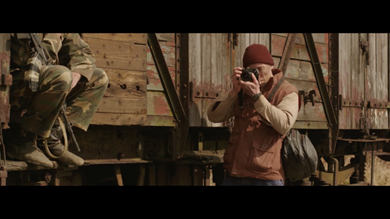 The Youth Day at the BFI also featured the popular #tweetapitch competition which awards a £500 bursary to a young film-maker together with an invitation to screen the completed film at the following year’s We the Peoples Youth Day at the BFI. This year, Jade Jackman won with her proposal to cover the work of a Kabul-based Afghan woman graffiti artist. Proposals by Yiman Lin and Ben Daniels were highly praised by the judges and both were invited to visit the BFI for further discussions.
The Youth Day at the BFI also featured the popular #tweetapitch competition which awards a £500 bursary to a young film-maker together with an invitation to screen the completed film at the following year’s We the Peoples Youth Day at the BFI. This year, Jade Jackman won with her proposal to cover the work of a Kabul-based Afghan woman graffiti artist. Proposals by Yiman Lin and Ben Daniels were highly praised by the judges and both were invited to visit the BFI for further discussions.
Masterclasses were led by Rob Brown and Jake Hume whose film Sixteen was also screened and by film animation guru Helen Piercy as well as award-winning director Adeyemi Michael who presented a practical workshop on the art of documentary filmmaking. Iyare Igiehon hosted the Awards presentations which were followed by a reception. “It was a great day” said Vivienne Eka, Festival Director, “The young people learned a lot about film-making and also about the work of the United Nations. Our special thanks go to Noel Goodwin and Matt Cuzner, our hosts at the BFI.”
The We the Peoples Film Festival is an annual Flagship Project of UNA Westminster Branch and continues to 24 November. Please see here for the programme.
31 October UNA Westminster has registered as a Supportive Entity of the Human Rights at Sea International Initiative which has been independently developed for the benefit of the international community, including the maritime industry, for matters and issues concerning human rights in the maritime environment. The initiative is led by David Hammond of 9 Bedford Row International who delivered UNA Westminster’s 12th Ruth Steinkraus-Cohen International Law Lecture.
 “We welcome this important initiative which seeks to establish clear rules of engagement for flag States, ship owners, shipping associations, charterers, insurers, ship managers and agents, Private Maritime Security Companies and others. Also, the current indecision shown by European states on how to address the plight of refugees in danger of drowning in the Mediterranean reminds us of the expected adherence to the humanitarian obligations of ships’ captains” said David Wardrop, Chairman.
“We welcome this important initiative which seeks to establish clear rules of engagement for flag States, ship owners, shipping associations, charterers, insurers, ship managers and agents, Private Maritime Security Companies and others. Also, the current indecision shown by European states on how to address the plight of refugees in danger of drowning in the Mediterranean reminds us of the expected adherence to the humanitarian obligations of ships’ captains” said David Wardrop, Chairman.
For several years, UNA Westminster has mentored and worked closely with World G18 Somalia, the UK’s leading apolitical Somali diaspora group. We have followed closely successive failures by the UN and the international maritime authorities to agree clear guidelines for the maritime community. UNA Westminster advised World G18 Somalia in its submission of evidence to the House of Commons Foreign Affairs Select Committee during its session examining piracy off the Somalia coast[1]. At the time, we were appalled by the state of confusion in which interested parties had to operate and the subsequent impact this had on impoverished Somali coastal communities. We are pleased that World G18 Somalia will also be supporting the Human Rights at Sea International Initiative.
For more information on the Human Rights at Sea Initiative, see here.
[1] See World G18 Somalia, News item, 5 January 2012
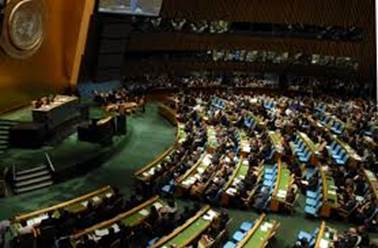 UNA Westminster is pleased to note that the Report of the Hammarskjöld Commission will now be debated by the UN General Assembly on Monday 15 December (Agenda Item 128).
UNA Westminster is pleased to note that the Report of the Hammarskjöld Commission will now be debated by the UN General Assembly on Monday 15 December (Agenda Item 128).
The position of UNA Westminster Branch in this matter was clarified by David Wardrop, Chairman, in our News Report (28 July). He stated “We are determined to support the principle of transparency within the UN system. To those who insist it is a waste of time to review such events from history, we would argue that the injustice felt at the time still resonates today. This relates to the role of the UN, to the treatment of colonised nations in Africa, to the conduct of the superpowers and also of multi-nationals.” To assist interested UN Member States prepare for the General Assembly debate, UNA Westminster held a briefing on 28 July in the House of Lords for diplomats from interested States. These included those from States whose troops served with ONUC in 1961; those whose troops are serving in the D.R.C. today with MONUSCO; members of the UN Security Council and those African States which have attained independence since 1961.
UNA Westminster has now informed ambassadors and high commissioners representing UN Member States in the above groups of the scheduled General Assembly debate.
Members of the Hammarskjöld Commission:
The Rt. Hon. Sir Stephen Sedley, UK (Chair), former Lord Justice of Appeal
Ambassador Hans Corell, Sweden, former UN Under-Secretary-General for Legal Affairs
Justice Richard Goldstone, South Africa, former judge of the Constitutional Court of South Africa and Chief Prosecutor of the UN International Criminal Tribunals
Justice Wilhelmina Thomassen, The Netherlands, a former judge of the European Court of Human Rights and of the Supreme Court of The Netherlands.
Scroll down here for the Briefing Note (28 July)
28 July 2014
House of Lords, London Briefing for members of the Diplomatic Corps
How should the United Nations tackle the
2013 Report of the Hammarskjöld Commission?
Earlier this year, United Nations Secretary-General Ban Ki-moon said it was his duty to ask the General Assembly to put on its agenda the issue of the death of second Secretary-General Dag Hammarskjöld. ‘The unparalleled service and sacrifice of Dag Hammarskjöld and his legacy within the United Nations and beyond,’ he asserted, ‘compels us to seek the whole truth of the circumstances leading to his tragic death and that of the members of the party accompanying him.’
Ban Ki-moon made this statement after studying a report released in 2013 by the Hammarskjöld Commission – four retired jurists of the highest calibre and repute from different countries, working as a voluntary body, wholly free of any national or financial interests. They had examined the available evidence and concluded that the matter justifies further and fuller investigation. http://www.Hammarskjöld commission.org/report/
What is the background to Ban Ki-moon’s decision?
This document offers a short briefing for the diplomatic community, to facilitate advice to Governments and UN-based colleagues.
***
Flying on a UN mission to try to bring peace to the Congo, Dag Hammarskjöld’s plane crashed near Ndola airport in the British protectorate of Northern Rhodesia (now Zambia) on the night of 17-18 September 1961. All but one of the passengers and the Swedish crew were killed. The tragedy sent shock waves round the globe. The crash occurred eight months after the assassination of Patrice Lumumba, the first democratically-elected Prime Minister of the Congo, and in the context of a conflict in which UN troops from 30 nations were serving as a peacekeeping force in the Congo.
Questions were asked as details of the crash emerged. A number of local witnesses said they had seen a smaller plane near Ndola attack a larger one that night; there was one survivor, Harold Julien, who spoke of ‘sparks in the sky’ and said the plane 'blew up'. The late Knut Hammarskjöld, Dag’s nephew, who went to Ndola immediately after the crash, suspected foul play.
Three inquiries into the cause of the crash were conducted in 1961-62: two Rhodesian inquiries and one by the United Nations. The first Rhodesian inquiry was unable to determine a specific cause; and the second Rhodesian inquiry identified pilot error as the cause of the crash, on the basis of an elimination of other suggested causes. The UN inquiry delivered an open verdict, saying it was unable to rule out sabotage or attack; this prompted the General Assembly to pass resolution 1759 (XVII) of 26 October 1962, which requires the Secretary-General to inform the General Assembly of ‘any new evidence which may come to his attention’.
It has emerged that a mass of evidence relating to the crash and to Hammarskjöld’s death was concealed. The inquiries were conducted under particular circumstances, created by the reality of British colonial society in central and southern Africa. Among many of the whites of Northern and Southern Rhodesia, perceptions of what happened that night were influenced by their fear of African nationalism and their distrust of the UN, because of its efforts to help bring about majority rule and democracy.
In the early 1990s Ambassador Bengt Rösiö was asked by the Swedish Foreign Ministry to investigate Hammarskjöld’s death. His report in 1993 concluded that the pilot made an error in judgement regarding altitude. In 2012, however, following the release of photographs of Hammarskjöld after death, he cast doubt on this conclusion. http://www.aftonbladet.se/nyheter/article15451687.ab
In the 53 years since the crash, a number of public figures, UN officials, historians and others have put a range of evidence and analysis into the public domain. In 2011, a University of London historian Susan Williams published Who Killed Hammarskjöld?, arguing the case for a fresh inquiry. Knut Hammarskjöld backed her case: http://www.theguardian.com/world/2011/sep/16/dag-Hammarskjöld -call-for-new-inquiry
This triggered an initiative by Lord Lea of Crondall to set up a new inquiry in accordance with UN Resolution 1759 (XVII); he was joined among others by Professor KG Hammar, former Archbishop of the Church of Sweden, HE Chief Emeka Anyaoku, the former Commonwealth Secretary-General; and Lord Marks of Henley-on-Thames QC. A major donation was given by the renowned Swedish novelist Henning Mankell.
An independent body of distinguished senior jurists was set up, known as the Hammarskjöld Commission:
The Commission’s remit was to determine, on the basis of the evidence available, whether there was a case for re-opening the UN Inquiry of 1961-62, under the terms set out in UN Resolution 1759 (XVII) of 26 October 1962: http://www.Hammarskjöld commission.org/background/
The Commissioners worked pro bono and were assisted gratis by many experts and organisations. They reviewed a range of evidence and uncovered new material; Sir Stephen and Justice Goldstone went to Zambia to interview key informants.
On 9 September 2013, the Commission concluded its work and released a report. It asked, ‘does significant new evidence about Dag Hammarskjöld’s death exist?’ and gave a clear answer – ‘Undoubtedly it does’. ‘There is persuasive evidence,’ argued the report, ‘that the aircraft was subjected to some form of attack or threat as it circled to land at Ndola.’ It recommended the UN conduct a further investigation, with a particular focus on the declassification of intercept records held by the US National Security Agency (NSA) –‘confirming or refuting, from intercept records, the evidence indicating that the descent of the Secretary-General’s plane was brought about by some form of attack or threat. Such records appear, on the evidence currently available, to be held, if anywhere, in the United States.’
The Commission made a Freedom of Information (FOI) request to the National Security Agency for such intercept records, which was refused. The Commission then appealed, but this was denied on grounds of exemption from the FOI Act (although there are specific examples of previously released intercept documents from the 1950s and 1960s: https://nsarchive.wordpress.com/2014/07/16/nsa-refuses-to-release-documents-on-mysterious-death-of-un-secretary-general-over-50-years-ago/).
***
The Hammarskjöld Commission’s report was presented to the UN in September 2013 and Secretary-General Ban Ki-moon said he would ‘closely study the findings’.
His response was affirmative. It was his assessment that the documentation presented by the Hammarskjöld Commission included new evidence. In February 2014, Ban Ki-moon asked the General Assembly to put the Commission’s report on its agenda:
http://www.un.org/ga/search/view_doc.asp?symbol=A/68/232
In March, he called on Member States ‘to declassify any relevant records in their possession’. It is possible that relevant records may be held by the USA, UK, Sweden, Belgium, South Africa and possibly others. http://www.un.org/en/ga/search/view_doc.asp?symbol=A/68/800
Ban Ki-moon set out to the General Assembly three options for a further inquiry:
“given the possibility that the new evidence already in the possession of the Secretary-General may lead to a conclusive finding about the current theories of the causes of the crash of the former Secretary-General’s plane, the General Assembly may wish to consider the following options:
(a) To establish an independent panel of experts, including forensic and ballistics experts, to examine the new evidence, to assess its probative value and to make recommendations to the General Assembly;
(b) To reopen the 1961-1962 Inquiry; or
(c) To establish a new inquiry.”
In the view of the Hammarskjöld Commission, it would be a mistake for the UN to take up option 1, which would cover ground already covered. They advocate a new or reopened UN inquiry, to focus on where they have advised the key probably lies - the NSA's records.
UNA Westminster organised this Briefing for diplomats in London, the base of both the Hammarskjöld Commission and its commissioning Trust so that, if requested, they can report to their governments and UN-based colleagues with confidence. We invited diplomats from states whose troops served with ONUC in 1961 and those whose troops are serving with MONUSCO today; members of the UN Security Council; those African States which have attained independence since 1961, many involved in some way with the aftermath of the Congo crisis; and selected others. We believe all are responsible for respecting the invitation left open by their predecessors through UN General Assembly Resolution 1759 (XVII) of 26 October 1962.
The We the Peoples Film Festival has launched its 9th programme of independent new films to be screened in eight venues across London. The festival is a project of the United Nations Association Westminster Branch and its programming follows themes which underpin the Three Pillars of Freedom set out by the United Nations; freedom from want, freedom from fear and the freedom to live in dignity. Each film selected links to one of these UN Pillars of Freedom.
The popular Young Peoples Day hosted by the BFI Southbank will open the festival on Saturday 8 November. This free event attracts those in the 15-25 age group, offering master-classes and the opportunity to enter the #tweetapitch competition for a £500 bursary towards making a new film, to be screened at next year’s festival. The programme includes the new British film Sixteen (dir: Rob Brown) which follows former Congolese child soldier, 16 year-old Jumah, as he seeks to build a new life in London.
Ravensbourne University in Greenwich will screen A Russian Fairytale which faithfully follows the mixed up lives of street kids in Perm. Director Jake Mobbs, highly praised by veteran Russian filmmaker Andrei Smirnov, will join the audience for a post screening Q and A. The Platform Bar in London Fields E8, will premiere Voices across the Wall (dir: Sam Liebmann) along with Happiness wrapped in a Blanket (dir: Josi Artzi). Both directors will attend the screening. The Water Poet, the popular pub inSpitalfields, will screen a selection of films on children’s issues.
University College London, Bloomsbury will host a mini-festival of short films and screenings are also scheduled for the London School of Economics (LSE), the School of Oriental and African Studies (SOAS) and the College of North West London. The complete programme with news of those who will participate in the popular post-screening Q and A sessions will be posted on the Festival website at www.wethepeoples.org.uk
Festival contacts
Director Vivienne Eka info@wethepeoples.org.uk
Co-ordinator Karin Pointner karin@eventcourse.com
Administrator David Wardrop davidwardrop@bulldoghome.com
Tel: 0207 385 6738 / 07932 664335
 “We made sure each group of four or five flyers comprised a mix of faiths –or none, and different ethnic origin.” said David Wardrop, UNA Westminster Chairman. “After check-in at the Greenwich Peninsula Prayer Space, groups took off for the north side and then took tea and biscuits at the nearby Crowne Plaza Hotel. Our fears that some flyers might not get on with each other and choose an early flight back were unfounded. In fact, we had to call time on them all ninety minutes later than planned! We were delighted.”
“We made sure each group of four or five flyers comprised a mix of faiths –or none, and different ethnic origin.” said David Wardrop, UNA Westminster Chairman. “After check-in at the Greenwich Peninsula Prayer Space, groups took off for the north side and then took tea and biscuits at the nearby Crowne Plaza Hotel. Our fears that some flyers might not get on with each other and choose an early flight back were unfounded. In fact, we had to call time on them all ninety minutes later than planned! We were delighted.”  Flights for Peace was one of several events co-ordinated by the London Boroughs Faith Network (LBFN) to mark the UN International Day of Peace. The London Peace Conference held at St Ethelburga’s Centre was a sell-out and over the weekend, churches, mosques and synagogues opened their doors to all-comers. UNA Westminster has worked closely with the LBFN since the London Olympic Games in 2012. See News Item, 16 August 2012 and What we do, event reports/2012.
Flights for Peace was one of several events co-ordinated by the London Boroughs Faith Network (LBFN) to mark the UN International Day of Peace. The London Peace Conference held at St Ethelburga’s Centre was a sell-out and over the weekend, churches, mosques and synagogues opened their doors to all-comers. UNA Westminster has worked closely with the LBFN since the London Olympic Games in 2012. See News Item, 16 August 2012 and What we do, event reports/2012.
 “UNA Westminster welcomes the bold words of UN Secretary-General Ban Ki-moon in describing the attack on a UN-run school in Gaza as "a moral outrage and a criminal act". Each year, we mark the International Day of UN Peacekeepers with the first wreath laid in memory of Count Folke Bernadotte, the UN’s first mediator in Palestine, who was assassinated in 1948. Those who killed him failed to bring peace as have all subsequent military initiatives by Israel and others.
“UNA Westminster welcomes the bold words of UN Secretary-General Ban Ki-moon in describing the attack on a UN-run school in Gaza as "a moral outrage and a criminal act". Each year, we mark the International Day of UN Peacekeepers with the first wreath laid in memory of Count Folke Bernadotte, the UN’s first mediator in Palestine, who was assassinated in 1948. Those who killed him failed to bring peace as have all subsequent military initiatives by Israel and others.
As European nations mark the centenary of the start of the mistakenly called ‘war to end all wars’, we reflect that a lasting peace needs more than military victory. That peace will only come about through the recognition of the principle of justice for all and the acceptance and implementation of norms of international law.
For a month, we have watched helplessly the suffering endured by innocent people in Gaza and welcome the latest truce to end a conflict which surely has now reached stalemate.
UNA Westminster welcomes the call by French Foreign Minister Laurent Fabius for a political solution to the crisis to be "imposed" by the international community. We urge HMG and all parties to show similar resolve and to deploy their political and diplomatic pressure to force Hamas and the Israel government to honour the new ceasefire and, through the authority of the United Nations Security Council, to support the introduction of international monitors to impose it.”
28 July 2014 UNA Westminster has hosted a briefing in the House of Lords for London-based diplomats on the Report of the Hammarskjöld Commission. This was presented to UN Secretary-General Ban Ki-moon in November 2013 who, after careful study, has been persuaded that it introduces ‘new evidence’ of events leading up to the death in 1961 of UN SG Dag Hammarskjöld in a plane crash as he sought to bring peace in the Congo, now the D.R.C, and on subsequent initiatives to ascertain the cause of the accident. Lord Marks of Henley-on Thames, a member of the former Hammarskjöld Trust, led diplomats ![]()
 though the sequence of events. Referring to a briefing document (below), he noted that UN SG Ban Ki-Moon had suggested three options for a further inquiry: to establish an independent panel of experts, including forensic and ballistics experts, to examine the new evidence, to assess its probative value and to make recommendations to the General Assembly; to reopen the 1961-1962 Inquiry; or to establish a new inquiry. Lord Marks drew attention to the recommendation of the Hammarskjöld Commission[1] which pointed to where further important evidence might be most easily found. With the first option surely too cumbersome, covering ground already exhaustively explored, he suggested that either of the two other options would be preferable.
though the sequence of events. Referring to a briefing document (below), he noted that UN SG Ban Ki-Moon had suggested three options for a further inquiry: to establish an independent panel of experts, including forensic and ballistics experts, to examine the new evidence, to assess its probative value and to make recommendations to the General Assembly; to reopen the 1961-1962 Inquiry; or to establish a new inquiry. Lord Marks drew attention to the recommendation of the Hammarskjöld Commission[1] which pointed to where further important evidence might be most easily found. With the first option surely too cumbersome, covering ground already exhaustively explored, he suggested that either of the two other options would be preferable.
The role of UNA Westminster Branch in this matter was clarified by David Wardrop, its Chairman. “We are determined to support the principle of transparency within the UN system. To those who insist it is a waste of time to review such events from history, we would argue that the injustice felt at the time still resonates today. This relates to the role of the UN, to the treatment of colonised nations in Africa, to the conduct of the superpowers and also of multi nationals. In selecting diplomats to attend the briefing, we invited those from States whose troops served with ONUC in 1961 and those whose troops are serving with MONUSCO today. Also, members of the UN Security Council and those African States which have attained independence since 1961, many involved in some way with the aftermath of the continuing Congo crisis, and some other States. Through this briefing, diplomats can more easily assist their UN-based colleagues in selecting a best course of action during the UN General Assembly’s 69th Session which commences in September 2014. We encourage all to respect and take up the invitation made by their predecessors through UN GA Resolution 1759 (XVII) of 26 October 1962.”
[1] The Rt. Hon. Sir Stephen Sedley, UK (Chair), former Lord Justice of Appeal; Ambassador Hans Corell, Sweden, former UN Under-Secretary-General for Legal Affairs; Justice Richard Goldstone, South Africa, former judge of the Constitutional Court of South Africa and Chief Prosecutor of the UN International Criminal Tribunals; Justice Wilhelmina Thomassen, The Netherlands, a former judge of the European Court of Human Rights and of the Supreme Court of The Netherlands.
Scroll down here for the Briefing Note
United Nations Association
Westminster Branch
Campaigning for a strong, credible and effective UN


28 July 2014
House of Lords, London Briefing for members of the Diplomatic Corps
How should the United Nations tackle the
2013 Report of the Hammarskjöld Commission?
Earlier this year, United Nations Secretary-General Ban Ki-moon said it was his duty to ask the General Assembly to put on its agenda the issue of the death of second Secretary-General Dag Hammarskjöld. ‘The unparalleled service and sacrifice of Dag Hammarskjöld and his legacy within the United Nations and beyond,’ he asserted, ‘compels us to seek the whole truth of the circumstances leading to his tragic death and that of the members of the party accompanying him.’
Ban Ki-moon made this statement after studying a report released in 2013 by the Hammarskjöld Commission – four retired jurists of the highest calibre and repute from different countries, working as a voluntary body, wholly free of any national or financial interests. They had examined the available evidence and concluded that the matter justifies further and fuller investigation. http://www.Hammarskjöld commission.org/report/
What is the background to Ban Ki-moon’s decision?
This document offers a short briefing for the diplomatic community, to facilitate advice to Governments and UN-based colleagues.
***
Flying on a UN mission to try to bring peace to the Congo, Dag Hammarskjöld’s plane crashed near Ndola airport in the British protectorate of Northern Rhodesia (now Zambia) on the night of 17-18 September 1961. All but one of the passengers and the Swedish crew were killed. The tragedy sent shock waves round the globe. The crash occurred eight months after the assassination of Patrice Lumumba, the first democratically-elected Prime Minister of the Congo, and in the context of a conflict in which UN troops from 30 nations were serving as a peacekeeping force in the Congo.
Questions were asked as details of the crash emerged. A number of local witnesses said they had seen a smaller plane near Ndola attack a larger one that night; there was one survivor, Harold Julien, who spoke of ‘sparks in the sky’ and said the plane 'blew up'. The late Knut Hammarskjöld, Dag’s nephew, who went to Ndola immediately after the crash, suspected foul play.
Three inquiries into the cause of the crash were conducted in 1961-62: two Rhodesian inquiries and one by the United Nations. The first Rhodesian inquiry was unable to determine a specific cause; and the second Rhodesian inquiry identified pilot error as the cause of the crash, on the basis of an elimination of other suggested causes. The UN inquiry delivered an open verdict, saying it was unable to rule out sabotage or attack; this prompted the General Assembly to pass resolution 1759 (XVII) of 26 October 1962, which requires the Secretary-General to inform the General Assembly of ‘any new evidence which may come to his attention’.
It has emerged that a mass of evidence relating to the crash and to Hammarskjöld’s death was concealed. The inquiries were conducted under particular circumstances, created by the reality of British colonial society in central and southern Africa. Among many of the whites of Northern and Southern Rhodesia, perceptions of what happened that night were influenced by their fear of African nationalism and their distrust of the UN, because of its efforts to help bring about majority rule and democracy.
In the early 1990s Ambassador Bengt Rösiö was asked by the Swedish Foreign Ministry to investigate Hammarskjöld’s death. His report in 1993 concluded that the pilot made an error in judgement regarding altitude. In 2012, however, following the release of photographs of Hammarskjöld after death, he cast doubt on this conclusion. http://www.aftonbladet.se/nyheter/article15451687.ab
In the 53 years since the crash, a number of public figures, UN officials, historians and others have put a range of evidence and analysis into the public domain. In 2011, a University of London historian Susan Williams published Who Killed Hammarskjöld?, arguing the case for a fresh inquiry. Knut Hammarskjöld backed her case: http://www.theguardian.com/world/2011/sep/16/dag-Hammarskjöld -call-for-new-inquiry
This triggered an initiative by Lord Lea of Crondall to set up a new inquiry in accordance with UN Resolution 1759 (XVII); he was joined among others by Professor KG Hammar, former Archbishop of the Church of Sweden, HE Chief Emeka Anyaoku, the former Commonwealth Secretary-General; and Lord Marks of Henley-on-Thames QC. A major donation was given by the renowned Swedish novelist Henning Mankell.
An independent body of distinguished senior jurists was set up, known as the Hammarskjöld Commission:
The Commission’s remit was to determine, on the basis of the evidence available, whether there was a case for re-opening the UN Inquiry of 1961-62, under the terms set out in UN Resolution 1759 (XVII) of 26 October 1962: http://www.Hammarskjöld commission.org/background/
The Commissioners worked pro bono and were assisted gratis by many experts and organisations. They reviewed a range of evidence and uncovered new material; Sir Stephen and Justice Goldstone went to Zambia to interview key informants.
On 9 September 2013, the Commission concluded its work and released a report. It asked, ‘does significant new evidence about Dag Hammarskjöld’s death exist?’ and gave a clear answer – ‘Undoubtedly it does’. ‘There is persuasive evidence,’ argued the report, ‘that the aircraft was subjected to some form of attack or threat as it circled to land at Ndola.’ It recommended the UN conduct a further investigation, with a particular focus on the declassification of intercept records held by the US National Security Agency (NSA) –‘confirming or refuting, from intercept records, the evidence indicating that the descent of the Secretary-General’s plane was brought about by some form of attack or threat. Such records appear, on the evidence currently available, to be held, if anywhere, in the United States.’
The Commission made a Freedom of Information (FOI) request to the National Security Agency for such intercept records, which was refused. The Commission then appealed, but this was denied on grounds of exemption from the FOI Act (although there are specific examples of previously released intercept documents from the 1950s and 1960s: https://nsarchive.wordpress.com/2014/07/16/nsa-refuses-to-release-documents-on-mysterious-death-of-un-secretary-general-over-50-years-ago/).
***
The Hammarskjöld Commission’s report was presented to the UN in September 2013 and Secretary-General Ban Ki-moon said he would ‘closely study the findings’.
His response was affirmative. It was his assessment that the documentation presented by the Hammarskjöld Commission included new evidence. In February 2014, Ban Ki-moon asked the General Assembly to put the Commission’s report on its agenda:
http://www.un.org/ga/search/view_doc.asp?symbol=A/68/232
In March, he called on Member States ‘to declassify any relevant records in their possession’. It is possible that relevant records may be held by the USA, UK, Sweden, Belgium, South Africa and possibly others. http://www.un.org/en/ga/search/view_doc.asp?symbol=A/68/800
Ban Ki-moon set out to the General Assembly three options for a further inquiry:
“given the possibility that the new evidence already in the possession of the Secretary-General may lead to a conclusive finding about the current theories of the causes of the crash of the former Secretary-General’s plane, the General Assembly may wish to consider the following options:
(a) To establish an independent panel of experts, including forensic and ballistics experts, to examine the new evidence, to assess its probative value and to make recommendations to the General Assembly;
(b) To reopen the 1961-1962 Inquiry; or
(c) To establish a new inquiry.”
In the view of the Hammarskjöld Commission, it would be a mistake for the UN to take up option 1, which would cover ground already covered. They advocate a new or reopened UN inquiry, to focus on where they have advised the key probably lies - the NSA's records.
UNA Westminster organised this Briefing for diplomats in London, the base of both the Hammarskjöld Commission and its commissioning Trust so that, if requested, they can report to their governments and UN-based colleagues with confidence. We invited diplomats from states whose troops served with ONUC in 1961 and those whose troops are serving with MONUSCO today; members of the UN Security Council; those African States which have attained independence since 1961, many involved in some way with the aftermath of the Congo crisis; and selected others. We believe all are responsible for respecting the invitation left open by their predecessors through UN General Assembly Resolution 1759 (XVII) of 26 October 1962.
UNA Westminster plans to work more closely with UK-based faith groups seeking to halt the desecration of shrines and other holy sites. Initial links were made in 2012 during the London Olympics through the London Boroughs Faith Network (LBFN) which organised the first-ever opening of mosques in London to mark the United Nations International Day of Peace, an initiative followed by mosques throughout Europe and as far away as Pakistan. 

Bulldozers demolish Islamic and Christian holy places in Mosul (RT News)
The International Day was marked in 2013 (News item, 22 Sept) and UNA Westminster Chairman, David Wardrop, addressed a meeting held by Save Muslim Heritage following the desecration of the shrine and grave of Hujr Ibn Adi, Companion of the Prophet Mohamed, in Damascus. Since then, more sacred sites have been wilfully destroyed, in Syria and Iraq.
“We now wish to mobilise the wider UK community to recognise that any attack on a holy shrine, of whichever faith, is an attack on all.” said David Wardrop, Chairman, UNA Westminster. “We applaud and support statements made by the UNESCO Director-General on these foul acts but there are other organisations and groups which need to speak out too. Also, we will urge our government to clarify its stance on critical UN and international instruments which set out to proscribe such acts.”
Leadership within UNA Westminster on this issue will be taken by its newly-formed UN and Faith Committee to which interested UNA Westminster members will be invited to join.
For more information, contact info@unawestminster.org.uk
To view the work of Save Muslim Heritage, please visit www.savemuslimheritage.org.uk
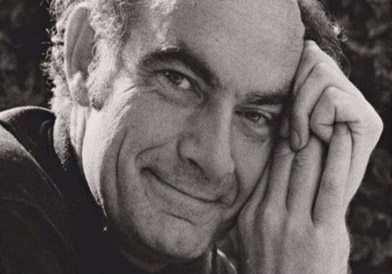
UNA Westminster Branch
members were saddened to
learn of the death of Ben
Whittaker CBE on 8 June. He
practised as a barrister and
in 1966 was elected as the
first ever Labour MP for the
safe Conservative seat of
Hampstead. After his
parliamentary career during
which he was appointed
parliamentary private
secretary to Anthony
Greenwood, Minister of
Overseas Development and later to be a Junior Minister, Ben Whittaker became the
energetic Director of the Minority Rights Group, campaigning for human rights worldwide.
He served on the United Nations Commission on Human Rights for fifteen years during
which time he was the UK representative on the UN sub‐committee on minorities’ rights.
Later, he became Executive Director of the UK branch of the Calouste Gulbenkian
Foundation.
An admirer of George Orwell, Whitaker was a leading member of a memorial trust, which
erected a plaque to the writer in Hampstead. He was made a Commander of the British
Empire (CBE) in the New Year's Honours 2000 for "services to Human Rights and to the
Voluntary Sector". He became a Vice‐President of UNA Westminster at that time.
Ben Whittaker was married to Janet who was raised to the peerage in 1999 as Baroness
Whitaker of Beeston. She is a valuable member of the All‐Party Parliamentary Group on the
United Nations. The Branch Chairman, David Wardrop, has written a letter of condolence to
Baroness Whittaker.
The numerous contributions from the large audience included a robust debate around affirmative action vs. positive discrimination and the need for a level playing field. Concerns were expressed about the lack of access to legal assistance to fight discrimination cases and for the declining career progression/life chances options for certain ethnic minority groups, especially since the economic downturn. Others highlighted the cultural, economic and social origins of discrimination, including disadvantages faced by white working class males.
In thanking the speakers, David Wardrop, UNA Westminster Chair, observed that the UK had never fully followed up the recommendations of the ill-fated UN World Conference on Racism (Durban 2001) which ended only days before the 9/11 attacks on New York. From that time, he observed, the Government's overall narrative had shifted from tackling issues of racial inequality to combating terrorism and that this largely remained the case today.
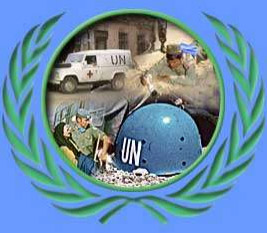
The 11th annual conference to mark the International
day of UN Peacekeepers, organised by UNA Westminster
in association with and hosted by the Royal Institute of
Strategic Studies (RUSI) will concentrate on how UK
armed forces and other expertise might respond to
renewed UN requests to the UK and similar Member
States contribute to its current peace support missions.
As the UK completes its military withdrawal from Iraq
and Afghanistan, requests for its support for UN
peacekeeping and other peace support programmes will
surely follow. Techniques developed in both countries,
principally in civil-military co-operation (CIMIC), have
been necessarily country-specific and their applicability
to other UN peace support operations has yet to be tested.
Since the UK was last involved in UN peace support activities, the UN has changed much. It has
introduced in the DRC the Intervention Brigade and deployed observation UAVs, bringing it a new
identity and commitment, one demanding logistic expertise and co-ordination. The adoption of the
Ottawa Mine Ban Treaty (1999) has not halted their widespread deployment, causing suffering to
soldiers and civilians alike and led to development of new troop carrying vehicles. Field hospitals for
combat casualties and those in the many enormous refugee camps need to benefit from experience
gained in trauma treatment and field surgery. Advances in implementing US Security Council Resolution
1325 (Women, Peace and Security) are widespread but patchy as indeed are those of the UK. And in
both security sector reform and in disarmament, demobilization and reintegration (DDR), UN force
commanders have been given more robust mandates. Further, the rapid increase in UN police staff has
greatly altered the ‘mix’ of UN peace support mandates.
So how can the UK play a greater role in UN Peacekeeping, consistent with its status as a Permanent
Member of the Security Council, an identity which makes it a target for its critics? Our 11th Annual
Conference to mark the International Day of UN Peacekeepers will feature an informed review of the
UK’s options and how these might fit the UN’s requirements. Experts in military and police matters will
share views on how the UK can both share its expertise with other nations and also where it might learn
from them. Later, a senior officer in the Foreign & Commonwealth Office will deliver the annual Folke
Bernadotte Memorial Lecture, giving indications of developing UK policy on these issues. Registration
can be made direct to RUSI at www.rusi.org/events.
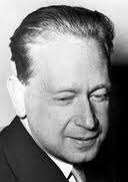
From 1 April, UNA Westminster Branch will host the website of the
Hammarskjöld Commission which comprises all documentation relating
to the work of the four-person Commission. The Commission was set up
to assess whether evidence now available would justify the United
Nations in reopening its inquiry into the death of Secretary-General Dag
Hammarskjöld, pursuant to General Assembly resolution 1759 (XVII) of 26
October 1962. The Commission comprised the Rt. Hon. Sir Stephen
Sedley, a former Lord Justice of Appeal (Chairman), Hans Corell, former
Under-Secretary-General for Legal Affairs and the Legal Counsel of the
United Nations, Justice Richard Goldstone, the first Chief Prosecutor of
the United Nations International Criminal Tribunals for the former Yugoslavia and Rwanda and
Justice Wilhelmina Thomassen who served as a judge of the European Court of Human Rights.
The Commission presented its Report at the Peace Palace in The Hague on 9 September 2013.
The Report had been commissioned by the Hammarskjöld Inquiry Trust established to raise and
administer funds to support the independent work of the Hammarskjöld Commission. The
Trust’s Chairman, Lord Lea of Crondall, presented the Report to UN Deputy Secretary-General
Jan Eliasson on 3 October. On 11 February 2014, UN Secretary-General Ban Ki-Moon sent a
letter to the President of the General Assembly requesting that the Report should be included
in the agenda of its current session since “new evidence… has come to his attention.”
On 2 September 2011, UNA Westminster together with the Institute of Commonwealth Studies
of the School of Advanced Study, University of London and the Dag Hammarskjöld Foundation
at Uppsala organised a conference to mark the 50th anniversary of Hammarskjöld’s death titled
Dag Hammarskjöld, the United Nations and the End of Empire. On that day, the author Susan
Williams published her book Who killed Hammarskjöld which in part led to the creation of the
Hammarskjöld Inquiry Trust which set up the Hammarskjöld Commission.
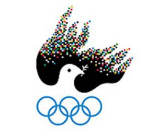

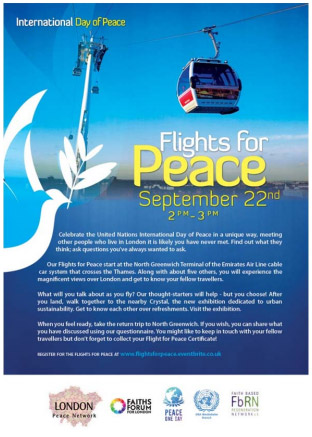

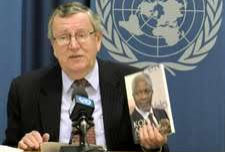


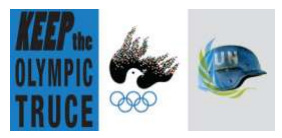
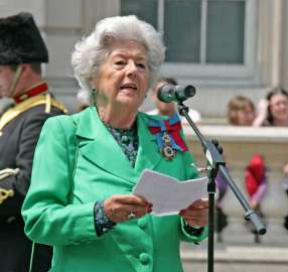
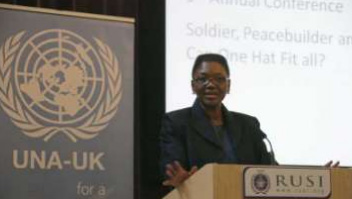
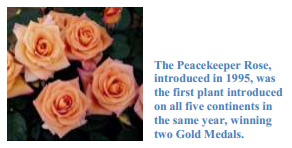
One Minute Comment
10th Annual Ruth Steinkraus-Cohen International Law lecture in association with The Centre for International Studies & Diplomacy, SOAS and the International Committee, The Bar Council

